Barbara Marcel
(she/her)
b. 1985, Rio de Janeiro, Brazil.
Lives and works in Berlin and Rio de Janeiro.
EDUCATION
2022-2023 Berlin Artistic Research Grant Programme.
2015-2022 Ph.D. candidate in Visual Arts, Artistic Research (Prof. Dr. Phil Michael Lüthy, Prof. Livia Flores UFRJ-EBA), BAUHAUS-Universität Weimar.
2014-2016 Guest Student at Hito Steyerl's class, Universität der Künste Berlin UDK.
2011-2014 MA Art in Context, Universität der Künste Berlin UDK.
2005-2007 BA Philosophy, Universidade Federal do Rio de Janeiro UFRJ.
2004-2006 BA Film Studies, Universidade Estácio de Sá, Rio de Janeiro.
2000-2004 Technical Gymnasium in Public Health, EPSJV, FIOCRUZ.
EXHIBITIONS AND SCREENINGS
2024 18TH CINEBH INTERNATIONAL FILM FESTIVAL. World Premiere of Barbara Marcel’s feature-length film SURARAS, selected for the Territory competitive section. Belo Horizonte, Brazil.
2024 CINEMATECA BRASILEIRA. Double screening of Glauber Rocha’s film DER LEONE HAVE SEPT CABEÇAS and Barbara Marcel’s medium-length film MARLENE, followed by a conversation between Marcel, Mariana Queen Nwabsili and Mateus Araújo, at the Brazilian Cinematheque. São Paulo, Brazil.
2024 VERMELHO GALLERY. Screening of the film HUMO SOBRE LOS HUMEDALES by Barbara Marcel, followed by a conversation between the film director and Ligia Nobre. São Paulo, Brazil.
2024 LARISA CRUNȚEANU & SONJA HORNUNG: TO SLIP, TO SLIDE, TO GLITCH. Exhibition at alpha nova & galerie futura. Screening of two chapters of the series GOLDEN TONE, by Barbara Marcel followed by an online conversation with the director. Berlin, Germany.
2024 COMMON IMAGINARIES. 4th Research Seminar on Art and City_DESILHA 2024, Federal University of Rio de Janeiro. Screening of the films HUMO SOBRE LOS HUMEDALES and MARLENE by Barbara Marcel followed by a conversation between the film director and Mariana Queen Nwabasili at Cinemateca do MAM, Rio de Janeiro, Brazil.
2024 KLIMA BIENNALE: WILDERNESS ALLIANCES. Exhibition & Laboratory for Artistic and Performative Research in Interaction with Plants. Curated by Stephanie Winter. Screening of Barbara Marcel’s film THE OPEN FOREST. Vienna, Austria.
2023 MOTORES DEL CLIMA. Poetics, politics and technologies of the environment. Collective exhibition curated by Daphne Dragona and Jussi Parikka at LABoral - Centro de Arte y Creación Industrial in Gijon, Spain.
2023 SINEMA TRANSTOPIA. Knowledge Ties #4: HUMO SOBRE LOS HUMEDALES. Lecture by Deborah Shaw and film by Barbara Marcel followed by a conversation moderated by Paz Guevara. Berlin, Germany.
2023 MY PRECIOUS, Werkleitz Festival. Group exhibition in June 2023. Hettstedt, Germany.
2023 THE CHANGE IN PATTERNS. Group show at wildpalms, curated by Alexandra Meffert and Jorge Sanguino. Düsseldorf, Germany.
2023 CINÉ-RENCONTRE "L'autre, ici même". Screening of Barbara Marcel’s medium-length MARLENE (2022) at Université Paris Cité. Debate with Raquel Schefer (Paris 3), and mediation by Prof. Tatian Monassa. Paris, France.
2022 A PARÁBOLA DO PROGRESSO. Group exhibition at SESC Pompeia. Curatorial coordination by Lisete Lagnado and assistant curatorship by André Pitol and Yudi Rafael. From October 2022 to April 2023. São Paulo, Brazil.
2022 AL CONJURO DE ESTE CÓDIGO - Tecnofeminismos para reescribir el mundo. Collective exhibition curated by Alma Laprida, Ana Mora, Jenny Maritza Ramírez Osorio, Maia Navas and Tania Puente, at CASo - Centro de Arte Sonoro in Buenos Aires, Argentina.
2022 WEATHER ENGINES. Collective exhibition curated by Daphne Dragona & Jussi Parikka at Onassis Stegi, Athens, Greece.
2022 VISIONS DU RÉEL FILM FESTIVAL. World premiere of Barbara Marcel’s medium-length film MARLENE in the competitive section. Nyon, Switzerland.
2022 MORE PLANETS LESS PAIN - Constellations of artistic research. Collective exhibition at Kunsthalle Erfurt and ACC Weimar, curated by Anne Brannys. Erfurt and Weimar, Germany.
2022 GALERIA DO BANCO ECONÓMICO. Screening of Barbara Marcel’s film THE OPEN FOREST followed by a debate. Luanda, Angola.
2021 UMBRALES. Collective exhibition at ifa-Galerie Stuttgart in collaboration with BIENAL DE ARTE MEDIALES in Santiago de Chile, curated by Bettina Korintenberg and Enrique Rivera. Stuttgart, Germany.
2021 solo BARBARA MARCEL, CINÉ-CIPÓ – CINE-LIANA. Solo exhibition curated by Agustina Andreoletti at Gemeinde, Cologne, Germany.
2021 FLUIDE REALITÄTEN. Collective exhibition curated by Dorothee Bienert, Yolanda Kaddu-Mulindwa, Daniela Nadwornicek, Isabelle Stamm; poster wall by Uwe Jonas. At Kunstbrücke am Wildenbruch, part of the Kommunale Galerien Berlin, Germany.
2021 BIRDS AND BUOYS. Duo exhibition by Barbara Marcel and Nadja Abt. Curated by Katja Knast at Bärenzwinger Berlin, Germany.
2021 SÜDSTELLIUM. A project by Matheus Rocha Pitta, Ana Hupe, Barbara Marcel at Kottbusser Tor subway station in Berlin, Germany. Funded by the Projektförderung Friedrichshain-Kreuzberg 2020.
2020 CRITICAL ZONES. Observatory for Earthy Politics. Curated by Bruno Latour, Peter Weibel, Bettina Korintenberg and Martin Guinard. Center for Art and Media ZKM, Karlsruhe, Germany.
2020 BERLINISCHE GALERIE, IBB-Video Space. Screenings of videoart by Barbara Marcel, curated by Nuno De Brito Rocha, Berlin, Germany.
2020 MAC – Museu de Arte Contemporânea de Niterói – Rio de Janeiro. Screenings of videoart by Barbara Marcel, curated by Raphael Fonseca. Brazil.
2020 AGROPOETICS at Inland — art, agriculture & territory. Madrid, Spain.
2020 FOSSO #15, Rio de Janeiro, Brazil.
2020 GOETHE INSTITUTE Concepción. Screening of Humo sobre los Humedales. Concepción, Chile.
2019 solo HUMO SOBRE LOS HUMEDALES. Solo exhibition resulting from the Goethe Institute Residency Artivism, curated by Luis Alarcón and Ana María Saavedra. GALERIA METROPOLITANA, Santiago de Chile.
2019 SOIL IS AN INSCRIBED BODY. Curated by Elena Agudio Marleen Boschen. At SAVVY Contemporary, Berlin, Germany.
2019 LICHT LUFT SCHEIßE [Light Air Shit], Perspectives on Ecology and Modernity. Curated by Florian Wüst and Marco Clausen. Nachbarschaftsakademie, nGbK and Prinzessinengarten, Berlin, Germany.
2019 AS REAL BECOMES SURREAL. Screenings running parallel to the 16th Istanbul Biennial of the Istanbul Foundation for Culture and Arts (IKSV) at Kundura Cinema, Istanbul, Turkey.
2019 FIRE FAÍSCA FUNKE, financed by the Berlin Project Fund Arts Education Friedrichshain-Kreuzberg, Mario Kreuzberg Gallery, Berlin, Germany.
2019 FRACTURED LANDSCAPES: Broad Underground Film Series, Eli and Edythe Broad Art Museum at Michigan State University, USA.
2018 DISAPPEARING LEGACIES: THE WORLD AS FOREST, Zentralmagazin Naturwissenschaftlicher Sammlungen, Martin-Luther-Universität Halle-Wittenberg, Halle/Saale, Germany.
2018 REENCONTRES INTERNATIONALES: New Cinema and Contemporary Arts, screening at Haus der Kulturen der Welt, Berlin, Germany.
2018 La VOLUNTAD DE LA FORMA, Espacio Pla. Buenos Aires, Argentina.
2018 REENCONTRES INTERNATIONALES: New Cinema and Contemporary Arts, screening at Luminôr Hôtel de Ville and Centre Georges-Pompidou. Paris, France.
2018 DISAPPEARING LEGACIES: THE WORLD AS FOREST, Tieranatomische Theater, Humboldt University Berlin, Germany.
2017 LANDSCAPES OF EXCESS, screening at Kispas. Brussels, Belgium.
2017 DISAPPEARING LEGACIES: THE WORLD AS FOREST, CeNak - Zoologisches Museum Hamburg, Germany.
2017 FIT FRAME TO CONTENT, Urlaub Projects. Berlin, Germany.
2017 UNIVERSIDAD DESCONOCIDA, Standard/Deluxe. Lausanne, Switzerland.
2017 PLATFORMS PROJECT 2017, with Campus Novel. Athens, Greece.
2017 solo TROPIC MATTERS, V240. Amsterdam, The Netherlands.
2017 LANDSCAPES OF EXCESS, screening at Teatro Munganga, Amsterdam, The Netherlands.
2016 THERE WILL COME SOFT RAINS, GMK. Berlin, Germany.
2016 OMONOIA ATHENS BIENNALE - THE EVER-GARDEN EFFECT, collaborative project with Campus Novel. Athens, Greece.
2016 INTUITIVE QUADRANTS, Luis Leu Ausstellungsraum für zeitgenössische Kunst. Karlsruhe, Germany.
2016 62. INTERNATIONALE KURZFILMTAGE OBERHAUSEN. We Do The Voodoo (One minute Project), curated by Helen Dowling. Oberhausen, Germany.
2016 EYE MUSEUM. We Do The Voodoo (One minute Project), curated by Helen Dowling. Amsterdam, The Netherlands.
2015 PHOTOGRAPHY, HISTORY AND MEMORY WITH ARNO GISINGER, Museum of Art Rio de Janeiro. Rio de Janeiro, Brazil.
2015 LUMINOUS FLUX - REFLECTED OVERLAYS ON LOCATIVE NORMS, Syros Institute. Syros, Greece.
2015 VISION AND FEAR STATION, Galerie für Zeitgenössische Kunst Leipzig. Leipzig, Germany.
2015 ON PROJECTION, Kühlhaus Berlin. Berlin, Germany.
2015 THROUGH THE LOOKING SCREEN, 175 Gallery. Seoul, South Korea.
2015 ON LANDSCAPE. Book Exhibition, Matèria Gallery. Rome, Italy.
2015 KÜNSTLERBÜCHER AUSSTELLUNG. Clap – Temporary room. Essen, Germany.
2014 solo REPRESENTATIVES. Altes Finanzamt, Berlin, Germany.
2014 BRASILIEN TRIFFT BERLIN, Berlin, Germany.
2014 RUNDGANG MASTERARBEITEN 2013/2014 Institut Art in Context. University of Arts Berlin, Germany.
2014 ALÉM DA UCRONIA. Neo-Realism Museum, Lisbon, Portugal.
2013 DESVENDA. Marta Traba Gallery, Fundação Memorial da América Latina. São Paulo, Brazil.
2013 SPRINGS AND SOURCES. Andros, Greece.
2013 230.000 CM: Part 2, Karl Marx Studio. NACHT UND NEBEL ART FESTIVAL. & Part 1, Karl Marx Studio. 48 STUNDEN NEUKÖLLN ART FESTIVAL. Berlin, Germany.
2013 PIC: PIECES IN CHAIN, MPAB - Month of Performance Art Berlin. Berlin, Germany.
2013 RETURN TO FOREVER, TZB Gallery of the Czech Centre Berlin, Germany.
2013 COLOGNEOFF INDIA II: Carnival of eCreativity, Sattal, India.
2012 A PARADISE IS A PARADISE IS A PARADISE, Karl Marx Studio, 48-Stunden Neukölln Art Festival. Berlin, Germany.
2012 VIDEOS DESVENDA, Museum Murillo La Greca. Recife, Brazil.
2012 FELDFORSCHUNG AM EINSTEINUFER, Institut Art in Context. Berlin, Germany.
2012 VIDEOS DESVENDA, Casa M de Mercosul. Porto Alegre, Brazil.
2012 25 INSTANTS VIDEO, Alexandria Art Center. Alexandria, Egypt.
2012 ANIMATE COLOGNE ART AND ANIMATION FESTIVAL. Cologne, Germany.
2012VIDEO ART FESTIVAL MIDEN. Kalamata, India.
2012 ATHENS VIDEO ART FESTIVAL. Athens, Greece.
2011 DESVENDA, Casa M de Mercosul, Porto Alegre, Brazil.
2011 ALTES FINANZAMT, Berlin, Germany.
2011 FIEBER, Marzia Frozen Gallery, Berlin, Germany.
GRANTS
9-12.2024 RESEARCH GRANT BERLIN SENATE. Berlin, Germany.
2023 DRESDEN TRANSCULTURAL ACADEMY “FUTURITIES” Fellow 2023. Grant. Dresden, Germany.
2022-2023 BERLIN ARTISTIC RESEARCH GRANT PROGRAMME Fellow 2022-23. Berlin, Germany.
2022 NEUSTART KULTURFONDS Project funding. Berlin, Germany.
2021 NEUSTART KULTURFONDS VG Bild-Kunst BKM. Berlin, Germany.
2020-21 BEZIRKSKULTURFONDS BERLIN: Kreuzberg-Friedrichshain. Funding by the District Culture Fund for the exhibition "Südstellium", initiated by Matheus Rocha Pitta, Ana Hupe and Barbara Marcel. Berlin, Germany.
2019 JESSICA-BILZ-FOND, Project "Situated Knowledges / Global Ecologies: A Collaborative Walkshop Ramble". Berlin, Germany.
2019 BEZIRKSKULTURFONDS BERLIN: Kreuzberg-Friedrichshain. Funding by the District Culture Fund for the exhibition "Der Süd ist unser Norden". Berlin, Germany.
10.2018-09.2021 HEINRICH BÖLL STIFTUNG. Three years Scholarship for PhD of Artistic Research at the Bauhaus University Weimar, Germany.
2016 IFA - INSTITUT FÜR AUSLANDSBEZIEHUNGEN BERLIN. Prize for Solo Exhibition in Amsterdam 2017. Berlin, Germany.
2016 FRAUENFOND BAUHAUS UNIVERSITY WEIMAR. Funding for young artists: "The Archival Garden: Balcony Dialogues", Athens Biennale. Weimar, Germany.
RESIDENCIES
2021 Art Residency as part of the YANGO Art Biennale of Kinshasa, Democratic Republic of the Congo.
2019 GOETHE INSTITUTE ARTIVISM RESIDENCY in Concepción, Chile.
2017 UNIVERSIDAD DESCONOCIDA. Two weeks artistic RESIDENCY at the Music and Theater Festival at the Tuquet, Montpon, France.
2017 UNIVERSIDAD DESCONOCIDA, Standard Deluxe. Two weeks artistic RESIDENCY in the Alps, Evolène, Switzerland.
2016 LABverde ART IMMERSION PROGRAM IN THE AMAZON. Artistic Residency in the Reserve Adolpho Ducke (INPA), Manaus, Brazil. Funded by the Bauhaus University Weimar IPID4all (DAAD) Program for artistic research abroad. Weimar, Germany.
2015 SYROS INSTITUTE. Artistic RESIDENCY about lighthouses on the island of Syros, Greece.
2013 SPRING AND SOURCES. Artistic RESIDENCY on the island of Andros, Greece.
CURATORIAL
2024 COMMON IMAGINARIES. 4th Research Seminar on Art and City_DESILHA 2024, Federal University of Rio de Janeiro. Co-organization of the conference. Rio de Janeiro, Brazil.
2023 HAU – Hebbel am Ufer Theater. Festival ¡PROTAGONISTAS! Beyond Equality: Feminisms Reclaiming Life. An Internationalist Gathering. Curated by Firoozeh Farvardin, Barbara Marcel, Camila Nobrega, Bahar Oghalai, Bafta Sarbo, Elif Sarican and Margarita Tsomou. Berlin, Germany.
2023 SINEMA TRANSTOPIA - Knowledge Ties #3: Amor Rojo. Moderation of the talk with Rike Frank and Dora Garcia after the exhibition of the film Amor Rojo, by Dora García. Berlin, Germany.
2019 SITUATED KNOWLEDGES / GLOBAL ECOLOGIES: A Collaborative Walkshop Ramble. During three days, the project, initiated by Barbara Marcel and Camila Nóbrega, brought together academic researchers with environmental activists, journalists and artists, for an experimental format of knowledge exchange. Funded by Jessica-Bilz-Stiftung, at Prinzessinnengarten, Berlin, Germany, 2-4 September.
WORK EXPERIENCE
2021 PROF. at the MA Ecology Futures at St. Joost School of Art, in the Netherlands.
2017 IMAGE AND SOUND EDITOR. “Women of the Fourth World”, Ana Hupe. (Berlin, 16').
2016-2017 PRODUCTION AND EDITING ASSISTANT. “Spell Reel”, Filipa César (Germany / Portugal / France / Guinea-Bissau, Documentary, 96'). Screenings: Berlinale - Forum 2017.
2015-2017 ARTIST ASSISTANT to visual artist Filipa César. Berlin, Germany.
2015 ASSISTANT DIRECTOR. “Transmission from the Liberated Zones”, Filipa César (Portugal / France / Germany / Sweden, 30'). Main Screenings: Berlinale - Forum Expanded 2016; Tempo Documentary Festival, Stockholm, Sweden; Indielisboa, Portugal; Kurzfilmtage Oberhausen, Germany.
2014 PRODUCER AND PRODUCTION DESIGNER. “Escape from my eyes”, Felipe Bragança (Brazil/Germany, 34'). Selected Screenings: Berlinale - Forum Expanded 2015; Curitiba Intl' Film Festival; Rio de Janeiro Intl' Film Festival, São Paulo Short Film Festival.
2006-2008 POST-PRODUCTION COORDINATOR in feature films at Conspiração Filmes Production Company, Rio de Janeiro, Brazil.
PUBLICATIONS
2023 A PARÁBOLA DO PROGRESSO. Catalog of the exhibition. Interview with Tie Jojima about the video installation MARLENE. Ed. SESC-SP. São Paulo, Brazil.
2023 CHILE INTERNATIONAL II. Sketches of the South - Maps of tomorrow. Edited by Eva-Christina Meier, Valeria Fahrenkrog & Galeria Metropolitana. nGbK Berlin, Germany.
2023 WORDS OF WEATHER, A GLOSSARY. Edited by Jussi Parikka & Daphne Dragona. Catalog of the exhibition at Onassis Foundation, Athens, Greece.
2022 WORLD OF ART: ART AND CLIMATE CHANGE", Edited by Maja and Reuben Fowkes. Thames & Hudson.
2021 DESILHA 3. Organized by Michelle Sommer and Lívia Flores. Original Essay, co-written with Andreas Döpke and Tom Nóbrega, called “canário azul: 5 fragmentos” (blue canary: 5 fragments).
2021 THESE BIRDS OF TEMPTATION: intercalations 6. Edited by Anna-Sophie Springer & Etienne Turpin. Co-published by K. Verlag and Haus der Kulturen der Welt. Original Essay, co-written with Andreas Döpke, called “Des Goldes Klang”. Berlin, Germany.
2020 THE WORK OF THE WIND: LAND. Edited by Christine Shaw & Etienne Turpin. Co-published by K. Verlag in partnership with the University of Toronto Mississauga. Original Essay called “The gardener, the rubber-tapper and the herbalist: a ciné-cipó”. Berlin, Germany.
2019 THE ENDOTIC READER N.1. Reader with contributions by the participants hosted by TIER - The Institute for Endotic Research, including Barbara Marcel's SEVEN CROSSROADS. Berlin, Germany.
2017 THE EVER-GARDEN EFFECT. Artist Book. Berlin, Germany / Athens, Greece.
2015 LUMINOUS FLUX. Booklet Exhibition, Syros Institut. Syros, Greece.
2015 ON PROJECTION. Booklet Exhibition, Kühlhaus Berlin, Germany.
2014 AUS DEM KONTEXT. Catalogue of the exhibition “Masterarbeiten 2013/2014” from the Art in Context Institute at the Universität der Künste Berlin, Germany.
2013 LANGUAGE IS AN INVISIBLE LANDSCAPE. Drawings “Humaitá” and “A pedra agora é preta”. Collective publication curated by Portuguese artist Marta Leite. Berlin, Germany.
2013 230 000 CM. Collective publication of photos and original texts. Project funded by Quartier Donaukiez of Neukölln, organized by Marta Leite, Barbara and Marcel Senli in the Karl Marx Studio. Berlin, Germany.
ARTISTIC TALKS, LECTURES, WORKSHOPS AND SEMINARS (selection)
2024 ICE AND COAL # RESEARCH IN ART. Graduate Program in Visual Arts at the Federal University of Rio de Janeiro. André Leal, Cecilia Mori, Livia Flores and Ronald Duarte invite Alexandre Vogler, Barbara Marcel, Felipe Scovino, Malu Fatorelli and Stanley Vinicius to a conversation with Ana Schaefer, Ana Szwarc, Antonio Salviano, Bia Vinzon, Cris Marinho, João Rodrigo Ostrower, Lila Deva, Luiza Dideco, Matheus Vieira, Nina Balbi, Pamela Alves, Rene Bessa, Renan Paiva, Ricardo Alvarenga and Tainah Longras. Rio de Janeiro, Brazil.
2024 EXPERIMENTAL CINEMA AND THE QUESTION OF GENDER. Seminar by Prof. Guiomar Ramos in the Graduate Program in Creative Media at the Federal University of Rio de Janeiro. Artist talk and screening of the film MARLENE by Barbara Marcel. Rio de Janeiro, Brazil.
2024 COMMON IMAGINARIES. 4th Research Seminar on Art and City_DESILHA 2024, Federal University of Rio de Janeiro. Lecture Performance at the opening of the event, alongside Livia Flores, André Leal and Giovanni Festa, at Centro Cultural da Justiça Federal. Rio de Janeiro, Brazil.
2023 HAU – Hebbel am Ufer Theater. Festival ¡PROTAGONISTAS! Beyond Equality: Feminisms Reclaiming Life. An Internationalist Gathering. Moderation of Round Table “Against Capitalism and its extractivisms: From Community Feminisms to the Territorial Cuerpo-Tierra from Territorial Community Feminism and agroecology in Abya Yala (Latin America)” With: Lorena Cabnal, Carmen Cariño, Miriam Nobre, Louise Wagner / Moderation: Barbara Marcel, Camila Nobrega. Berlin, Germany.
2023 SINEMA TRANSTOPIA - Knowledge Ties #3: Amor Rojo. Moderation of the talk with Rike Frank and Dora Garcia after the exhibition of the film Amor Rojo, by Dora García. Berlin, Germany.
2023 SINEMA TRANSTOPIA - Knowledge Ties #4: HUMO SOBRE LOS HUMEDALES. A presentation by Deborah Shaw and exhibition of Barbara Marcel’s feature-length Humo sobre los Humedales, followed by a conversation with Shaw and Marcel moderated by Paz Guevara. Berlin, Germany.
2023 WERKLEITZ FESTIVAL – My Precious. Artist Talk with curator Lena Johanna Reisner. At Novalis-Museum Wiederstedt, Arnstein, Germany.
2023 BOOK LAUNCH: CHILE INTERNATIONAL II - Skizzen des Südens - Landkarten von morgen (Sketches of the South - Maps of tomorrow). Conversation between Eva-Christina Meier, Ana María Saavedra and Luis Alarcón (Galeria Metropolitana, Santiago de Chile). nGbK, Berlin, Germany.
2022 GLOBAL ENVIRONMENTAL JUSTICE AND ITS LIMITS: Complexities of Time and Space. 2nd Annual Conference of the EH Justice Network. Aarhus University, Denmark, 3-5 November.
2022 LIVING TOGETHER, LOOKING APART, International Conference at Oyoun, Berlin, Germany, 28-30 September.
2022 PARADOXOS DA PAISAGEM II. Graduate Program in Performing Arts, ECO-UFRJ. Follow-up of the students’ final projects. Rio de Janeiro, Brazil, 15 August.
2022 ARTIST TALK organized by Laboratório de Crítica e Curadoria [LabCC] & MOVART gallery, at Galeria do Banco Económico, Luanda, Angola.
2022 JUCÁ/YUCA. Lecture Performance in collaboration with poet Érica Zíngano as part of the Festival “língua à solta”, at the Guimarães Rosa Institute / Brazil Angola Cultural Center. Luanda, Angola.
2022 QUALÉ, MANÉ?. Workshop and Performance in collaboration with poet Érica Zíngano as part of the Festival “língua à solta”, at the Guimarães Rosa Institute / Brazil Angola Cultural Center. Luanda, Angola.
2022 VISIONS DU RÉEL FILM FESTIVAL 2022. Morning Talk 4: Artists and documentaries practices: a field guide. Nyon, Switzerland.
2021 THIRD CINEMA. Workshop during the art residency at the YANGO! Biennale 2021-2022. Kinshasa, Democratic Republic of the Congo.
2021 ON LATEX - Critical Inflections on (Neo)Extractivism in Latin America. Conference organized by the ICI Berlin - Institute of Cultural Inquiry in cooperation with Stanford University. Artist talk. Berlin, Germany, 27-28 September.
2021 LANDSCAPE EXERCISES. 3rd Research Seminar on Art and City_DESILHA 2021, Federal University of Rio de Janeiro. Online lecture performance and artist talk in collaboration with Tom Nóbrega. Roundtable: Mineral Landscapes. UFRJ, Rio de Janeiro, Brazil, 10 June.
2021 ANDERE WÄLDER. Lecture performance and artist talk at the University of Arts Linz, in cooperation with the art festival FMR21. Linz, Austria, 06 May.
2021 BIRDS AND BUOYS. Online artist talk. Paz Guevara in conversation with Nadja Abt, Barbara Marcel and Katja Kynast, as part of the exhibition "Birds and Buoys" at the Bärenzwinger in Berlin, Germany, 28 April.
2021 ZUM DIGITALEN REGIME DER KUNST IN ZEITEN DER PANDEMIE. Artist talk, film screening and studio visits with students of the State Academy of Fine Arts Stuttgart, Germany, 14-15 January.
2020 ANTHROPOCENE CURRICULUM: THE SHAPE OF PRACTICE. Talk and workshop participation in the program, at the HKW Haus der Kulturen der Welt Berlin, Germany, 26-31 October.
2020 TERRESTRIAL UNIVERSITY: Ciné-Cipó – Cine-Liana at Amazon Tall Tower Observatory. ARTIST TALK with curator Bettina Korintenberg, as part of the exhibition CRITICAL ZONES - Observatory for Earthy Politics, curated by Bruno Latour, Peter Weibel, Bettina Korintenberg and Martin Guinard at the Center for Art and Media ZKM, Karlsruhe, Germany, 08 October.
2020 OPEN AIR VIDEO ART. Screening night of Barbara Marcel's & Ana Hupe's work and artist talk between Marcel, Hupe and the director Dr. Thomas Köhler at BERLINISCHE GALERIE. Berlin, Germany, 28 August.
2020 THE ESSAY AND EXPERIMENTATION AS FORM AND LANGUAGE: BODY, ARCHIVE, TESTIMONY. Lecture. III Jornadas Internacionales de Estéticas y Políticas Contemporáneas Nuestroamericanas (III International Conference on Nuestroamerican Contemporary Aesthetics and Politics). Universidad de Avellaneda, Argentina, 29 August.
2020 THE GARDENER, THE RUBBER TAPPER AND THE HERBALIST. Lecture performance and artist talk at FOSSO 15, Rio de Janeiro, Brazil, 08 February.
2019 HUMO SOBRE LOS HUMEDALES. Lecture performance of an ongoing project. Event organized by the GOETHE Institute of Santiago de Chile in collaboration with Galeria Metropolitana, Chile, 14 December.
2019 WHAT ELSE BURNS WHEN THE AMAZON BURNS? Artist talk initiated by Barbara Marcel and Camila Nóbrega with Alessandra Munduruku and Vândria Borari. Parallel event to the exhibition SOIL IS AN INSCRIBED BODY. ON SOVEREIGNTY AND AGROPOETICS, at Savvy Contemporary Berlin, Germany, 22 September.
2019 WOMEN IN MOVEMENT / The Patriarchy of Land. On Agrarian Movements and Their Internal Struggles. INVOCATIONS discursive program as part of the exhibition SOIL IS AN INSCRIBED BODY. ON SOVEREIGNTY AND AGROPOETICS, at Savvy Contemporary Berlin, Germany, 14 September.
2019 NARRATIVES OF SOCIO-ENVIRONMENTAL JUSTICE IN BRAZIL: ON THE RIGHT TO THE TERRITORIES AND IMAGINARIES. Artist talk initiated by Barbara Marcel and Camila Nóbrega with Brazilian grassroot movement activists Silvia Baptista (TEIA - Women's Agroecological Collective) and Luana Carvalho (MST - Landless Workers' Movement in Brazil). Discursive program as part of the exhibition “Licht, Luft und Scheisse - Perspectives on Ecology and Modernity", a joint production of: Botanischer Garten und Botanisches Museum der Freien Universität Berlin (BGBM), Martin-Elsaesser-Stiftung, Nachbarschaftsakademie im Prinzessinnengarten Kreuzberg and neue Gesellschaft für bildende Kunst (nGbK). Berlin, Germany, 4 September.
2018 CHANGING CLIMATES Conference. Engaging Citizens with Local Environments and Ecologies through Digital Interventions. Presentation at the conference, lecture performance. University of Skövde, Sweden, 22-24 November.
2018 THE OPEN FOREST. Lecture performance at the International Conference POLITICS OF NATURE. Organized by Federico Luisetti and Emmanuel Alloa. School for Humanities and Social Sciences, University of St. Gallen, Switzerland, 11-13 October.
2018 12 SCHNITTE UND EIN LOCH IM TAL [12 steps and a hole in the valley]. A Walkshop Ramble initiated by Barbara Marcel in collaboration with geographer Andreas Döpke, with the support of TRAFFO – UNESCO and the participation of students of the University of Hamburg and University of Hildesheim. Harz, Germany.
2018 HOW ON EARTH? Consuming a planet. Lecture performance as part of the exhibition Disappearing Legacies: The World as Forest, at the Tieranatomisches Theater Berlin, Germany, 29 April.
2017 PLATFORMS PROJECT. Artist talk in collaboration with Campus Novel, as part of the release of the artist publication “The ever-garden effect”. Athens, Greece, 19 May.
2016 THE EVER-GARDEN EFFECT. One-week workshop initiated by Barbara Marcel in collaboration with the Greek Artist Collective Campus Novel as part of the OMONOIA Athens Biennial, Greece, 01-05 May.
2016 NATIONAL ASSOCIATION OF FINE ARTS EDUCATION (NAFAE) SYMPOSIUM at the University of Cumbria Institute of the Arts. Presentation of artistic research methodologies at the conference. Lancaster, United Kingdom, 15-16 July.
2014 ARTIST TALK: ARTICLINIC. Werkstadt Neukölln. Berlin, Germany.
2012 ARTIST TALK AND SCREENING, Altes Finanzamt. Berlin, Germany.
KLIMA BIENNALE: WILDERNESS ALLIANCES
17.04.–04.06.2024 at MOTHERBOARD, Vienna, Austria. Artists: Guadalupe Aldrete, Bettina Eigner, Fuzzy Earth, Anita Fuchs, Elena Kristofor, Barbara Marcel, Laura Sperl, Stephanie Winter & Salon Hybri. Curated by Stephanie Winter. Research by Linn Mauerer.
17.04.–04.06.2024 at MOTHERBOARD, Vienna, Austria. Artists: Guadalupe Aldrete, Bettina Eigner, Fuzzy Earth, Anita Fuchs, Elena Kristofor, Barbara Marcel, Laura Sperl, Stephanie Winter & Salon Hybri. Curated by Stephanie Winter. Research by Linn Mauerer.
„WILDERNESS ALLIANCES — Exhibition & Laboratory for Artistic and Performative Research in Interaction with Plants“ is a MOTHERBOARD project that explores the relationship between humans, plants, and other vibrant entities. It is an immersive installation inspired by Hildegard von Bingen's concept of Viriditas - The Greening Power, composed of various plants, seeds, soil, and video works, responding to current environmental challenges. The exhibition creates a space for artists, visitors, and plants to explore diverse relationships within social, ecological, and political structures, encouraging new narratives within our interconnectedness with our home planet.
Barbara Marcel was part of the exhibited artists with the experimental short film THE OPEN FOREST.
Click here for more information on the Klima Biennale Wien and on the exhibition.




THE CHANGE IN PATTERNS
(THE CHANGE IN PATTERNS/ PT I. WATER MINING )
From January 15th 2023, at WildPalms, Düsseldorf, Germany.
Barbara Marcel, Mario Asef, Hans Baumann, Felipe Castelblanco.
(THE CHANGE IN PATTERNS/ PT I. WATER MINING )
From January 15th 2023, at WildPalms, Düsseldorf, Germany.
Barbara Marcel, Mario Asef, Hans Baumann, Felipe Castelblanco.
Climate patterns have changed. We enter in the era of the extraordinary. Every year, every month, another record is broken. While this exhibition is happening, California floodings are at record levels and we experience the warmest winter in Europe. Yes, it is about a way to conceive the climate change that is at our doorsteps, but we constantly forget.
We may not like to think about it, because it is inextricably linked to how we live our lives today.
The basis of our contemporary society is built upon extraction of natural resources in large quantities. For the extraction, water plays an important role. For fracking or to attain lithium, both processes are denominated by water mining.
In Brandenburg, the Tesla factory demands of a large amount of water. Electric cars, new clean energy, thanks to water and drying out the land, an area that is still entangled with the history of dirty energy coal in the region. The abandoned coal mines are pools of an iron mud that contaminates the water.
California has experienced drought conditions in recent years, which has affected the state’s lakes and reservoirs. Low rainfall and high temperatures have led to decreased water levels in many of the state’s lakes and reservoirs, making them less able to provide water for irrigation and drinking water supplies.
Chile and Argentina are home to a number of wetlands, which play important roles in the ecological and economic well-being of the region. These wetlands include marshes, swamps, and peatlands, and are home to a wide variety of plant and animal species.
However, both countries have faced problems with the destruction of wetlands due to human activities such as agriculture and urbanization based on water mining, which has lead to the loss of biodiversity and the destruction of habitats for wildlife.
Water scarcity is a growing concern around the world and has the potential to lead to conflicts, particularly in regions where water resources are limited and populations are increasing. Climate change is also exacerbating the problem by altering precipitation patterns and increasing the risk of droughts. Can we see the water bodies as something universal, away from territorial fights while crossing the ocean with smallest raft that can hold a human being?
We can change the future: especially by being aware that in the past, constantly there was the intent to write our future differently.
- “Wildpalms“
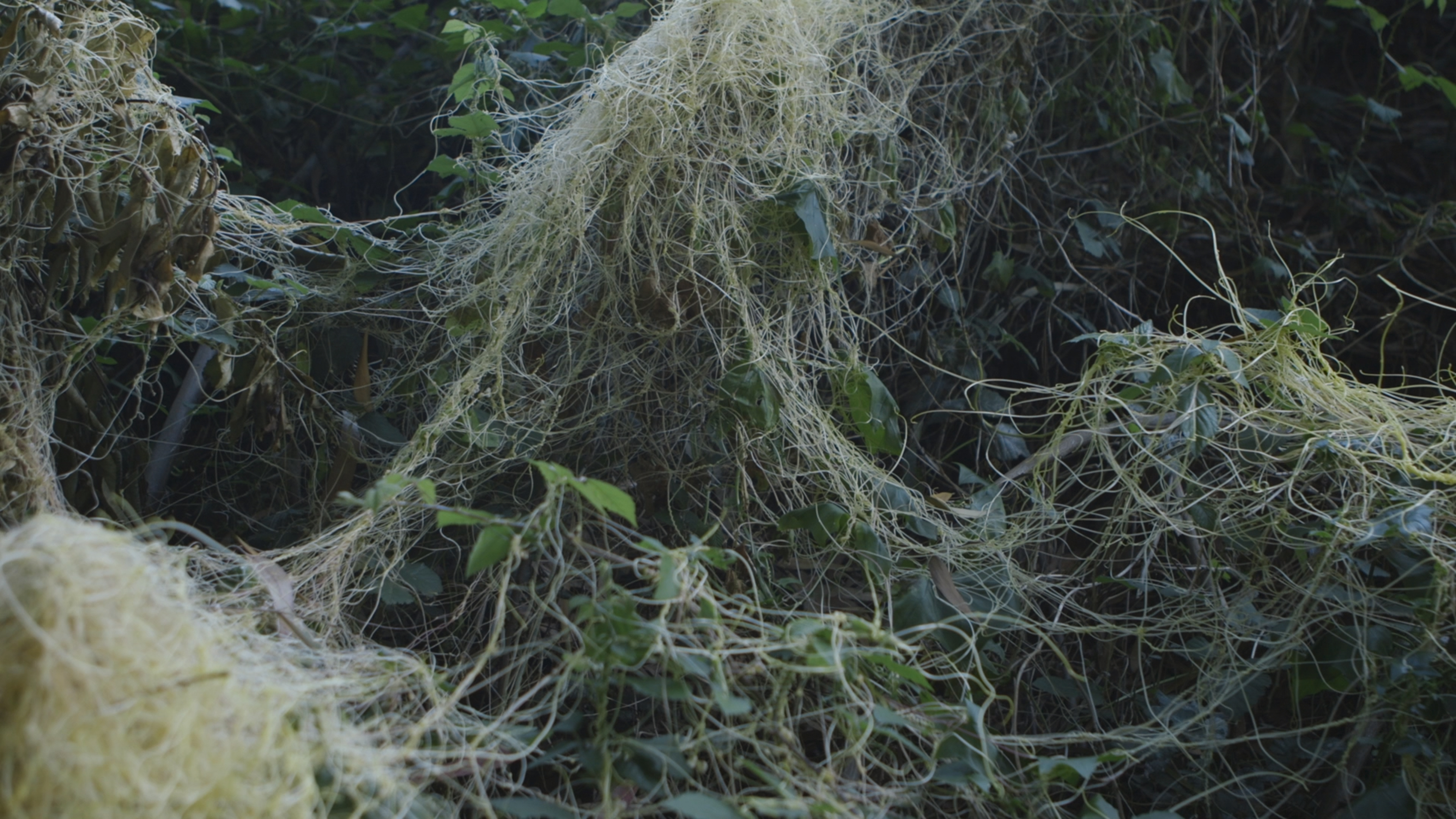
MOTORES DEL CLIMA
06.10.2023 – 18.05.2024, MOTORES DEL CLIMA: Poetics, politics and technologies of the environment. Collective exhibition curated by Daphne Dragona and Jussi Parikka at LABoral - Centro de Arte y Creación Industrial in Gijon, Spain. Artists: Kat Austen, Anca Benera & Arnold Estefan, Felipe Castelblanco, Kent Chan, Denise Ferreira da Silva & Arjuna Neuman, DESIGN EARTH, Matthias Fritsch, Geocinema (Asia Bazdyrieva & Solveig Qu Suess), Abelardo Gil-Fournier, Hypercomf, Lito Kattou, Zissis Kotionis, Pablo de Lillo, Atmospheric Research Collective (Tom Corby, Gavin Baily, Jonathan Mackenzie, Louise Sime, Giles Lane, Erin Dickson, George Roussos), Matterlurgy (Helena Hunter & Mark Peter Wright), Barbara Marcel, Víctor Mazón, Petros Moris, Sybille Neumeyer, Afroditi Psarra & Audrey Briot, Rotor Studio (Ángeles Angulo y Román Torre), Susan Schuppli, Rachel Shearer & Cathy Livermore, Stefania Strouza, Superflux, Paky Vlassopoulou, Thomas Wrede.
06.10.2023 – 18.05.2024, MOTORES DEL CLIMA: Poetics, politics and technologies of the environment. Collective exhibition curated by Daphne Dragona and Jussi Parikka at LABoral - Centro de Arte y Creación Industrial in Gijon, Spain. Artists: Kat Austen, Anca Benera & Arnold Estefan, Felipe Castelblanco, Kent Chan, Denise Ferreira da Silva & Arjuna Neuman, DESIGN EARTH, Matthias Fritsch, Geocinema (Asia Bazdyrieva & Solveig Qu Suess), Abelardo Gil-Fournier, Hypercomf, Lito Kattou, Zissis Kotionis, Pablo de Lillo, Atmospheric Research Collective (Tom Corby, Gavin Baily, Jonathan Mackenzie, Louise Sime, Giles Lane, Erin Dickson, George Roussos), Matterlurgy (Helena Hunter & Mark Peter Wright), Barbara Marcel, Víctor Mazón, Petros Moris, Sybille Neumeyer, Afroditi Psarra & Audrey Briot, Rotor Studio (Ángeles Angulo y Román Torre), Susan Schuppli, Rachel Shearer & Cathy Livermore, Stefania Strouza, Superflux, Paky Vlassopoulou, Thomas Wrede.
The weather is a dynamic system of pressure, temperature and humidity. It manifests through maps, media, and simulations while it touches the skin. Weather is felt unevenly, from extremes to mundane mildness of a breeze. Some are exposed, some are sheltered; weather wears some down, some gain profit.
“Motores del clima” is an art exhibition and a program of talks, performances and workshops taking place at LABoral - Centro de Arte y Creación Industrial in Gijon, Spain. It explores weather as a complex system, as observation and control, and as a lived experience. The projects and events refer to natural phenomena and climate change, past and contemporary strategies of engineering the weather, as well as to different sociopolitical atmospheres related to breathing and living. Approaching the models and systems of art as techniques of knowledge, “Motores del clima” addresses the need for climate justice, and for embracing the surrounding more-than-human world(s).
The exhibition is accompanied by the publication “Words of Weather: A glossary” that maps terms for a political ecology of experience.
Link to the exhibition.
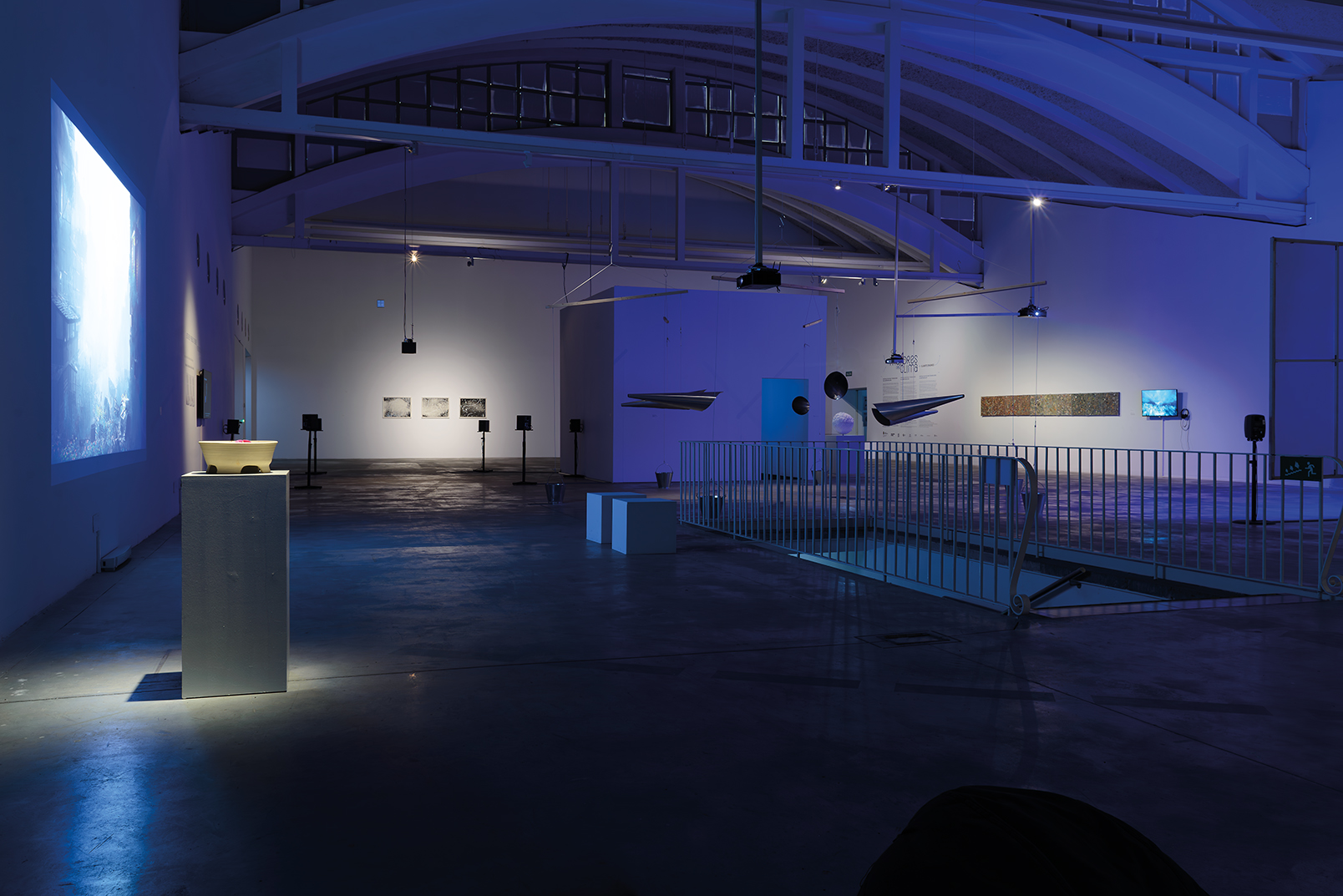



UMBRALES
12.11.2021 - 20.02.2022, Stuttgart
Collective exhibition at ifa Gallery Stuttgart (DE) in collaboration with BIENAL DE ARTES MEDIALES, Santiago de Chile (CHL).
12.11.2021 - 20.02.2022, Stuttgart
Collective exhibition at ifa Gallery Stuttgart (DE) in collaboration with BIENAL DE ARTES MEDIALES, Santiago de Chile (CHL).
Thresholds. How to tie time together?
What should a social order that seeks answers to the pressing issues facing society today look like? Which codes and focal points come together to form the social network of our time? How can art and culture contribute to a better understanding of the effects of human actions on the fragile ecosystem?
Within the scope of 15 bienal de artes mediales (media art biennale) in Santiago de Chile, the exhibition 'Umbrales – Thresholds' explores the transformation, insecurity and vulnerability of societies in times of multiple planetary crises. Being at the threshold means being in an intermediate state, in uncertainty, the unknown and unconscious, and also in a moment of change.
This joint project takes as its starting point the wave of protests against the government in Chile that began in October 2019. The country's deep and interlinked social and ecological crises are made evident. The protests resulted in the constitution of Chile, which still derived from the time of the Pinochet dictatorship, being rewritten – in a participative process that will be completed in 2023. Questions concerning ecological sensitivity, the recognition of a diversity of cultures and languages, gender equality, and the socio-technological nature of living environments are not only relevant in Chile. They all represent themes that require the reorganisation of different social orders around the world.
How to tie time together? – poses the question as to how entering into relationships with one another and finding orientation and contact in space and time. The exhibition sees itself as an invitation to sharpen the senses and sensitivity at a time of insecurity – to observe attentively, to listen and feel, and also to dream, imagine and remember, and to understand oneself as part of a complex constellation of interdependent relationships.
The exhibition is accompanied by an online publication that will accrue over the exhibition period, continuing the gathering of fragments, observations, thoughts, discussions, and shared exploration in a digital space.
The three new multimedia installations by the Chilean artists Elisa Balmaceda (born 1985) and Claudia González (born 1983) and the Brazilian artist Barbara Marcel (born 1985) look at various threshold moments: the protests on the streets in Chile, the landscapes and people exhausted by exploitation and industrialisation, the ruins and remnants of a modernised and accelerated world. A sense of interconnectedness is at the centre of these works, a feeling that makes the entanglements of life tangible. Beginning with these symbiotic nodes, these works explore a myriad of opportunities to create connections by means of and yet also in particular by going beyond human languages. In all of this, different forms of knowledge and old and new technologies intermingle and open up a new understanding of ourselves within the contexts of our lives.
Curators: Bettina Korintenberg, Enrique Rivera
Artists: Elisa Balmaceda with Rodrigo Ríos Zunino, Claudia González Godoy, Barbara Marcel, Elektra Wagenrad
Curator film programme: Florian Wüst
Project coordination and management: Constanza Güell
Exhibition website: https://www.ifa.de/en/exhibit/umbrales
The 15 bienal de artes mediales, Santiago de Chile takes place from 26.11.2021 – 31.03.2022.
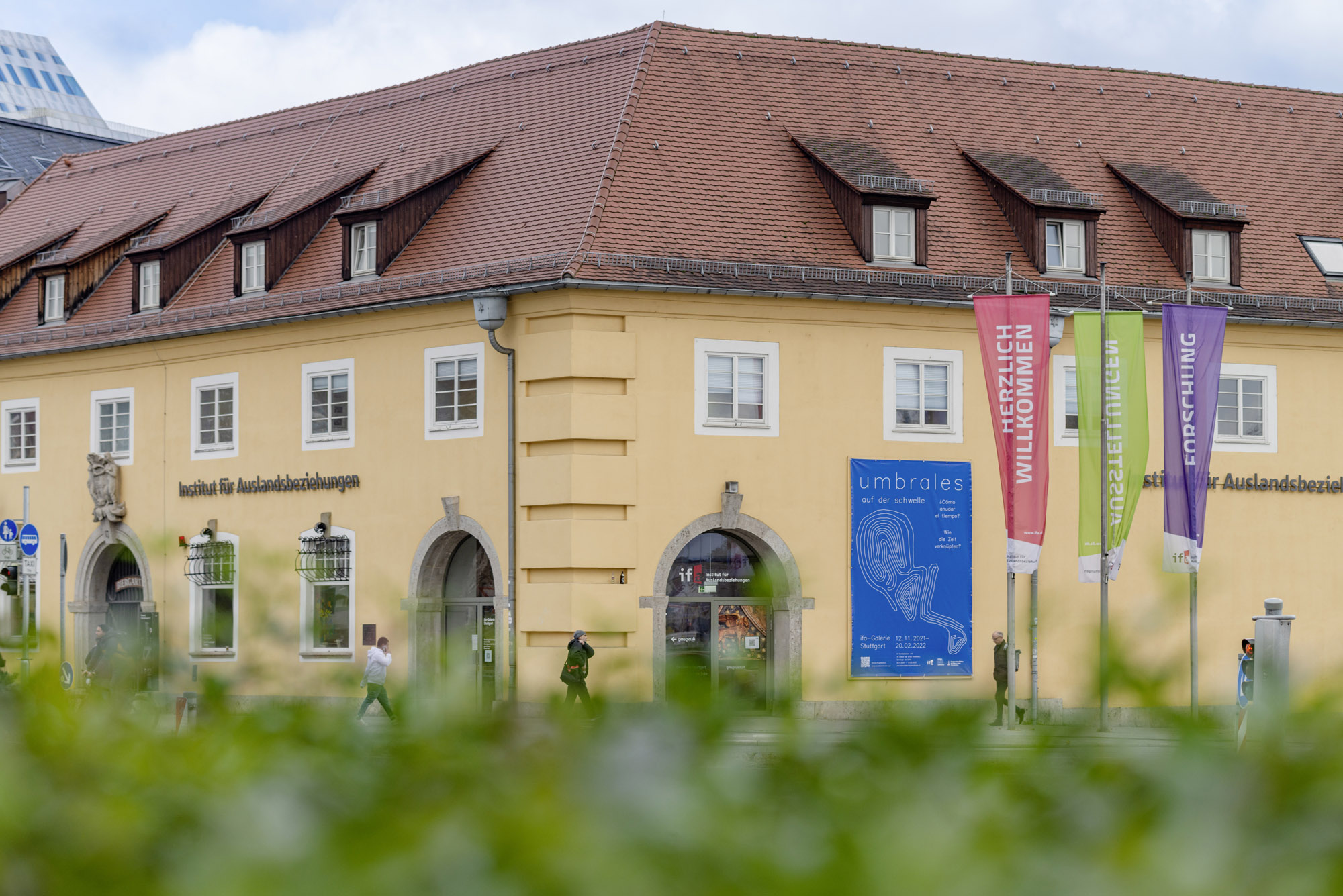


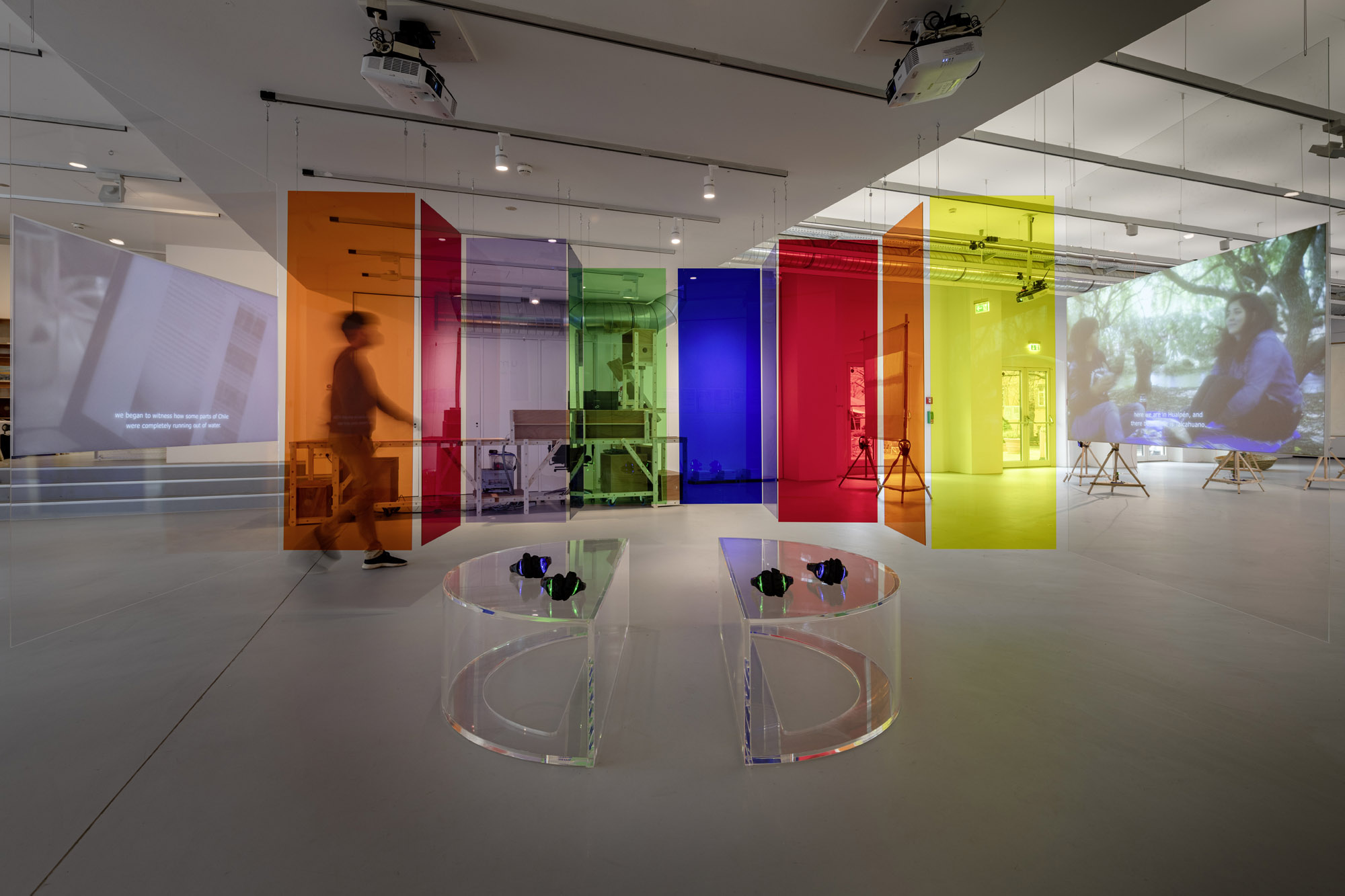
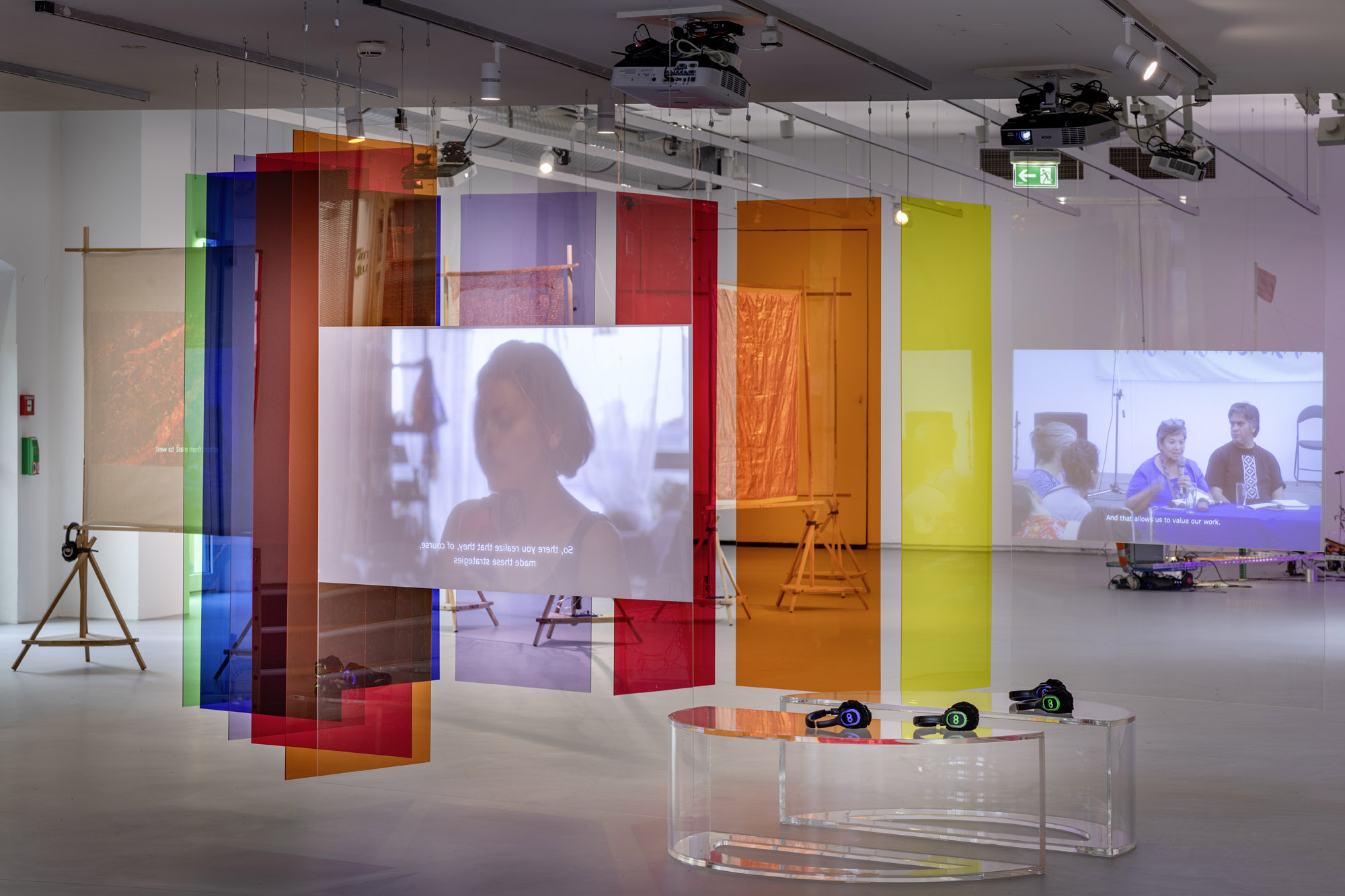
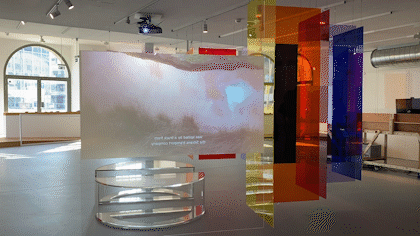
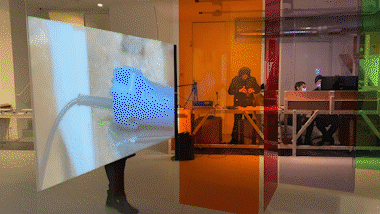
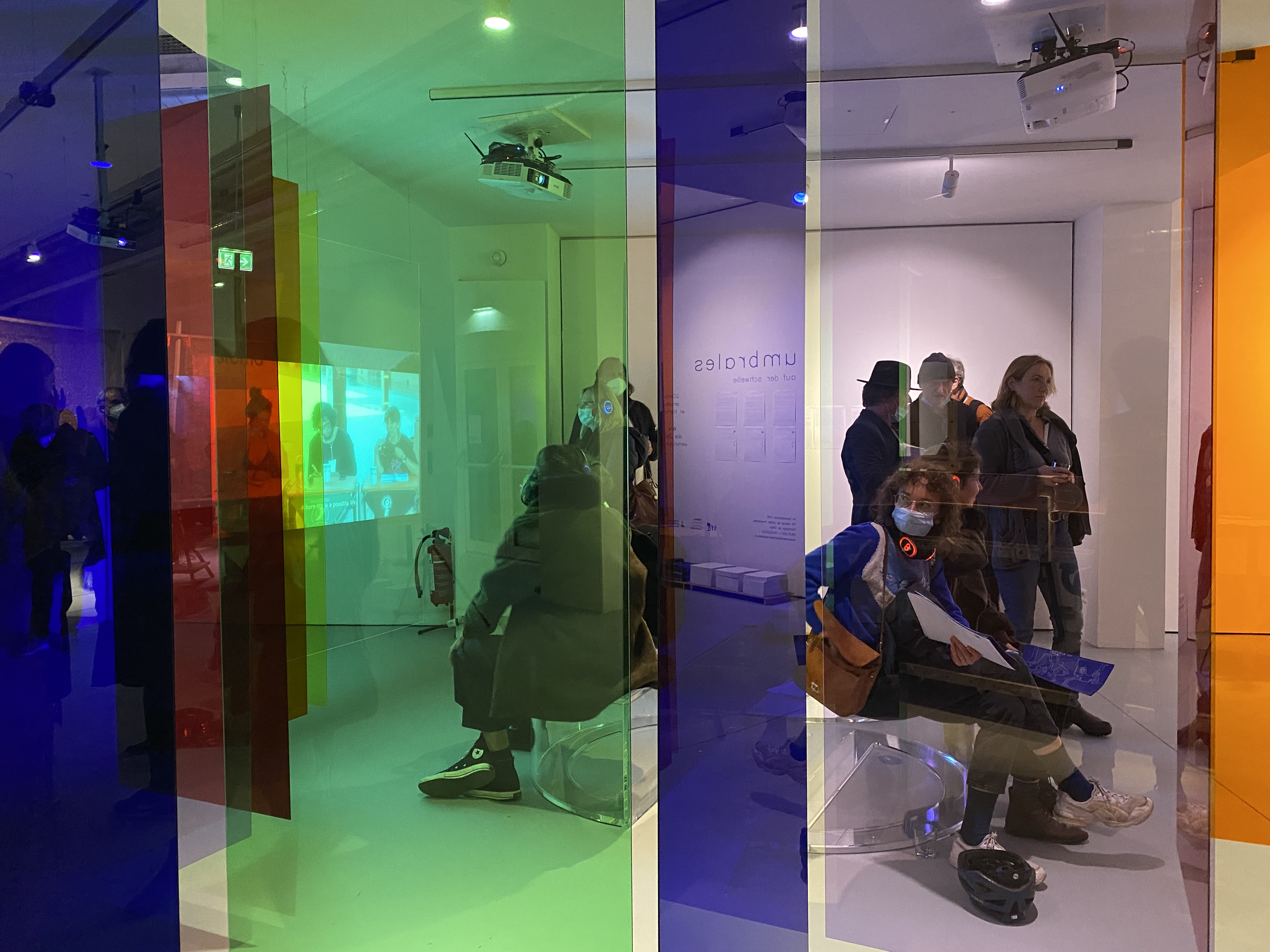
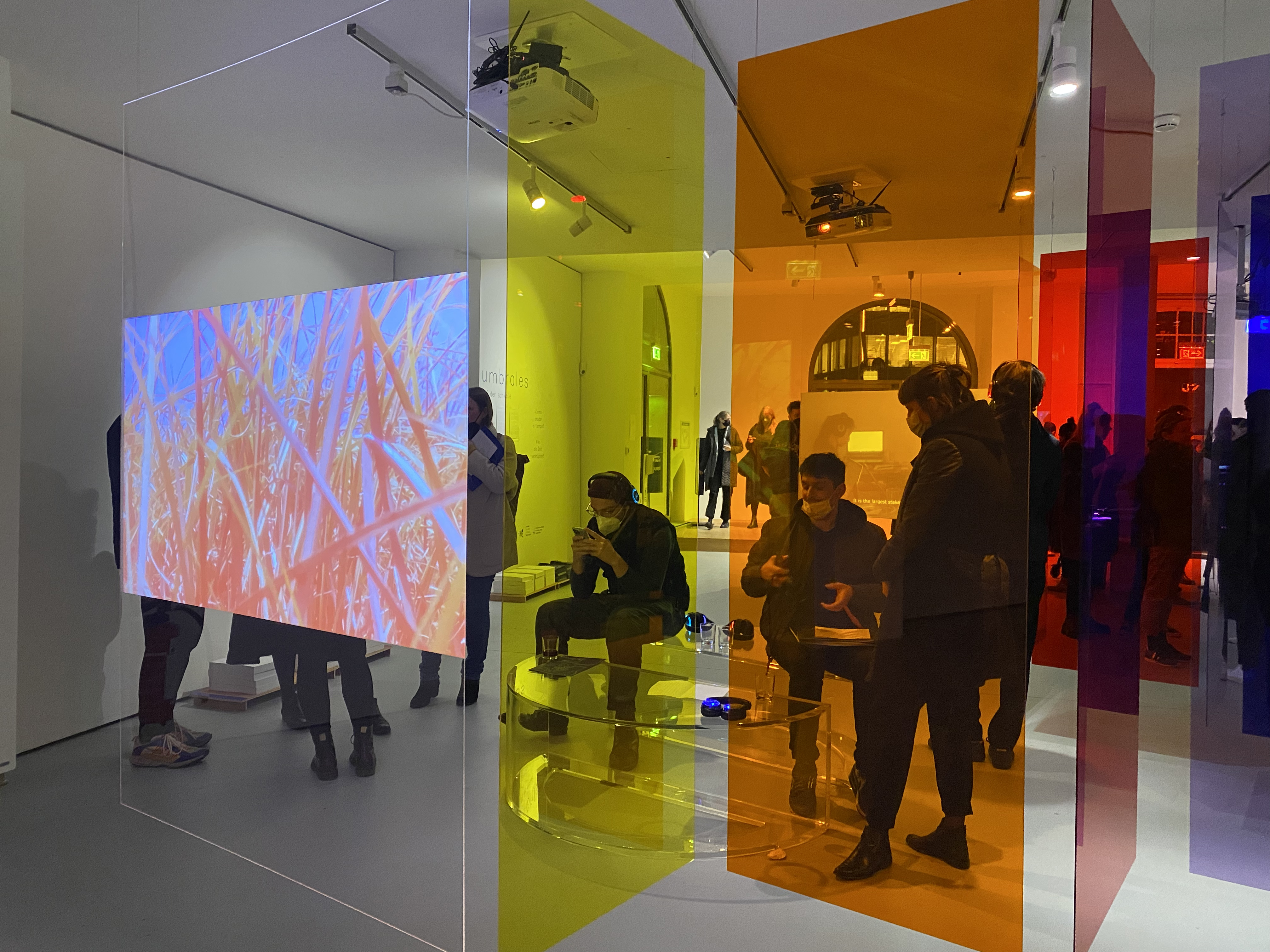

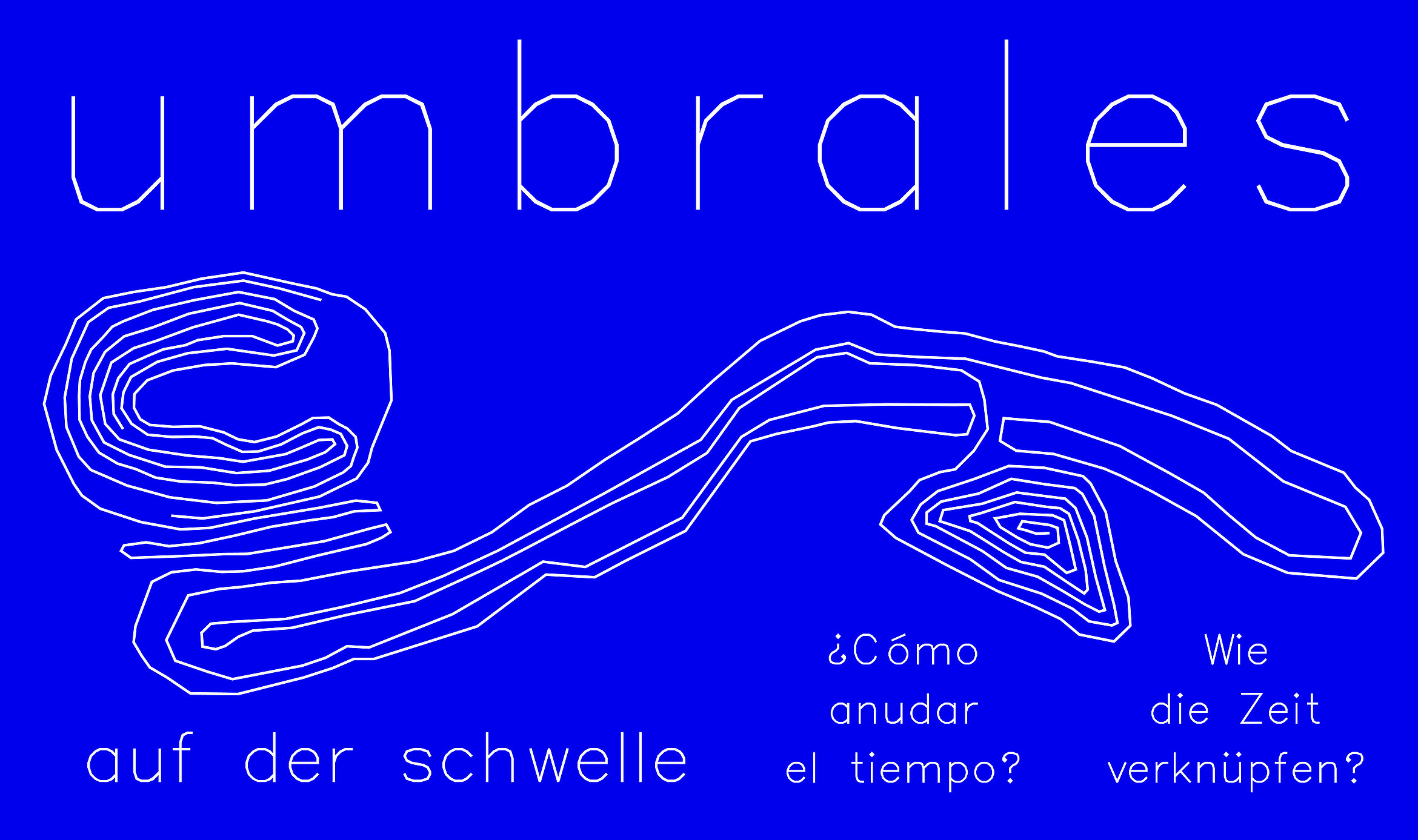
A PARÁBOLA DO PROGRESSO
(THE PARABLE OF PROGRESS)
From 26/10/22 to 02/04/23, Tuesday to Sunday at SESC Pompéia, São Paulo, Brazil.
Curatorial coordination by Lisete Lagnado and assistant curatorship by André Pitol and Yudi Rafael
(THE PARABLE OF PROGRESS)
From 26/10/22 to 02/04/23, Tuesday to Sunday at SESC Pompéia, São Paulo, Brazil.
Curatorial coordination by Lisete Lagnado and assistant curatorship by André Pitol and Yudi Rafael
The exhibition reflects on the country's ideals of modernity and independence, seeking inclusive and diverse projects. With five dialogic territories, the show brings together social forces in welcoming environments for its communities. These five spaces celebrate the 40th anniversary of SESC Pompeia, inaugurated in 1982, which is a stage for culture, leisure, social welfare, and health - qualities and values to be rescued in this moment of global dystopia.
The event also coincides with the bicentennial of Brazil's Independence (1822) and the centennial of the São Paulo Modern Art Week (1922), two historical dates that cut across the conception of the project, part of Sesc São Paulo's "Diverse 22" program. The curatorial coordination is by the critic Lisette Lagnado, with associate curators André Pitol and Yudi Rafael.
Aiming to discuss Lina Bo Bardi's legacy to Sesc Pompeia, one of the city's most vibrant architectural icons, the curators bring other references to add experiential and social layers to the project. Thus, five "dialogic spaces" participate in the exhibition, each with its own singularity: Acervo da Laje (railway suburb of Salvador, BA), Aldeia Kalipety (São Paulo, SP), Casa do Povo (São Paulo, SP), Quilombo Santa Rosa dos Pretos (Itapecuru Mirim, MA), and Savvy Contemporary - the Laboratory of form-ideas (Berlin, Germany).
In opposition to authoritarian and demagogic drifts, different social forces have managed in the meantime to organize themselves and generate spaces of hospitality able to support their community. Knowing how to articulate cultural production within a perspective of care, sensitization and conviviality, these five meeting centers, now implemented within the Sesc Pompeia's Living Space, reinforce its transformation into a "village", amplifying Sesc São Paulo's wish when it invited Lina Bo Bardi and her team to recover the former drum factory: "to build another reality". They operate as conductors of hope within the parable of Positivism, called to illustrate the mythical relationship of this "country of the future", since its colonization and the Afro-Atlantic traffic, through various migratory flows that built the idyllic image of a hospitable nation, a land blessed with exuberant nature, the generosity and emotional expansiveness of a people that would have found its happiness in the mestization of its roots. Known for her appreciation of popular culture, Lina Bo Bardi's work also acquires new inflections today in the wake of decolonial studies attentive to the recognition of different degrees of extractivism and silencing.
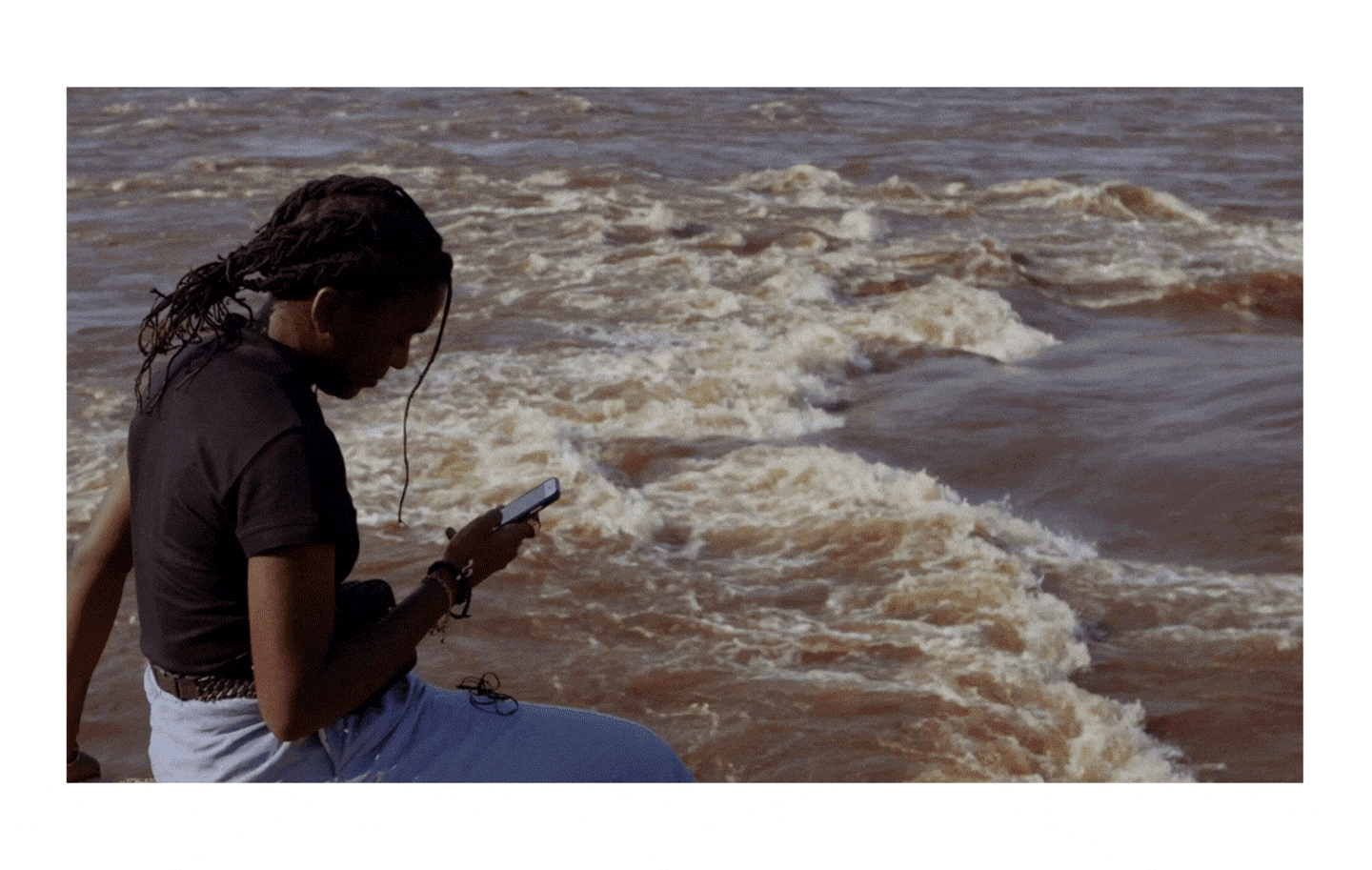
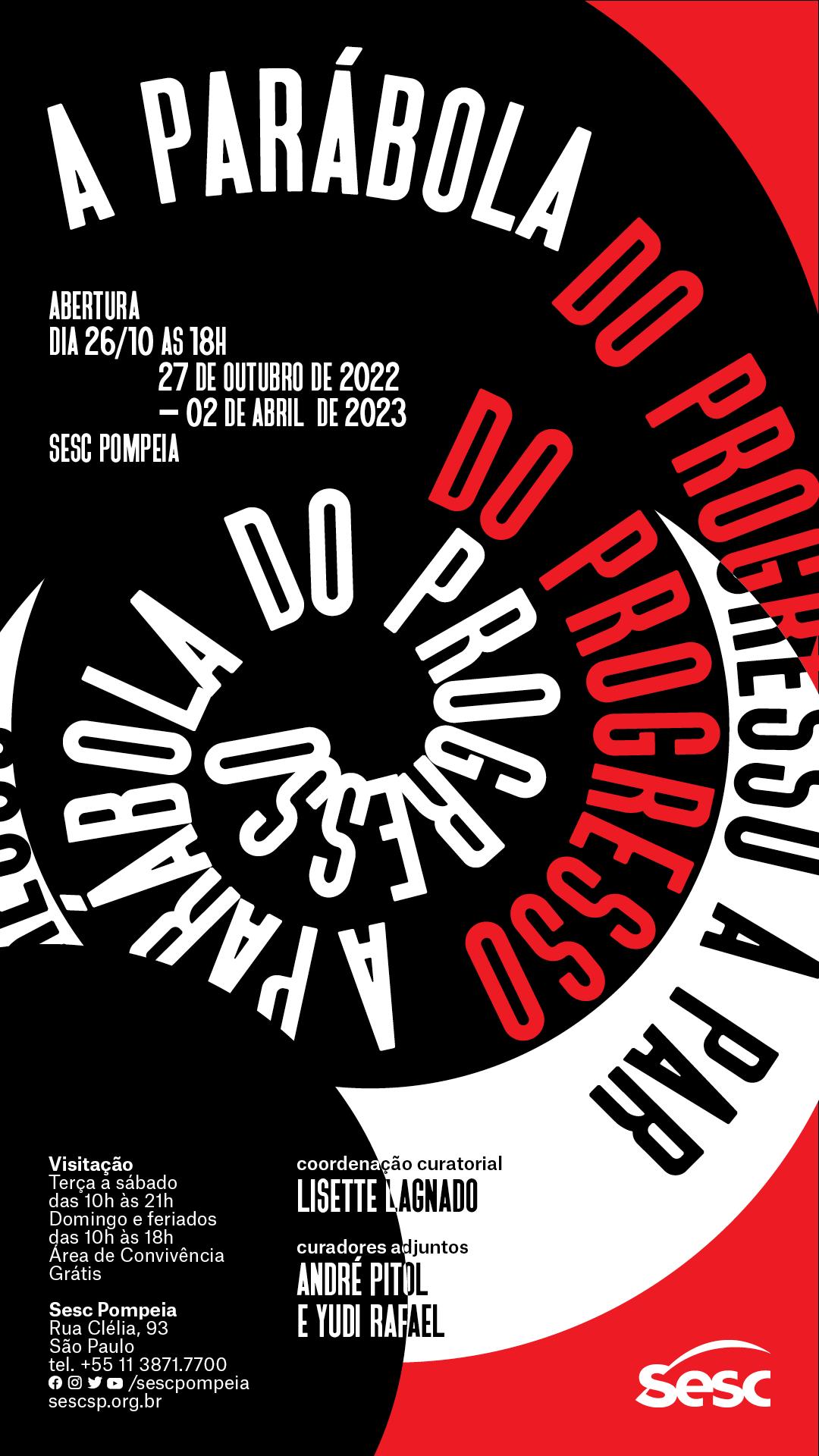
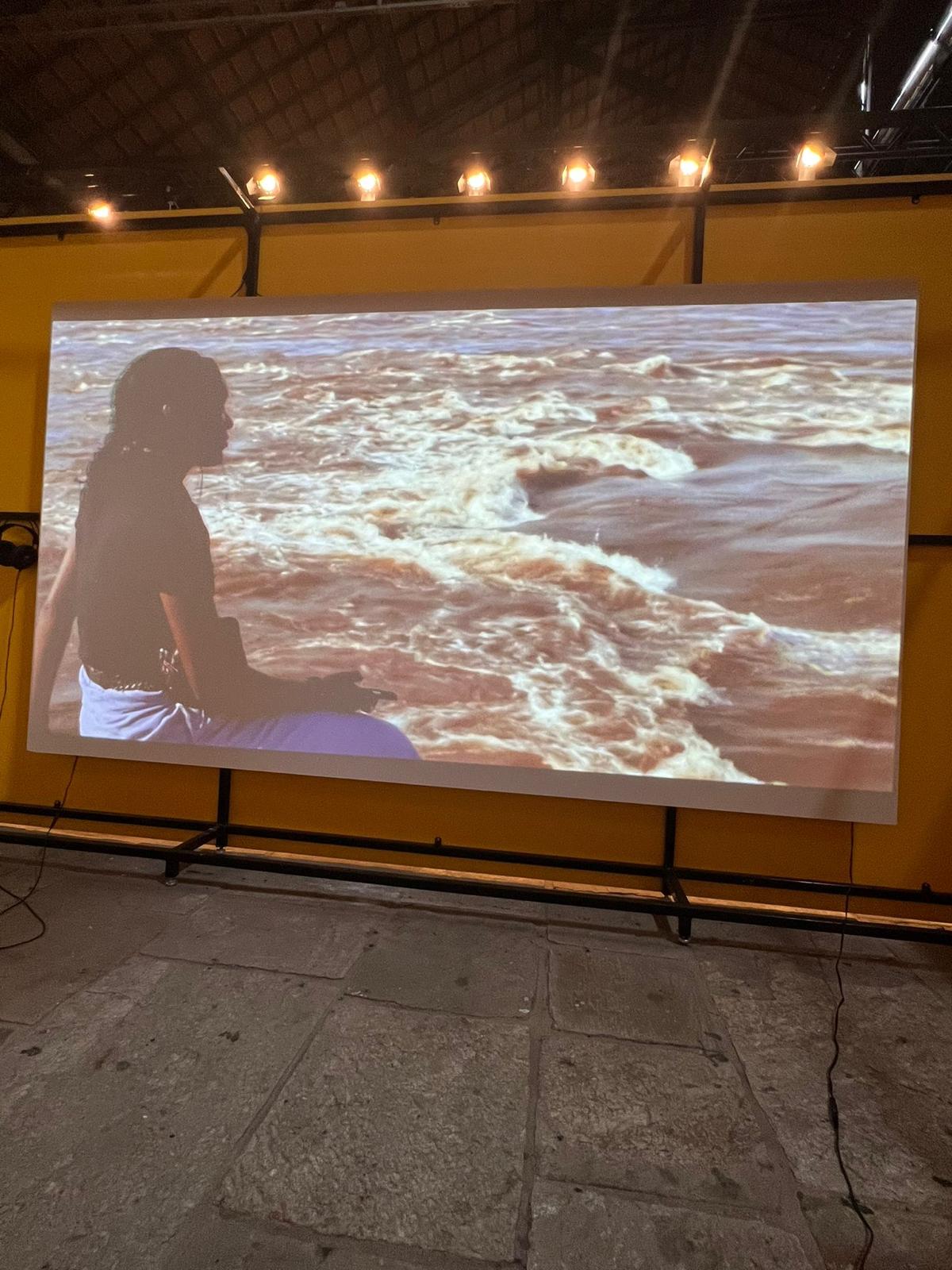
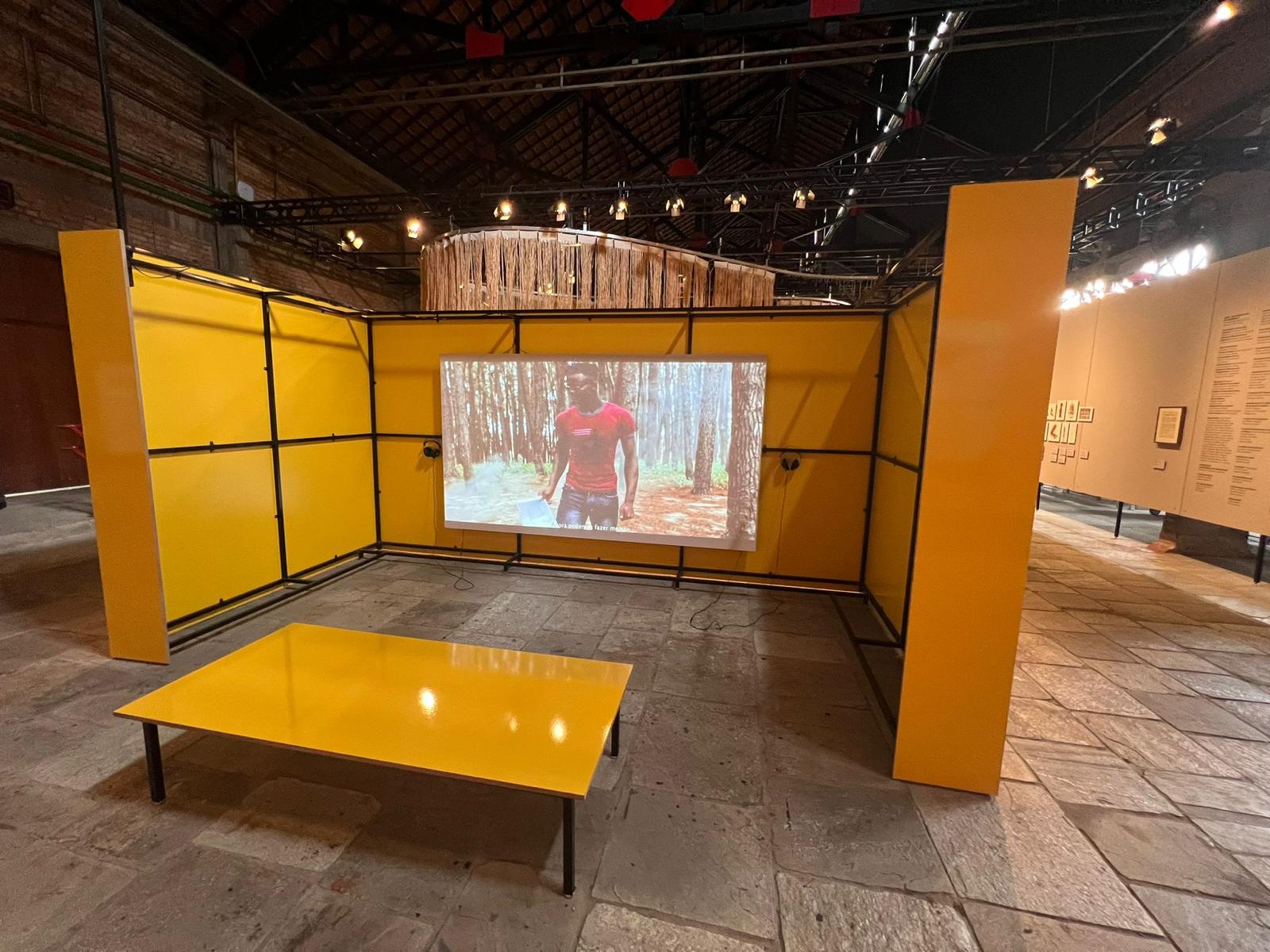
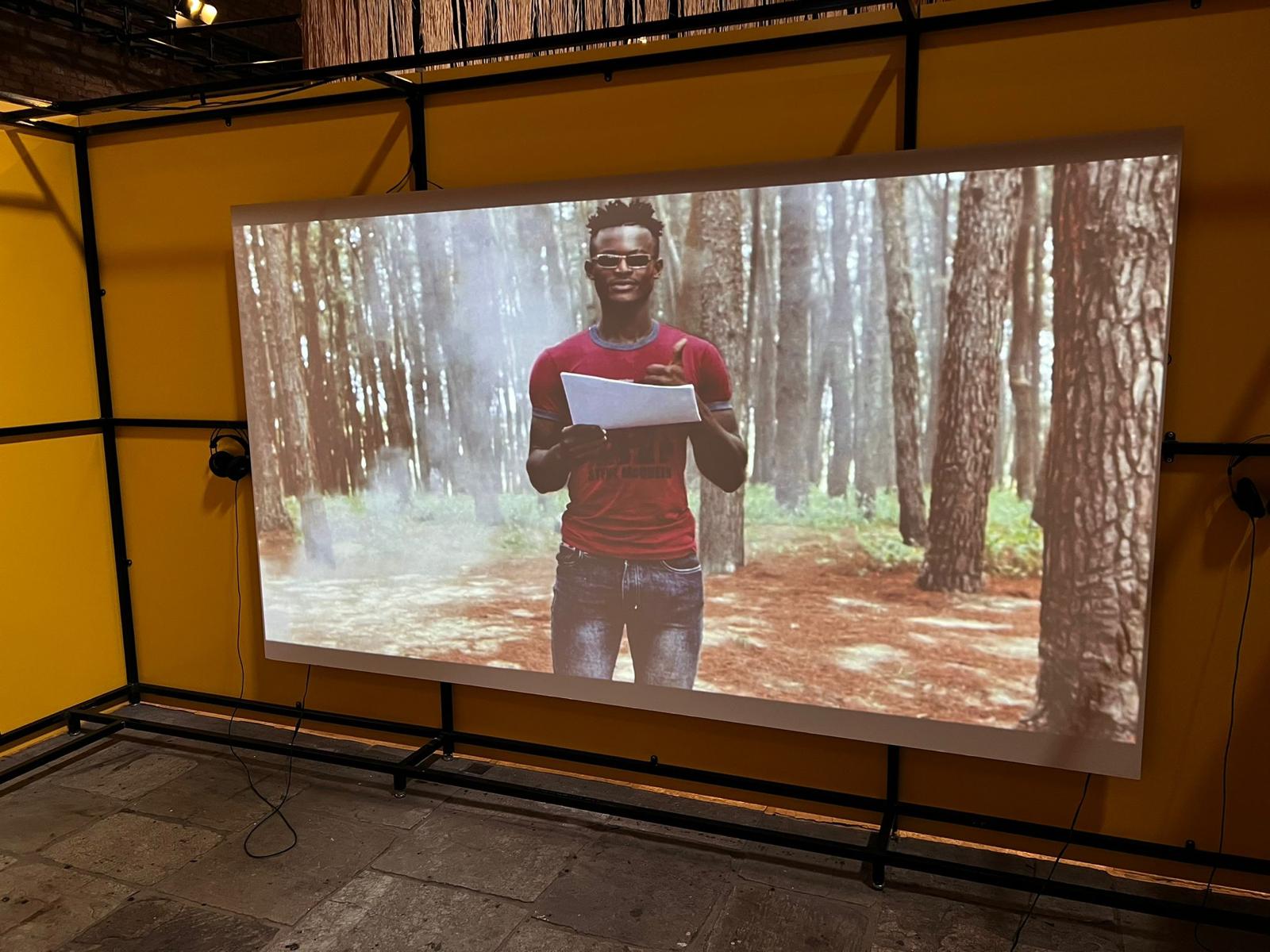
BRAZILIAN WOOD
2022-2023, Brazil/Germany. Video, color, sound, 23’18”.
2022-2023, Brazil/Germany. Video, color, sound, 23’18”.
"Pau-Brasil: from colour to sound" takes as its starting point the tree that lends its name to the country of Brazil, its first resource exploited by Portuguese colonisers in the Americas. Beginning in fifteenth-century Europe, the wood became widely used in the production of violin bows worldwide. Due to its historical and current overexploitation, it is a highly endangered species. The dependence of traditional violin bow production on the endangered species Pau-Brasil and the increasing mass production of bows have led to an international socio-environmental conflict. It seems to me that the case study of this specific material, as well as its history of circulation, use and risk of extinction, can raise important and poetic connections for the writing of an alternative history of the wood and some relations between Brazil and Germany. Moreover, the two year artistic research also proposes a critical dialogue with the centenary of Brazilian modernism from 1922, and one of its most famous manifestos: the Pau-Brasil manifesto.
The project was developed within the Berlin Artistic Research Programme, of which Barbara Marcel was a fellow between 2022 and 2023.
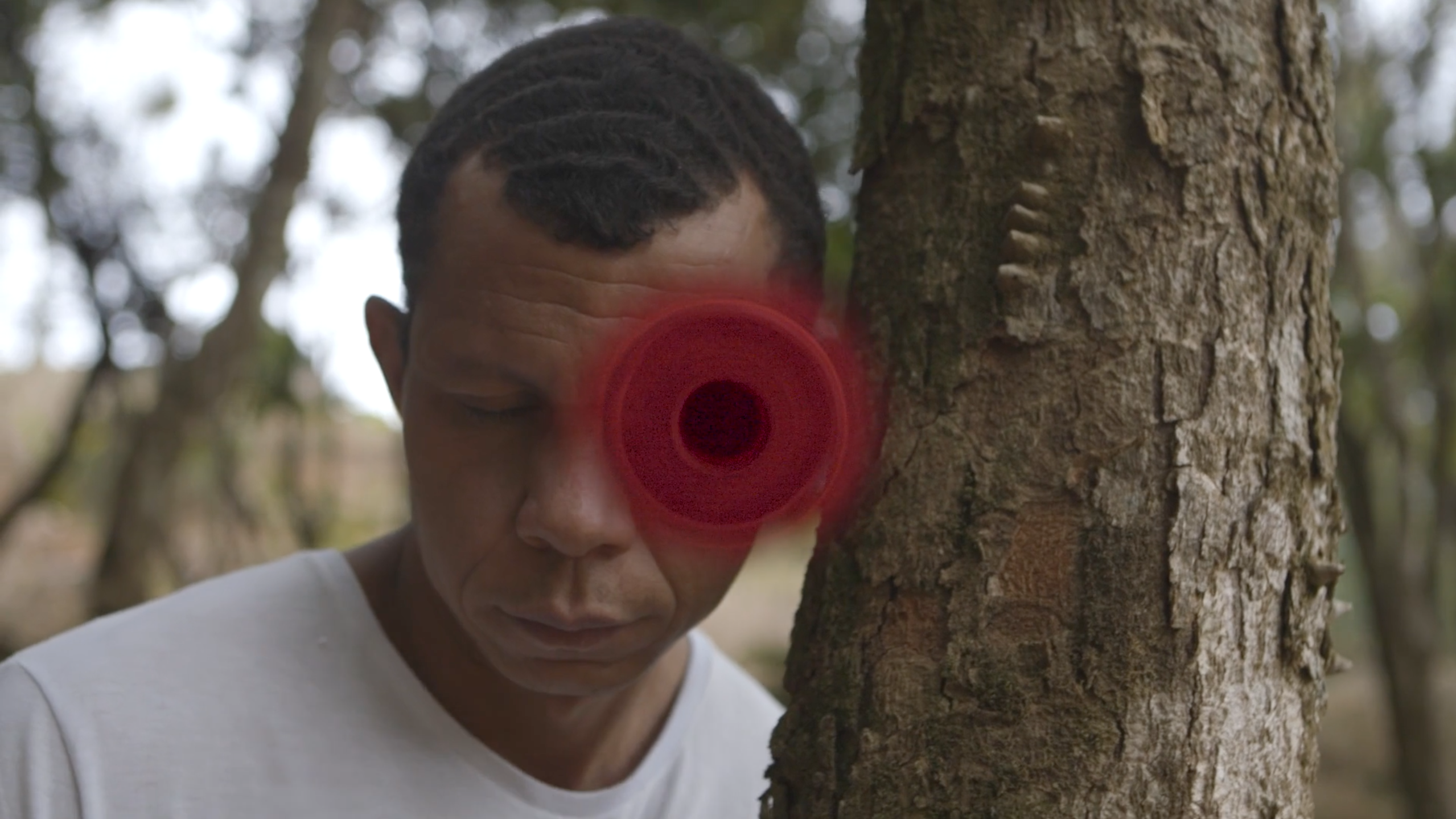

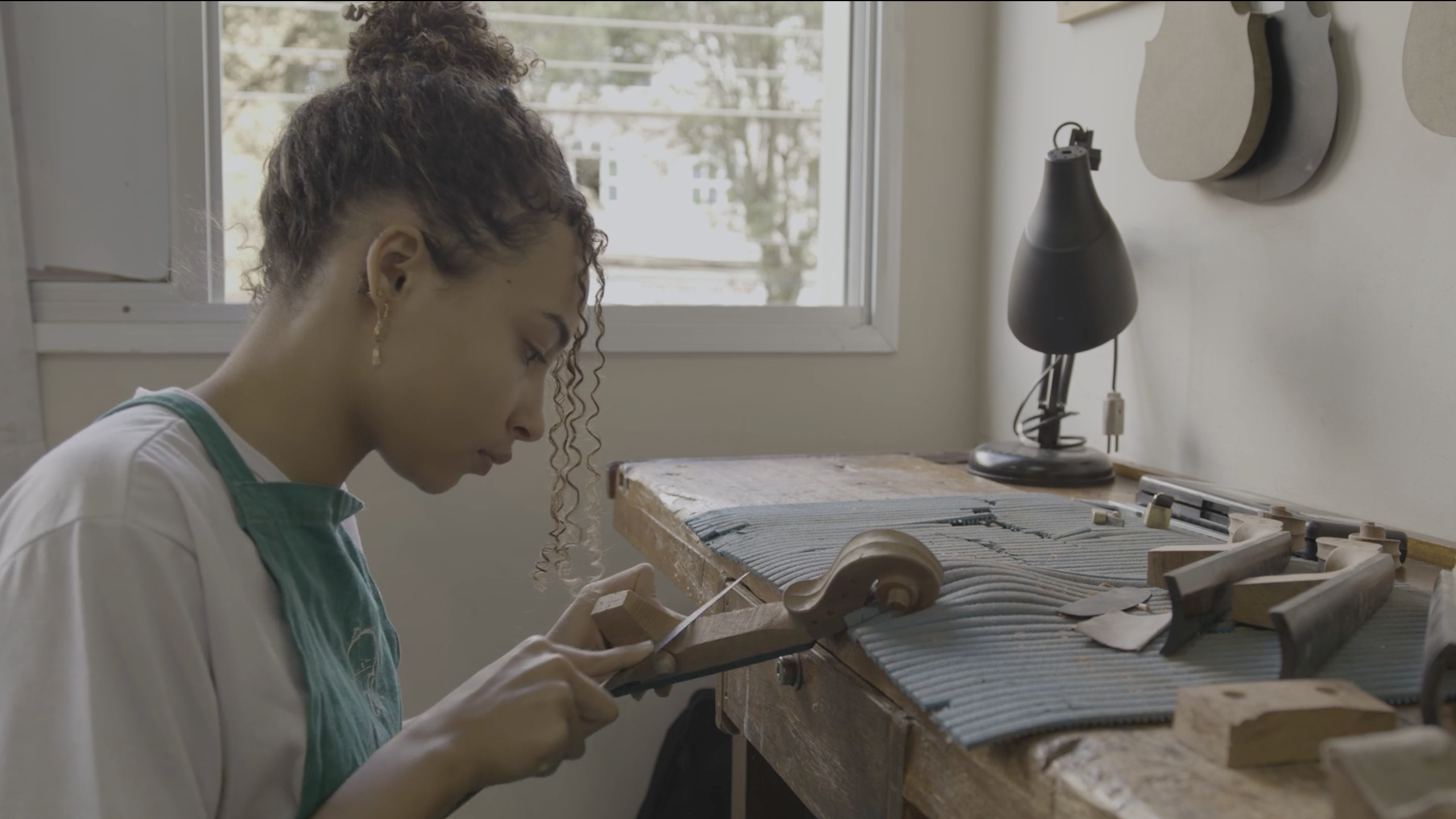
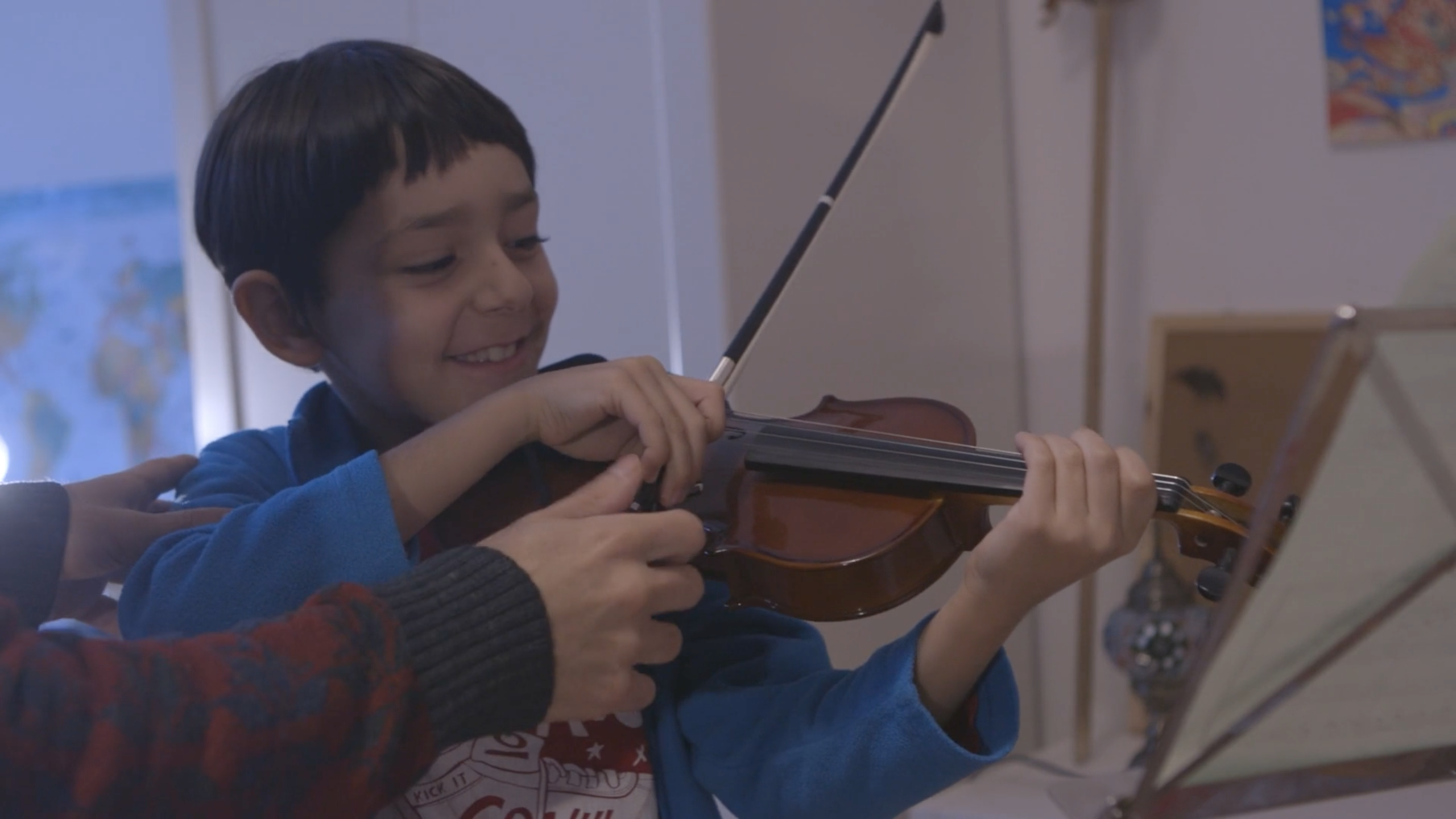
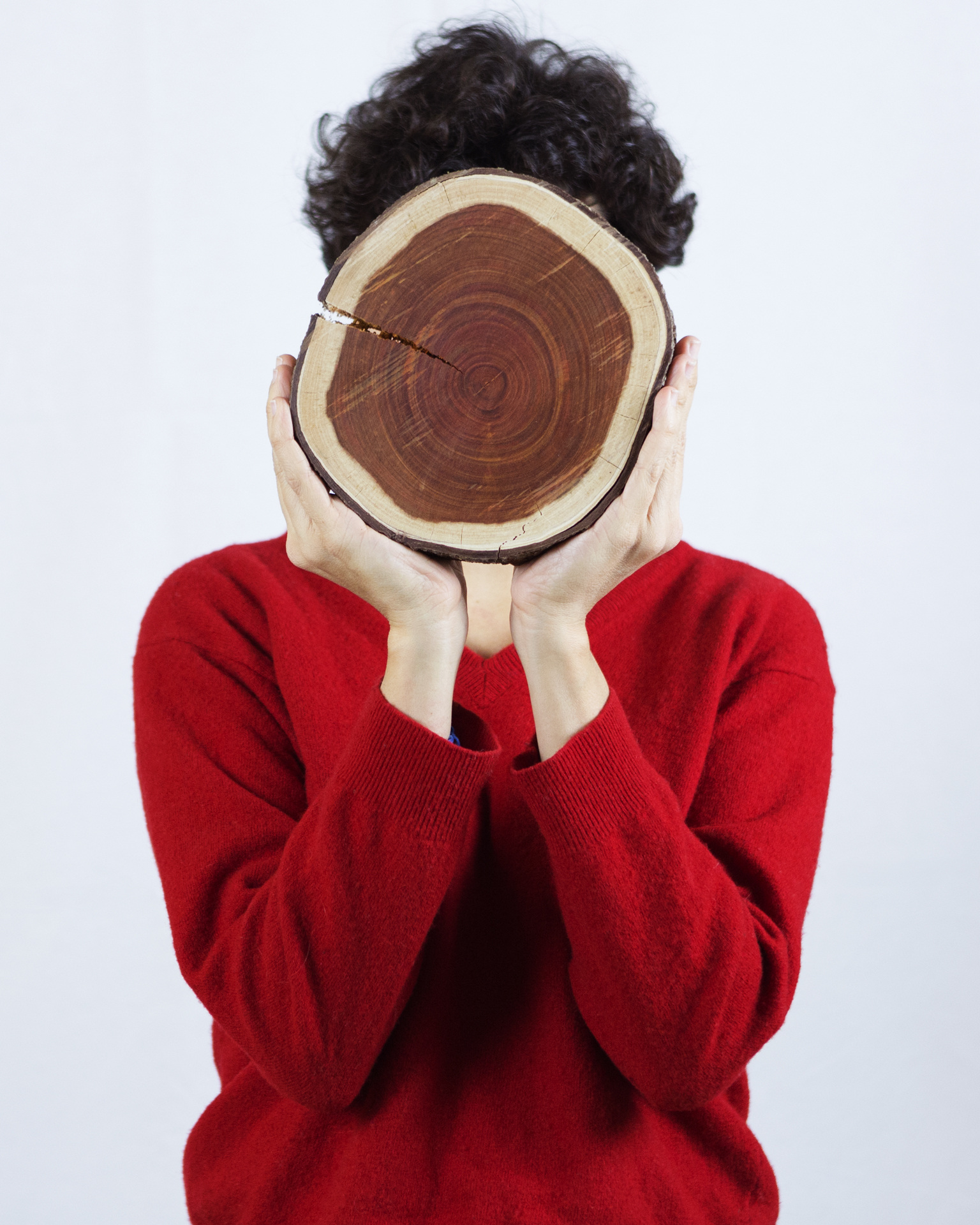
CONDOR
Work in progress, Chile. Video-installation.
Work in progress, Chile. Video-installation.
The work will consist of a video-installation filmed in November 2021 between the Chilean cities of Santiago and Talagante, taking as a starting point the inter-species relationship between humans and birds, their identifications and de-identifications, to observe old and new projections of freedom. From the heated political debates of the Chilean spring of 2021, Marcel establishes a connection between the old astronomical observatory of Santiago, situated in the Cerro Calán and built during the Cold War, and the machinic military control of space, through the production of drone images that simulate and incorporate one of the oldest perspectives of domination of territories: the bird's-eye view.

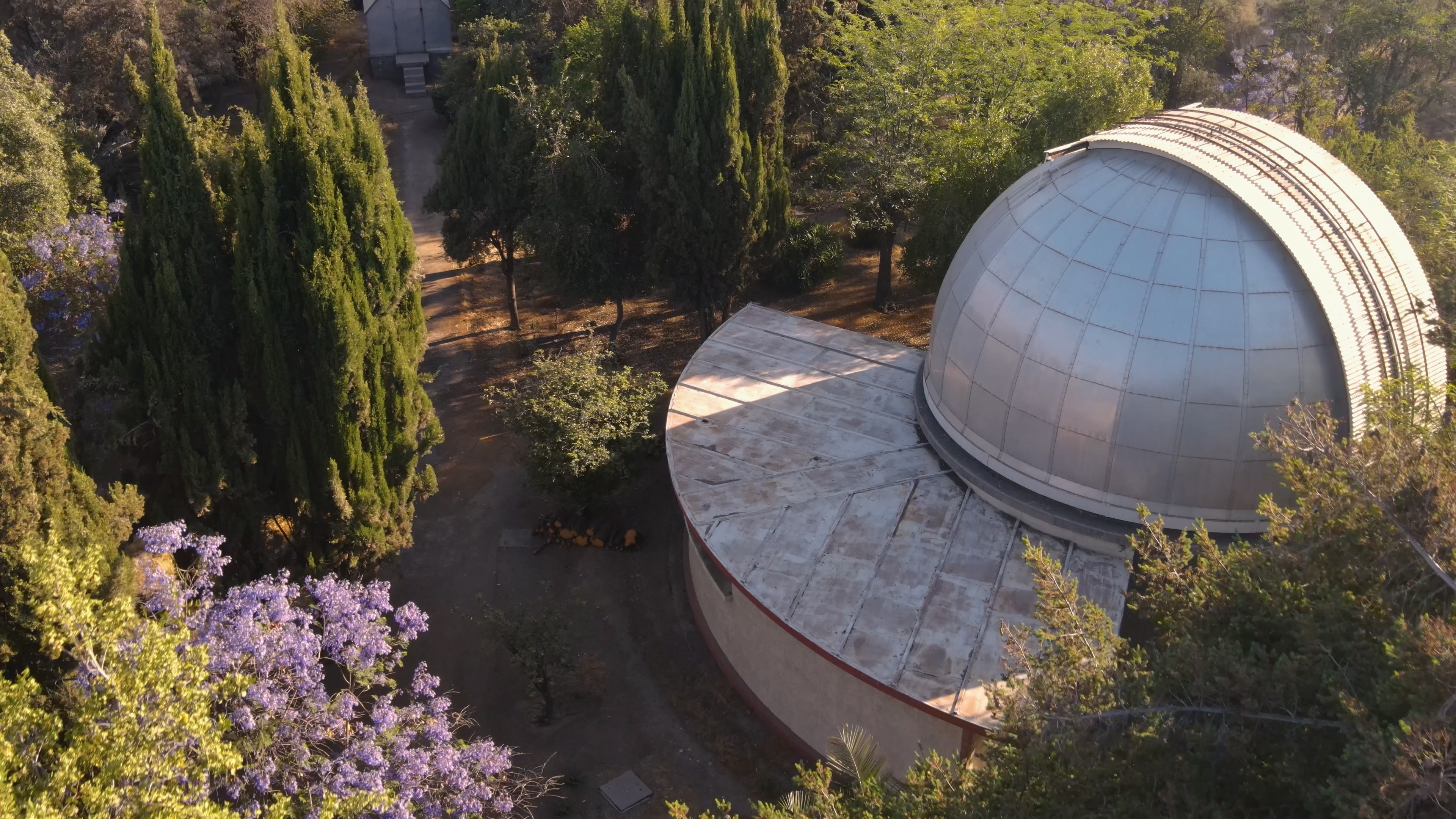
LETTERS FROM SPIRAL TIME
Project being developed by Barbara Marcel as a fellow of the DRESDEN_Zukünftigkeiten/Futurities Transcultural Academy 2023 Dresden.
Project being developed by Barbara Marcel as a fellow of the DRESDEN_Zukünftigkeiten/Futurities Transcultural Academy 2023 Dresden.
LETTERS FROM SPIRAL TIME is an artistic project that emerges from the correspondence between the Brazilian artist based in Berlin, Barbara Marcel, and Vândria Borari, Indigenous/Brazilian artist based in Alter do Chão, Pará - Brazilian Amazon. Based on fragments of pre-Columbian ceramics from the Amazon collected by German ethnologist Curt Nimuendajú and in his correspondence with European museum directors between 1913 and 1945, the project connects seemingly distant beings, such as the Elbe and the Tapajós River (Pará, Brazil). The letters gathered during the period of the artistic research will be transformed into a film, inviting us to the listening of a dialogue with the ethnographic collection of Staatliche Kunstsammlungen Dresden (SKD) and its possible animations.
The project is being developed within the Transcultural Academy 2023 "Futurities" grant.
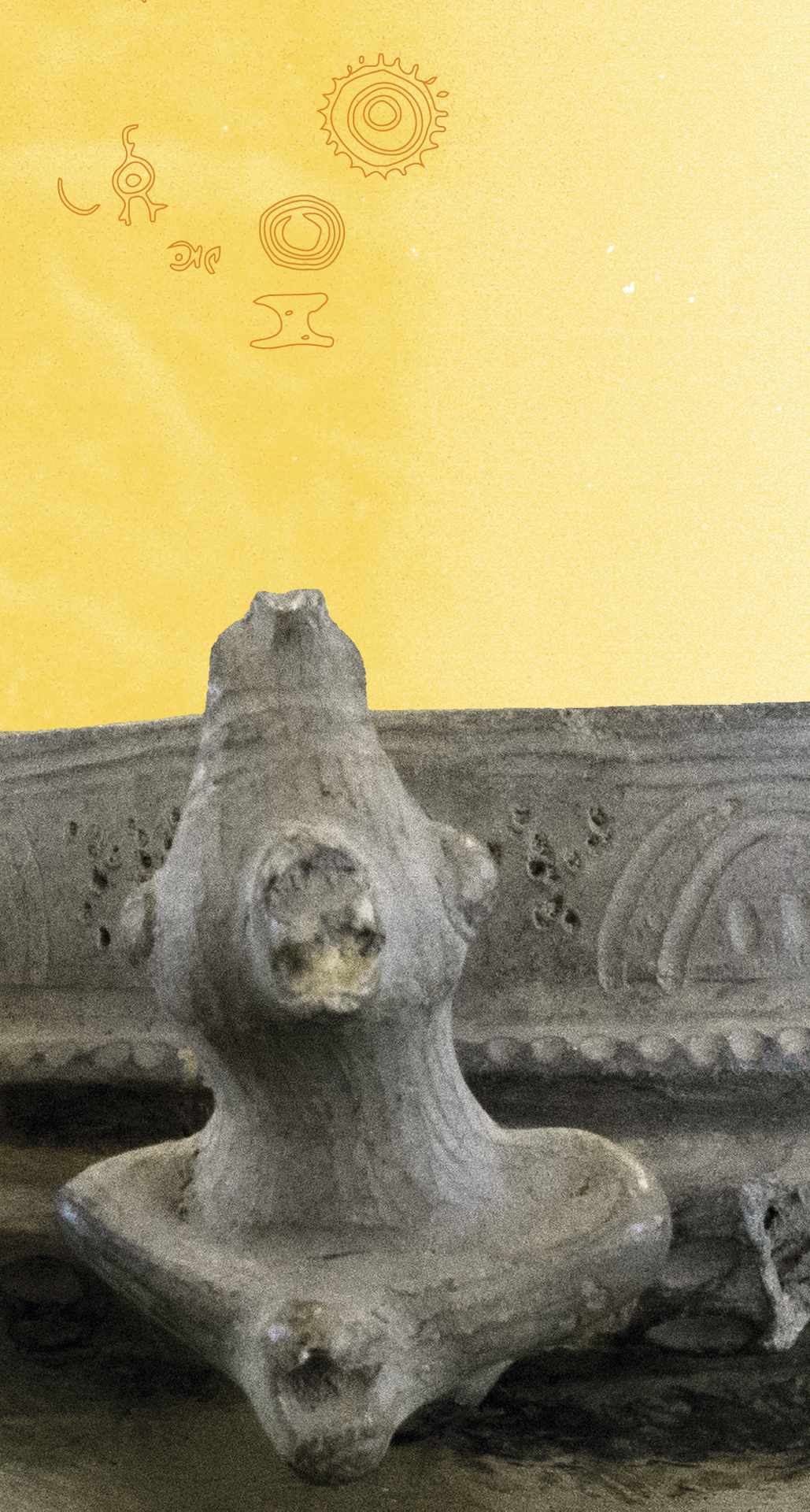
The Transcultural Academy “Futurities” 2023 focuses on museum objects of the SKD as material research repositories that enable collaborative explorations of futurities and new narratives. Futurities describe imaginations of perspectives, for example in dealing with sensitive objects in upcoming exhibitions. These are discussed with significant relevance of the past and present. This is because possible futures are fed by rhythms of the past: material and archive studies are just as much a part of this as losses, violence, absence, potentials and the uncategorizable. Mobilized by the positioning of researchers, curators, visitors or artists, a spectrum of futurities can be activated that exist processually alongside and with one another. The Transcultural Academy is a project of cross-collection research at the SKD in conversation with all SKD collections, artists, academic partners, art academies and friends.
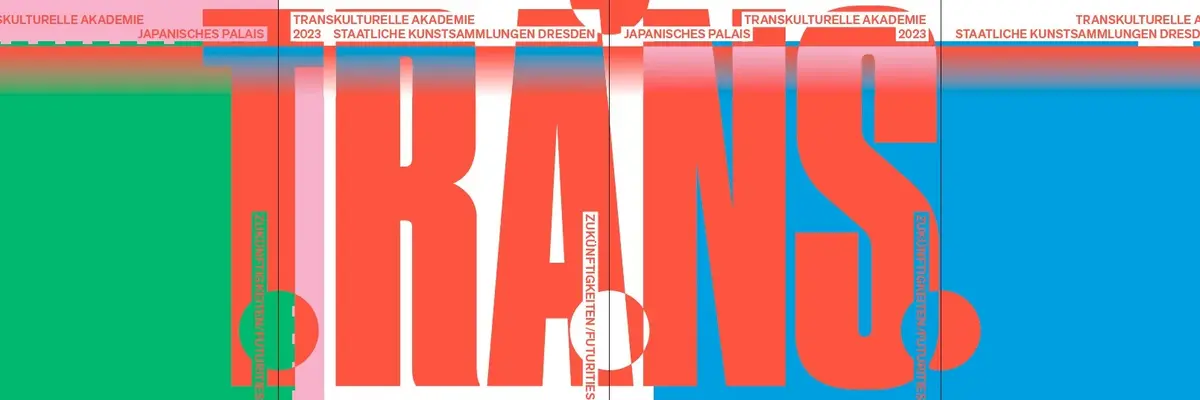
SURARAS
2024, Brazil/Germany. Experimental documentary / video installation. Video, full HD, color, sound, 94’.
2024, Brazil/Germany. Experimental documentary / video installation. Video, full HD, color, sound, 94’.
Natalina Oliveira and Raquel Tupinambá are community broadcasters and grassroots activists from the state of Pará, in the middle of the Brazilian Amazon. They are residents of one of the oldest reservations in the region: the Resex Tapajós-Arapiuns land. Running an independent radio station, they create connections within their people and territory, but also between scientific and community knowledge. The two women are brave Amazonian guardians, known locally as Suraras. When they are invited to visit ATTO, the Amazon Tall Tower Observatory, the highest observation tower in the continent, they embark on an adventure through the rivers and the riverside communities of the largest tropical forest on the planet. Together with them, we connect with the lives, the stories, and the knowledge residing in this territory and its people. We learn about a place of plentiful biodiversity, but also of political struggle and resistance against large-scale extractivism. SURARAS is a documentary on the borders of artistic, scientific, global, and local practices.
World Premiere in September 2024 at the CineBH - Belo Horizonte International Film Festival.
Clipping:
O LIBERAL: CineBH recebe a produção amazônica: filmes paraenses ‘Sangria’ e ‘Suraras’ (includes an interview with Barbara Marcel)
Mídia Ninja: CineBH – Mostra Internacional de Cinema de Belo Horizonte anuncia a programação de sua 18ª edição
Max Planck Institute for Biogeochemistry: "Suraras" at the CineBH International Film Festival
ISTOÉ: Em sua 18ª edição, Mostra Internacional de Cinema de Belo Horizonte exibe 110 filmes
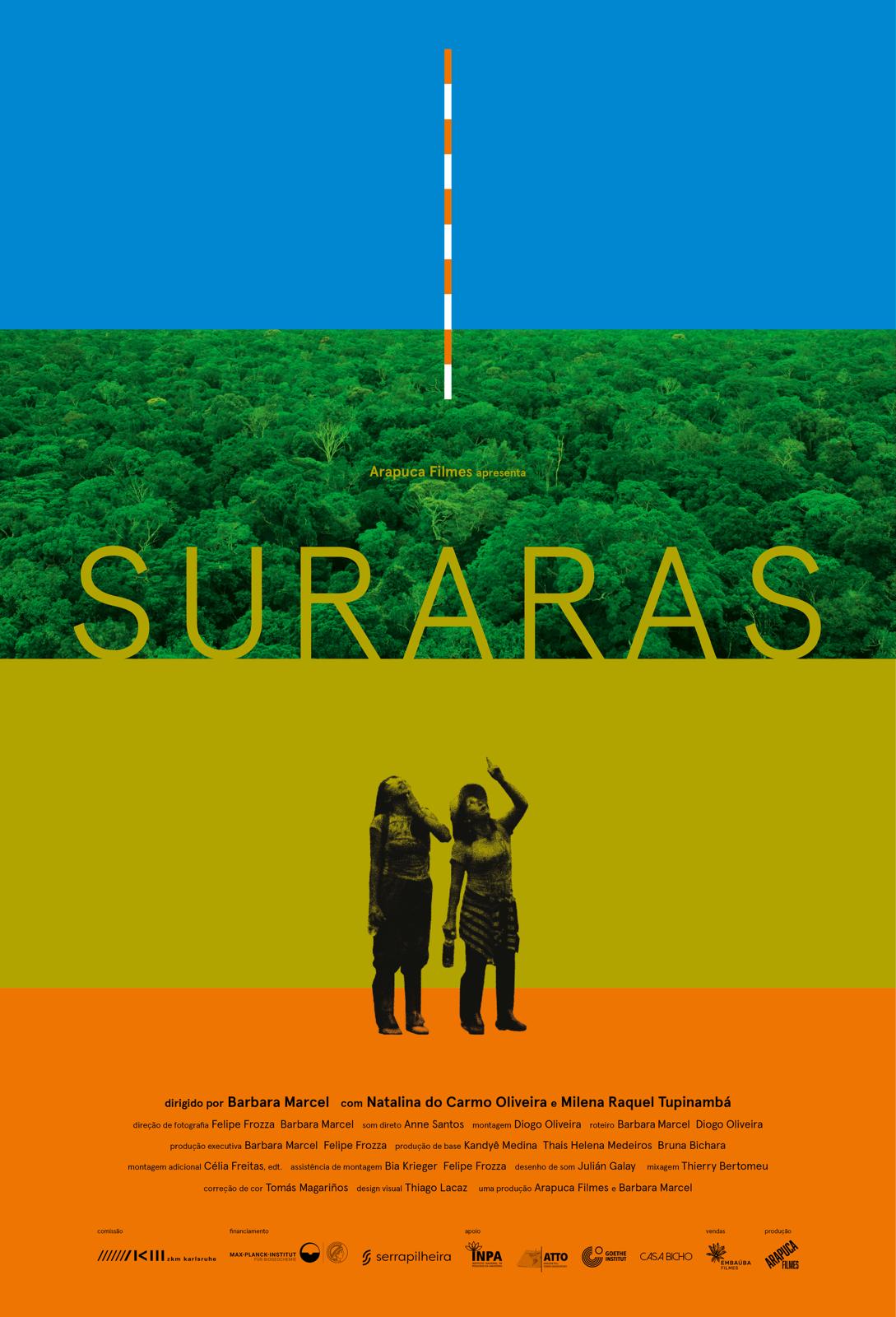
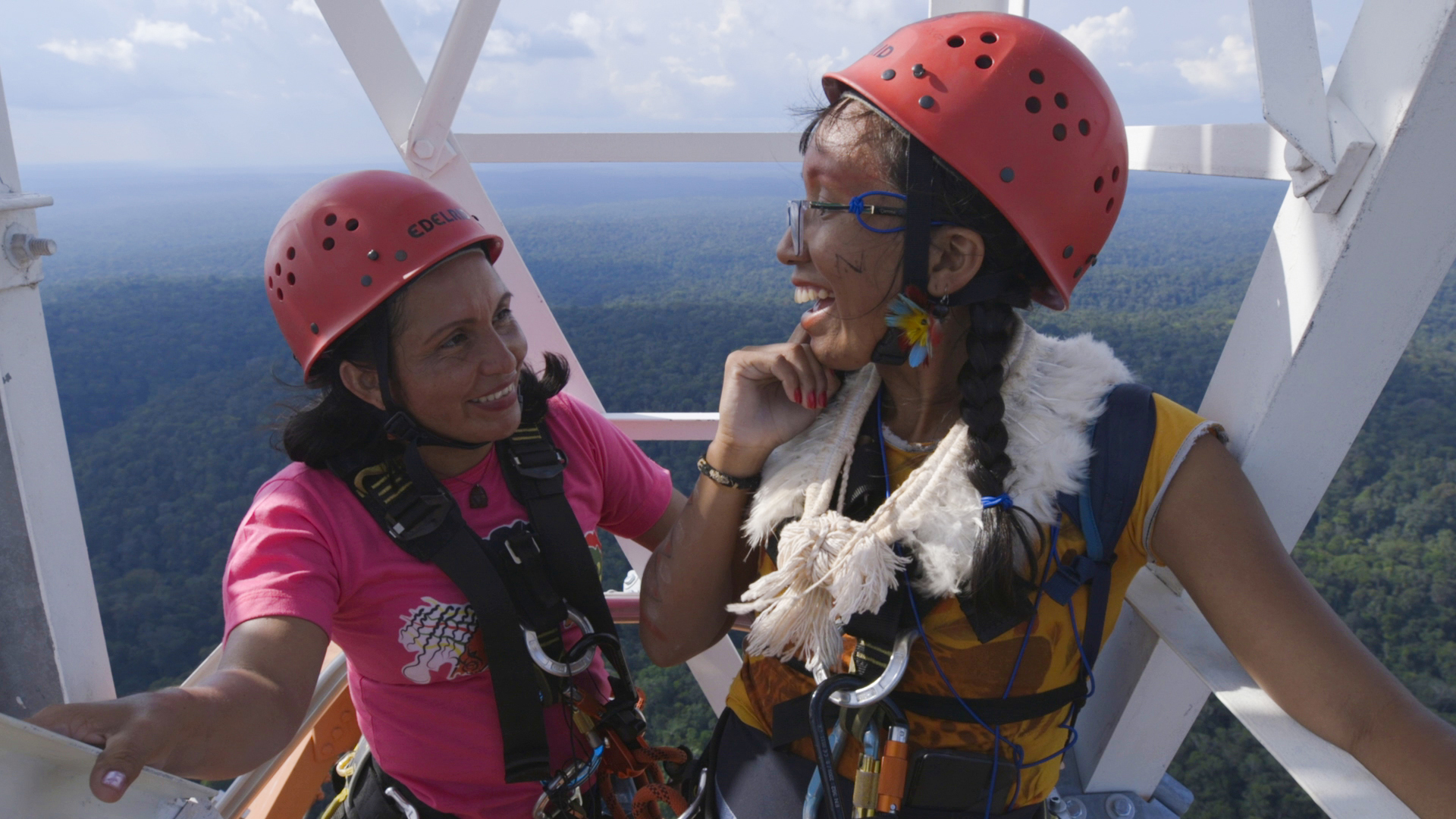

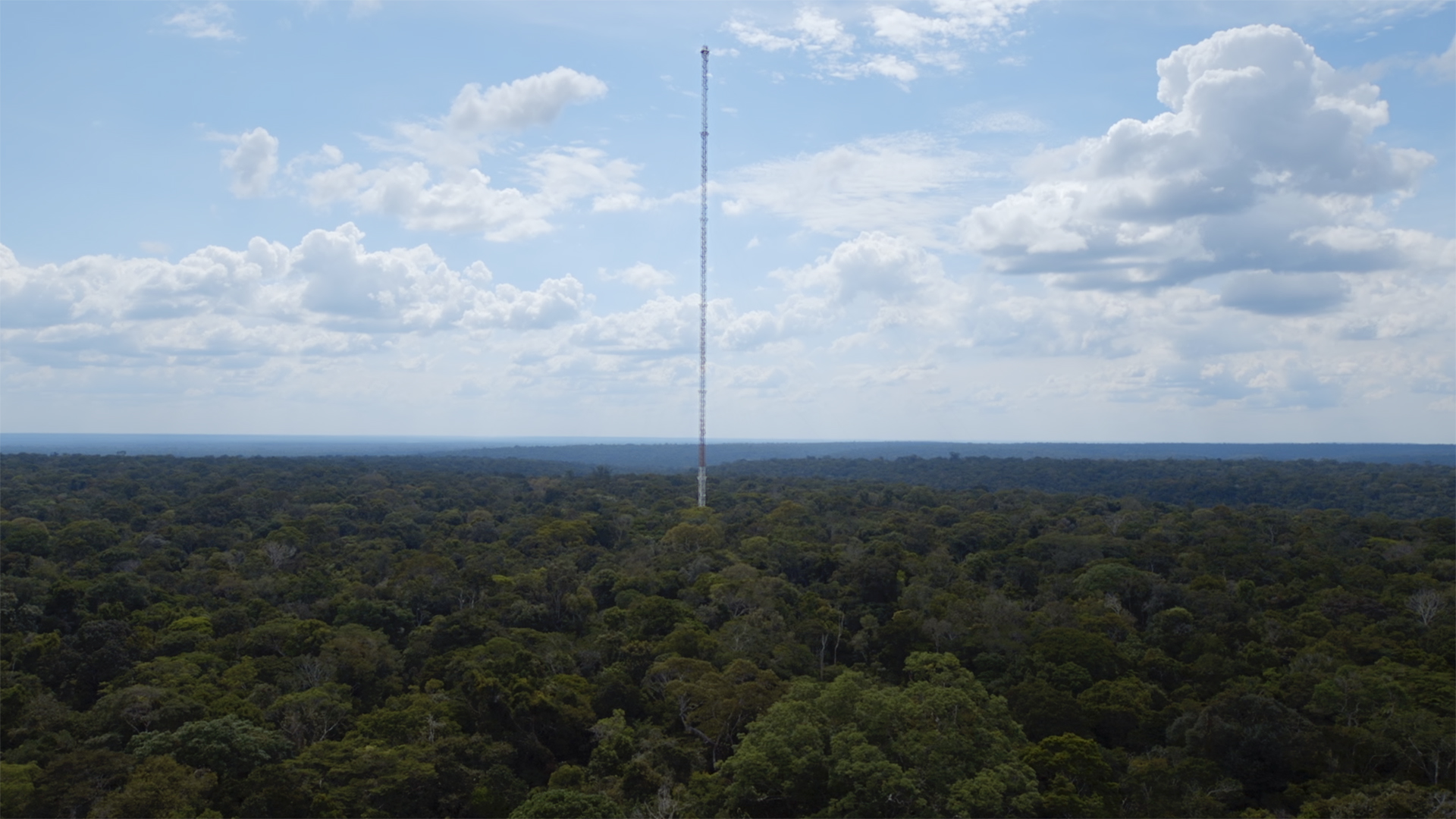

MARLENE
2022, DR Congo-Germany. Video, color, sound, approx. 46min
2022, DR Congo-Germany. Video, color, sound, approx. 46min
During an artist residency in the Democratic Republic of Congo, as part of the YANGO! biennial of visual arts, the German-based Brazilian filmmaker Barbara Marcel, proposes a workshop on Third Cinema for local students of the Kinshasa Fine Arts faculty. Among the films discussed by the group is "Der Leone Have Sept Cabezas" by Brazilian filmmaker Glauber Rocha, a key figure of the Brazilian New Cinema (Cinema Novo Brasileiro). Filmed in Congo Brazzaville in 1969, just across the river, the film is part of Glauber's Tricontinental Cinema project, elaborated between 1967 and 1975, by converging some of Rocha’s films and articles in the same direction and integrating political analysis, aesthetic renewal, and the creation of utopias of liberation of the so- called “Third World” countries. Marlene is the result of the screening and reception of Glauber's film today, the debates about militant cinema, the tricontinental project, and the new encounters produced in the Kinshasa workshop.
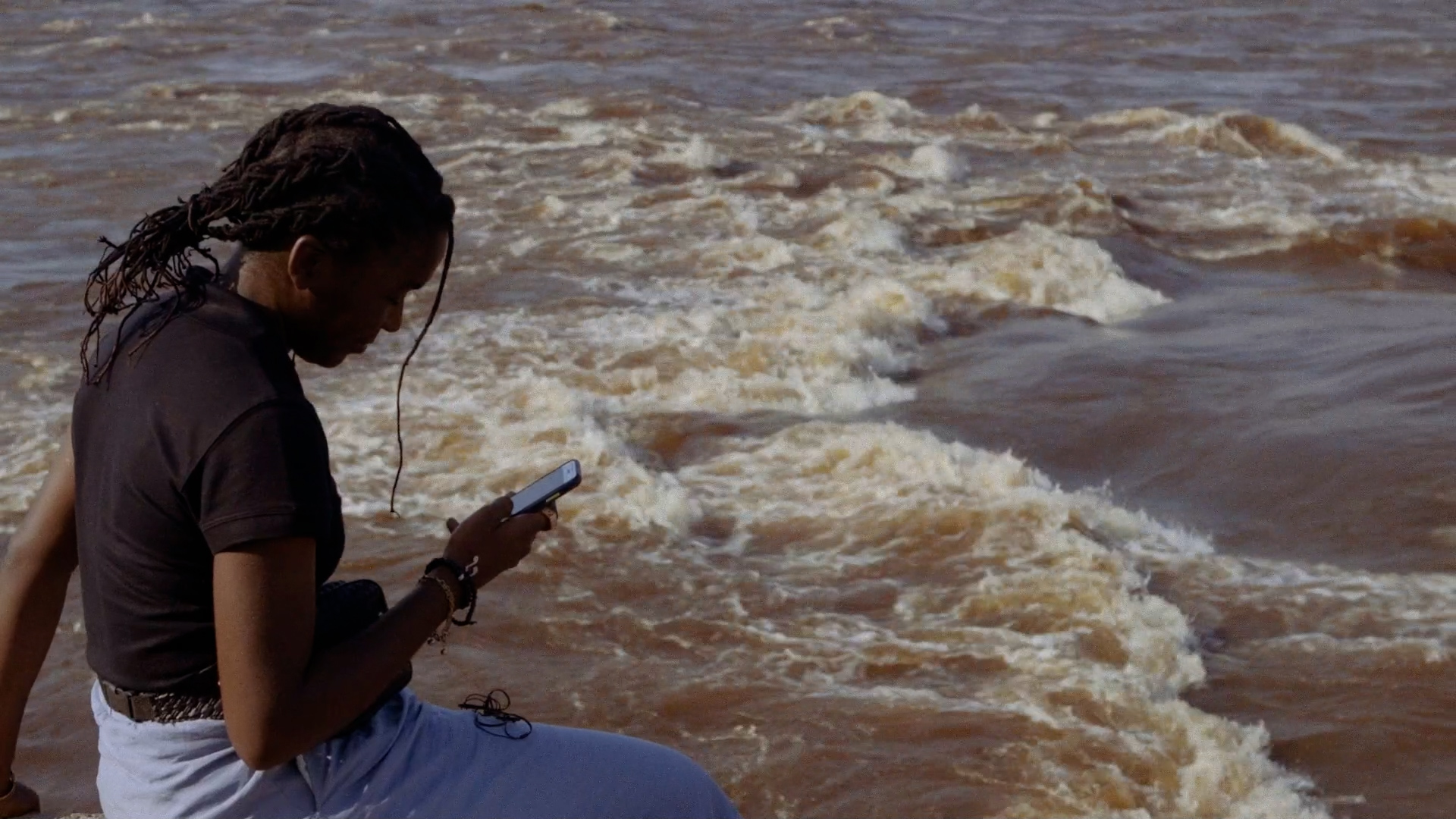




Film credits
WITH
Maité Moseka Botembe
Sephora Mianda
Pascoal Francisco Konde
Azgard Wenga Itambo
Wezam Moimi
WORKSHOP PARTICIPANTS
Dikamba Bénédicte
Moyo Merdie
Kasangati Daniel
Amanda Daniella-Richess
Ndungi Landry
Nzembeyo Emmanuel
Batupe Bryan
Holy Jonathan
Chris Shongo Loody
Bitshilualua Hancy
Samuel Mwani Ngange
Silas Nsilulu Nloko
Aris Likonda
John Dewitt Makengo
Joyce Lukoki Nsimba
Paulvi Ngimbi
Isaac Sahani Dato
DIRECTING AND IMAGE
Barbara Marcel
EDITING
Diogo Oliveira
SCRIPT
Barbara Marcel and Diogo Oliveira
DIRECT SOUND
John DeWitt Makengo
SECOND CAMERA
Azgard Wenga Itambo
SOUND MIXING
Thierry Bertomeu - Nova Pista
COLOR CORRECTION
Antoine d’Artemare
EDITING ASSISTANT
Beatriz Krieger
SET PRODUCTION AND TRANSLATION
Maité Moseka Botembe
Isaac Sahani
Paulvi Ngimbi
TRANSPORT AND GUIDE
Cedrik Tshimbalanga
SUBTITLES
John DeWitt Makengo
Paulina Hupe
Beatriz Krieger
PRODUCTION
Barbara Marcel
ASSOCIATE PRODUCERS
ifa - Institut für Ausländische Beziehungen
YANGO! Biennale
Matière Revue Studio
This film was produced during an artistic residency in Kinshasa, as part of the YANGO! Biennal of Arts.
YANGO! Biennale Team
Sara Alonso Gómez
Nadia Yala Kisukidi
Sinzo Aanza
Dada Kahindo
Isaac Sahani
Paulvi Ngimbi
Muriel Babandisha
Michel Mayoyo
Patrick Wassy
Wendy Bashi
Hélène Ballis
Robert Mumbala
Fragment of MESSAGE TO THE TRICONTINENTAL by Ernesto Che Guevara.
Speech given in Havana, April 16, 1967.
Extracts from the film DER LEONE HAVE SEPT CABEÇAS
by Glauber Rocha, Congo Brazzaville, 1970.
© Herdeiros de Glauber Rocha / Copyrights Consultoria
Music OXOSSI by Guga Stroeter.
THANKS TO
Ruy Gardnier
Lisette Lagnado
Luiza Prado
Felipe Frozza
Lydia Schellhammer
Christ Mukenge
Marian Kaiser
Astrid Matron
Hermani Heffner
Joyce Soares
Ava Rocha
Paloma Rocha
Juliana Perdigão
Jérôme Chazeix
Felipe Campos
VULTURE
20.04.2021-20.05.2021, Berlin. Artistic intervention on billboards at U1 Kottbusser Tor subway station (Kreuzberg - Berlin)
20.04.2021-20.05.2021, Berlin. Artistic intervention on billboards at U1 Kottbusser Tor subway station (Kreuzberg - Berlin)
SÜDSTELLIUM is a project conceived by Matheus Rocha Pitta, Ana Hupe and Barbara Marcel, which proposes transmissions and collaborations with artists based in Brazil. As a fruit of these dialogues, three images will occupy billboards of the U1 subway at the Kottbusser Tor station in Berlin between 20.04 and 10.05.2021.
In a dialogue with Vândria Borari, Barbara Marcel wonders how it is possible to imagine the sky of Alter do Chão from the city of Berlin.
What if to see the fallen skies of the Amazon one had to look at the soil, look at the clay and ceramics found on the shores of the Tapajós River? On a visit to the Berlin Ethnographic Museum in 2019, at the invitation of Barbara Marcel, the also artist, lawyer and indigenous activist Vândria Borari had for the first time contact with the collection of pre-Columbian art located in Berlin. Amidst the museum's large collection of South Amerindian pieces, Vândria encountered Tapajonic vases, amulets and ceramic fragments, material culture of her ancestors. The collage resulting from the dialogues between the two brings together one of the vases from Berlin's collection; drawings by German-Brazilian ethnologist Curt Niemuendajú of one of the oldest cave paintings in the Amazon, located at the archeological site of Monte Alegre, Pará; and a photograph by Barbara Marcel of vultures sunbathing on Carauarí beach in Alter do Chão. According to Tapajonic cosmology, vultures are animals capable of connecting the immanent world with the transcendental realm. Regarded as funerary agents in some cultures around the world, they continue to be important interspecies caretakers in the ecological balance of the Amazon biomes, as well as sacred animals for the Borari indigenous people. In the Tapajonic ceramic vase acquired by the Berlin Museum in 1932 by the museum's former director, art historian Erich Wiese, we see female figures of caryatid women supporting the base of the vase and vultures on top of the piece. The collaborative project between Vândria Borari and Barbara Marcel is part of a long-term project on Tapajonic ceramics in European museums and a film to come.

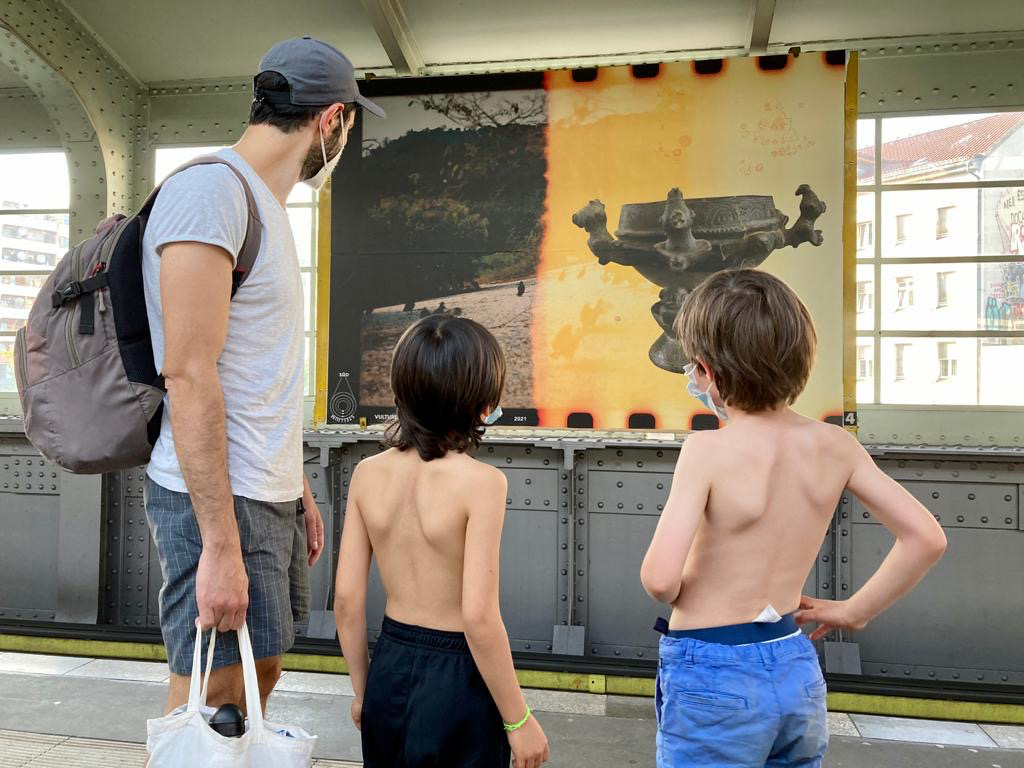
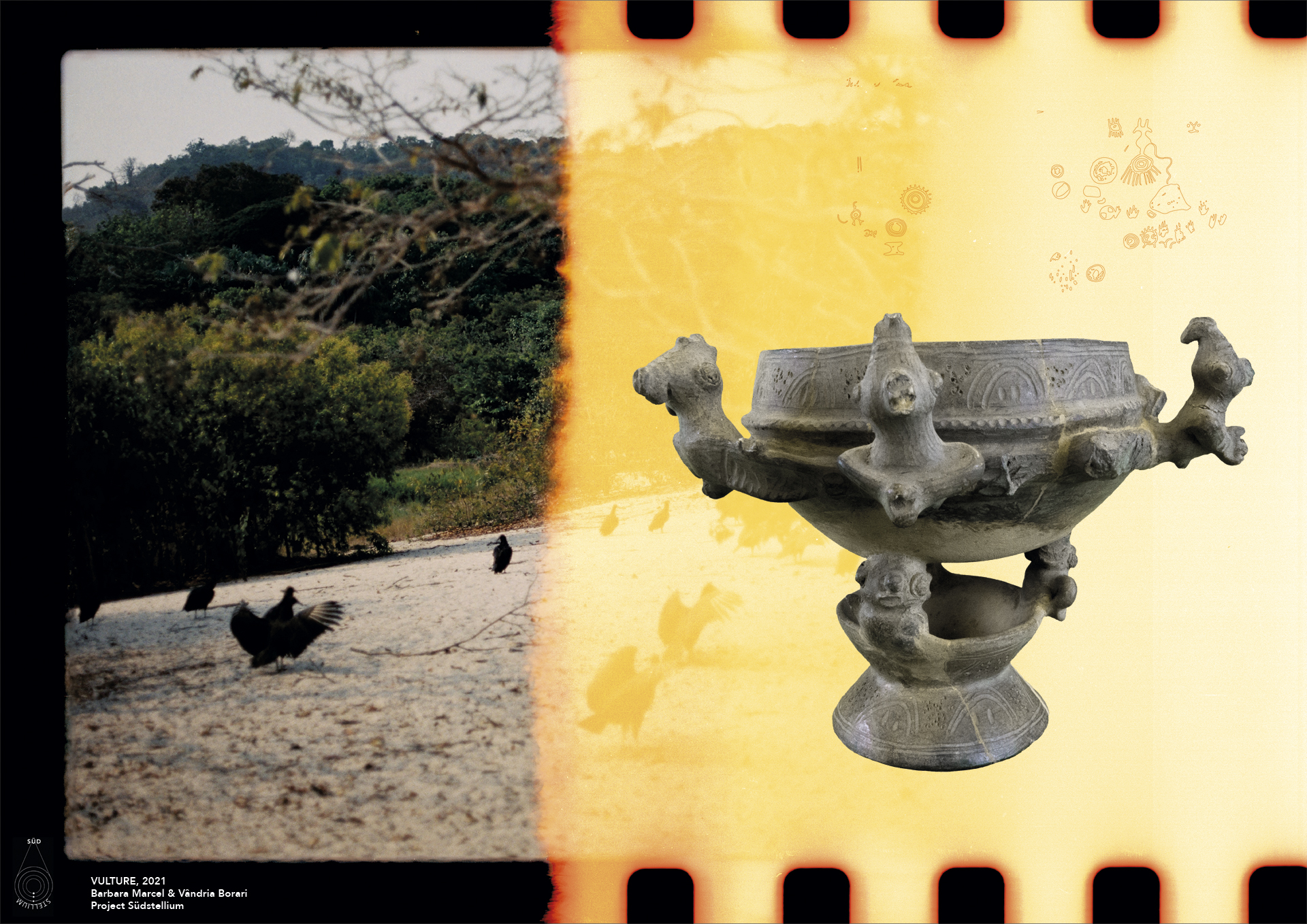


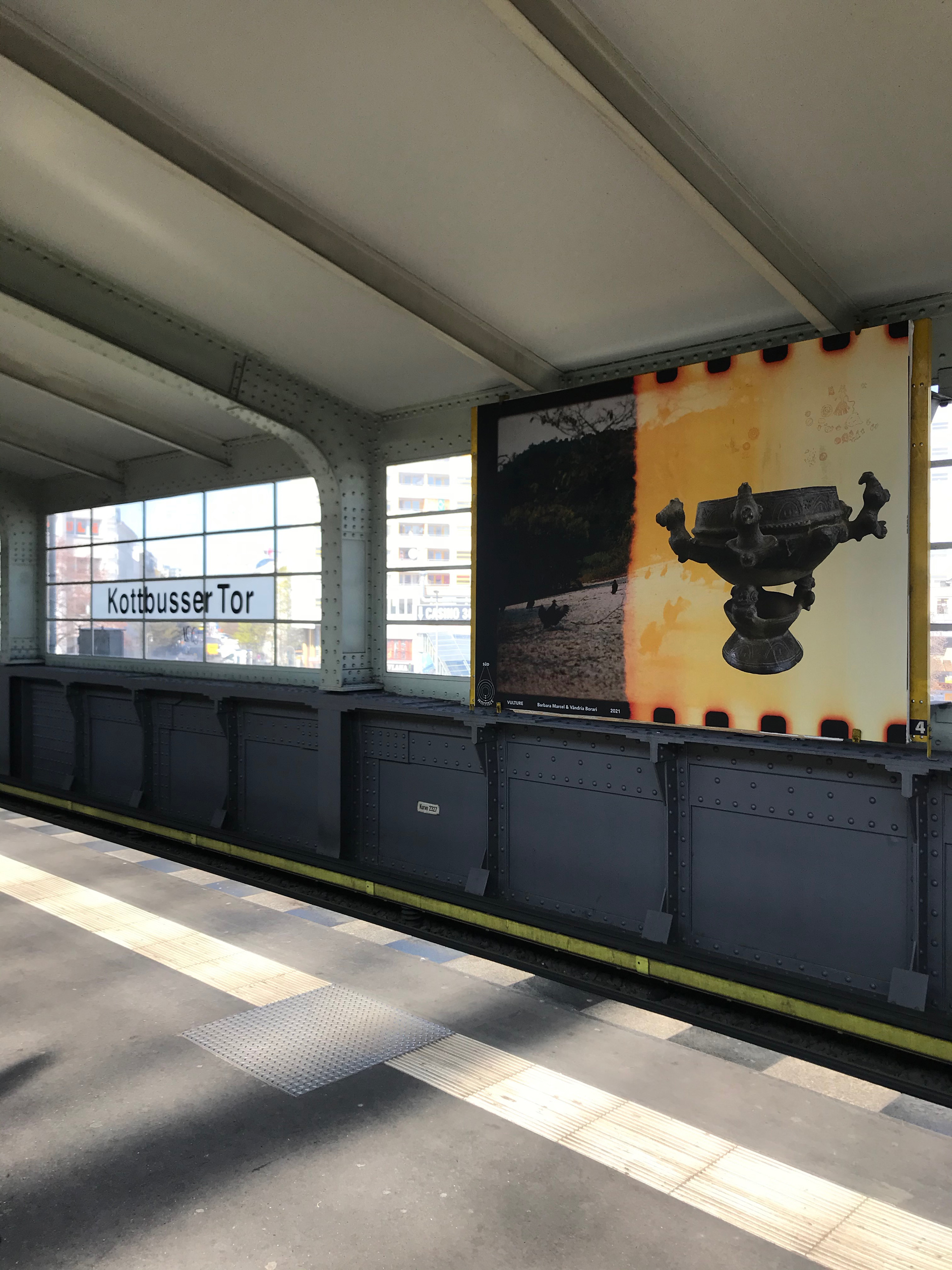
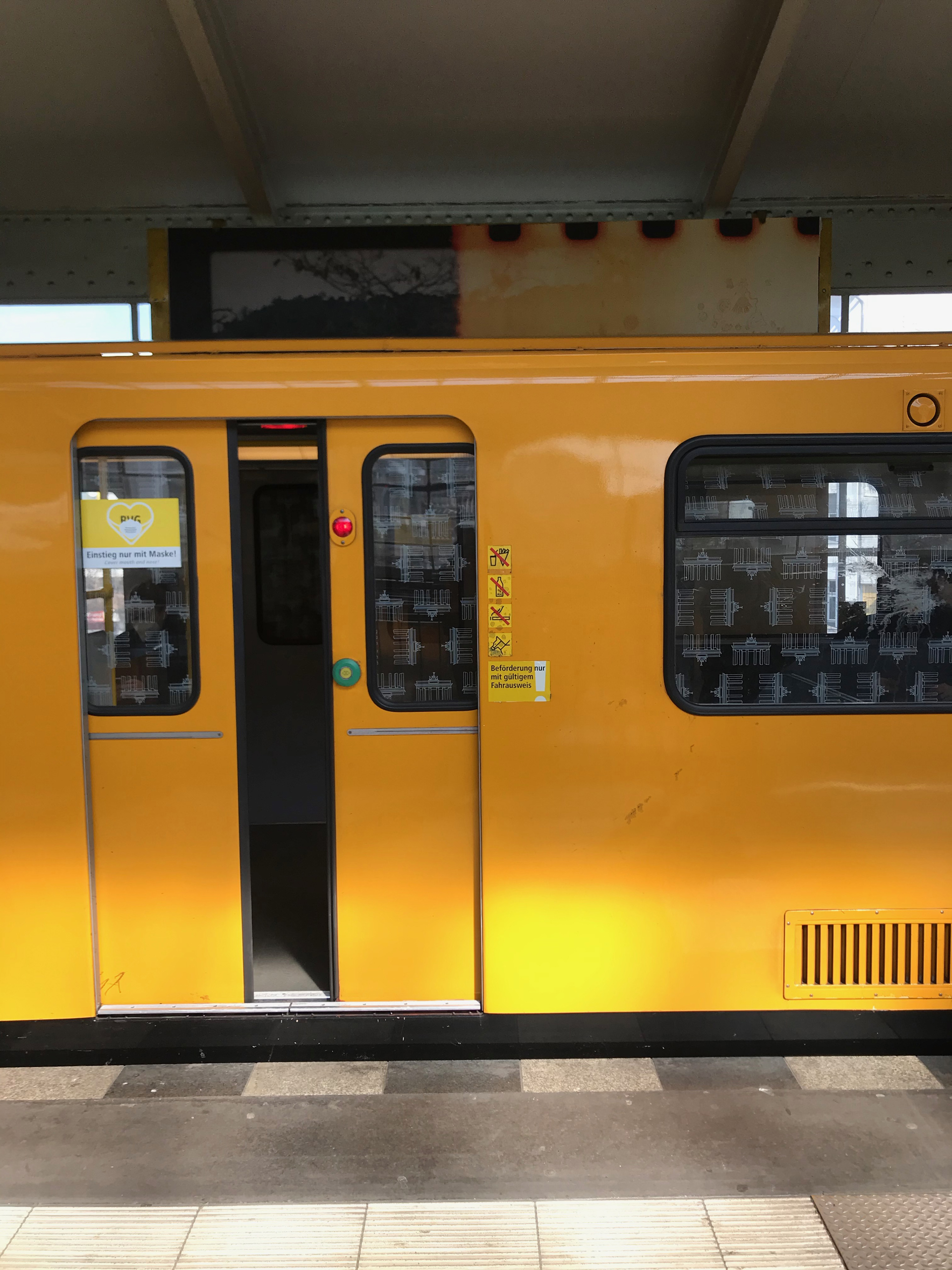

CINE LIANA
2020, Ciné-Cipó – Cine-Liana: ATTO – Amazon Tall Tower Observatory. Multichannel video installation, 126 min.
2020, Ciné-Cipó – Cine-Liana: ATTO – Amazon Tall Tower Observatory. Multichannel video installation, 126 min.
The artistic project Ciné-Cipó / Cine Liana at ATTO Tower (2020) shows in a video installation the production and exchange of different types of knowledge – scientific knowledge from the international scientific community as well as traditional knowledge of the people living in the Amazon rainforest. The largest tower in Latin America, the Amazon Tall Tower (ATTO), aims to study the interactions between the forest, soils and atmosphere of the region in order to understand the role of the Amazon basin for the Earth system. The tower is part of an international cooperation between Brazil and Germany, built and financed by INPA - Amazon Research Institute and Max-Planck Institute. For the project, the tower was temporarily occupied and transformed into a community radio under the command of Natalina Oliveira and Milena Raquel Tupinambá. Produced in collaboration with the ZKM - Zentrum für Kunst und Medien Karlsruhe for the exhibition "Critical Zones - Observatories for Earthly Politics", curated by Bruno Latour, Peter Weibel, Martin Guinar and Bettina Korintenberg, the project's proposal was to create a meeting between two popular radio communicators from Pará and research scientists from ATTO.
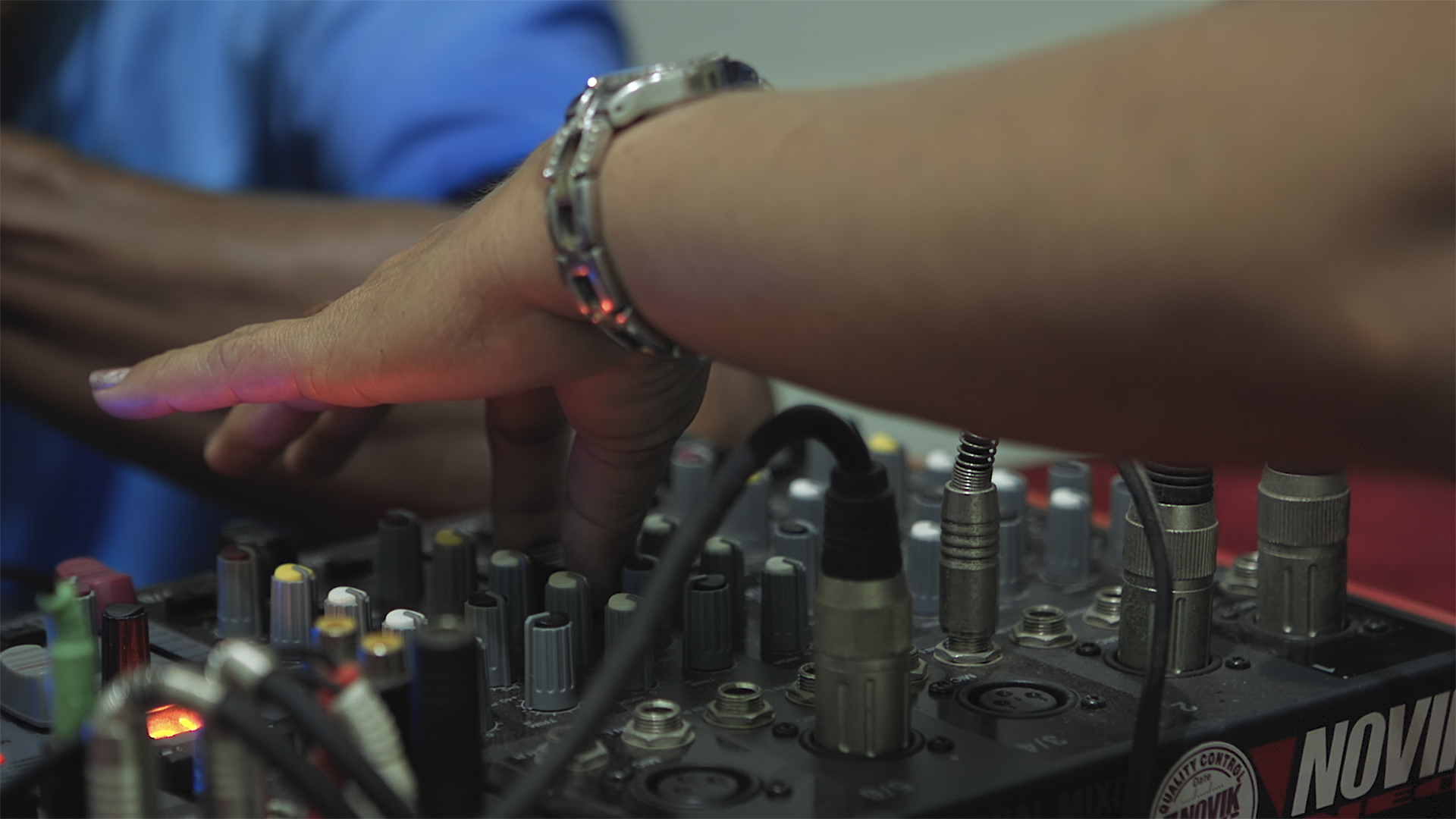
How is the scientific knowledge produced at ATTO democratized? How does this knowledge impact and dialogue with indigenous quilombolas and riverside communities? Making data accessible to the global scientific community is as challenging as communicating it to more people. The artist therefore proposes a collaboration between scientists and local radio communicators of Resex Tapajós-Arapiuns river. The scientific results and traditional knowledge are set in relation, forming an alliance for the defense of the Amazonian biodiversity. Atmospheric and earthly data are translated into popular communication via a radio show with spots, interviews and songs, what means a gesture of empowering of the local communities as the information gets distributed in an accessible way. During the process, scientific evidence and ancestral knowledges sometimes intersect, occasionally disconnect, while the scientific community listens and also learns more about the struggles in defence of the territories and local livelihoods of the Amazonian populations, demystifying universalizing assumptions. The dialogue between scientists and local inhabitants gets going in a transmission and acknowledgment of other than scientific forms of knowledge, addressing a core question of the actual debates around the environmental crisis we are living: How is the public debate about the socioenvironmental crisis conducted? Who speaks from which point and where do the different discourses enter into dialogue?
The 4-Channel installation is on display between Sat, 23.05.2020 - Sun, 09.01.2022 at the ZKM in Karlsruhe. A partial online version at the Critical Zones exhibition site can be accessed through the following direct link: https://critical-zones.zkm.de/#!/detail:cine-cipo-cine-liana-atto-amazon-tall-tower-observatory


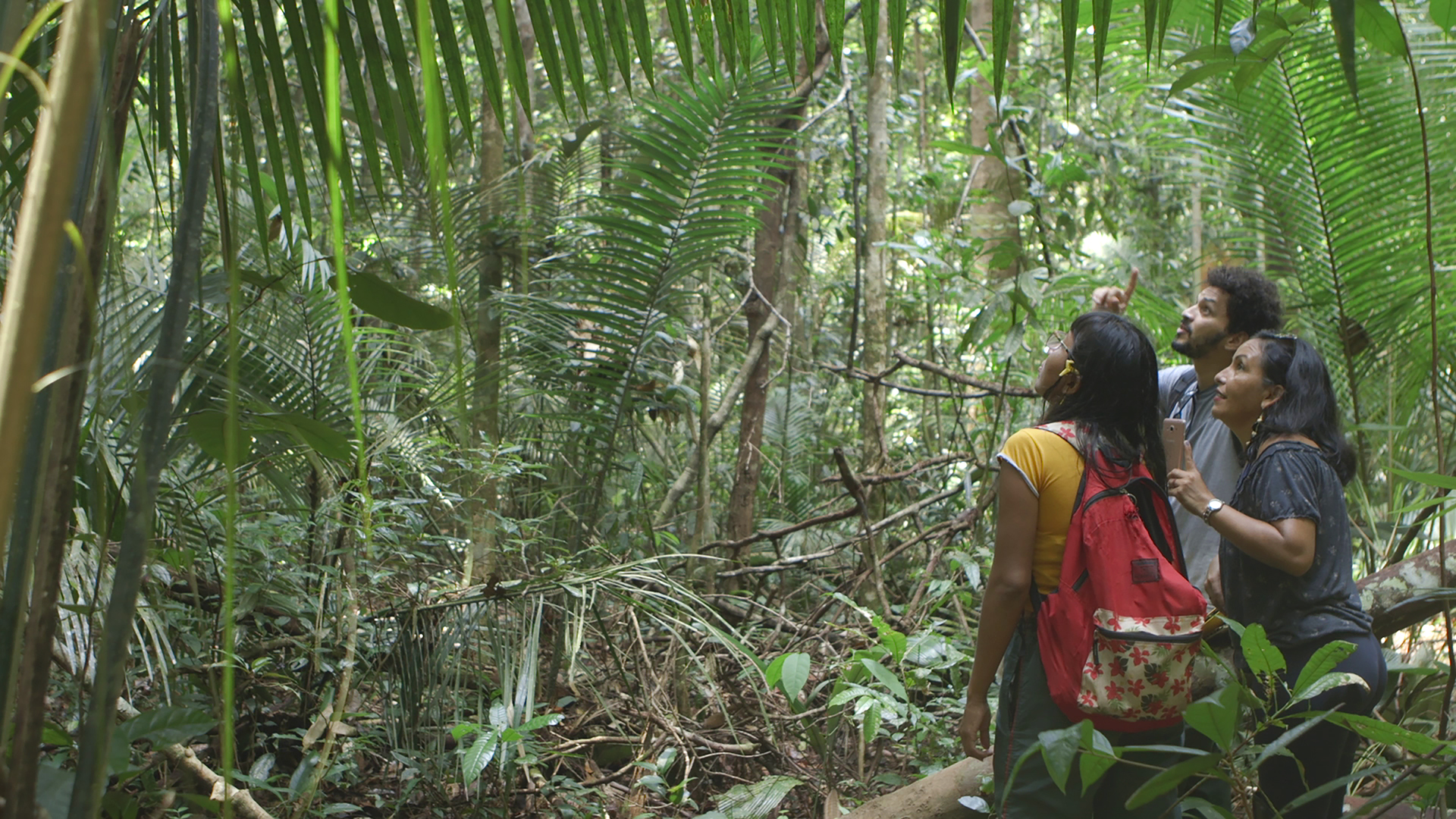

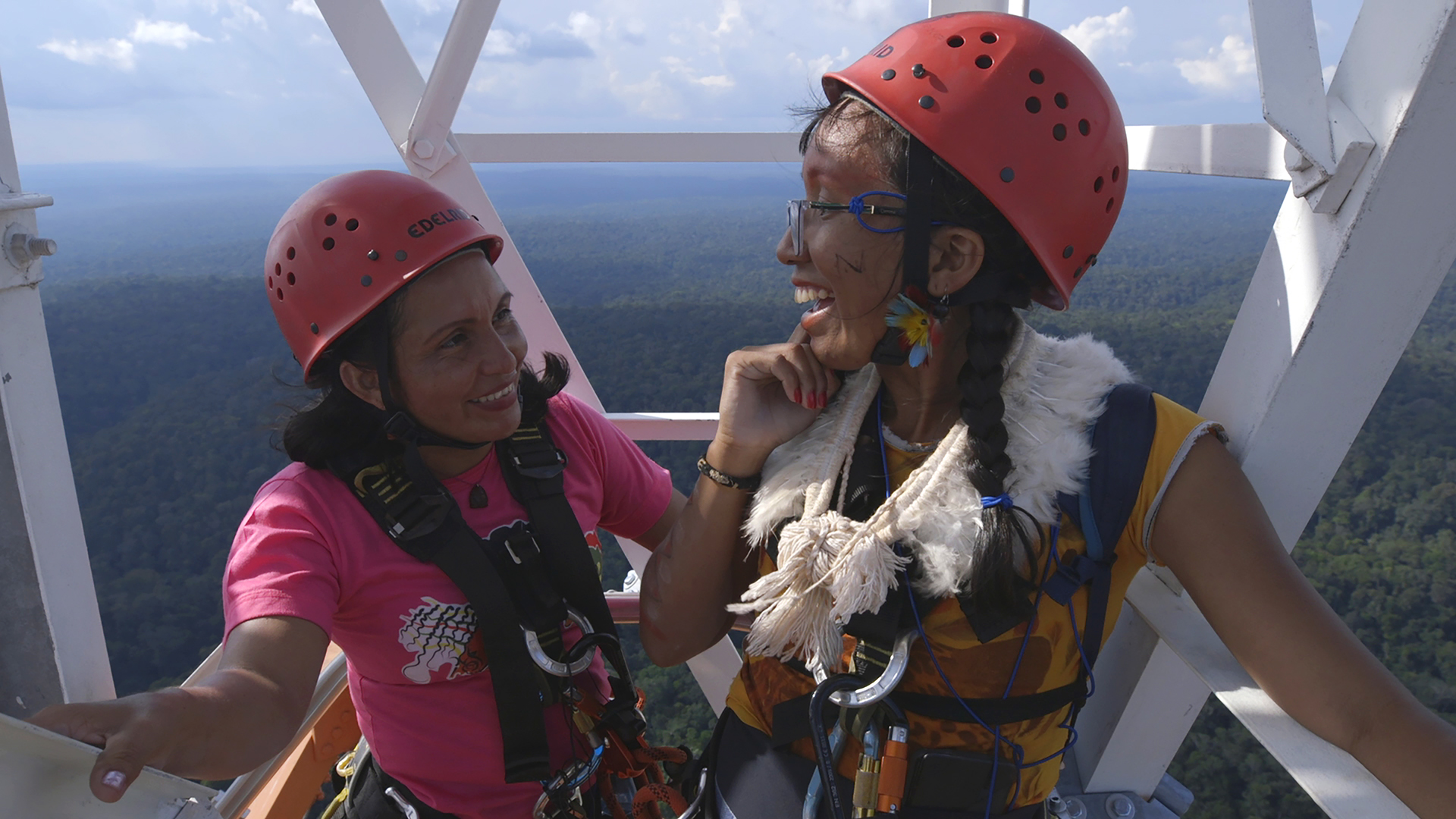

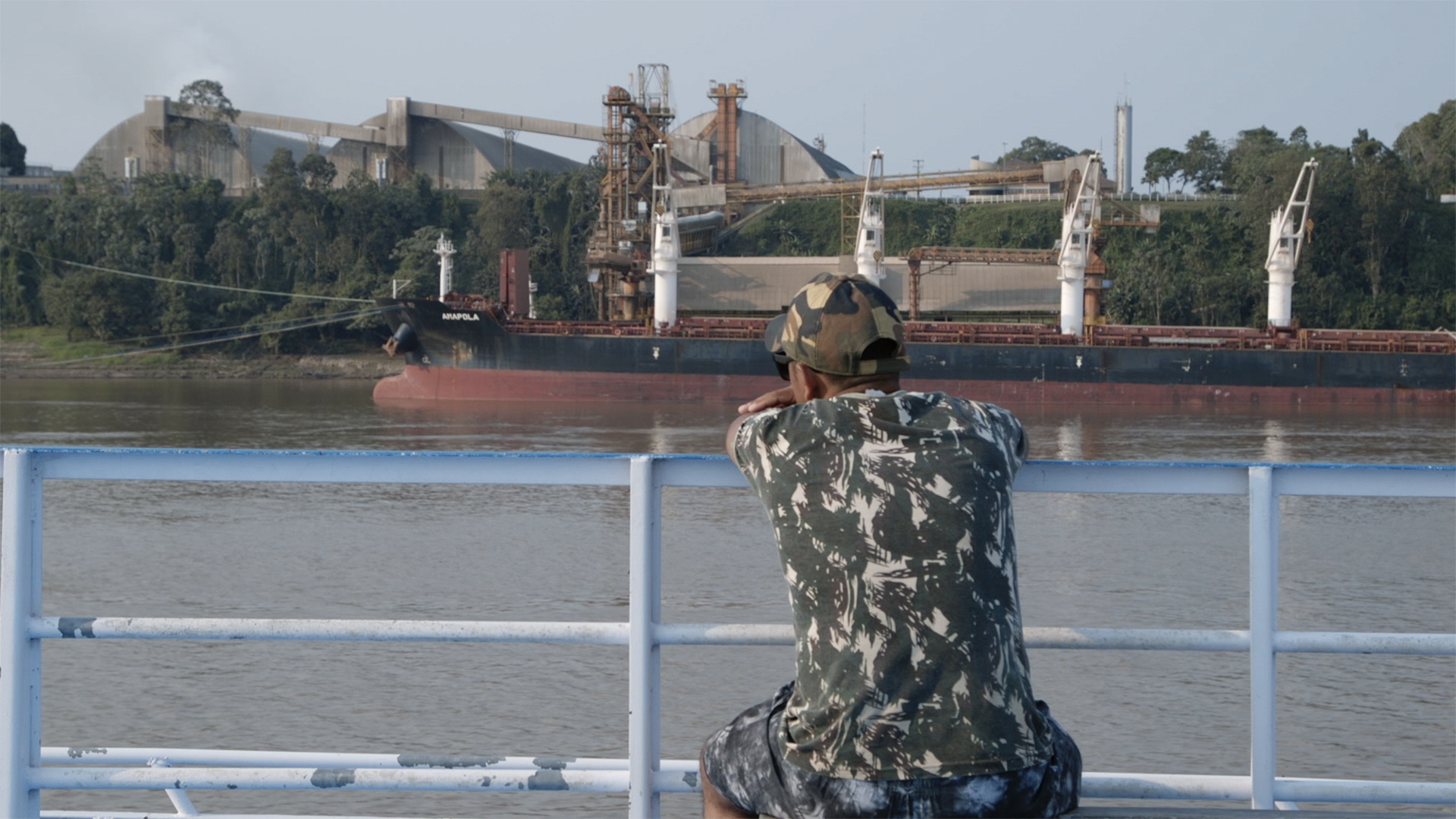

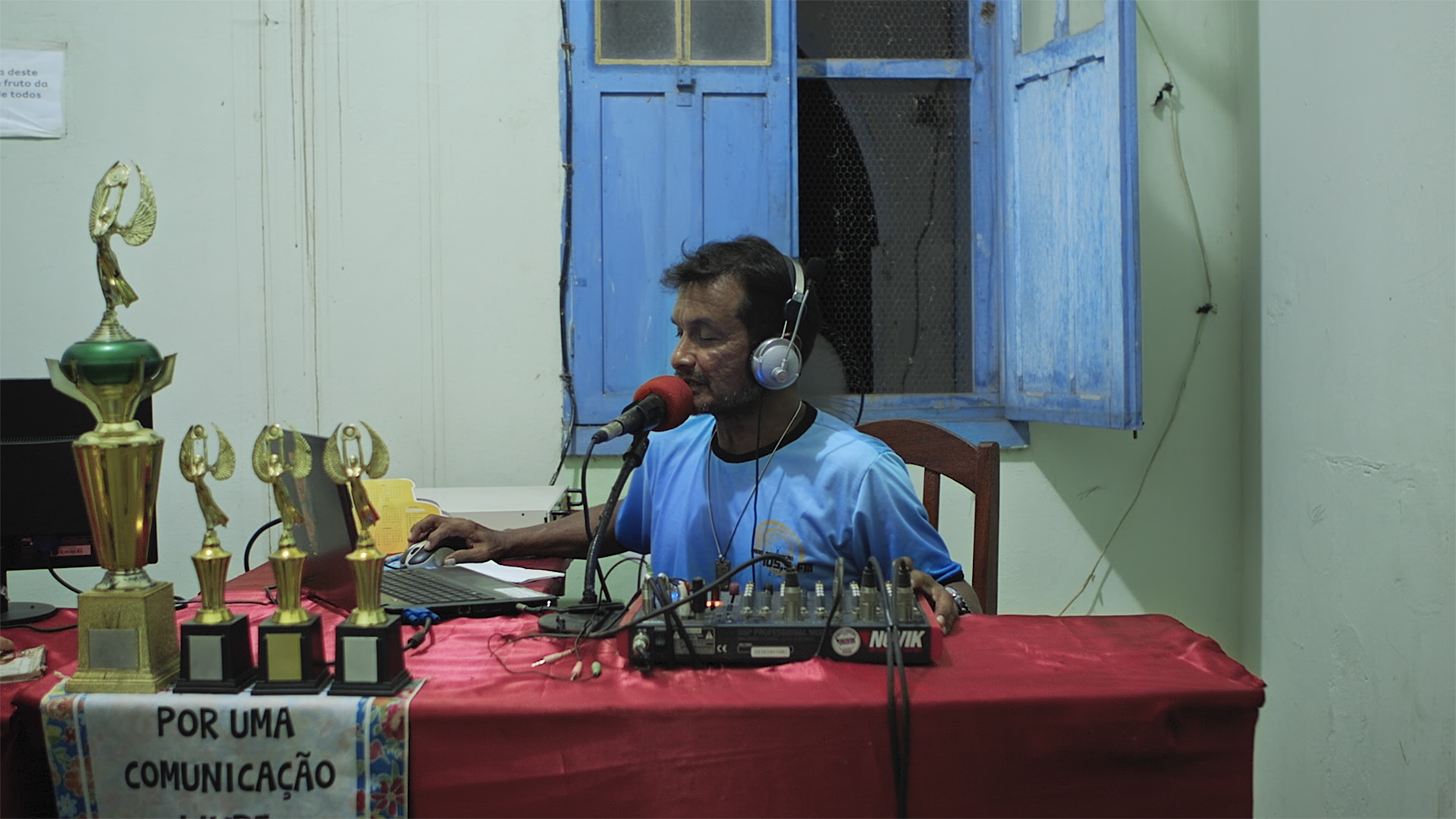
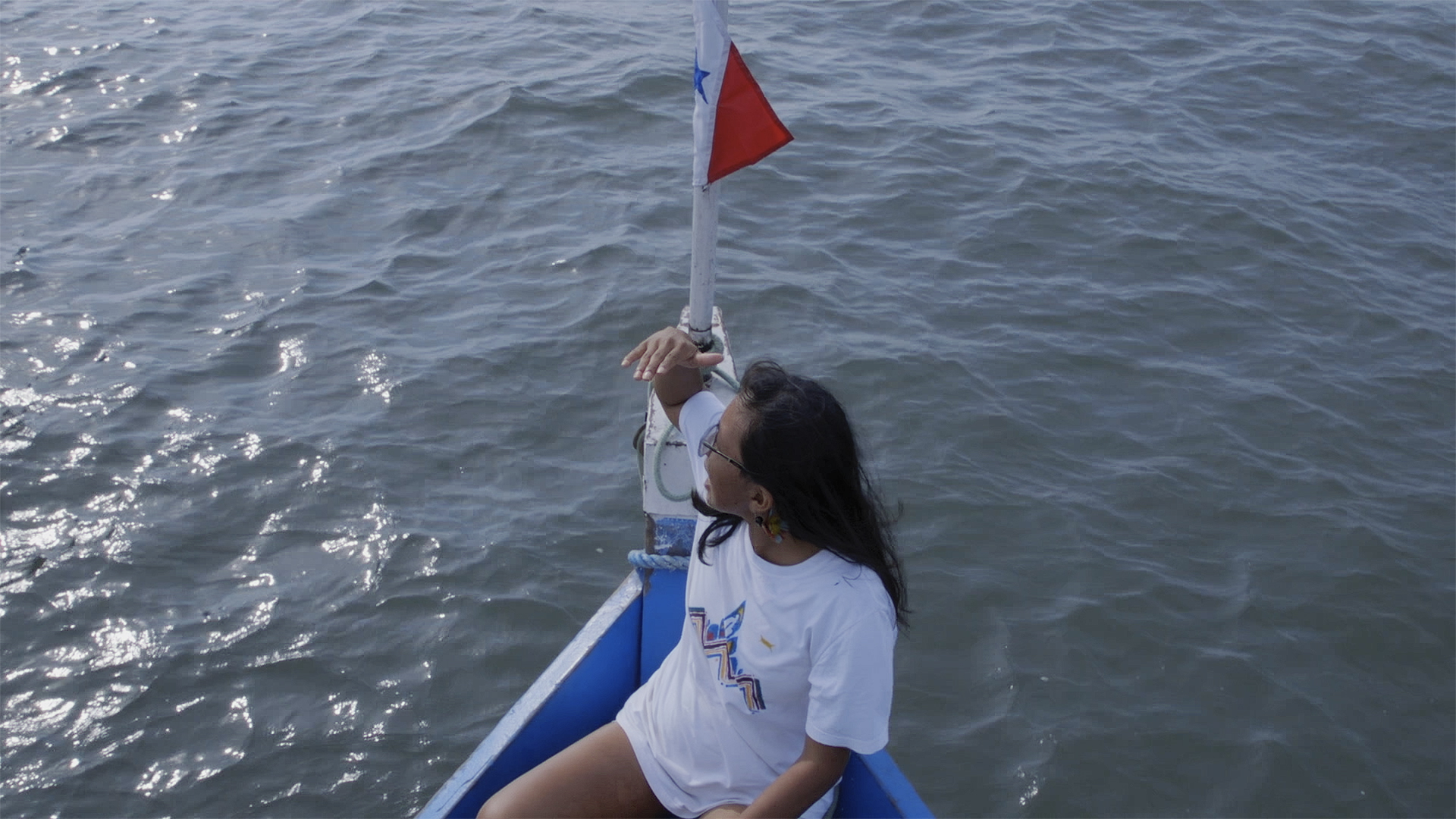
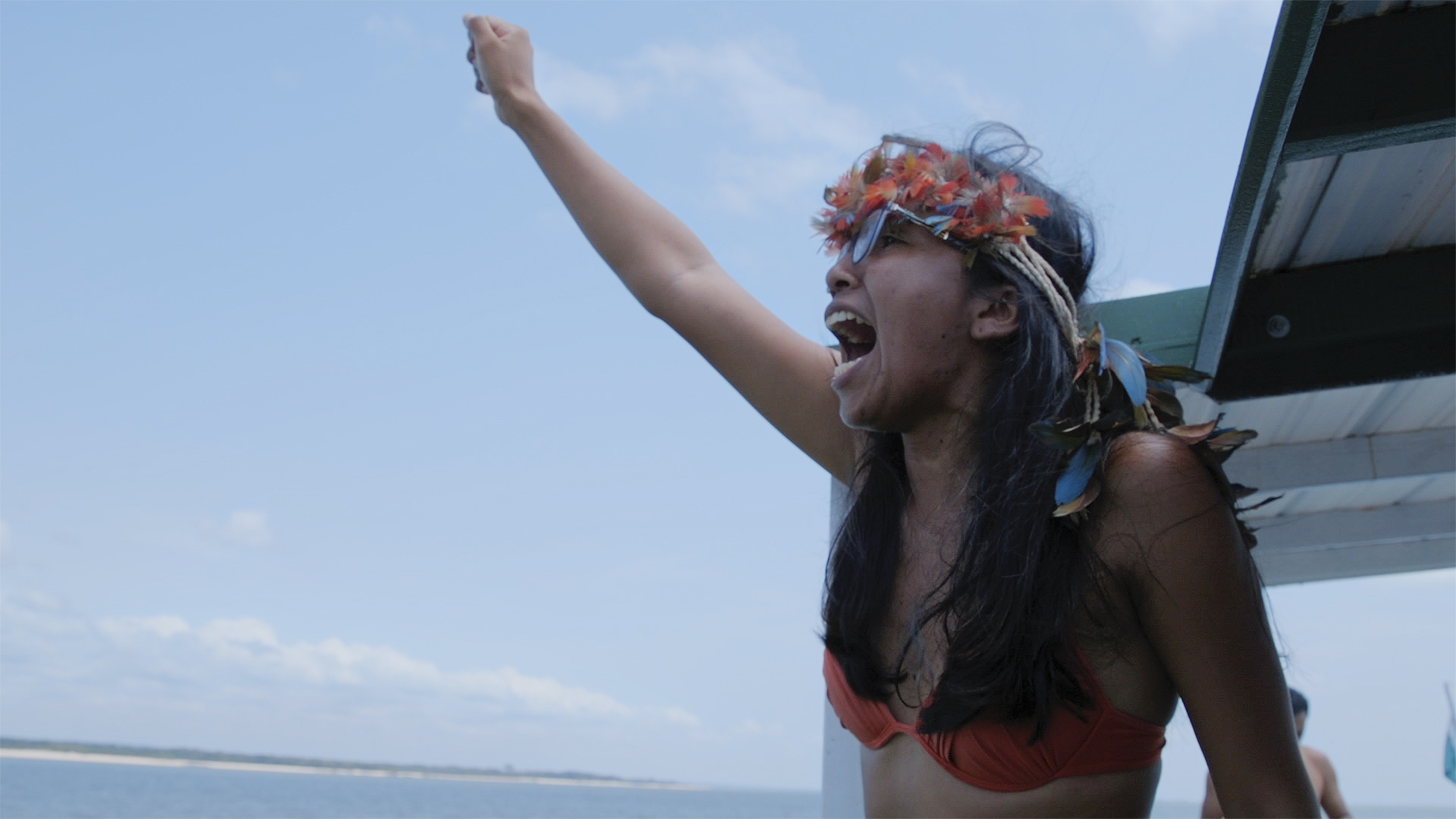


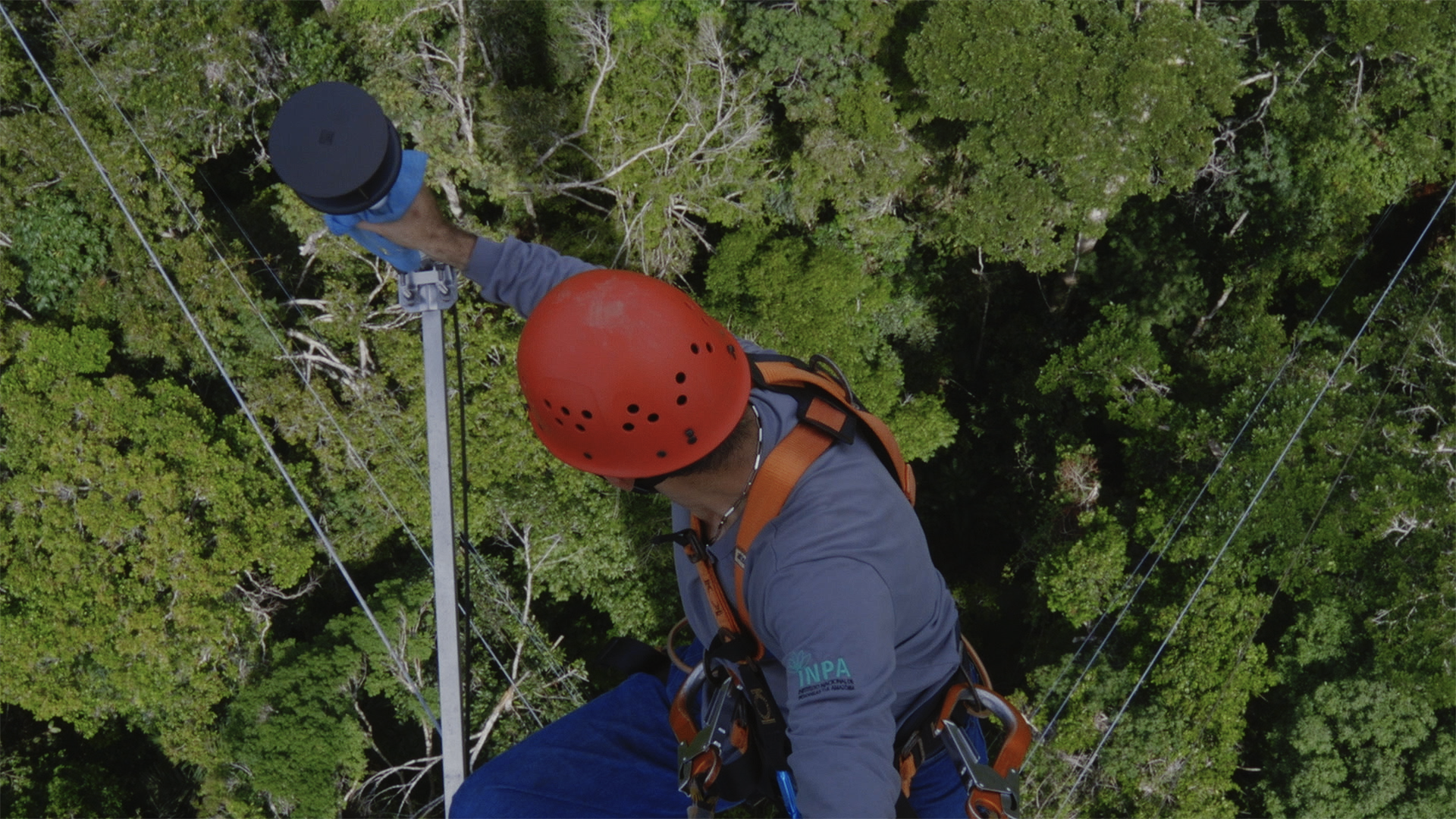
Technical Specifications
Produced in collaboration with the ZKM | Karlsruhe
Barbara Marcel with Natalina do Carmo Oliveira, Milena Raquel Tupinambá
Presenting Natalina do Carmo Oliveira, Milena Raquel Tupinambá; Direction and Production: Barbara Marcel; Image: Felipe Frozza, Barbara Marcel; Direct Sound: Anne Santos; Set Production: Kandyê Medina, Thais Helena Medeiros, Bruna Bichara; Editing: Célia Freitas, edt.; Editing Assistance: Beatriz Krieger, Felipe Frozza; Sound Mixing: Sarah Lelièvre; Colorist: Guilherme Begué; Finishing Editor: Beatriz Krieger; Music: Suraras do Tapajós
Funded by: Instituto Serrapilheira, Max Planck Institute for Biogeochemistry Jena
Supported by: INPA-National Institute of Amazonian Research, Goethe-Institut São Paulo, Casa Bicho
The ATTO project is funded by: German Federal Ministry of Education and Research (BMBF), Brazilian Ministry of Science, Technology and Innovations, Max Planck Society, Finep, Fapeam, and Fundação Eliseu Alves.
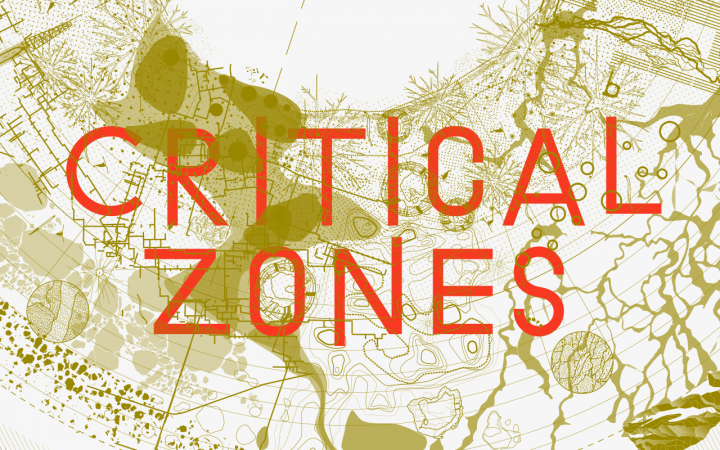
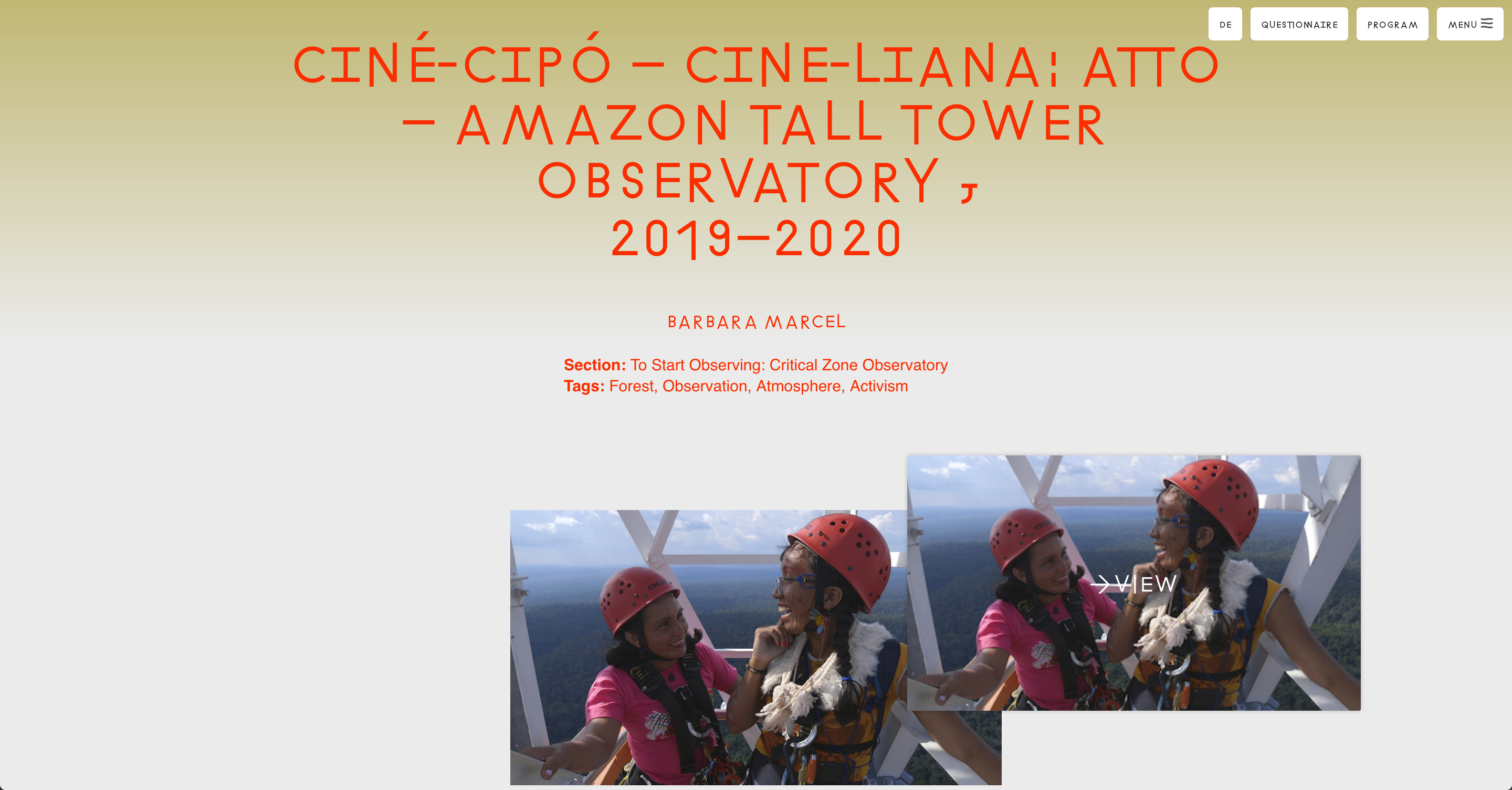
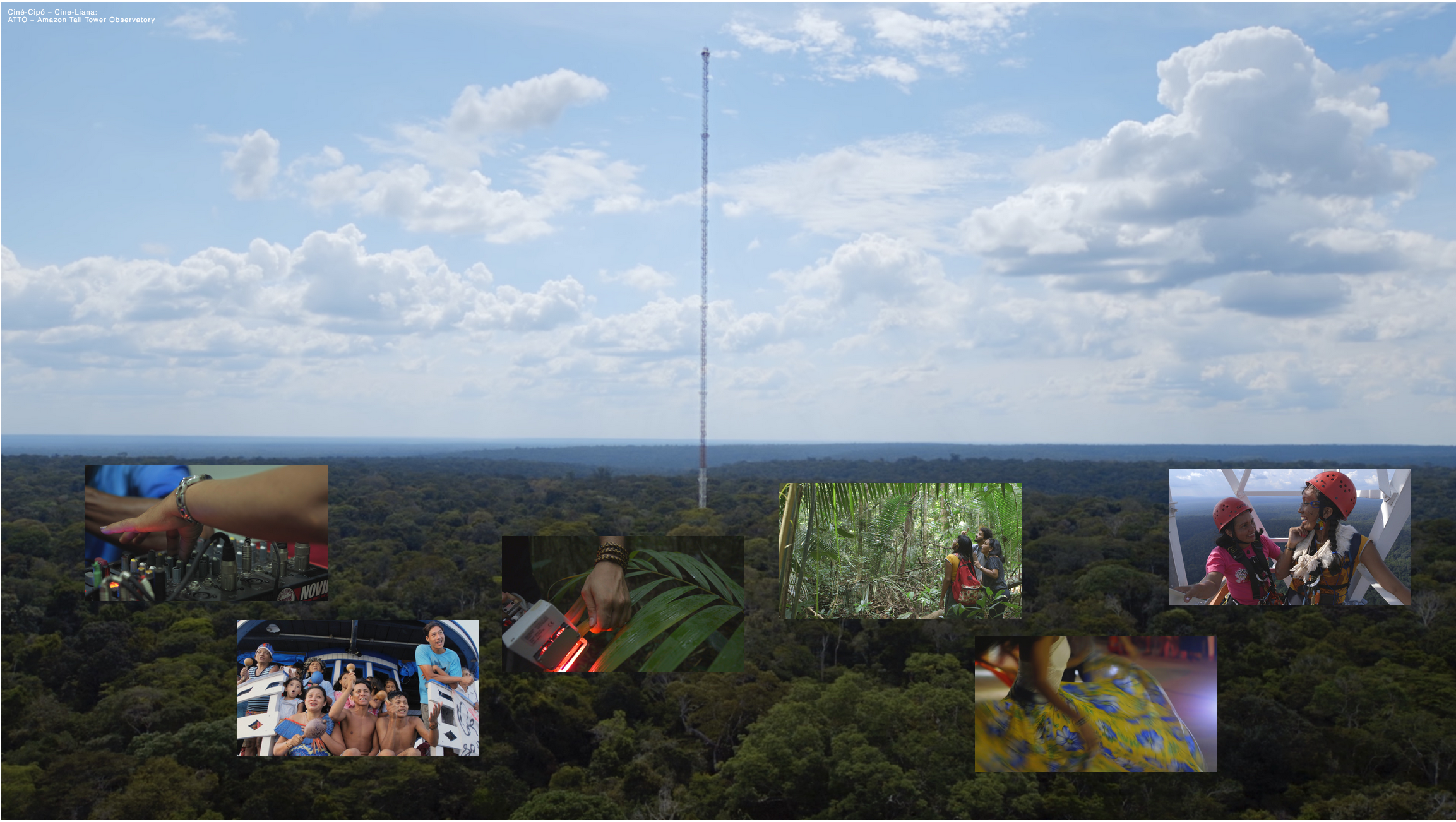
HUMO SOBRE HUMEDALES
2019-21, Chile. Video, color, sound, approx. 90min.
2019-21, Chile. Video, color, sound, approx. 90min.
Following the work of environmentalists and communicators involved in social movements in the city of Concepción, the video portrays the role of women in the uprising that took to the streets of Santiago and all the cities of Chile between October and December 2019. HUMO SOBRE LOS HUMEDALES takes as a starting point the defense of local wetland ecosystems called Humedales – interconnected hydrological systems with a transitional morphology between land and water –, and shows how environmental struggles are indissociated from social mobilizations for basic rights such as access to clean water. The video depicts transmissions by a local Community Radio and the Latin American Ecofeminist debates during the Carpa de las Mujeres in Santiago, a meeting parallel to the Climate Conference 25 in Madrid 2019. Narrated with the artist's voice off in the tone of a travel diary, the film contrasts the individual gaze and the many voices of the crowd clamoring for a new national constitution.
The video was produced in Laguna Grande de San Pedro, Concepción and Santiago de Chile between November 18 and December 17, 2019. The project is the result of the Artistic Residence ARTIVISM, initiated by the Goethe Institute Chile and Galeria Metropolitana in Santiago. Supported by Kummer-Vanotti Stiftung.
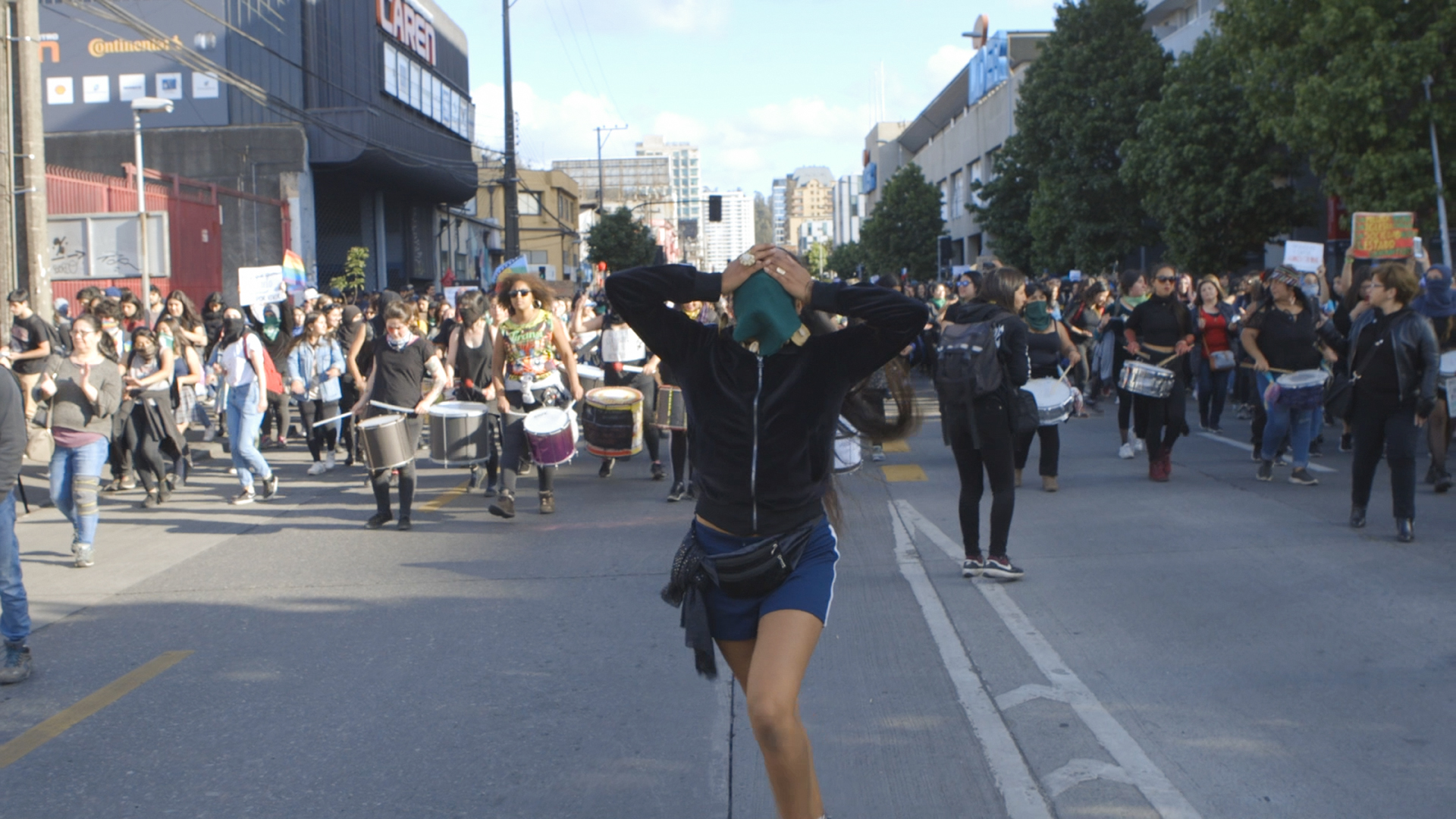
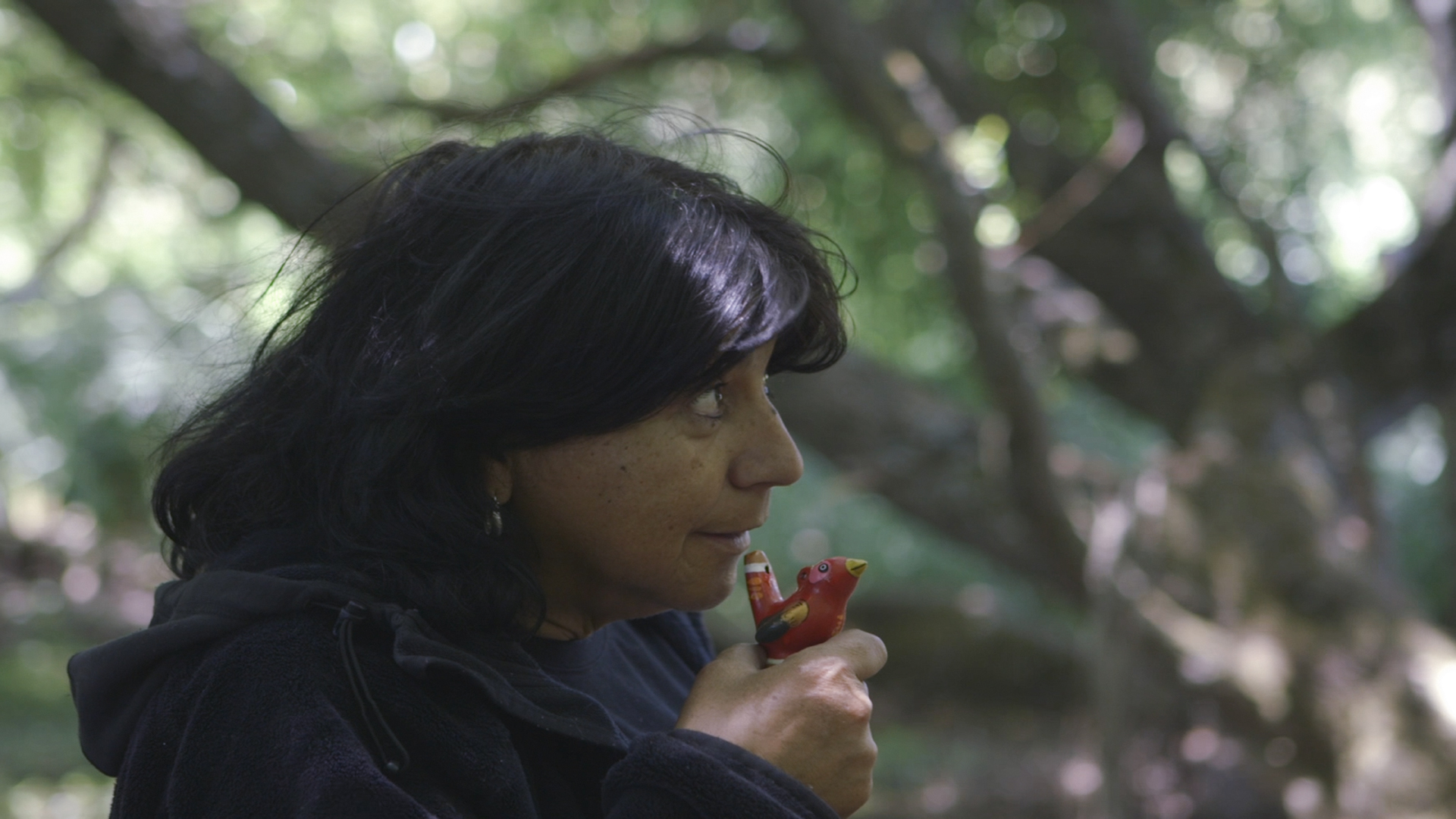
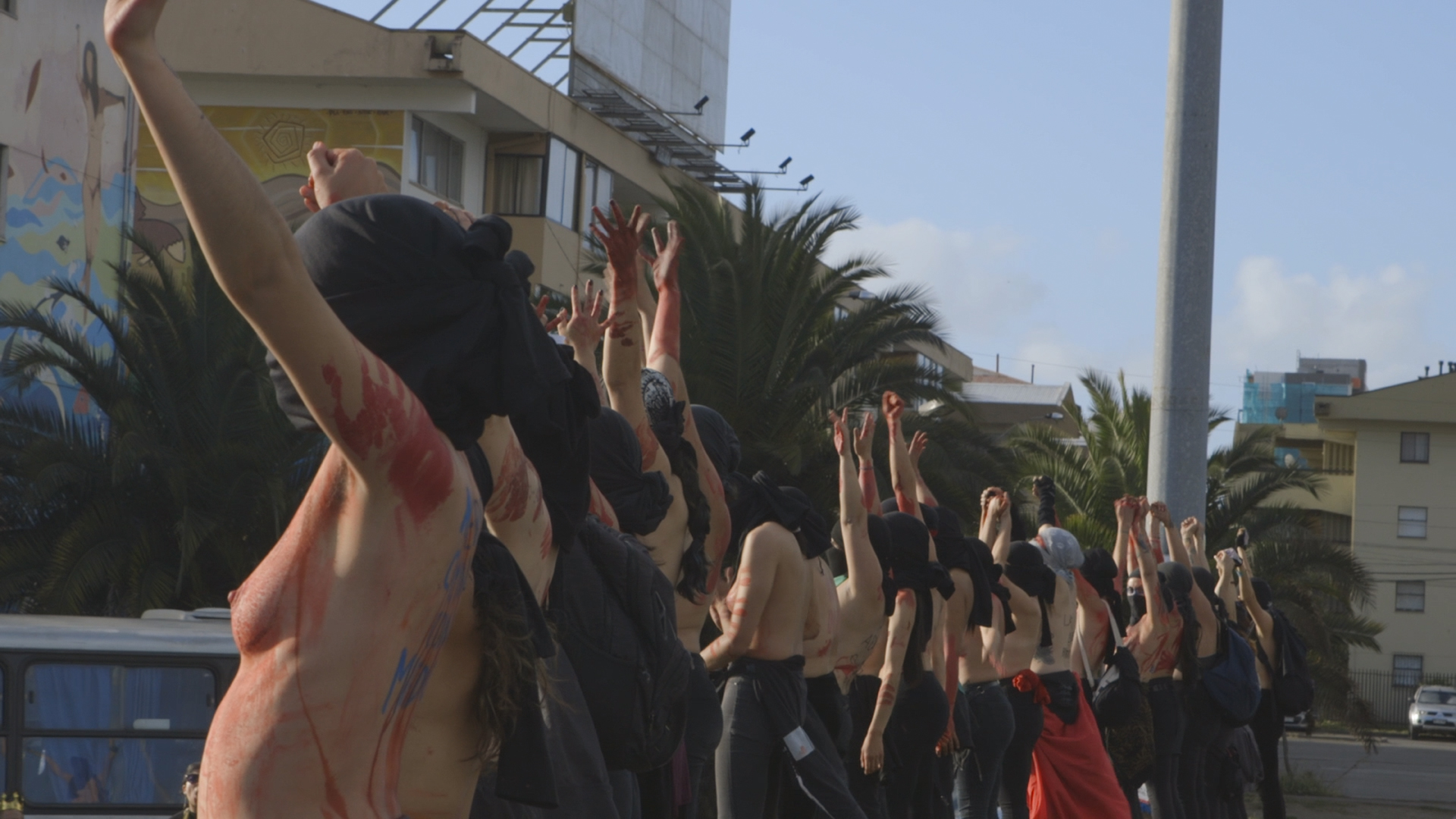
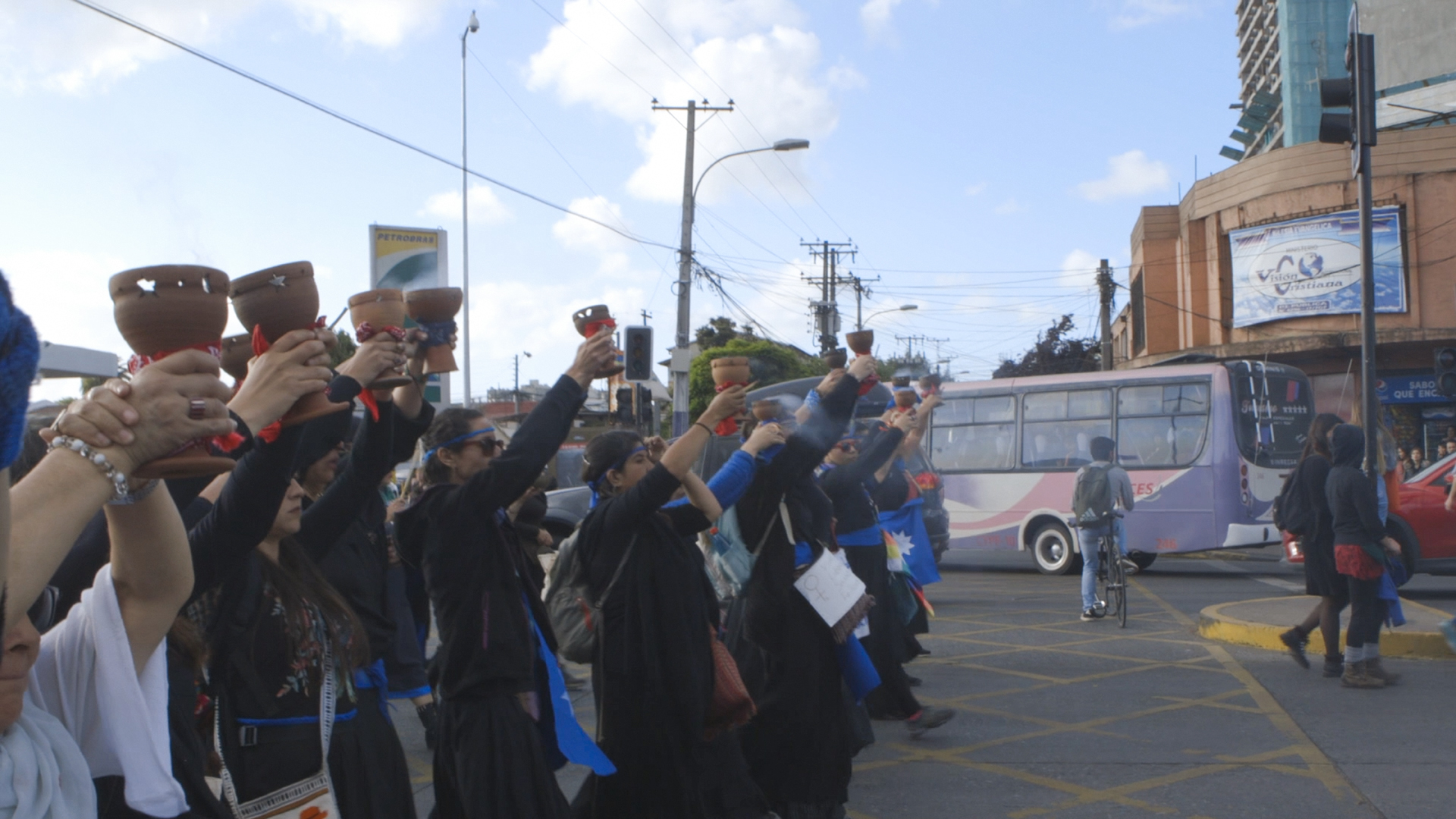
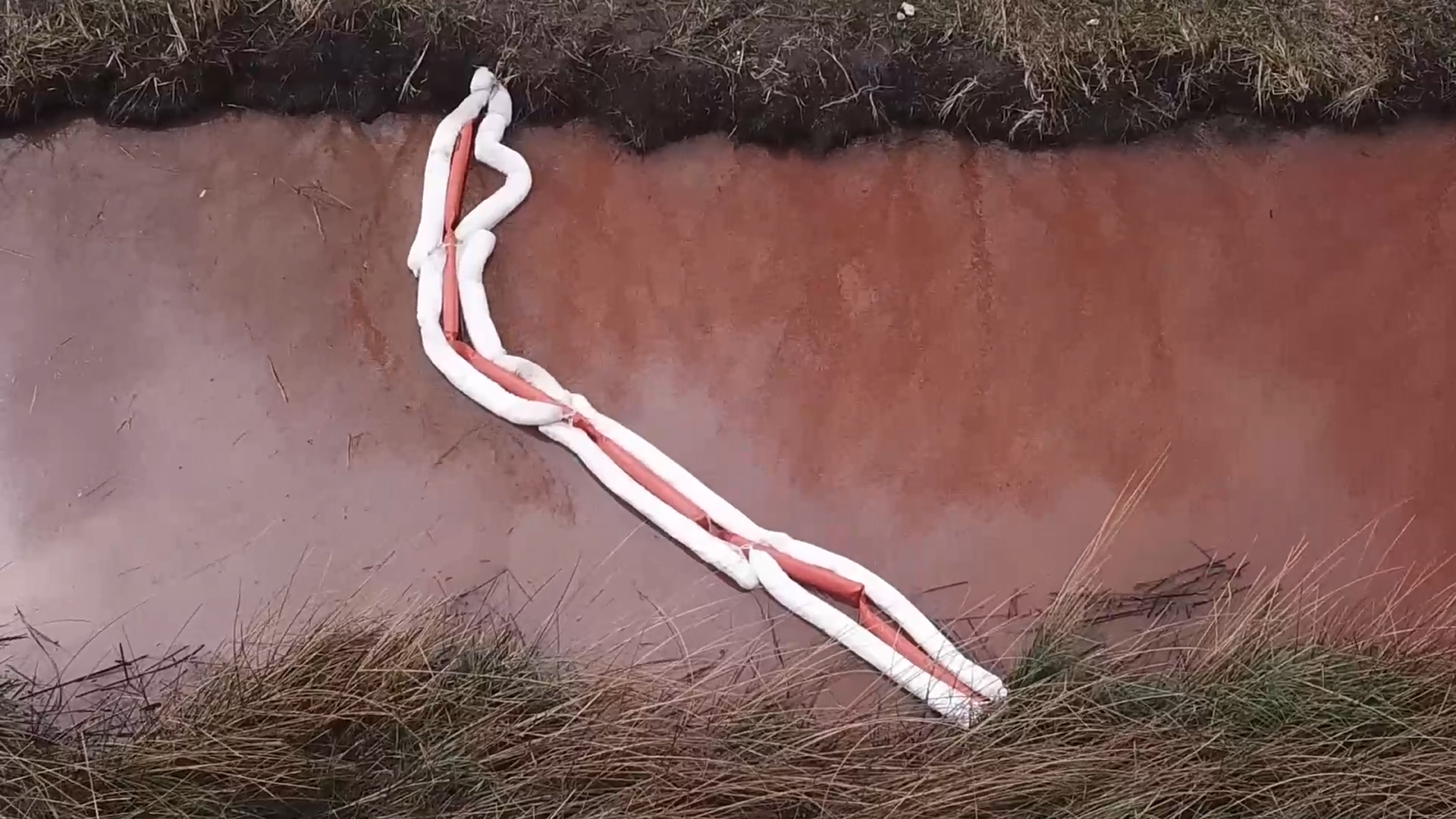
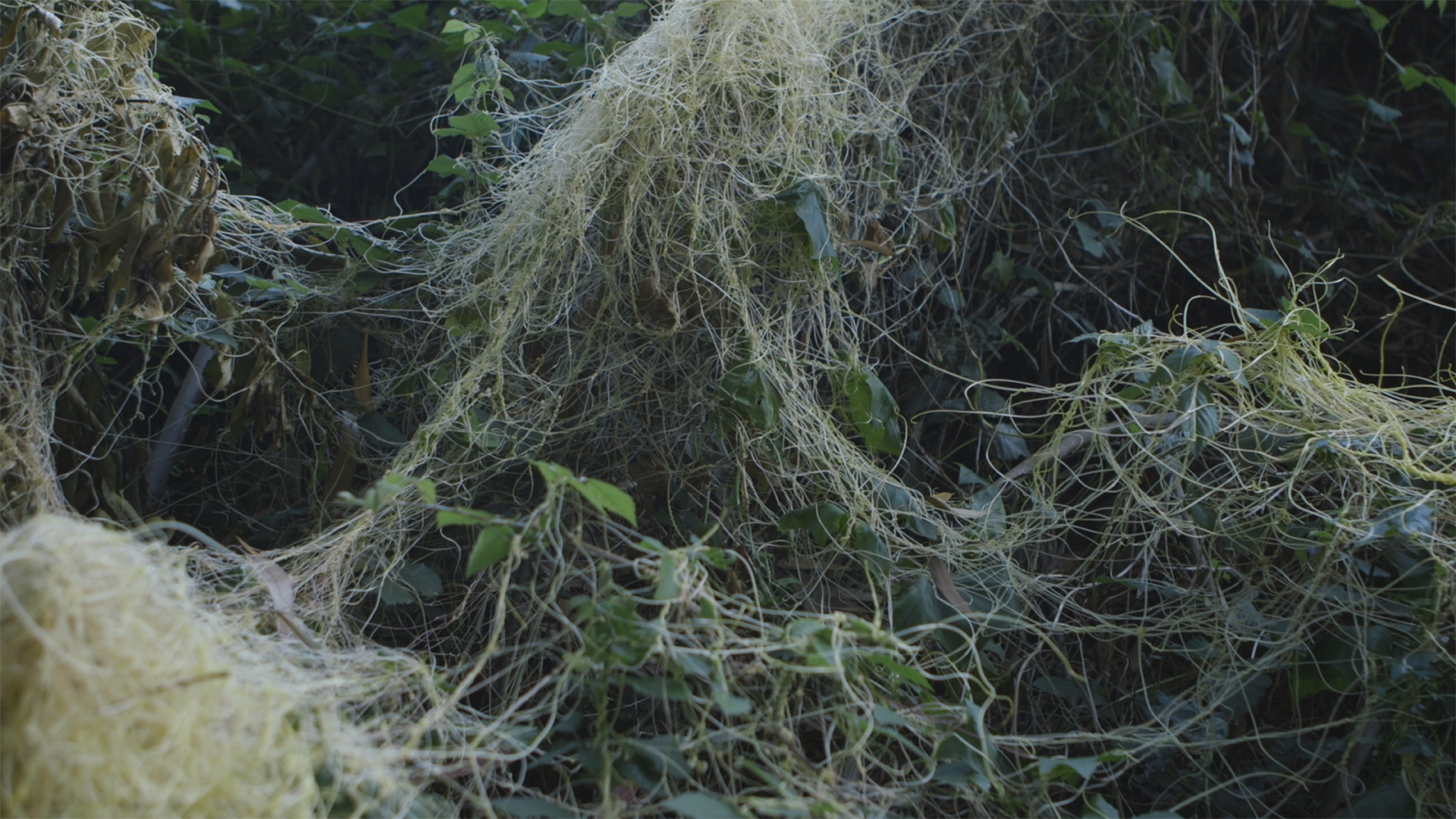
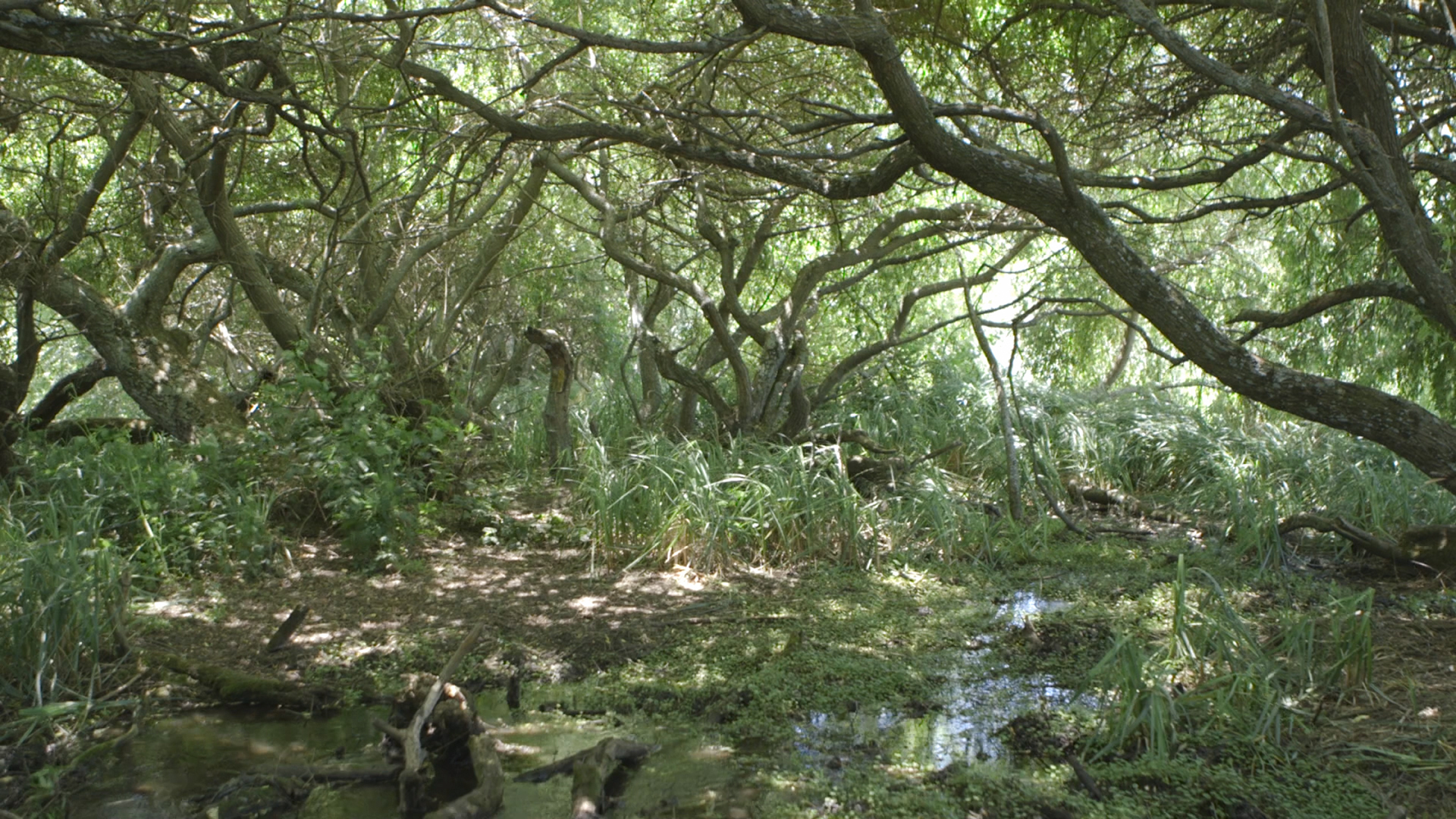
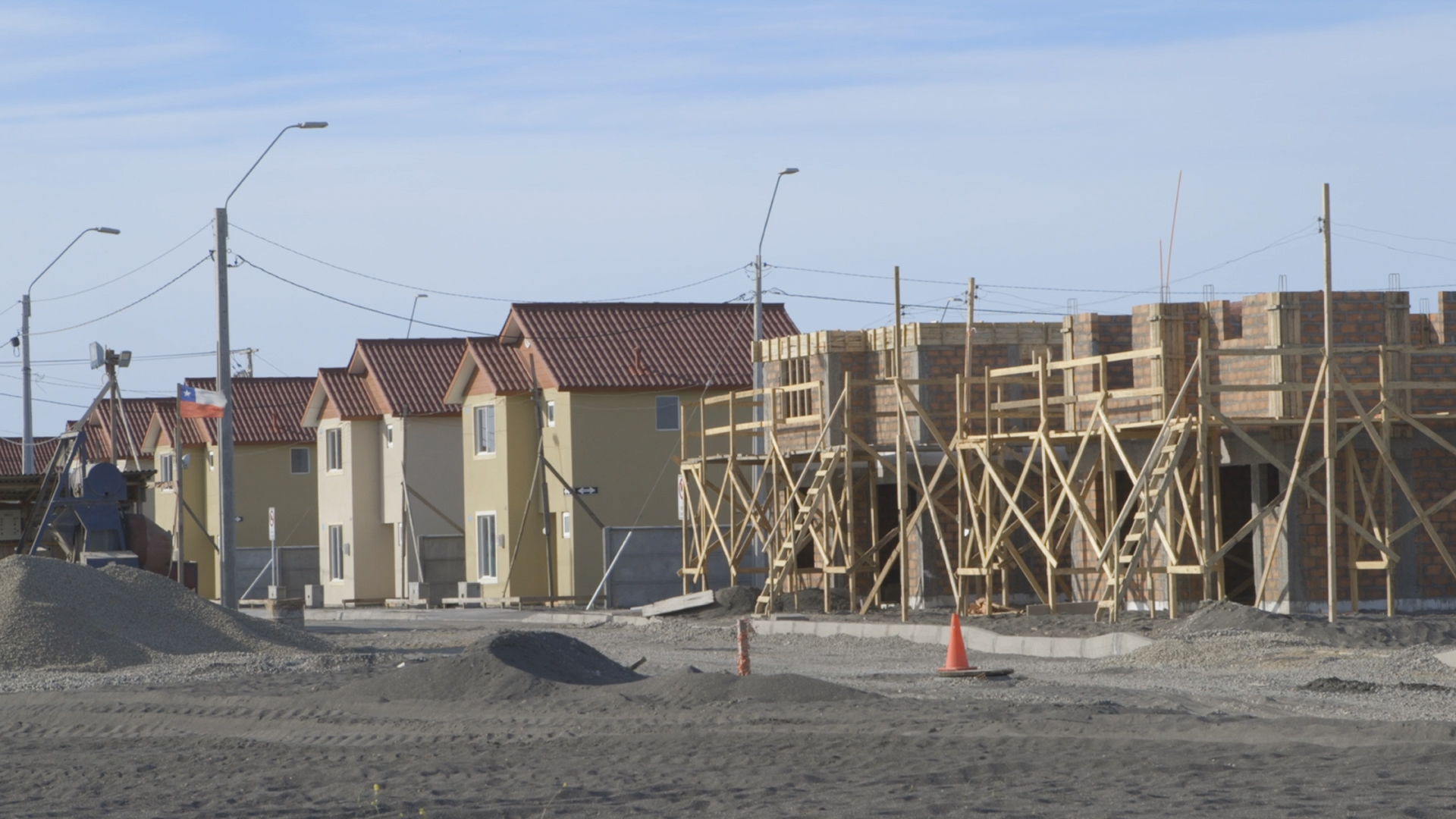
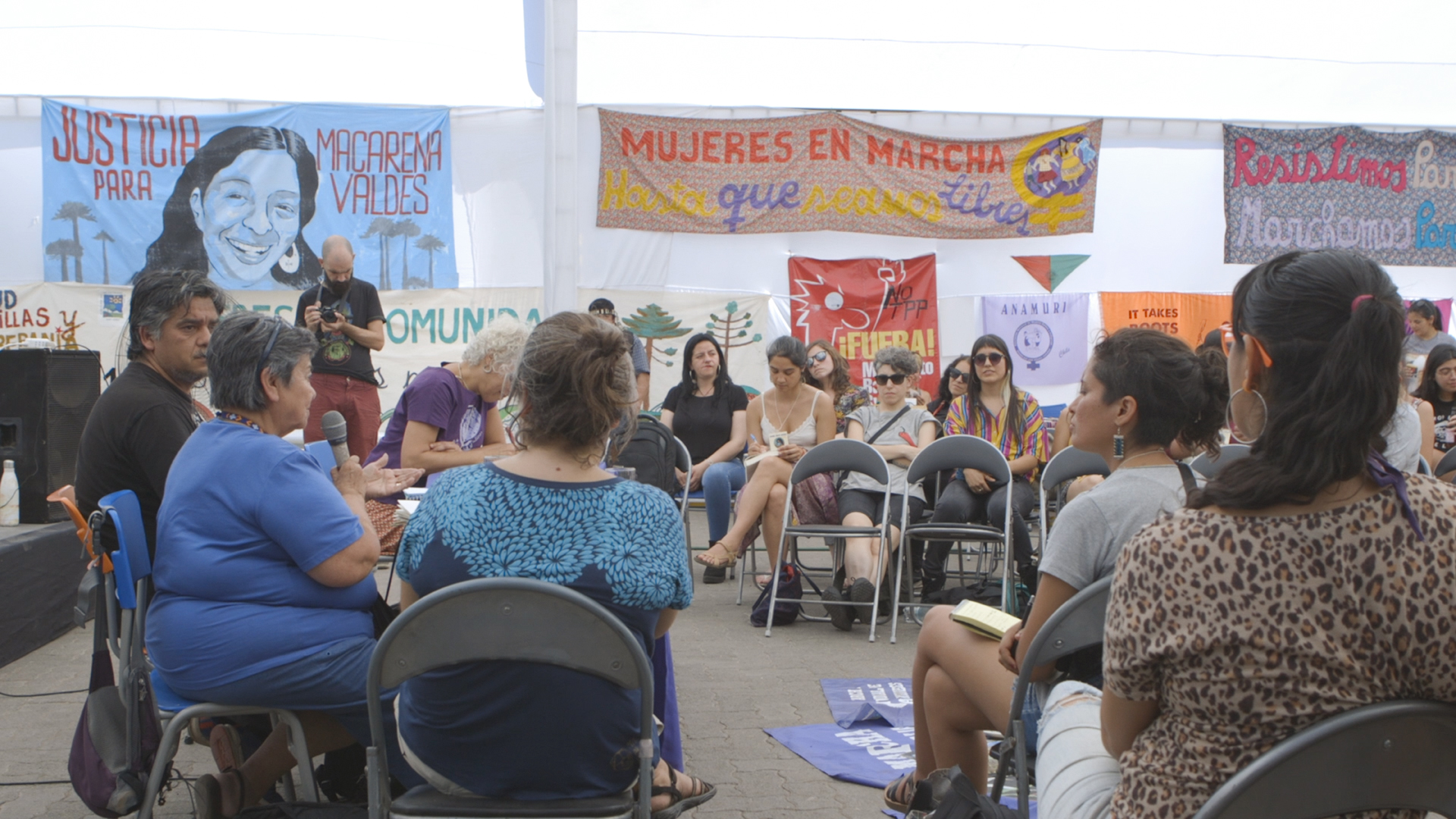
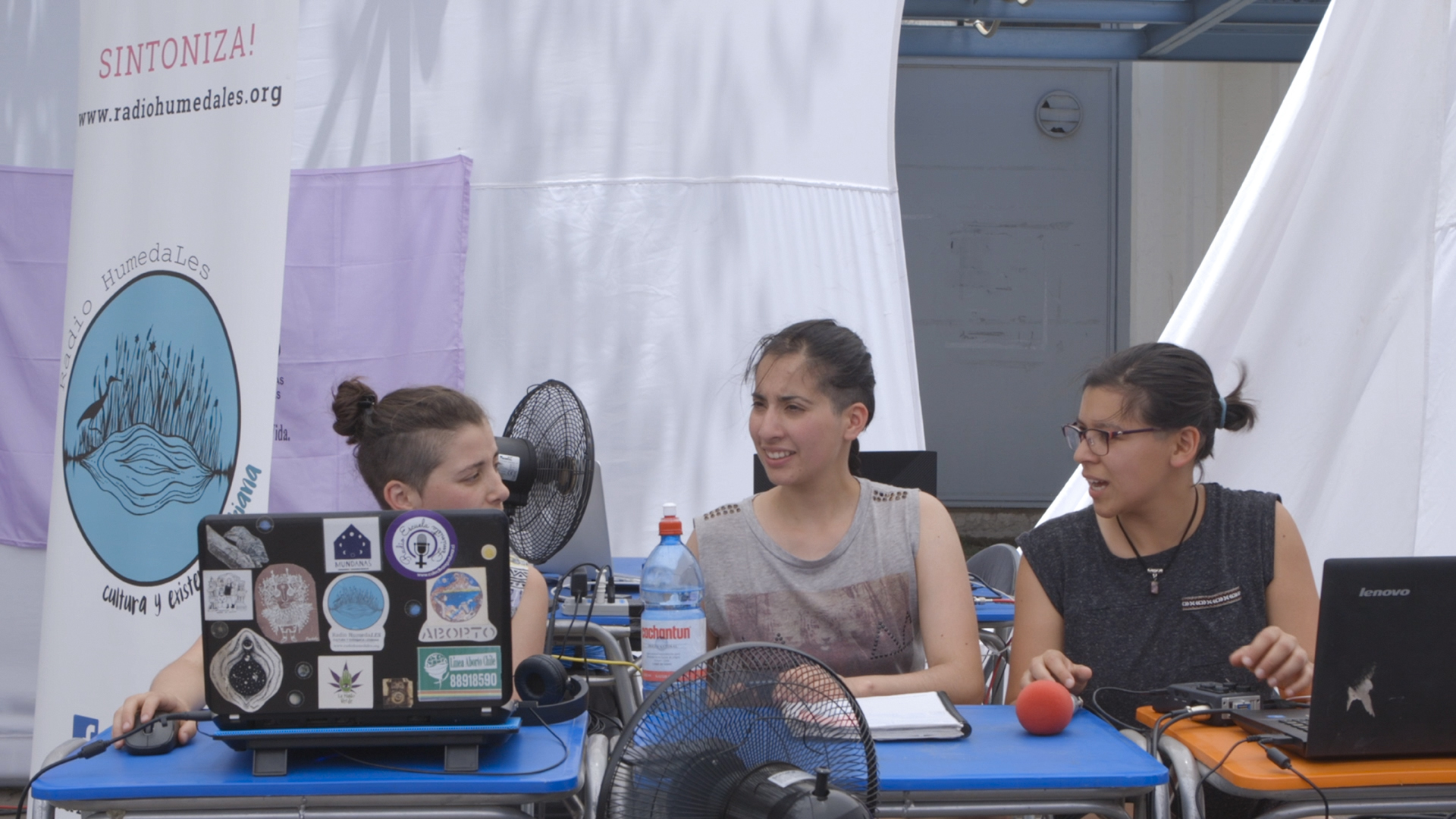
Film credits
With
Radio Humedales: Paloma Bello, Carla Duran, Alejandra Fuentes, Pierina Pondanelli, Paula Sepulveda, Katherina Venegas
Red Humedales Bío Bío: Jo Varela, Luisa Valenzuela (La Guardiana), Eve Soto
March at the International Day for the Elimination of Violence Against Women in Concepción, 25.11.2019
Chilean collective "Las Tesis", at the a performance "Un violador en tu camino"
Women participanting in the Cumbre de los Pueblos y Carpa de las Mujeres, 2-6.11.2019 at the Escuela de Artes y Oficios (OEA) of the Universidad de Santiago de Chile:
Speakers (in order of appearance): Juana Vera, Francisca Rodríguez, Yayo Herrero
Production, Camera, Editing
Barbara Marcel
Research, Set Production
Ana Maria Saavedra and Flavia Hechen
Editing Assistance, Subtitling
Beatriz Krieger
Drone Images
Nicolas Salazar
Sound Design and Mix
Sarah Lelièvre
Original Soundtrack
Lea Taragona
Audio Excerpts
AOIR Cartografía Sonora - Octubre (Chile Despertó), Valentina Villarroel
Radio Humedales
Podcast Cacerola Informativa #DespertamosdelShock - Episodios 30.10 / 03.12 / 06.12.2019
Music
Humedales la cabeza a los pájaros, Fabiano-Kueva y Valentina Villarroel
Grabaciones de campo/Cerro caracol, Valentina Villarroel
Nos tienen miedo, Liliana Felipe (Mil Veces Mil, 2008)
Contra Todo, iLe (Almadura, 2019)
Las Golondrinas, Evelyn Cornejo (La Chusma Inconsciente, 2017)
Octubre 19, Indomitamorfosis (2019)
Supported by Goethe Chile, Galeria Metropolitana, Kummer-Vanotti Stiftung.
TERRITORIES OF KNOWLEDGE
April + September 2024, Artistic/transmedia research residency by artist, filmmaker and researcher Barbara Marcel and transmedia journalist and researcher Camila Nobrega, between Belém do Pará (Brazil) and Berlin (Germany) in collaboration with Spore Initiative.
April + September 2024, Artistic/transmedia research residency by artist, filmmaker and researcher Barbara Marcel and transmedia journalist and researcher Camila Nobrega, between Belém do Pará (Brazil) and Berlin (Germany) in collaboration with Spore Initiative.
During a research residency in the Brazilian state of Pará, followed by further research in Germany, the project begins by investigating the preparation processes of different local and international civil society groups for hosting the UN Climate Conference COP30, which will take place in 2025 for the first time in the Amazon region. The project takes as its starting point the COP, its possibilities for encounters for situated learning and the promotion of critical debates of global repercussions, in order to reflect collectively on issues such as socio-environmental and climate justice.
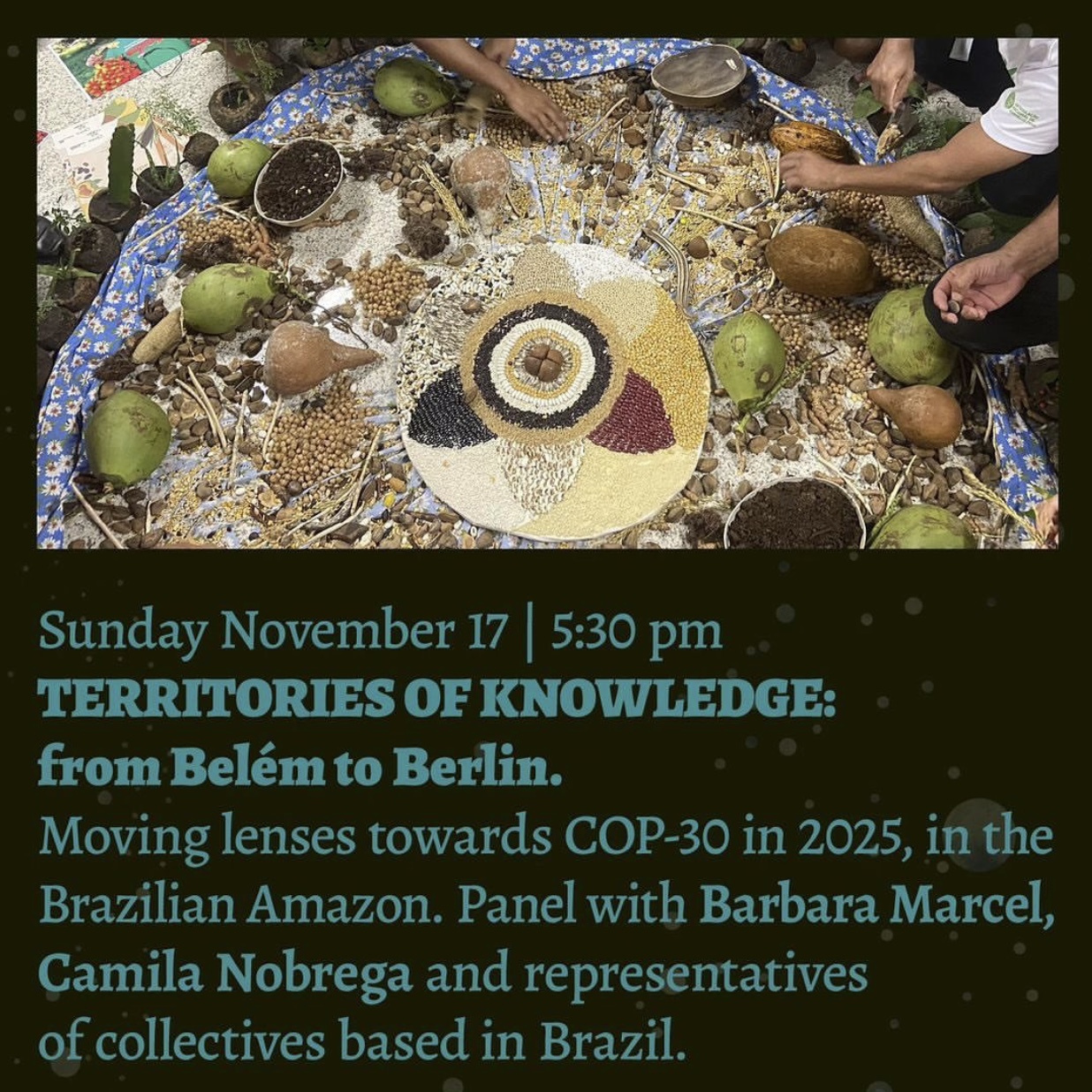
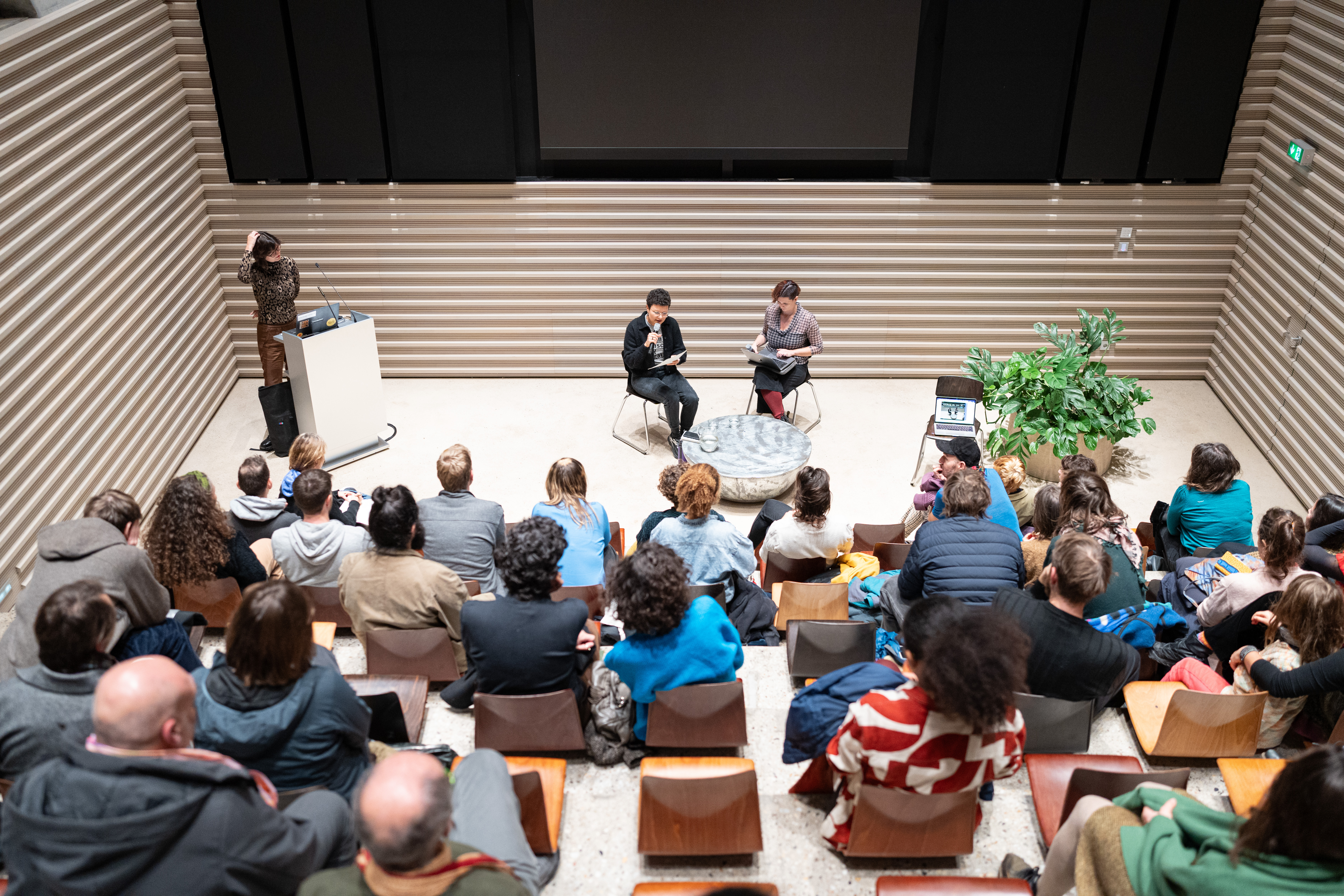
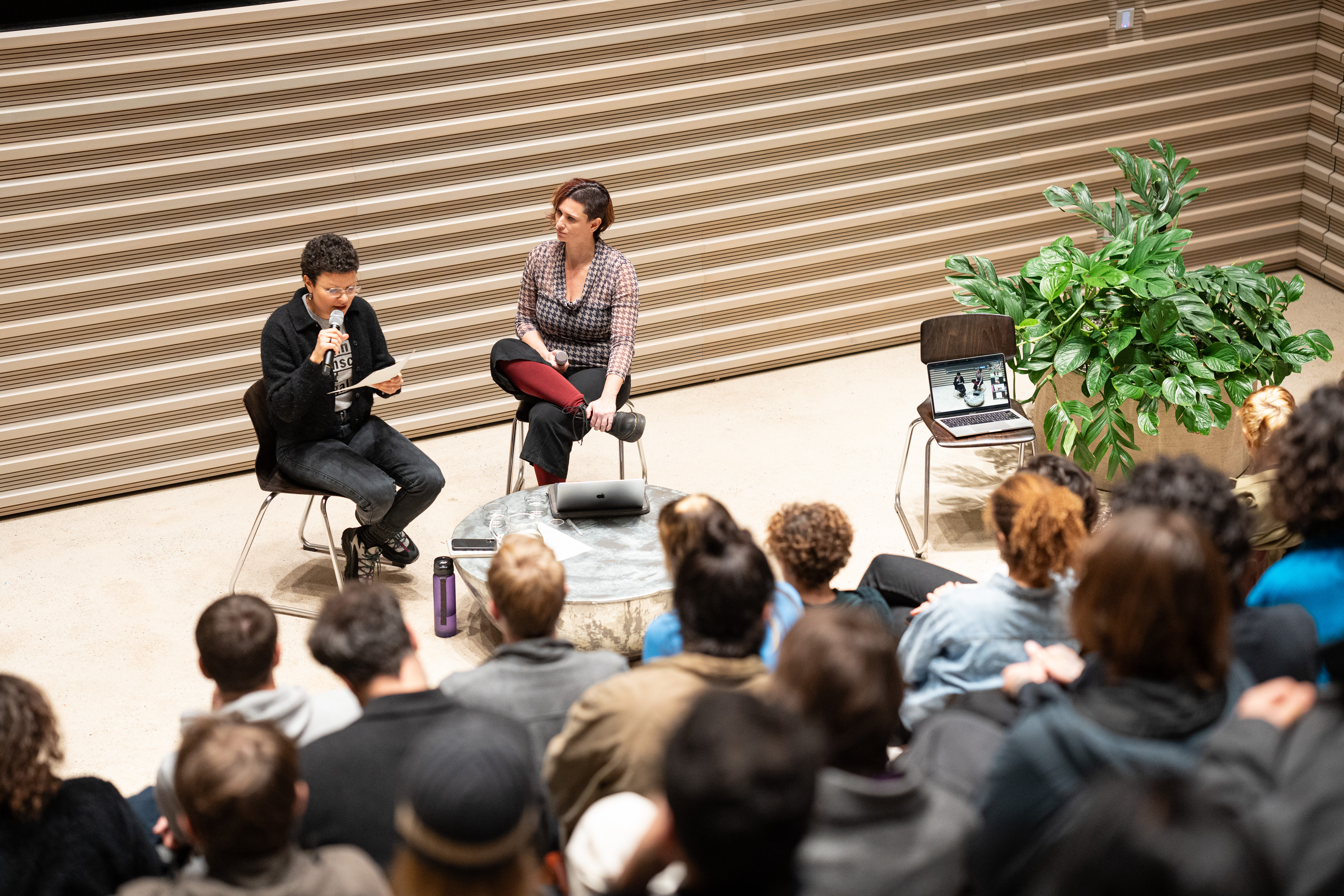

The Amazon is a key territory in the history of colonial processes in the formation of a modern world system based on the exploitation of naturecultures, subjugating peoples and species that for centuries have co-cultivated codependent relationships, especially in the global south. Brazil is the country with the largest area of the Amazon, equivalent to around 60% of the largest tropical forest on the planet. The importance of respecting the territories and peoples in the region, as well as the need of unveiling transnational power structures that reproduce colonialities, is key to the debate on global warming and climate change.
For all these reasons, the research follows the preparations for COP30 and international debates about practices for possible futures of the planet with special attention to contemporary challenges, including conflicts resulting from the implementation of more contemporary developmentalist megaprojects, illegal logging, mining, land grabbing, among other transnational processes.
Based on their own methods of artistic research and investigative journalism, the researchers aim to contribute to spaces for knowledge exchange, starting from the notions of territory, land, water and conviviality – four words that carry different meanings in different contexts. Therefore, the idea is to give visibility to ongoing processes in the local context and create new spaces beyond borders between Brazil and Germany, revealing conflicts but also opening up possibilities for collaboration based on the understanding and respect for different positionalities. The research will be conducted in dialogue with Indigenous, quilombolas, riverside and other Amazonian communities, especially networks and collectives of artists, journalists, researchers and environmentalists in the region, as well as groups working transnationally unveiling past and ongoing colonialities.
The project is supported by Spore Initiative, which facilitates cultural projects at the intersection of climate justice, ecological regeneration, and education, in dialogue with earth protectors in the Global South and the Global North.
Link to the project at Spore.
COMMON IMAGINARIES
4th Research Seminar on Art and City_DESILHA 2024, Graduate Program in Visual Arts at the School of Fine Arts of the Federal University of Rio de Janeiro. Proposal: Livia Flores, André Leal, Barbara Marcel and Raquel Versieux. Organization and production: Livia Flores, André Leal, Barbara Marcel and Giovanni Festa.
4th Research Seminar on Art and City_DESILHA 2024, Graduate Program in Visual Arts at the School of Fine Arts of the Federal University of Rio de Janeiro. Proposal: Livia Flores, André Leal, Barbara Marcel and Raquel Versieux. Organization and production: Livia Flores, André Leal, Barbara Marcel and Giovanni Festa.
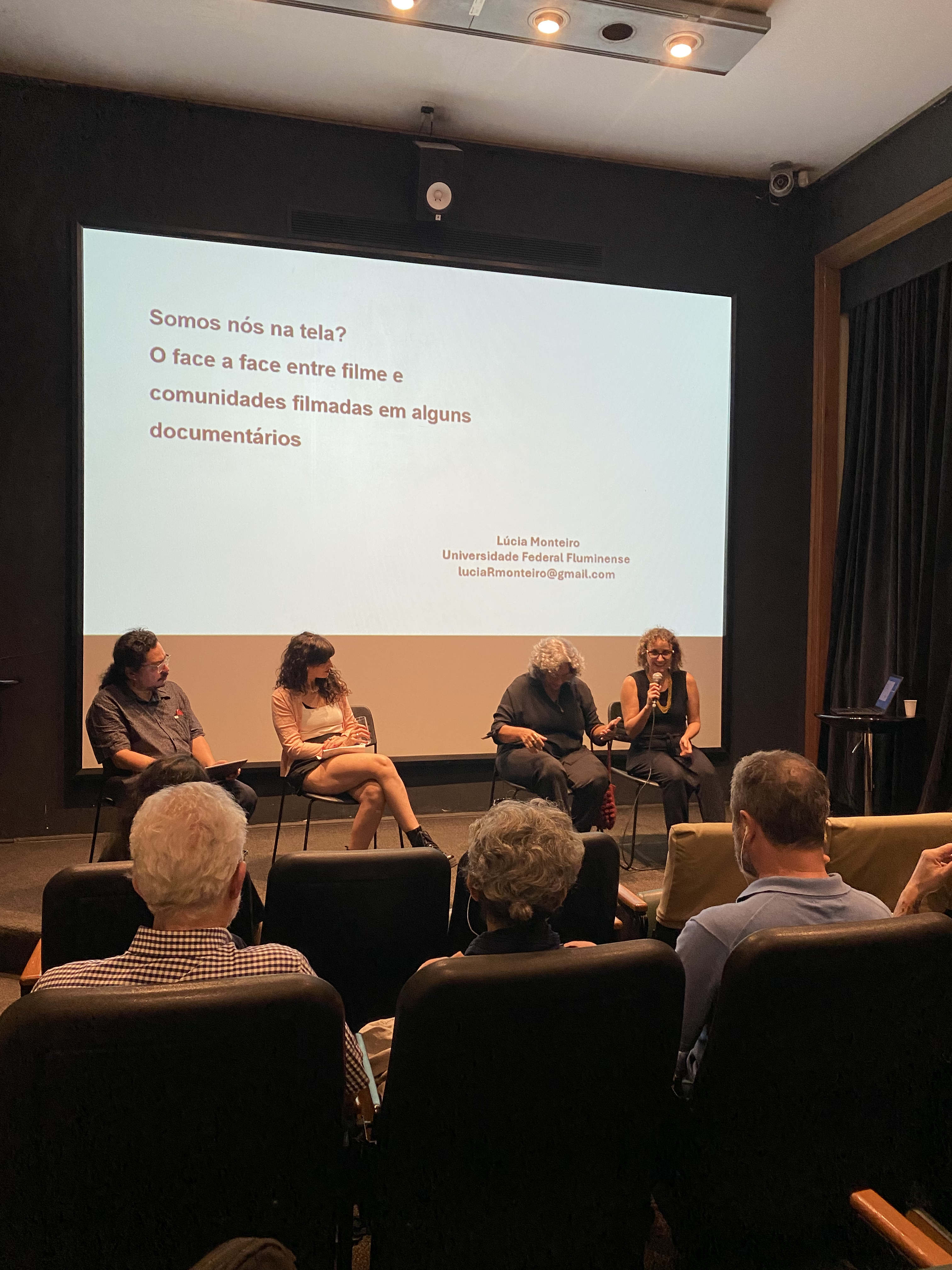
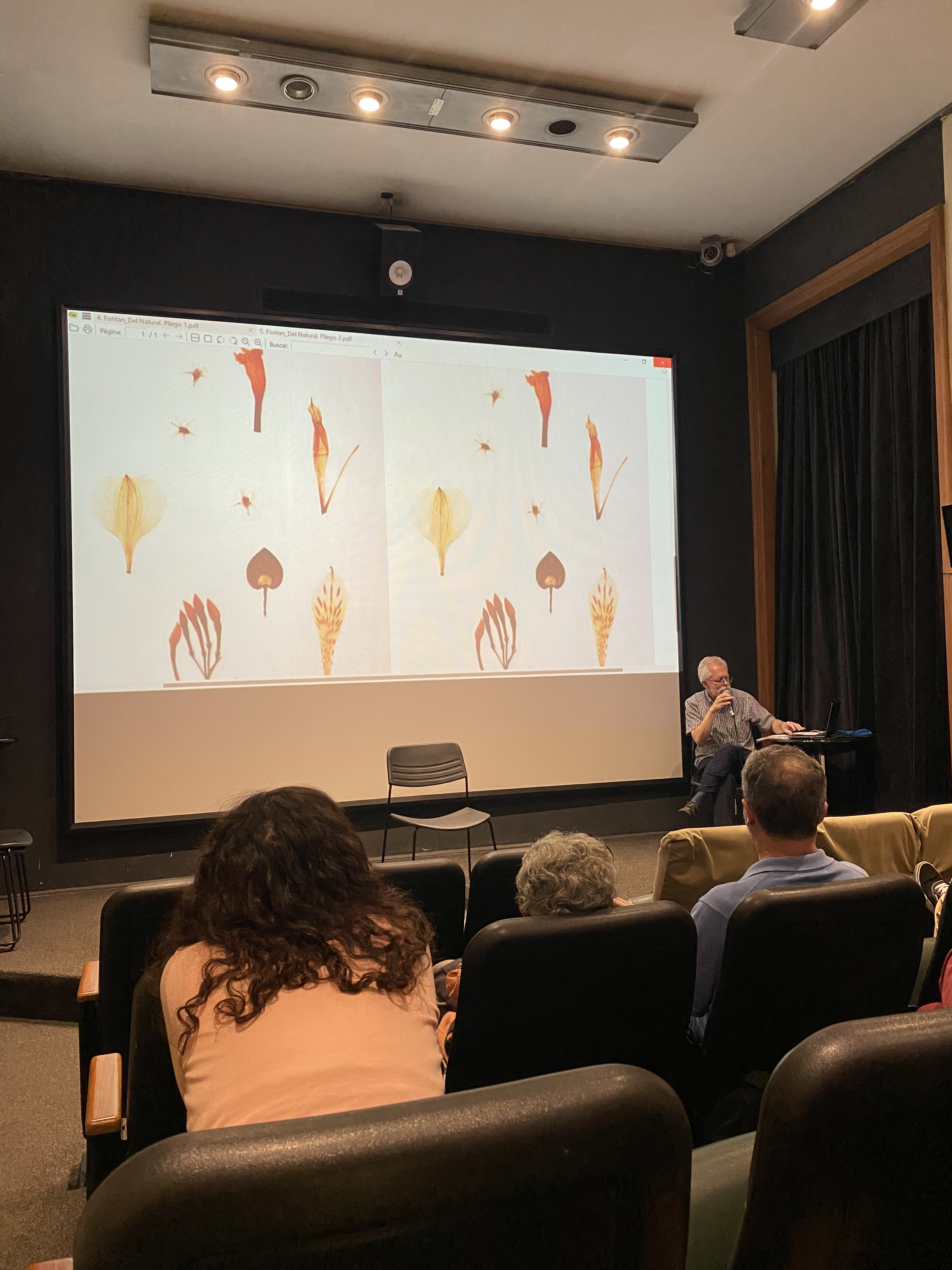
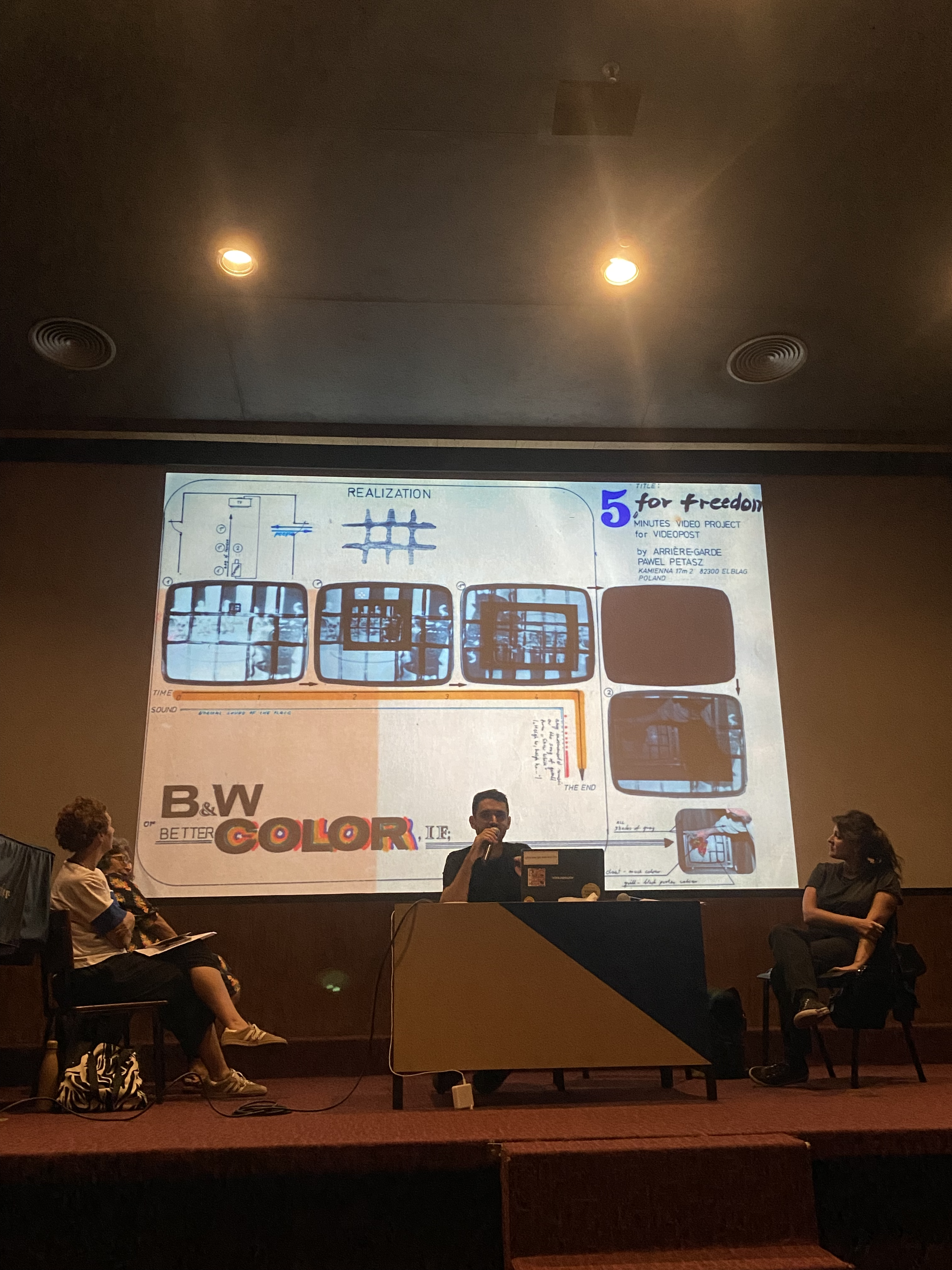
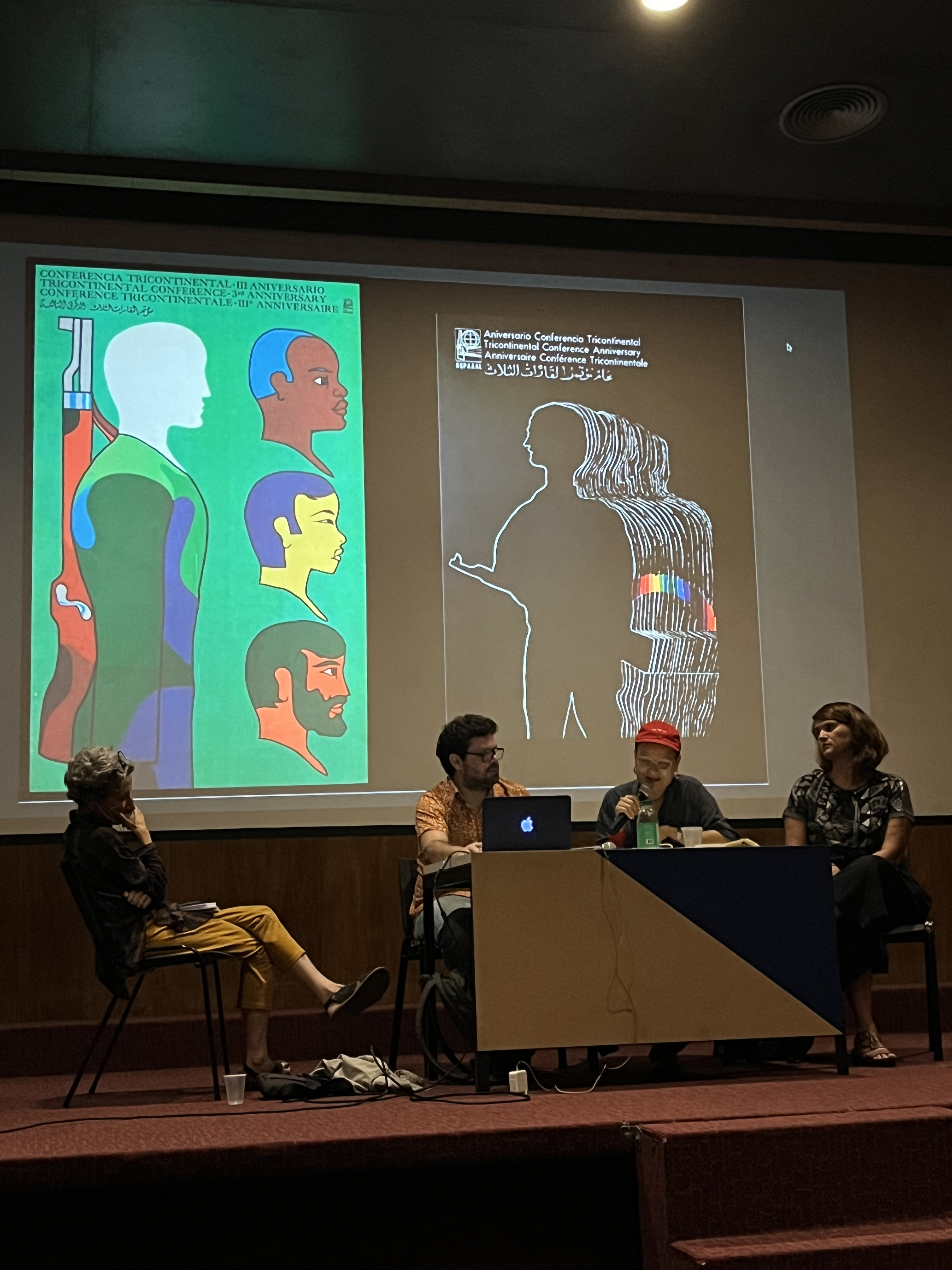
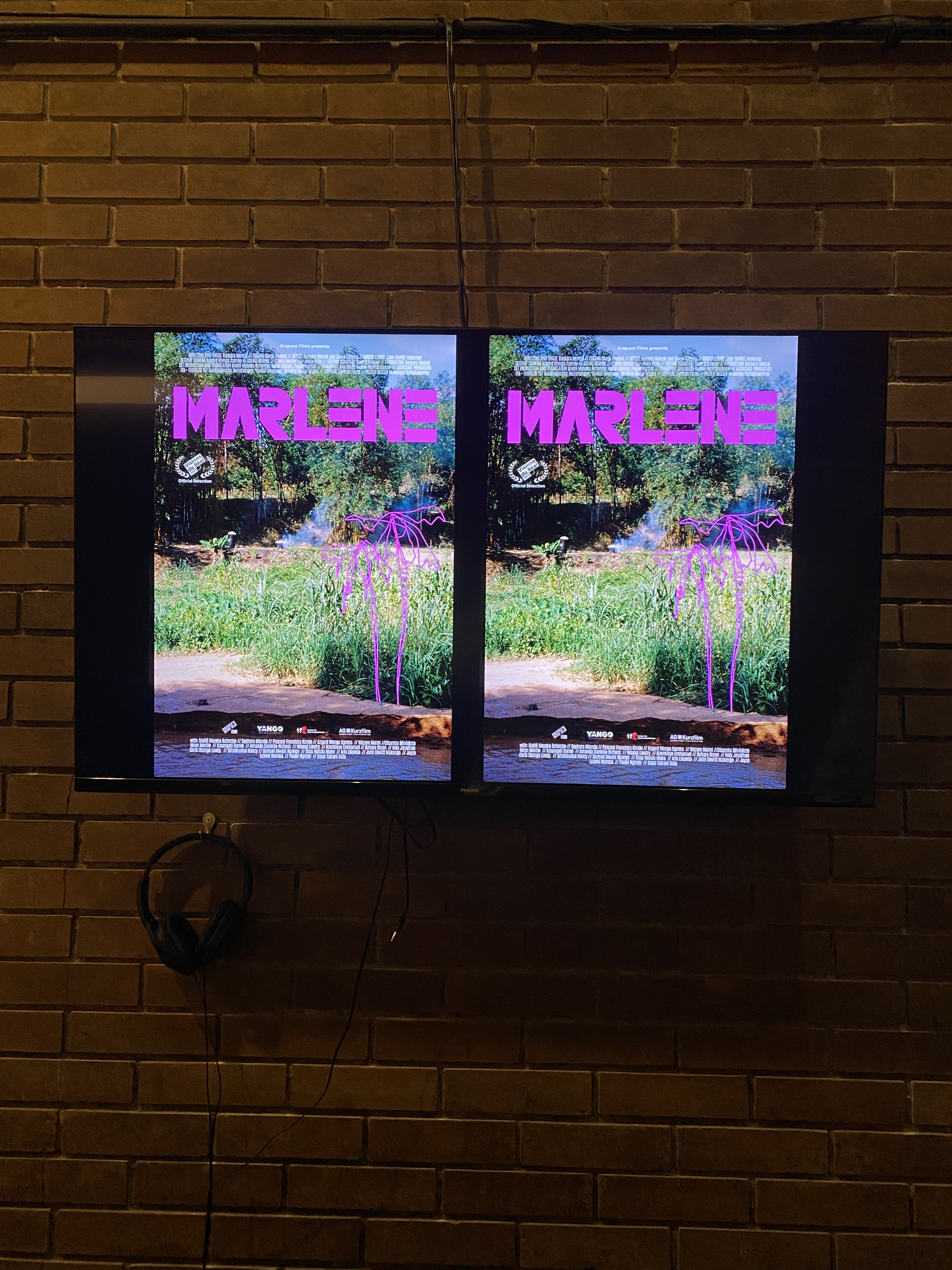
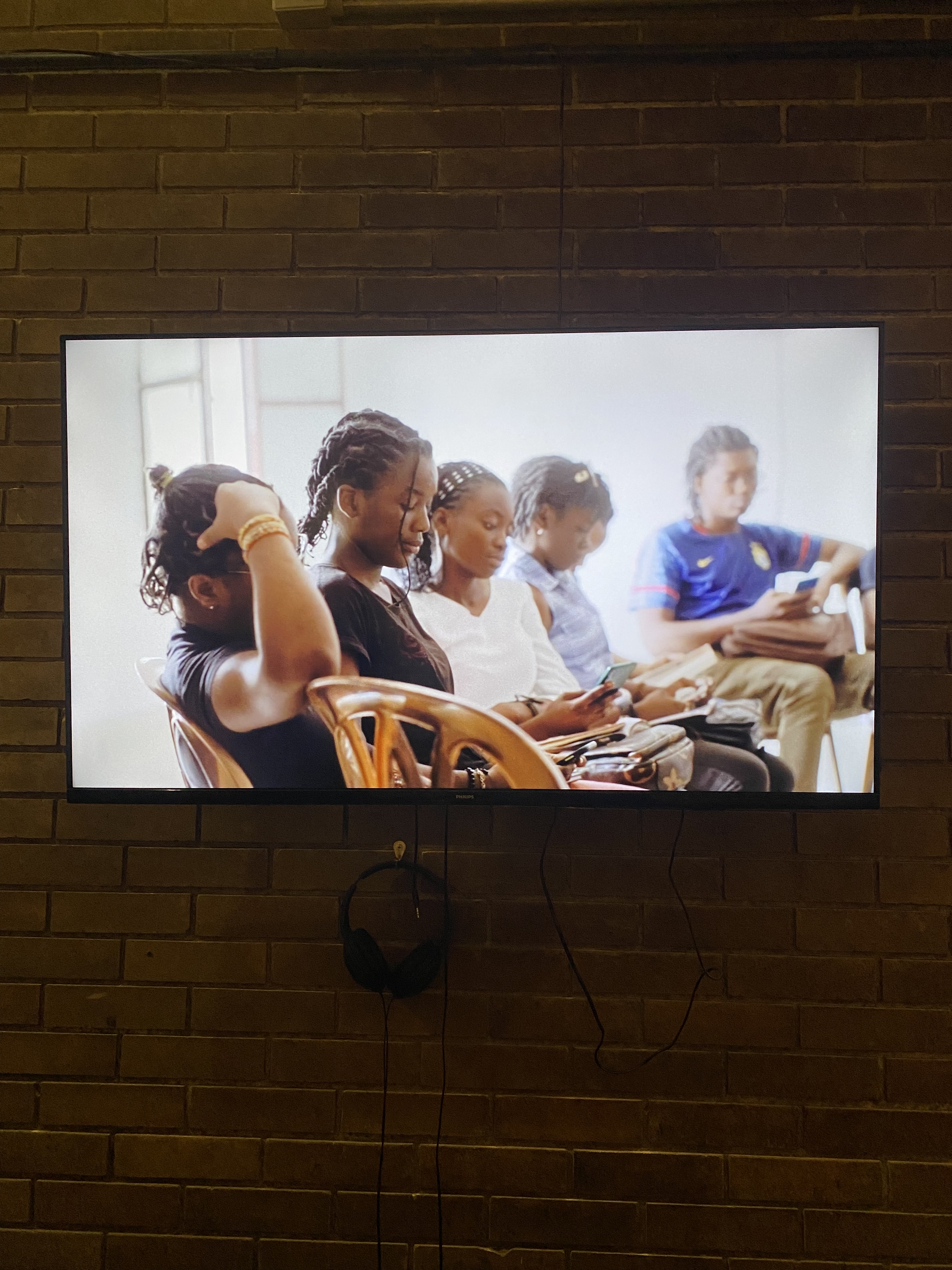
This colloquium brings together researchers in art, philosophy, literature and cinema from Brazil, Argentina, Chile, Colombia and Italy, with a focus on Latin American experiences. Held in person at the Centro de Cultura da Justiça Federal on May 21 and 28 and at the Cinemateca do Museu de Arte Moderna from May 22 to 24, both in the city of Rio de Janeiro, the program includes an exhibition of films related to the research presented. Proposed by artists and researchers from the research group Atotality, Common Imaginaries is organized by the Postgraduate Program in Visual Arts of the School of Fine Arts of the Federal University of Rio de Janeiro and is funded by Capes (Proex and PrInt).
SINEMA TRANSTOPIA
June 2023. Knowledge Ties #3: Amor Rojo. Moderation of the talk with Rike Frank and Dora Garcia after the exhibition of the film Amor Rojo, by Dora García. Berlin, Germany.
Knowledge Tie is a collaboration between the Berlin Artistic Research Grant Programme and SİNEMA TRANSTOPIA. The public programme contributes to the ongoing unfolding of research-based practices in the arts, their foundations and forms of mediation. The programme thus responds to the growing importance of art for knowledge in society and independent forms of knowledge formation.
The 3rd event included the screening of Amor Rojo, a film by Dora García, followed by a conversation with Rike Frank moderated by fellow Barbara Marcel.
Click here for more information on the film and the event.
June 2023. Knowledge Ties #3: Amor Rojo. Moderation of the talk with Rike Frank and Dora Garcia after the exhibition of the film Amor Rojo, by Dora García. Berlin, Germany.
Knowledge Tie is a collaboration between the Berlin Artistic Research Grant Programme and SİNEMA TRANSTOPIA. The public programme contributes to the ongoing unfolding of research-based practices in the arts, their foundations and forms of mediation. The programme thus responds to the growing importance of art for knowledge in society and independent forms of knowledge formation.
The 3rd event included the screening of Amor Rojo, a film by Dora García, followed by a conversation with Rike Frank moderated by fellow Barbara Marcel.
Click here for more information on the film and the event.
FESTIVAL PROTAGONISTAS AT HAU
2023, Berlin, Germany. Festival ¡PROTAGONISTAS! Beyond Equality: Feminisms Reclaiming Life - An Internationalist Gathering. Curated by Firoozeh Farvardin, Barbara Marcel, Camila Nobrega, Bahar Oghalai, Bafta Sarbo, Elif Sarican and Margarita Tsomou. At HAU - Hebbel am Ufer Theater.
2023, Berlin, Germany. Festival ¡PROTAGONISTAS! Beyond Equality: Feminisms Reclaiming Life - An Internationalist Gathering. Curated by Firoozeh Farvardin, Barbara Marcel, Camila Nobrega, Bahar Oghalai, Bafta Sarbo, Elif Sarican and Margarita Tsomou. At HAU - Hebbel am Ufer Theater.
Co-curatorial work for the Festival ¡PROTAGONISTAS! Beyond Equality: Feminisms Reclaiming Life - An Internationalist Gathering at HAU, Berlin, and moderation of the panel discussion “Against Capitalism and its Extractivisms: From Community Feminism to Territorial Cuerpo-Tierra from Territorial Community Feminism and Agroecology in Abya Yala (Latin America)” With: Lorena Cabnal, Carmen Cariño, Miriam Nobre, Louise Wagner / Moderation: Barbara Marcel, Camila Nobrega.


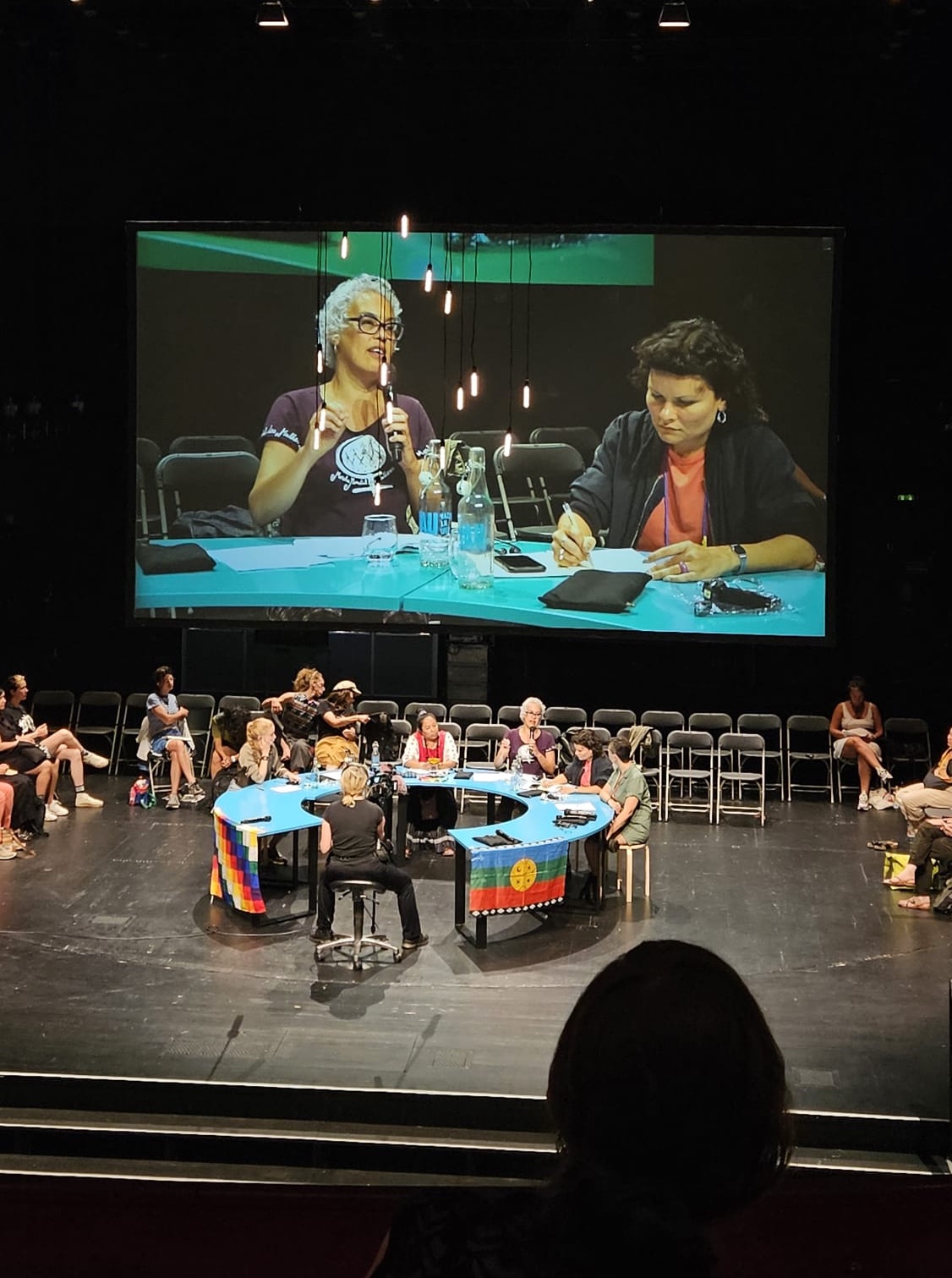

SITUATED KNOWLEDGES, GLOBAL ECOLOGIES
2-4.09.2019 at NGBK and Prinzessinnengarten Berlin.
2-4.09.2019 at NGBK and Prinzessinnengarten Berlin.
Situated knowledge / Global ecologies: a collaborative Walkshop Ramble was a three-day project on social-ecological justice, initiated by artist Barbara Marcel and journalist Camila Nóbrega, which took place between 2 and 4 September in the Prinzessinnengarten space in Berlin. The project brought together scientists and fellow scholars from the Heinrich-Böll Foundation with environmental activists, journalists and artists, for an experimental format of knowledge exchange. The main themes were guided by different understandings of what has been called ecology and the global dynamics of knowledge production and narratives about the territories, seeking decolonial and antipatriarchal views.
As a closing debate in collaboration with the project »Licht Luft Scheiße. Perspektiven auf Ökologie und Moderne«, the dialogue was open to the public, with the participation of the workshop participants, and the presence of the Brazilian urban farmer and researcher Sílvia Baptista, representative leader of the struggle for land rights in Brazil. The debate was mediated by Barbara Marcel and Camila Nóbrega, focusing on the ongoing narratives about social-environmental conflicts in Brazil and the situation of struggle of diverse social movements and forest peoples, not only for the right to land, but for the right to livelihoods, community practices and common imaginaries. From a local-global perspective and reflecting on what was produced throughout the Workshop, the aim was to discuss asymmetries related to land rights and, simultaneously, to the production of discourses. The role of patriarchy and coloniality in organizing bodies and territories were in the core of the discussion.
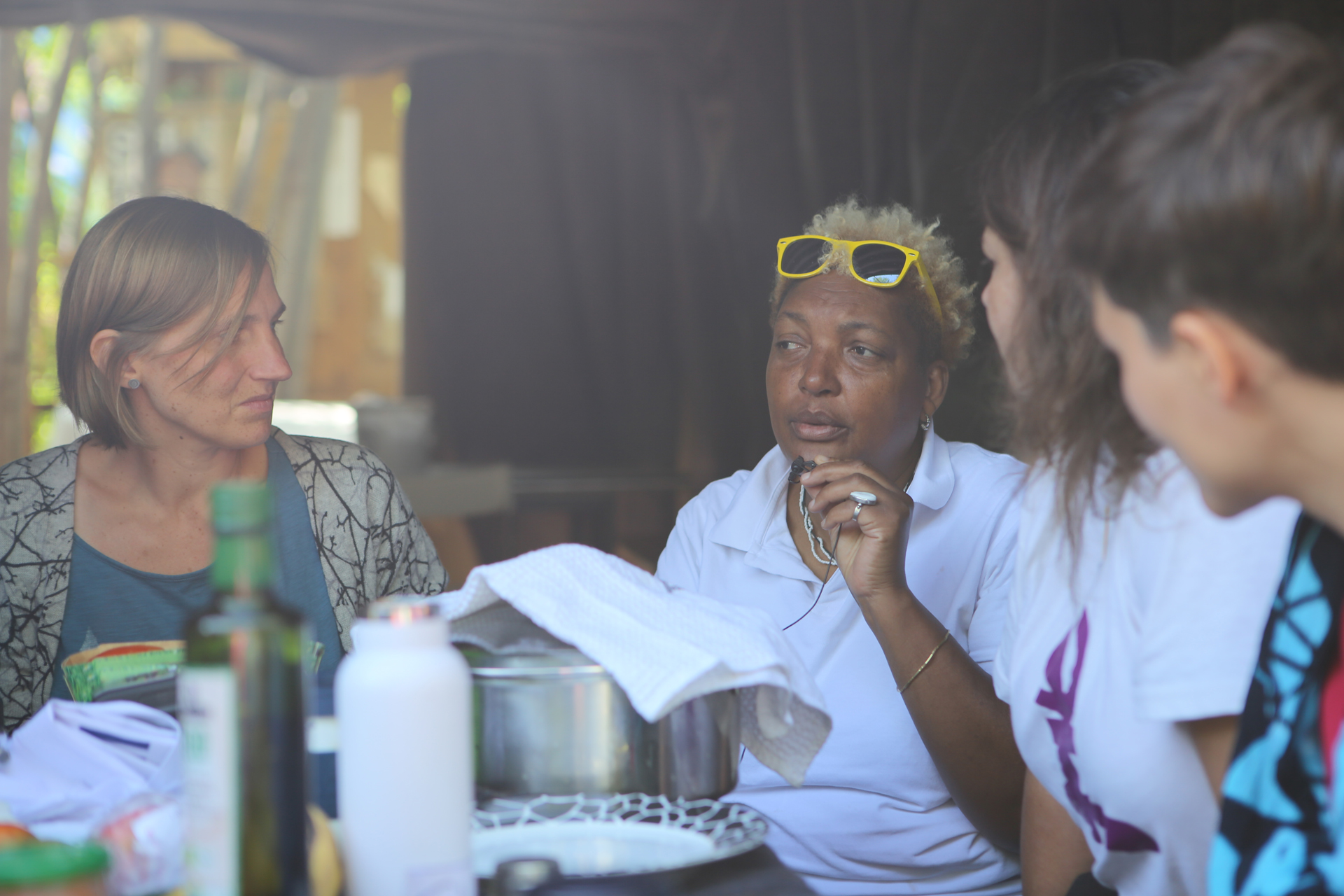

CINEBH
27.09.2024, Debate STAGES OF LATIN AMERICAN FILM: CO-PRODUCTIONS AND THEIR CHALLENGES as part of the 18th CINEBH International Film Festival in Belo Horizonte, Brazil.
27.09.2024, Debate STAGES OF LATIN AMERICAN FILM: CO-PRODUCTIONS AND THEIR CHALLENGES as part of the 18th CINEBH International Film Festival in Belo Horizonte, Brazil.
Guests:
- Barbara Marcel - director and producer of Suraras | Brazil
- Ernesto Jara Vargas - director of Altamar | Costa Rica
- Ivette Liang - Head of Production at Nuevas Miradas | Cuba/Colombia
- Juan Pablo Polanco Carranza - director of Carro Pasajero | Colombia
- Luana Melgaço - partner at Anavilhana and producer of Praia Formosa | Brazil
Mediator: Paulo de Carvalho - producer and collaborator of Brasil CineMundi | Germany



CINEMATECA BRASILEIRA
20.07.2024, Double screening of Glauber Rocha’s film DER LEONE HAVE SEPT CABEÇAS and Barbara Marcel’s medium-length film MARLENE, followed by a conversation between Marcel, Mariana Queen Nwabsili and Mateus Araújo, at the Brazilian Cinematheque. São Paulo, Brazil.
20.07.2024, Double screening of Glauber Rocha’s film DER LEONE HAVE SEPT CABEÇAS and Barbara Marcel’s medium-length film MARLENE, followed by a conversation between Marcel, Mariana Queen Nwabsili and Mateus Araújo, at the Brazilian Cinematheque. São Paulo, Brazil.
In a special double screening, DER LEONE HAVE SEPT CABEÇAS (Glauber Rocha, 1970) and MARLENE (Barbara Marcel, 2022) were shown at the Cinemateca Brasileira. While DER LEONE, filmed in Congo Brazzaville in 1969, is part of Rocha's Tricontinental Cinema project, MARLENE, filmed in Kinshasa, just across the river, is the result of the screening and reception of Rocha's film today and the debates about militant cinema. The screening was followed by a conversation between Marcel, journalist, researcher and film festival curator Mariana Queen Nwabsili and film studies professor Mateus Araújo.
Link to the event.
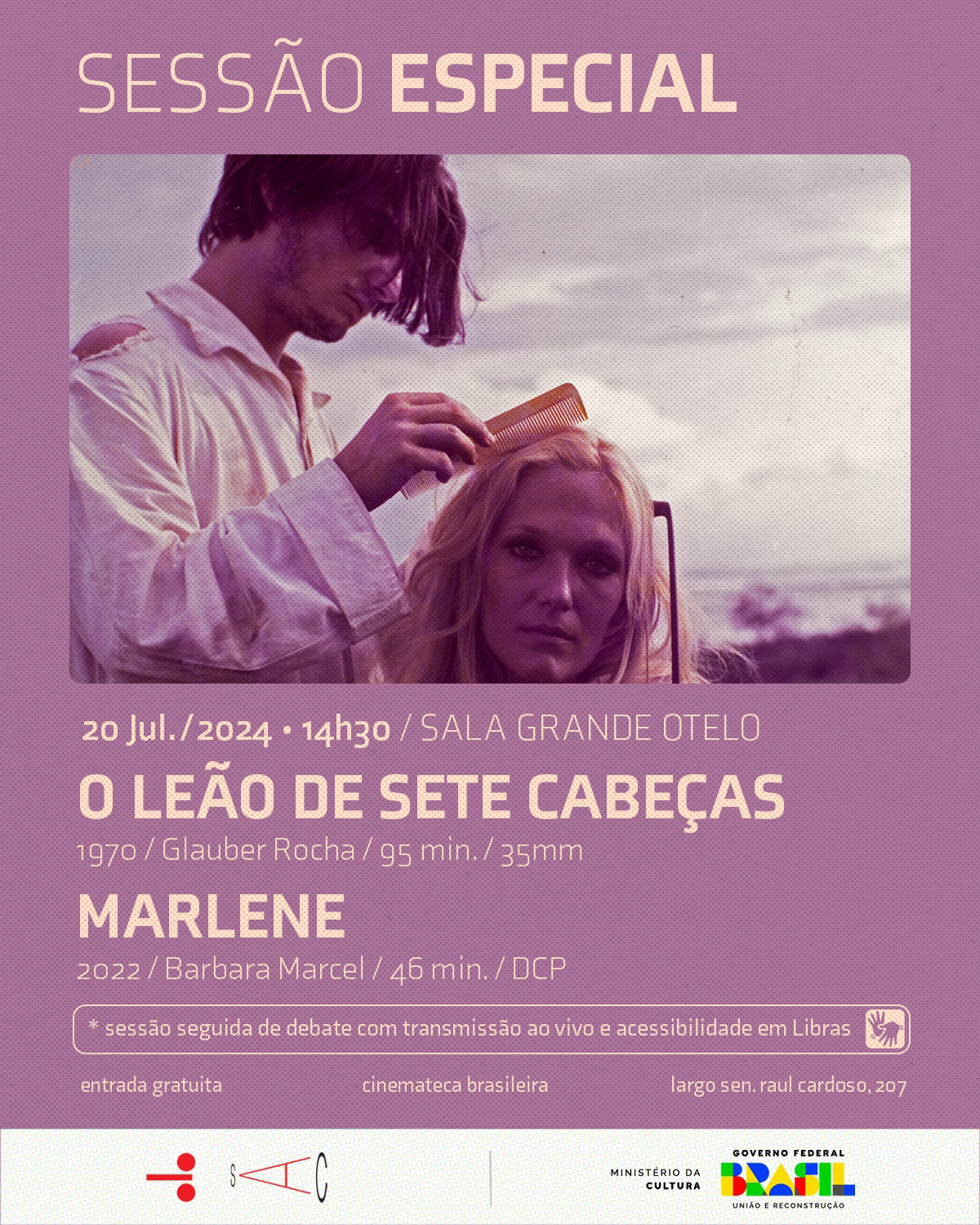
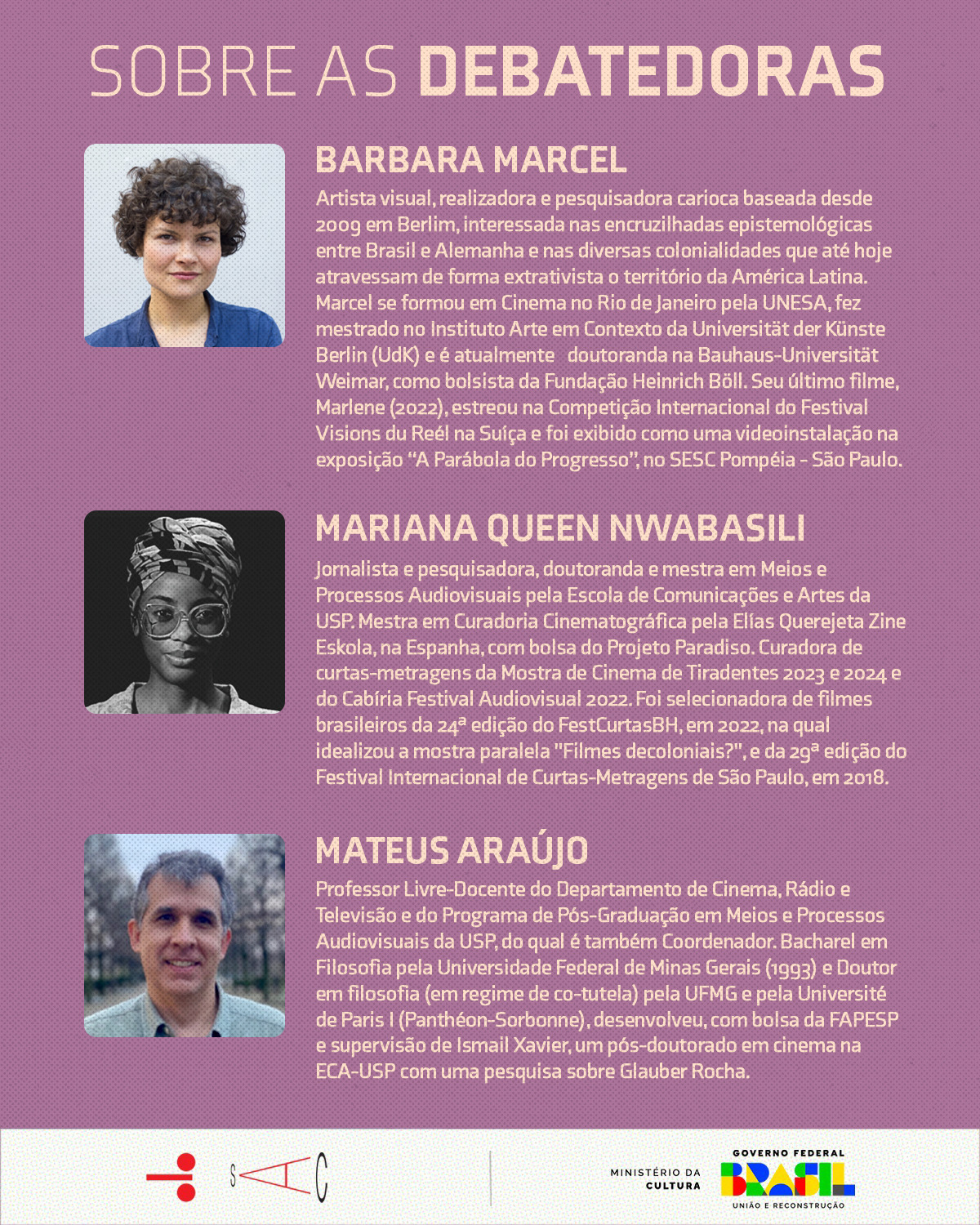
COMMON IMAGINARIES
4th Research Seminar on Art and City_DESILHA 2024, Federal University of Rio de Janeiro.
4th Research Seminar on Art and City_DESILHA 2024, Federal University of Rio de Janeiro.
Lecture Performance at the opening of the event, alongside Livia Flores, André Leal and Giovanni Festa, at Centro Cultural da Justiça Federal in Rio de Janeiro.
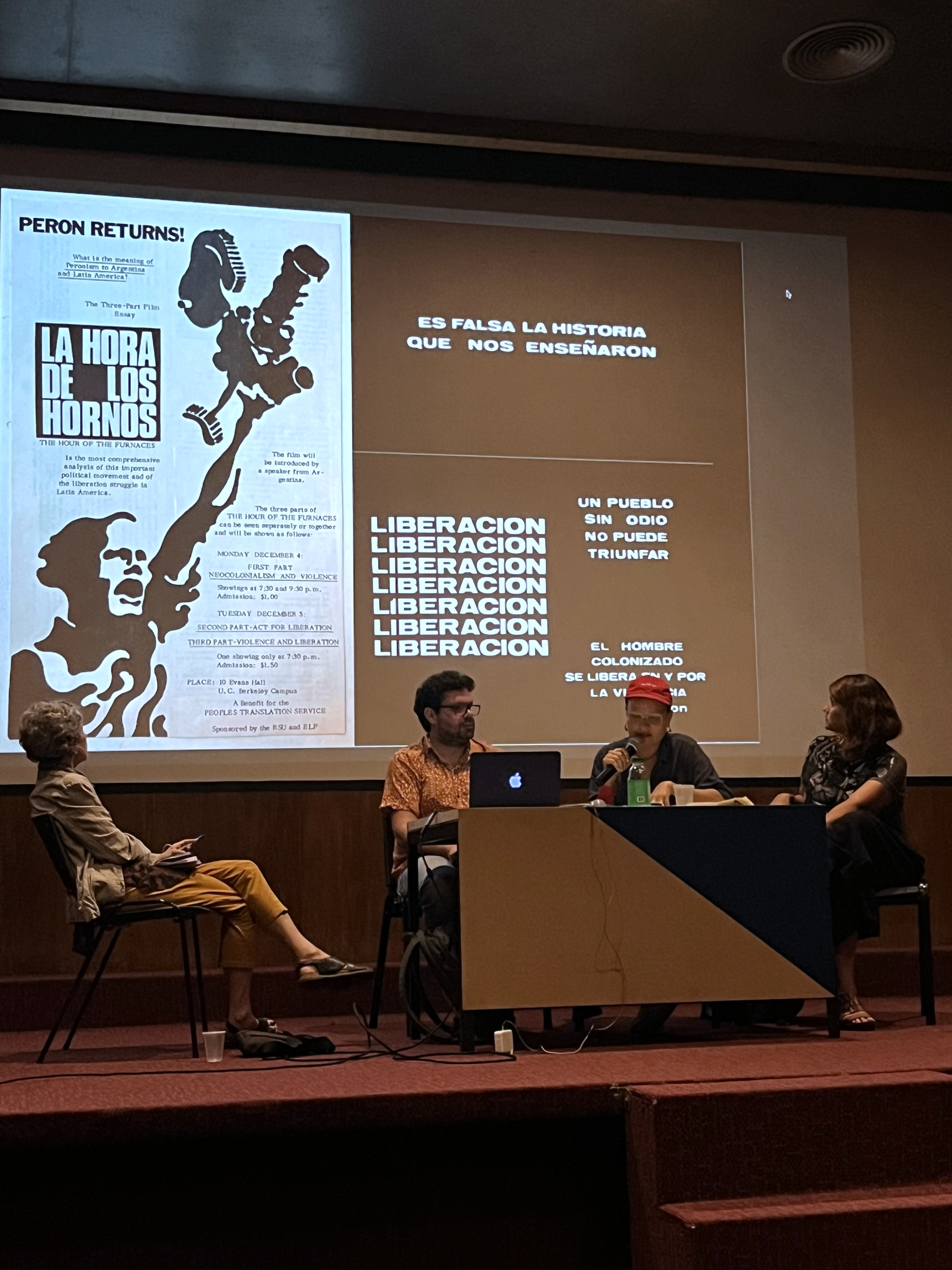
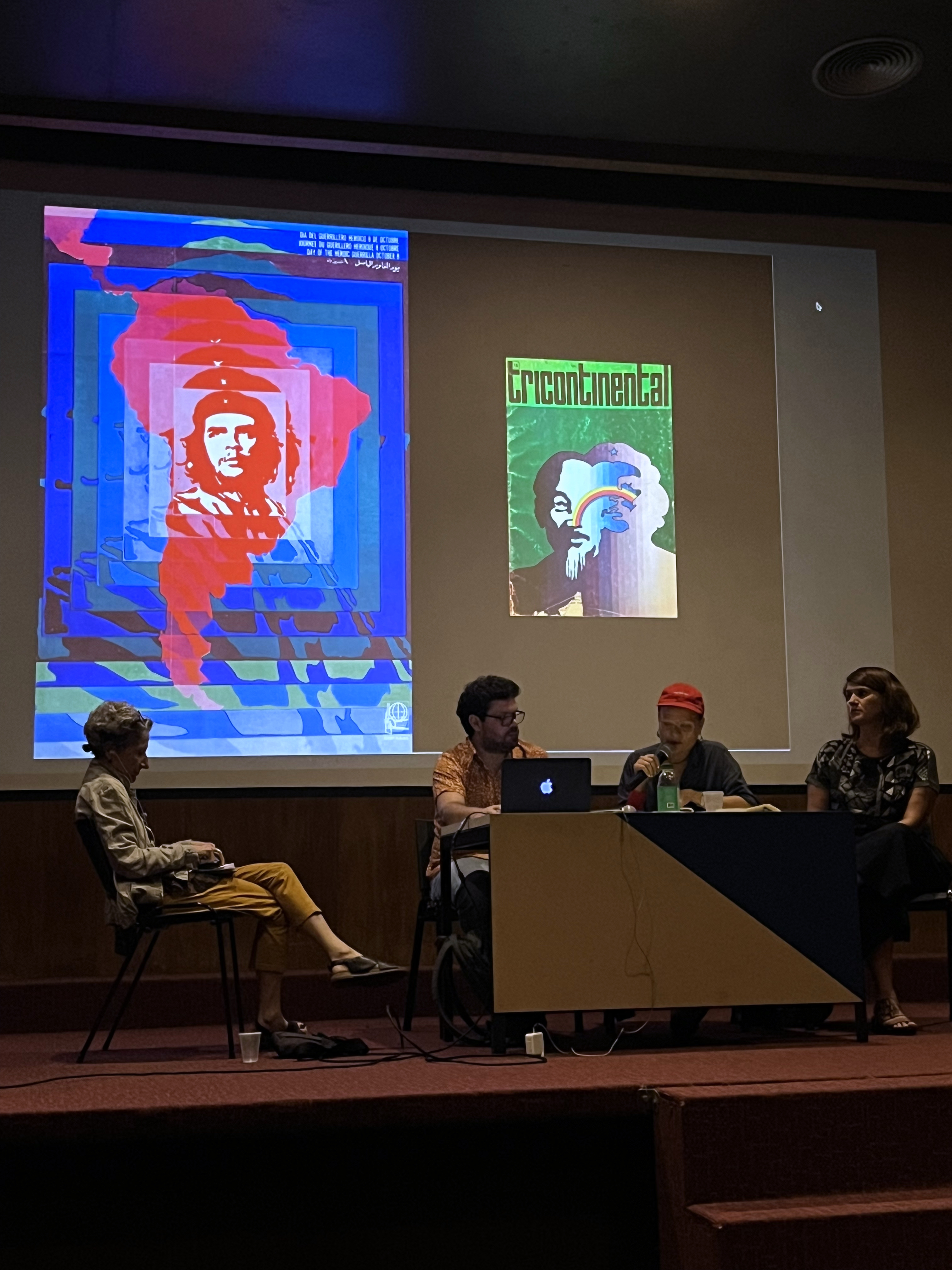
Screening of the films HUMO SOBRE LOS HUMEDALES and MARLENE by Barbara Marcel followed by a conversation between the film director and Mariana Queen Nwabasili at Cinemateca do MAM, Rio de Janeiro, Brazil.
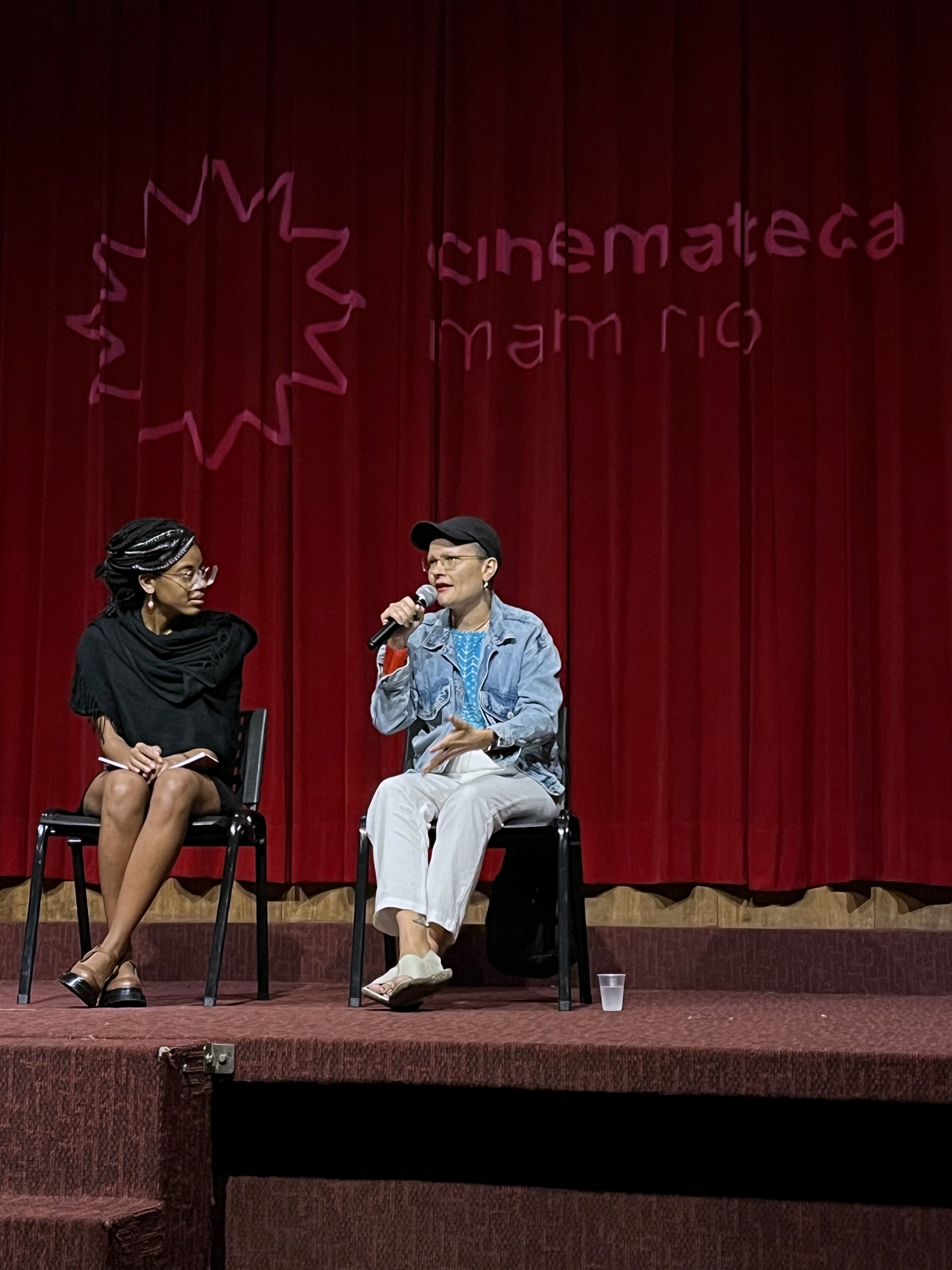
TO SLIP, TO SLIDE, TO GLITCH
13.6.2024, Other Transitions - Screenings as part of the exhibition "to slip, to slide, to glitch" by Larisa Crunțeanu & Sonja Hornung; contributions from and events with Mareike Bernien & Alex Gerbaulet, Barbara Marcel, Ann Oren, Naomi Rincón-Gallardo, Tama Ruß, Nikola Stoyanov; in curatorial collaboration with Katharina Koch & Sylvia Sadzinski, at alpha nova & galerie futura, Berlin.
13.6.2024, Other Transitions - Screenings as part of the exhibition "to slip, to slide, to glitch" by Larisa Crunțeanu & Sonja Hornung; contributions from and events with Mareike Bernien & Alex Gerbaulet, Barbara Marcel, Ann Oren, Naomi Rincón-Gallardo, Tama Ruß, Nikola Stoyanov; in curatorial collaboration with Katharina Koch & Sylvia Sadzinski, at alpha nova & galerie futura, Berlin.
Screening event: Other transitions
Wannabe starlet trees, a phone sex worker in Vetagrande Zacatecas, Mexico, and animated Harz Roller canaries in Tenerife precede an underground conversation about transitioning. These works reshuffle the categories of human, nature, and artifice, pointing towards moments of indefinition, refusal, and chasing collective dreams against the odds.
Congratulations! You are still in the running for becoming, Ann Oren, 2015 (10:22)
Heavy Blood, Naomi Rincón-Gallardo, 2018 (18:43)
Excerpts from Des Goldes Klang (Golden Tone), Barbara Marcel, 2023 (ca. 40:00) - Exhibition of the channels "Animation" and "Interview with Tom".
Followed by an online artist talk with Barbara Marcel.
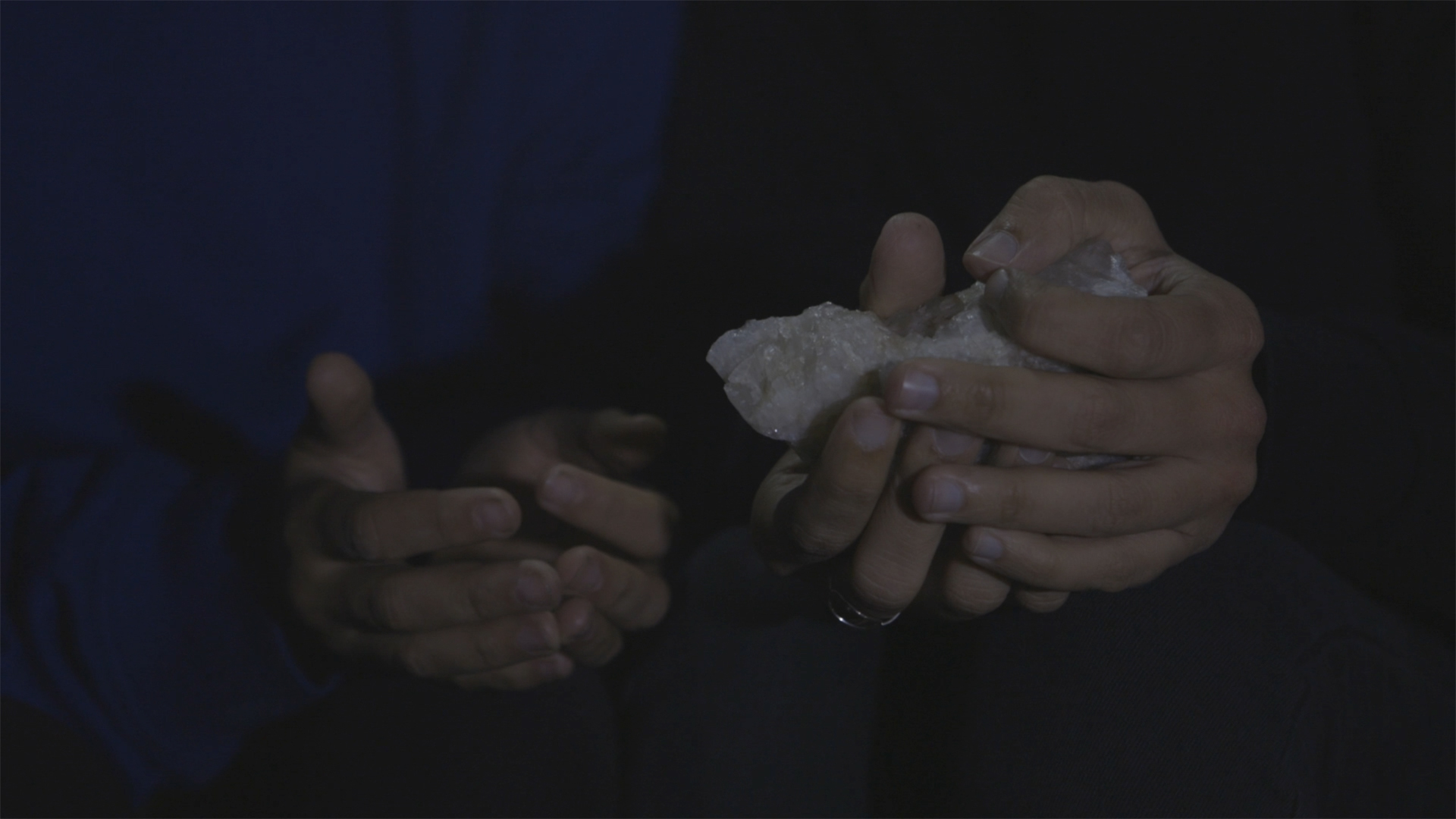
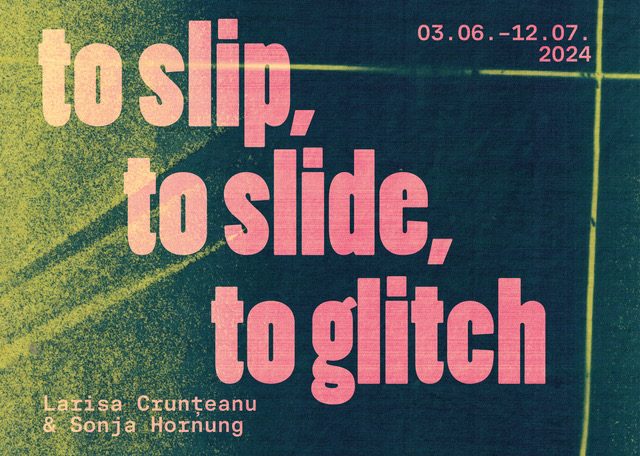
SINEMA TRANSTOPIA
June 2023. Knowledge Ties #4: HUMO SOBRE LOS HUMEDALES. A presentation by Deborah Shaw and exhibition of Barbara Marcel’s feature-length Humo sobre los Humedales, followed by a conversation with Shaw and Marcel moderated by Paz Guevara. Berlin, Germany.
June 2023. Knowledge Ties #4: HUMO SOBRE LOS HUMEDALES. A presentation by Deborah Shaw and exhibition of Barbara Marcel’s feature-length Humo sobre los Humedales, followed by a conversation with Shaw and Marcel moderated by Paz Guevara. Berlin, Germany.
Knowledge Tie is a collaboration between the Berlin Artistic Research Grant Programme and SİNEMA TRANSTOPIA. The public programme contributes to the ongoing unfolding of research-based practices in the arts, their foundations and forms of mediation. The programme thus responds to the growing importance of art for knowledge in society and independent forms of knowledge formation.
The 4th event included a presentation by Deborah Shaw and a screening of Humo sobre los Humedales, a film by Barbara Marcel, followed by a conversation with Shaw and Marcel moderated by Paz Guevara.
Following the work of environmentalists and communicators involved in social movements in the city of Concepción, the film Humo sobre los Humedales (Smoke over wetlands) portrays the role of women in the uprising that took to the streets of Santiago and all the cities of Chile between October and December 2019.
Click here for more information on the film and the event.
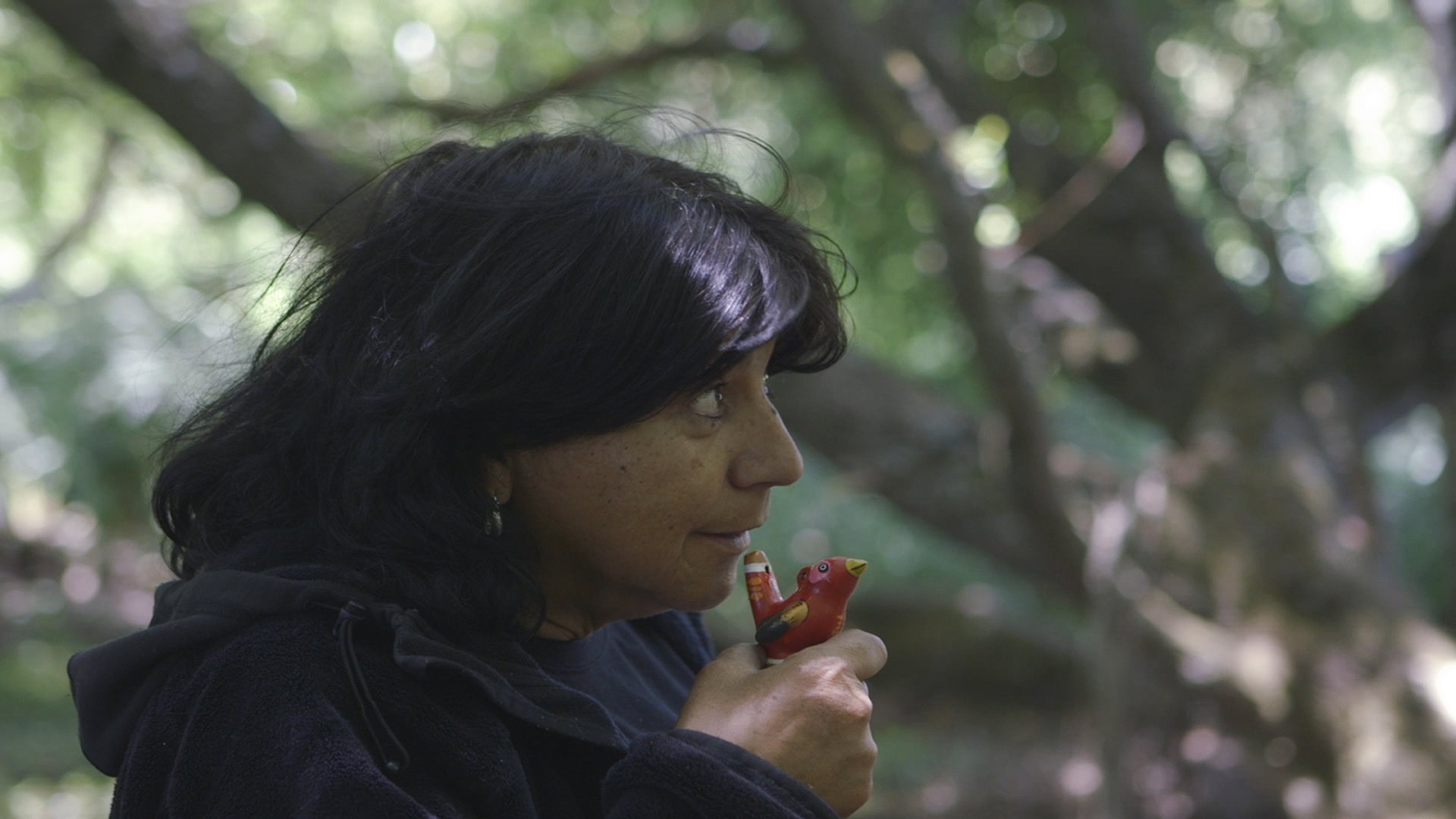
QUALÉ, MANÉ?
2022, Poetry, Performance and Image. A workshop by Érica Zíngano & Barbara Marcel, as part of the Festival "Língua à solta" at Instituto Guimarães Rosa / Centro Cultural Brasil Angola, Luanda.
2022, Poetry, Performance and Image. A workshop by Érica Zíngano & Barbara Marcel, as part of the Festival "Língua à solta" at Instituto Guimarães Rosa / Centro Cultural Brasil Angola, Luanda.
The workshop "Qualé, mané?", proposed by Érica Zíngano and Barbara Marcel, is based on the encounter between different artistic languages, in the use of words and images, to think about issues that often remain veiled in everyday language, especially oral, in an almost "unconscious" way. The artists' proposal with this workshop is to create a collective space for speaking and listening, sharing experiences of the Portuguese language in Brazil and Angola, in order to reflect together with the participants on possible links of the colonial experience and its reminiscences. Based on the discussion of excerpts from the work of poet Patrícia Lino and filmmaker Miguel Gomes, both contemporary Portuguese artists who are thinking about this experience from the colonizer's point of view, we intend to create texts/images that make us think about places of force, counter-narratives to be imagined, in an open conversation about the present time, full of pasts and futures.
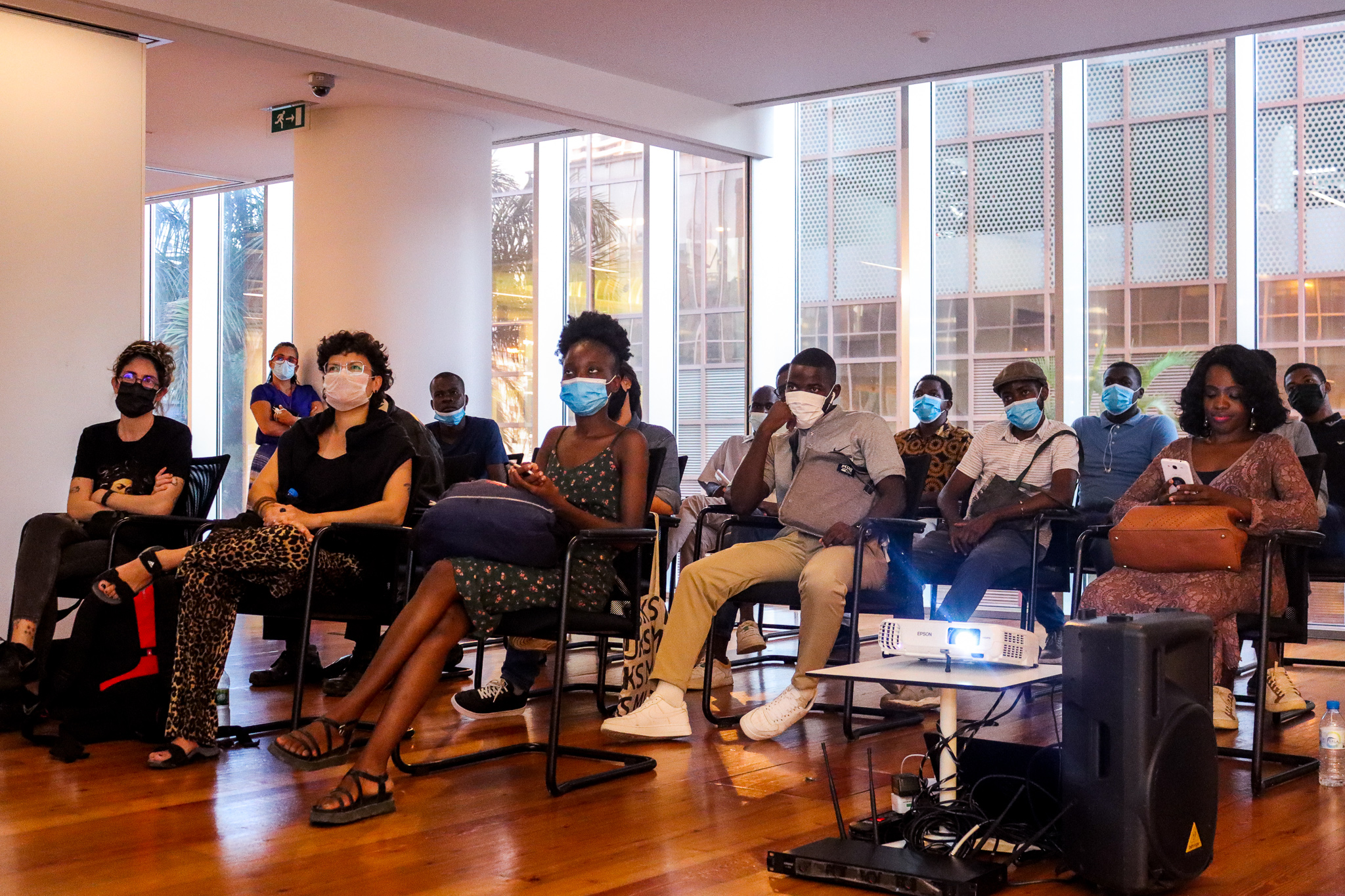
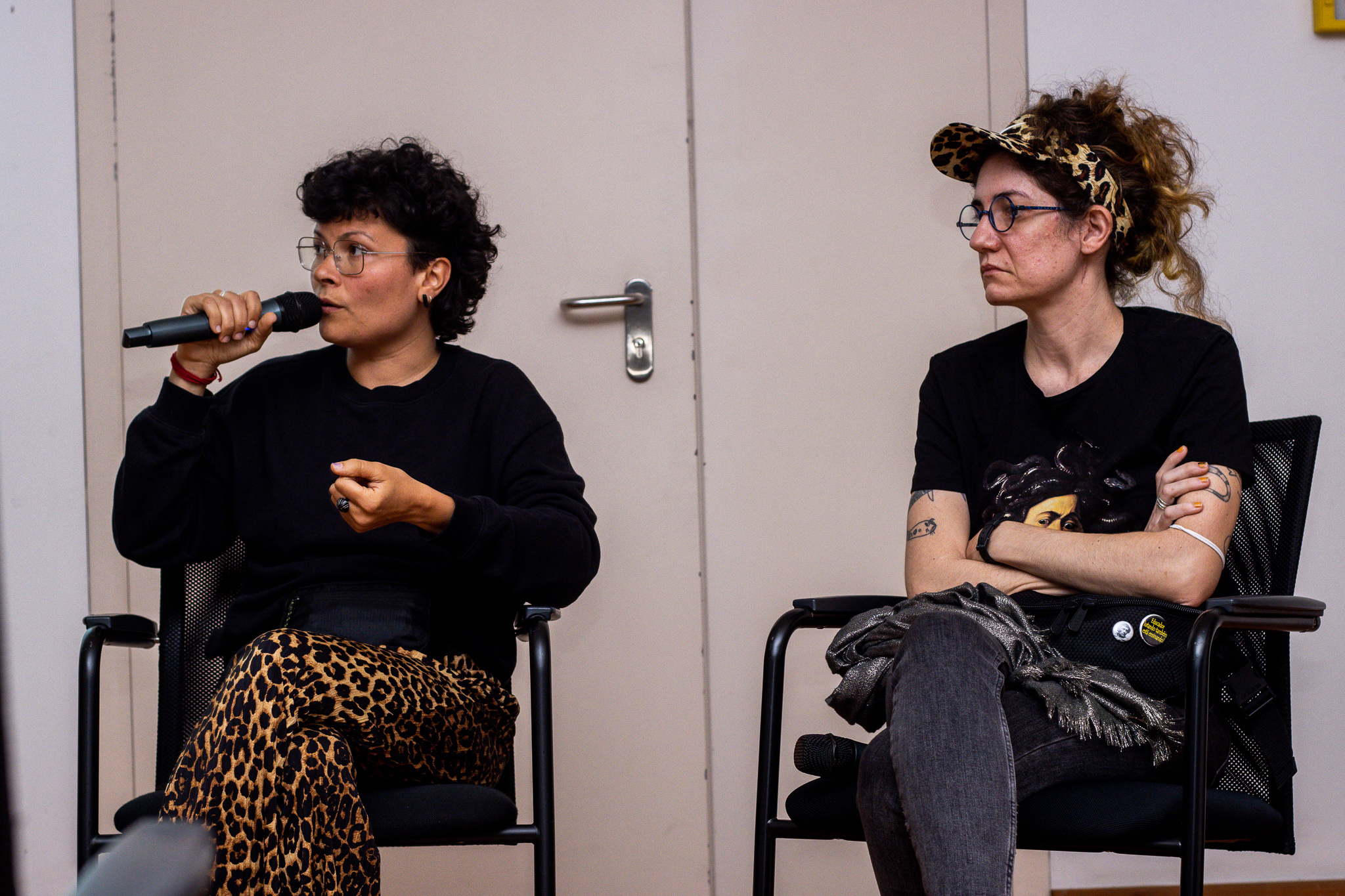
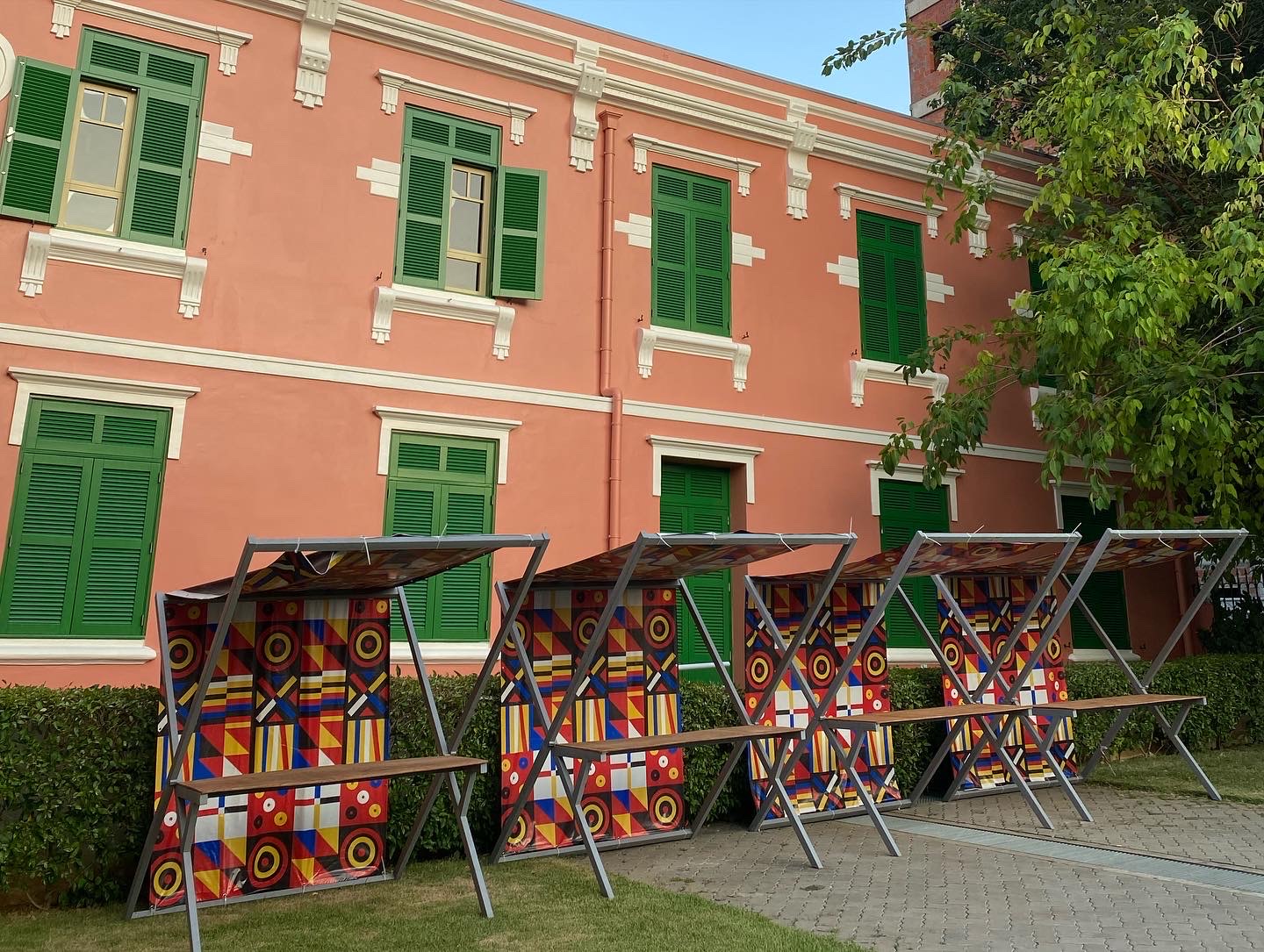
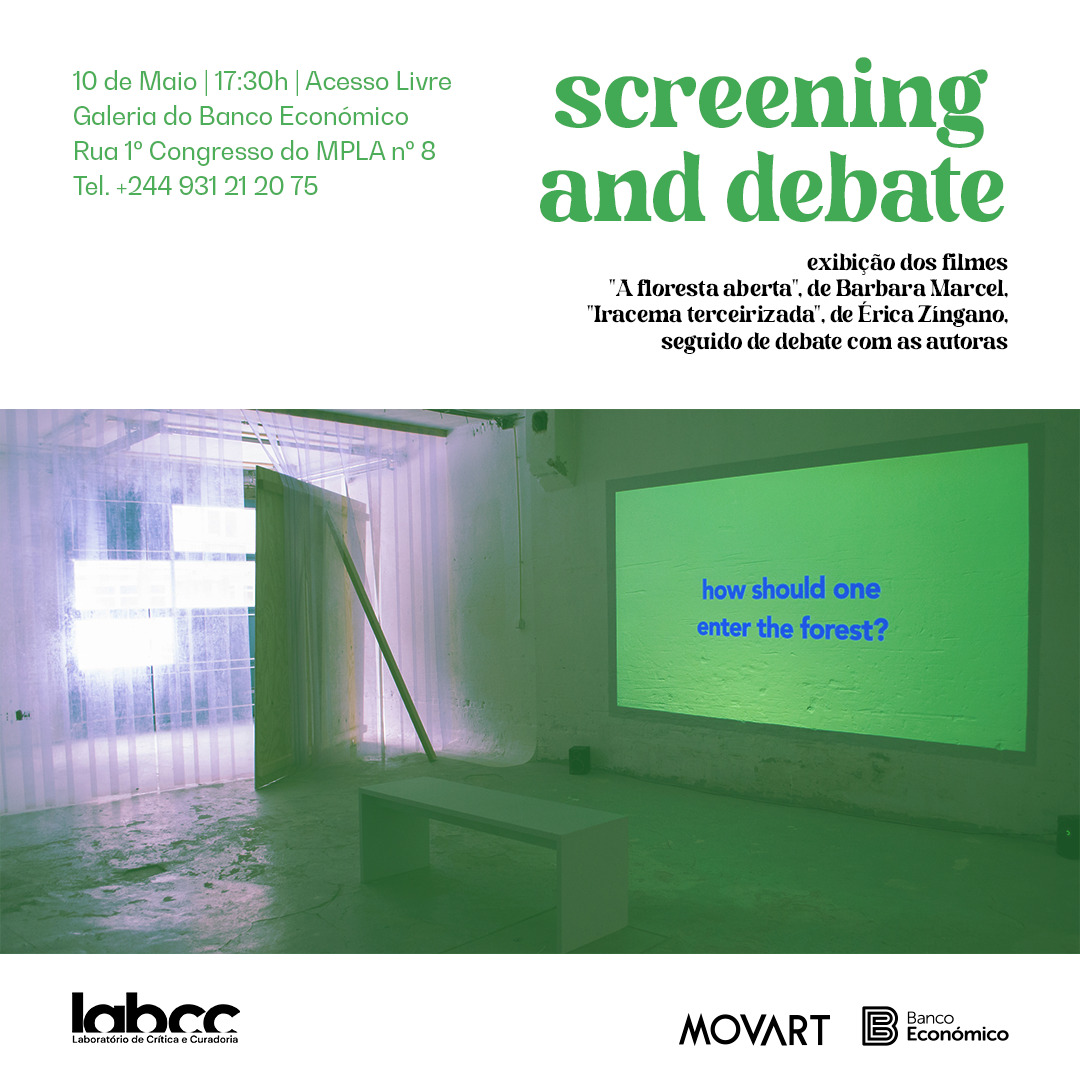
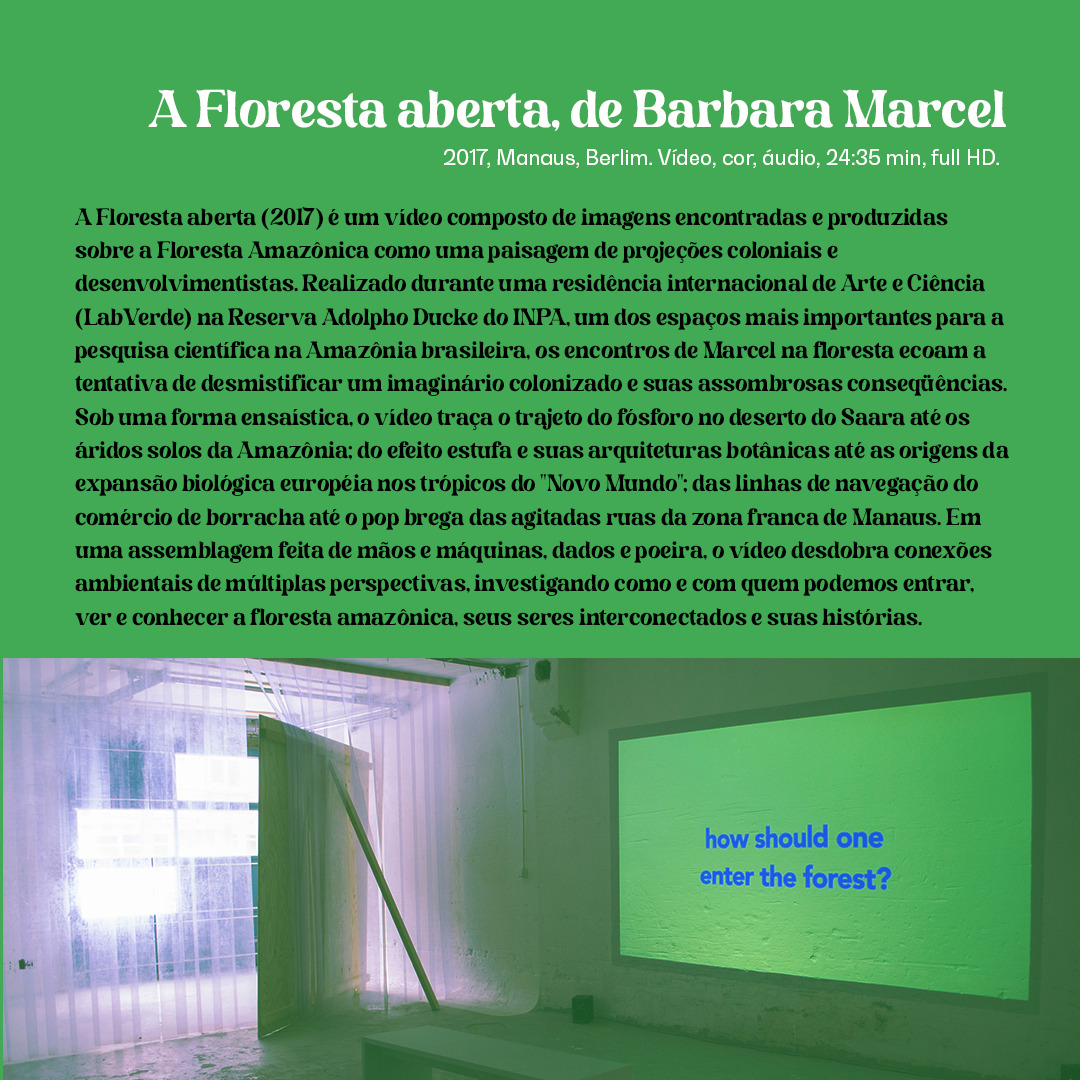
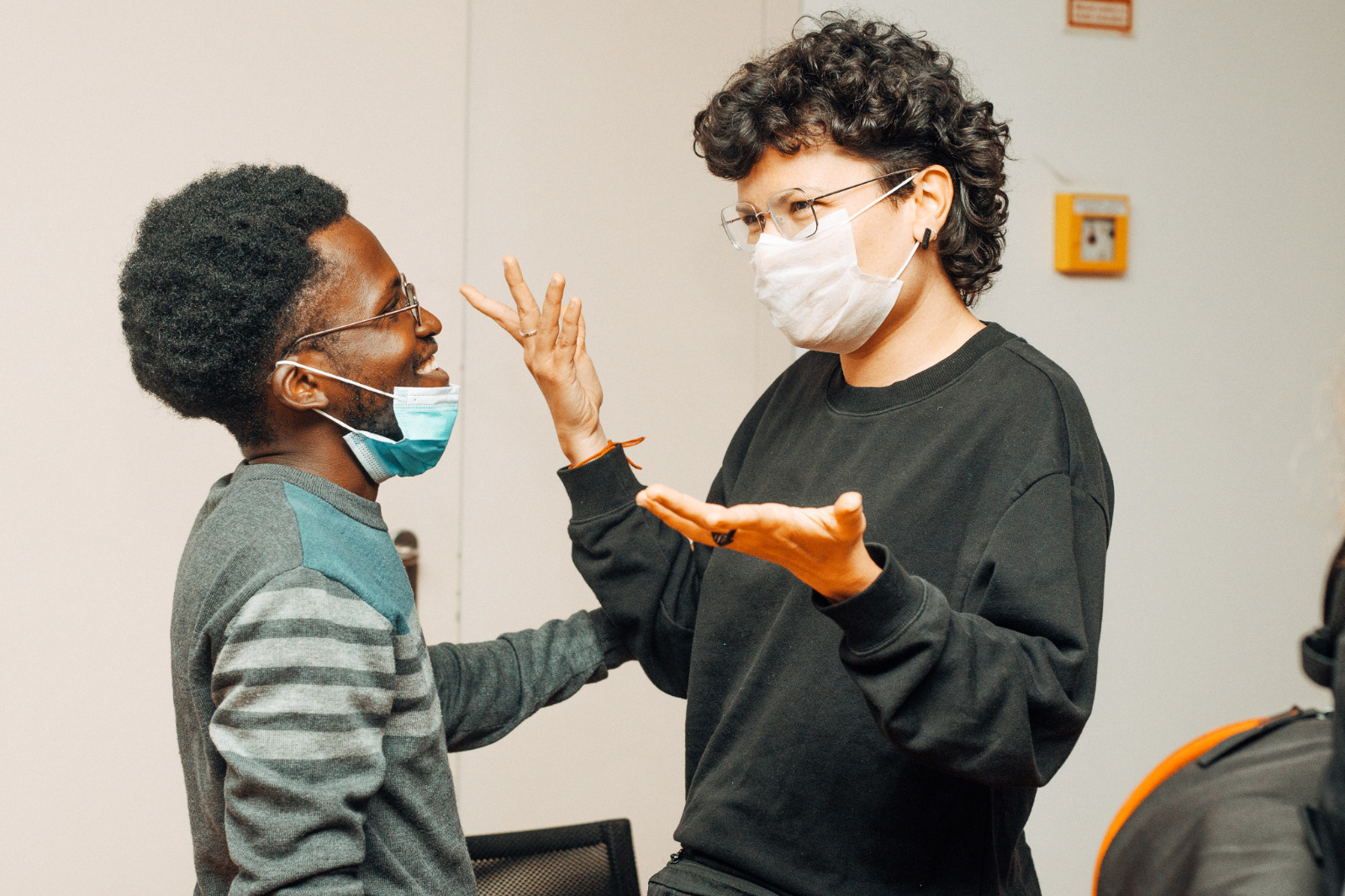
THIRD CINEMA
2021-22, Workshop in Congo-Kinshasa as part of the YANGO! Biennial 2021-2022.
2021-22, Workshop in Congo-Kinshasa as part of the YANGO! Biennial 2021-2022.
In this artistic project, I propose a contemporary revision of the film "Der Leone Have Sept Cabeças", by the Brazilian cinema novo filmmaker Glauber Rocha. As part of my of my participation in the Yango! Biennial in Kinshasa. The first stage of the project proposes the screening of the film made in 1970 in Congo-Brazzaville (now the Republic of Congo), in a public space in Kinshasa. The proposal is that both the projection and reception of Glauber's film be documented in the form of a video. The main point is to document how Glauber's film reaches the local public in Kinshasa today, and from there, to raise the following questions: What is the militant, anti-imperialist image today Is it possible to think of a tricontinental Latin American film alliance in 2021?
The second phase of the project proposes a rewriting of the script of the film in collaboration with locals in Kinshasa in a workshop with a local group of art students. The project starts from the idea that cinema is not only a physical space or a technical device, but a social space of projections, identifications, debate and creation of possible common worlds.
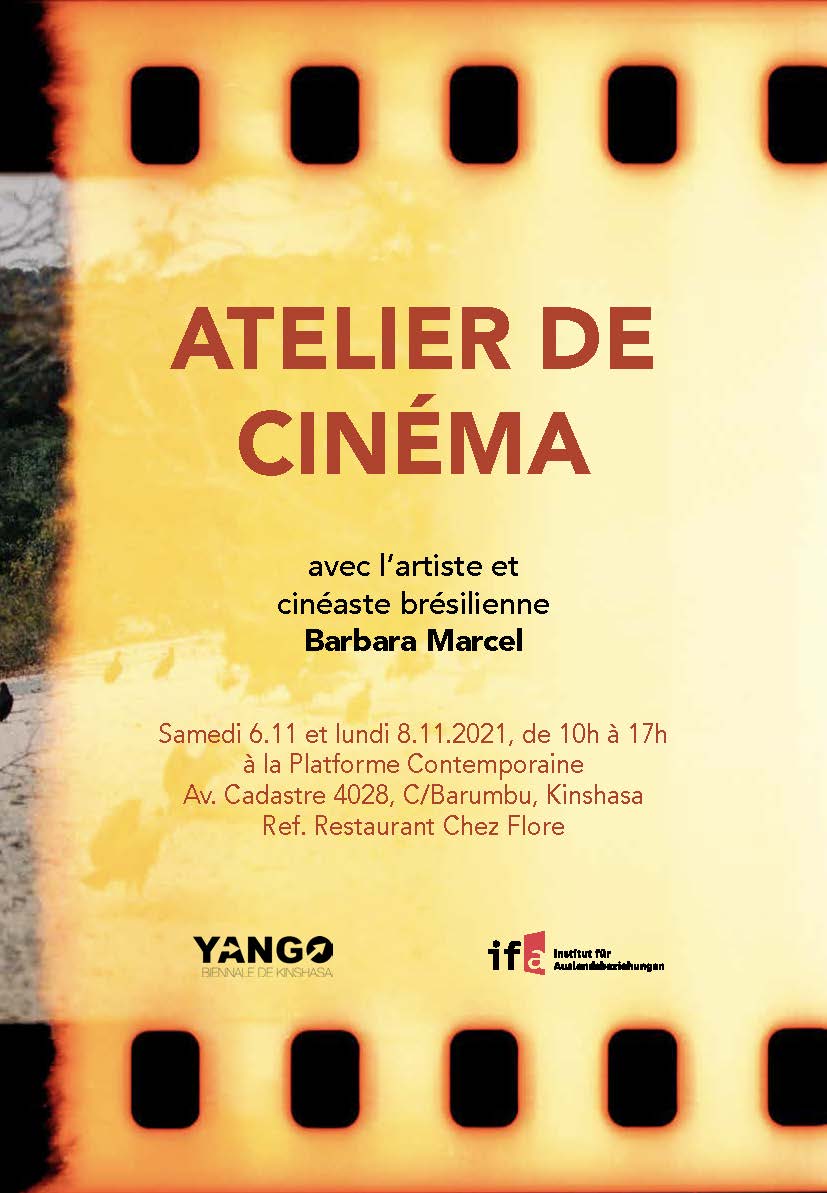
12 STEPS AND A HOLE IN THE VALLEY
2018, Clausthal-Zellerfeld, Harz. Walkshop in collaboration with Andreas Döpke.
2018, Clausthal-Zellerfeld, Harz. Walkshop in collaboration with Andreas Döpke.
We don’t need to see anything out of the ordinary, we already see so much. — Robert Walser, “A Little Walk”
What can you do with a hole in the valley? Where can you ramble when the earth no longer holds? Do the landscapes of non-cities and their seductive call to solitude remain compelling in times of urban disintegration? How can city-dwellers avoid the risks of escapism while attending to the real challenges of the rural-urban metabolic rift? Is there room to conceive of and create responsible and common futures that overcome the false dichotomies of nature-culture and rural-urban? What might be learned and unlearned in the augmented topographies of such ruined landscapes? How to wander over and under such unsteady ground?
This one-day walkshop, commissioned by the University of Hildesheim, is created by the artist Barbara Marcel, in collaboration with the geographer Andreas Döpke. It aims to bring together students of various disciplines, such as cultural studies, philosophy, geography and performing arts, in the historic, cultural landscape of the western Harz. Through a combination of collective and individual walking experiments, the world heritage region will be set up as a temporary and dynamic station for the collaborative imagining of past and future landscapes.
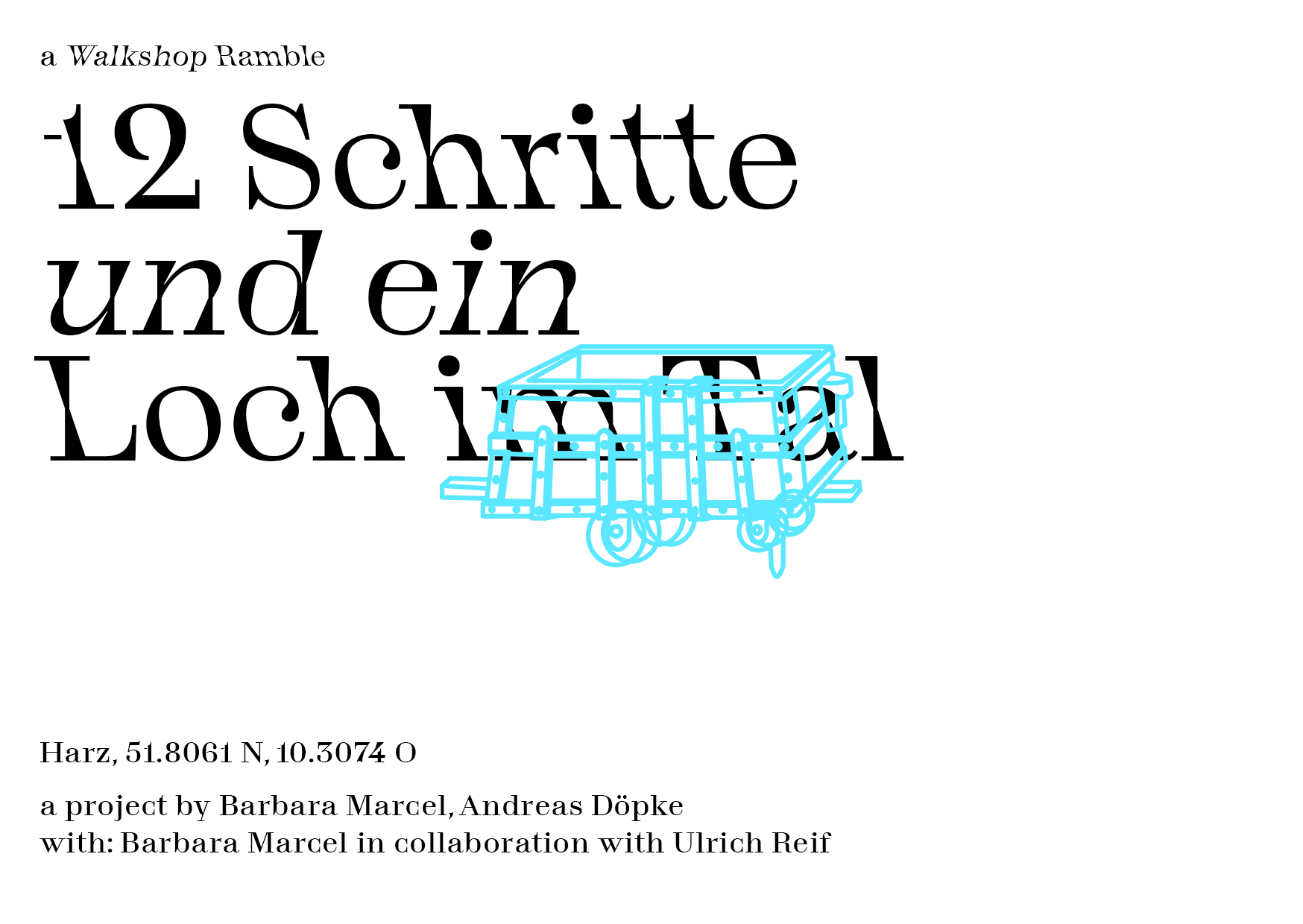


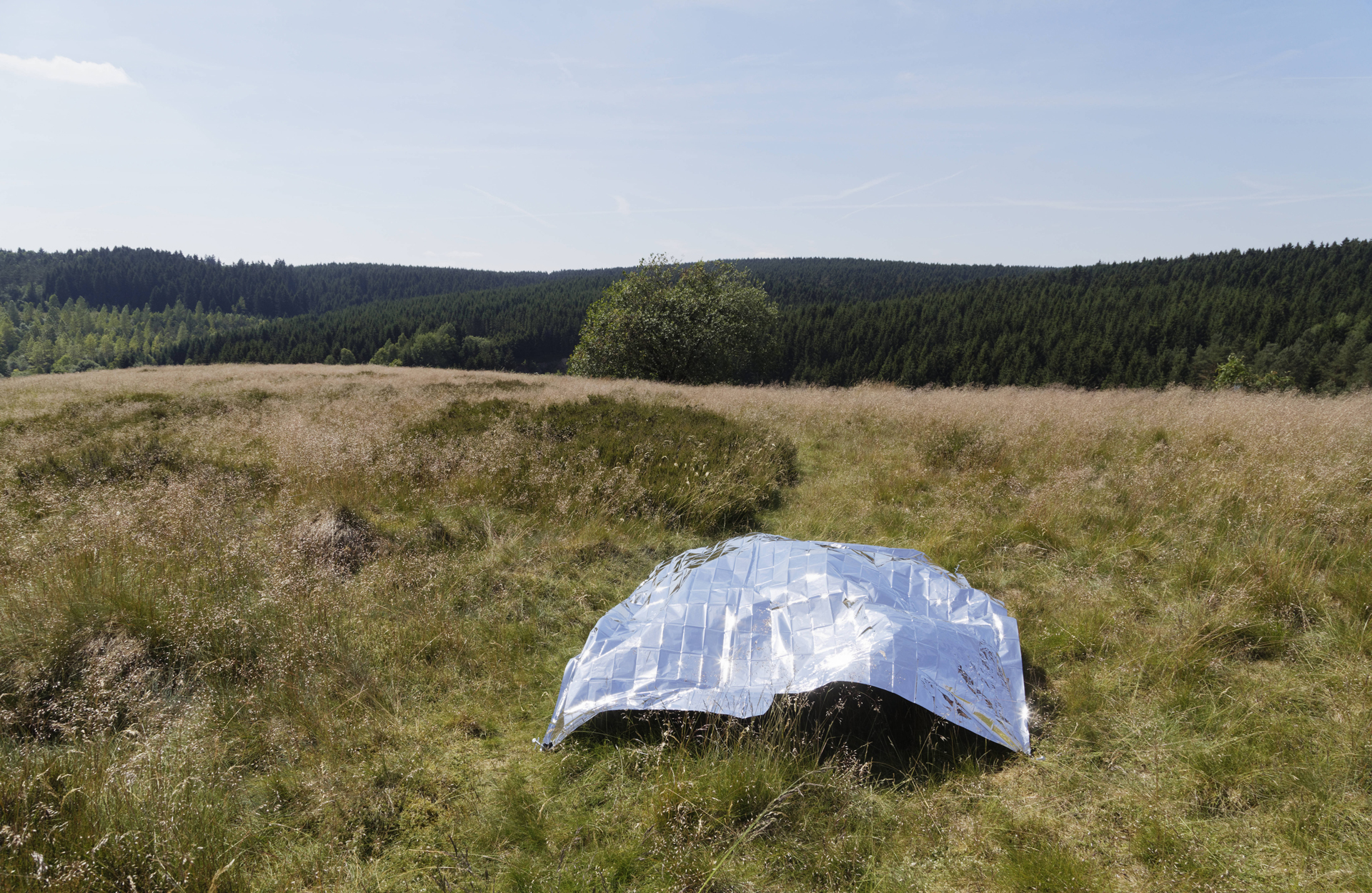
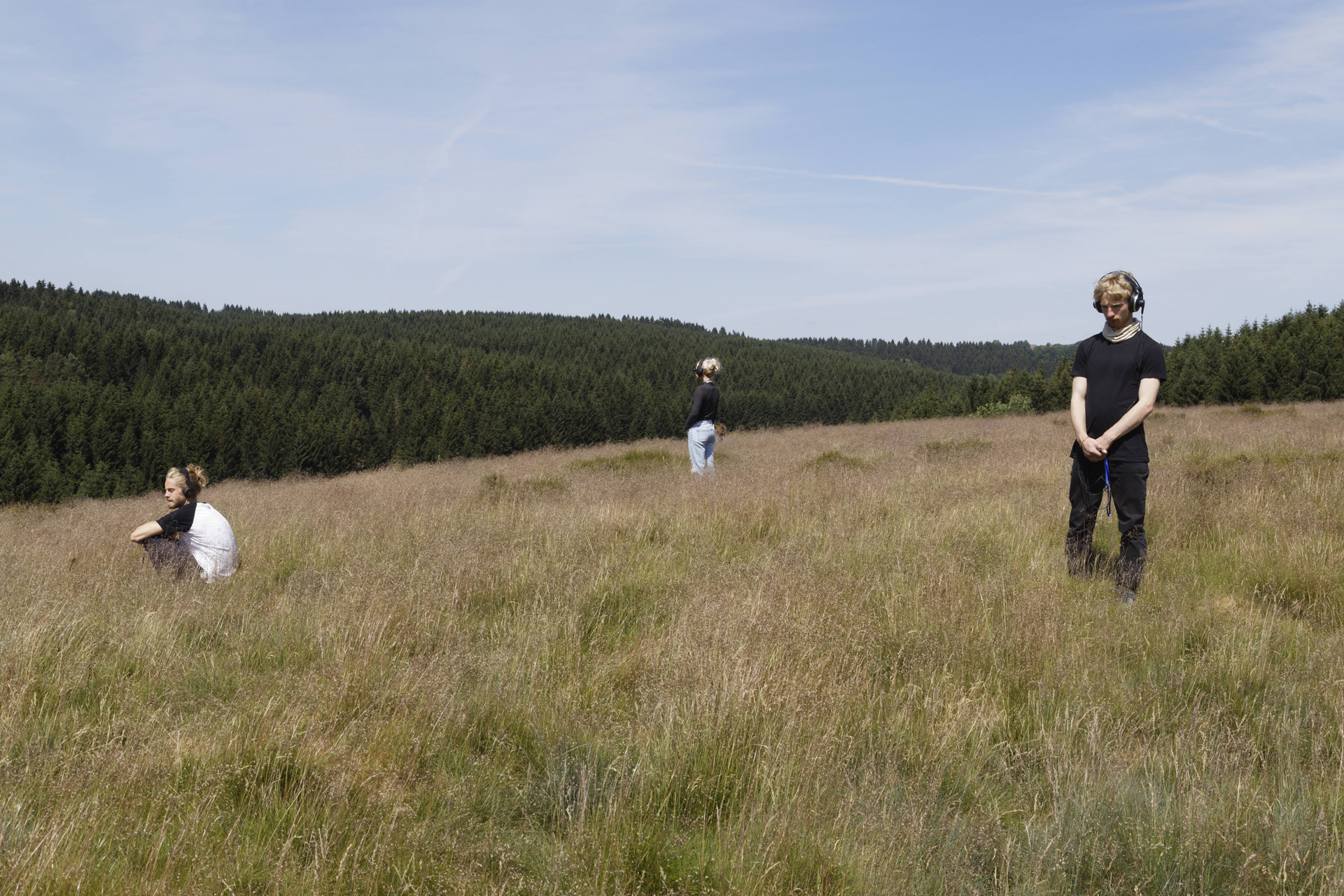





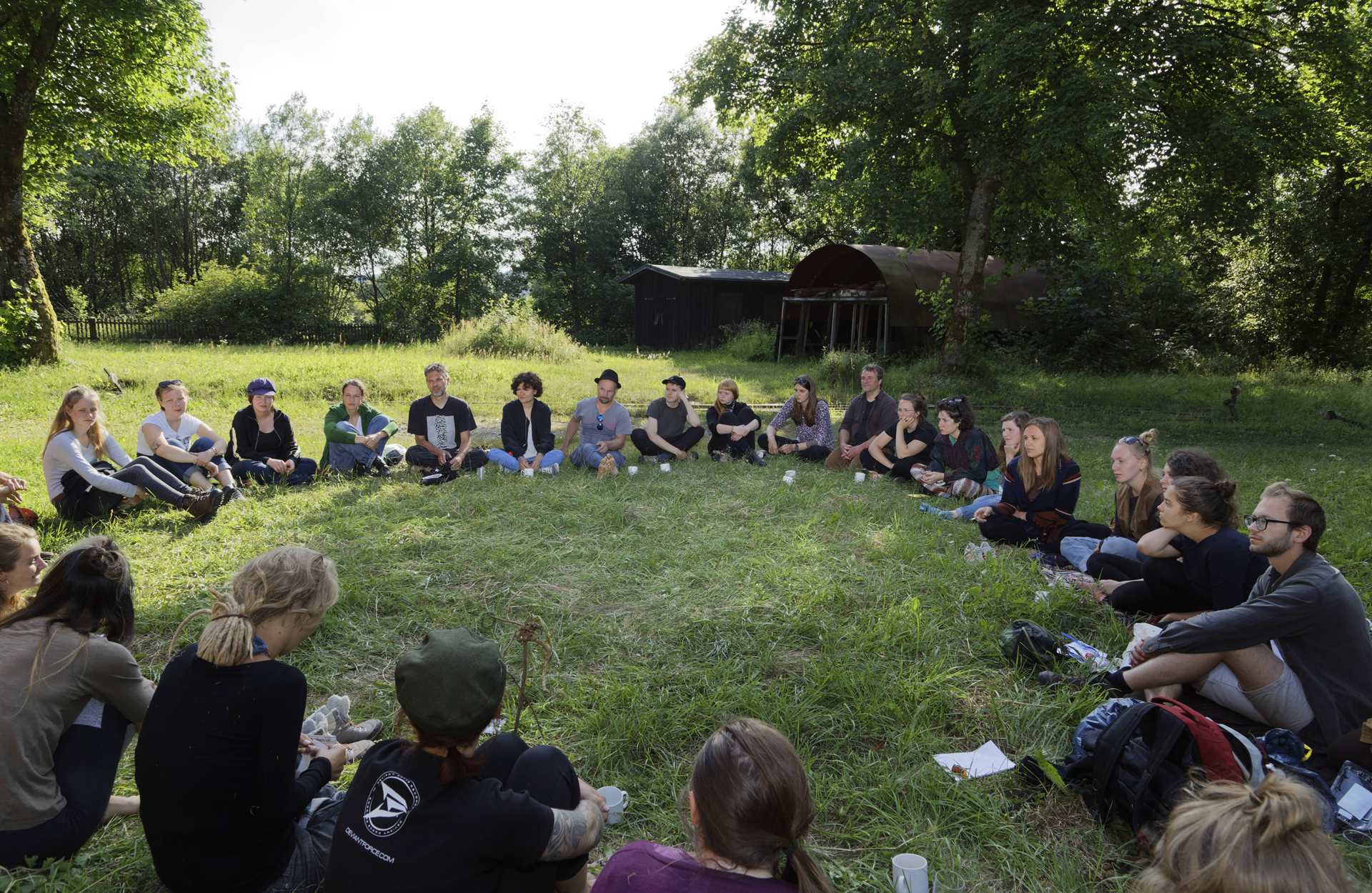

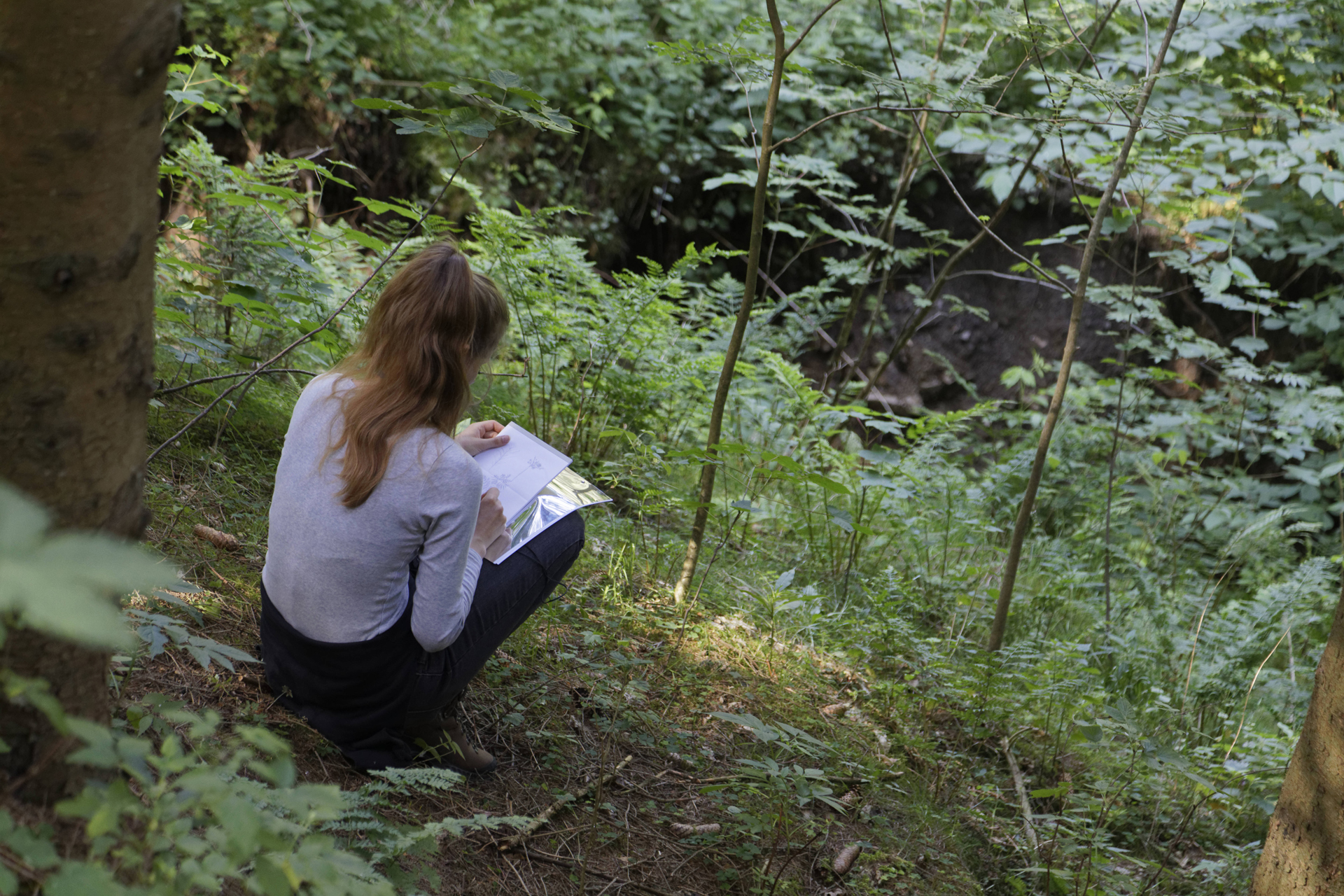


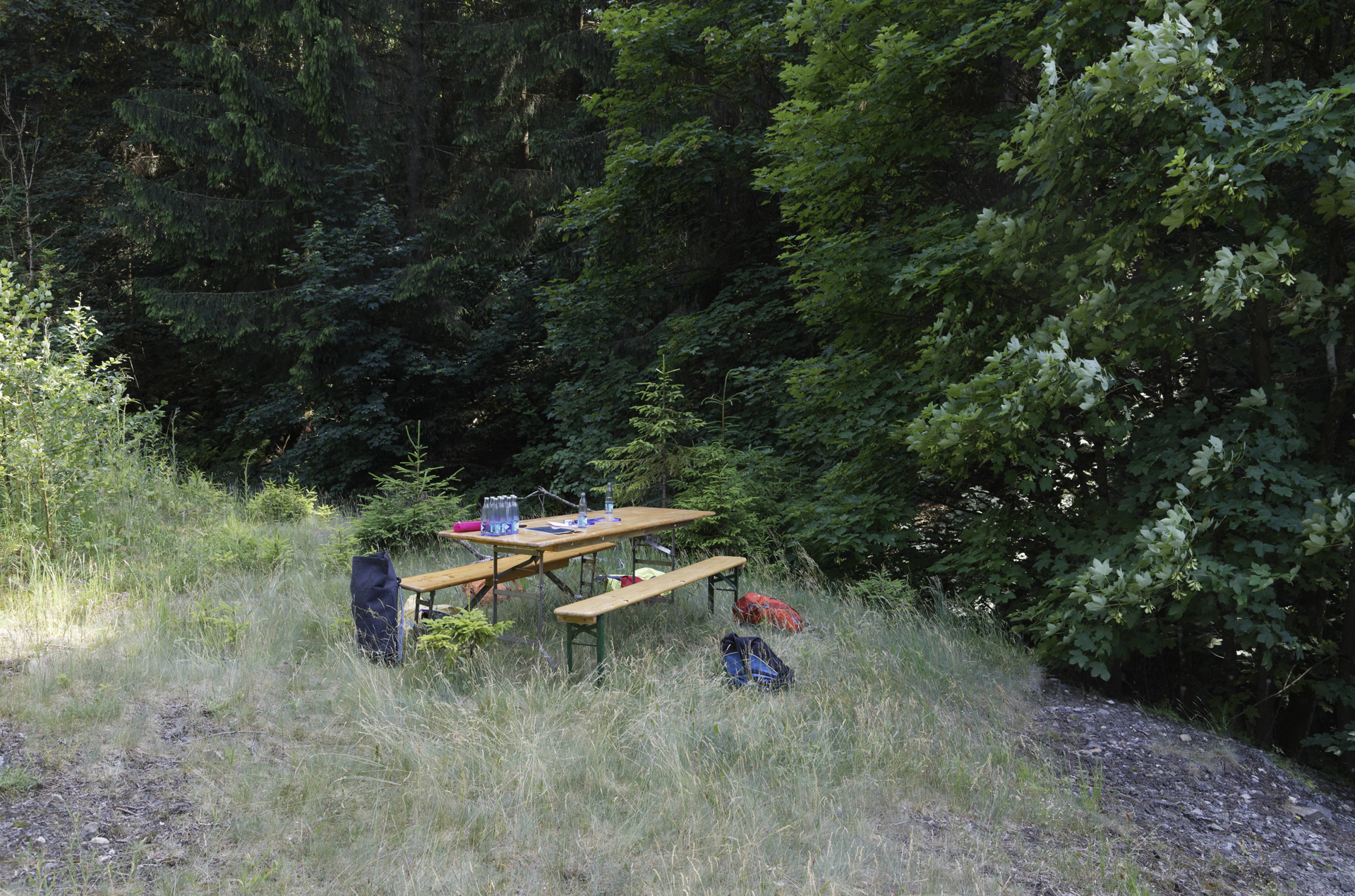
SITUATED KNOWLEDGES, GLOBAL ECOLOGIES
2-4.09.2019 at NGBK and Prinzessinnengarten Berlin.
2-4.09.2019 at NGBK and Prinzessinnengarten Berlin.
Situated knowledge / Global ecologies: a collaborative Walkshop Ramble was a three-day project on social-ecological justice, initiated by artist Barbara Marcel and journalist Camila Nóbrega, which took place between 2 and 4 September in the Prinzessinnengarten space in Berlin. The project brought together scientists and fellow scholars from the Heinrich-Böll Foundation with environmental activists, journalists and artists, for an experimental format of knowledge exchange. The main themes were guided by different understandings of what has been called ecology and the global dynamics of knowledge production and narratives about the territories, seeking decolonial and antipatriarchal views.
As a closing debate in collaboration with the project »Licht Luft Scheiße. Perspektiven auf Ökologie und Moderne«, the dialogue was open to the public, with the participation of the workshop participants, and the presence of the Brazilian urban farmer and researcher Sílvia Baptista, representative leader of the struggle for land rights in Brazil. The debate was mediated by Barbara Marcel and Camila Nóbrega, focusing on the ongoing narratives about social-environmental conflicts in Brazil and the situation of struggle of diverse social movements and forest peoples, not only for the right to land, but for the right to livelihoods, community practices and common imaginaries. From a local-global perspective and reflecting on what was produced throughout the Workshop, the aim was to discuss asymmetries related to land rights and, simultaneously, to the production of discourses. The role of patriarchy and coloniality in organizing bodies and territories were in the core of the discussion.


WORLD OF ART: ART AND CLIMATE CHANGE
2022, Edited by Maja and Reuben Fowkes. Thames & Hudson.
2022, Edited by Maja and Reuben Fowkes. Thames & Hudson.
Across five chapters, curators Maja and Reuben Fowkes examine artworks that respond to the Anthropocene and its detrimental impact on our world, from scenes of nature decimated by ongoing extinction events and landscapes turned to waste by extraction, to art from marginalized communities most affected by the injustice of climate change. What guides the artists gathered together here is an ardent concern for the living, breathing subject of the Earth and all fellow terrestrials caught up in this fast-moving climate drama.
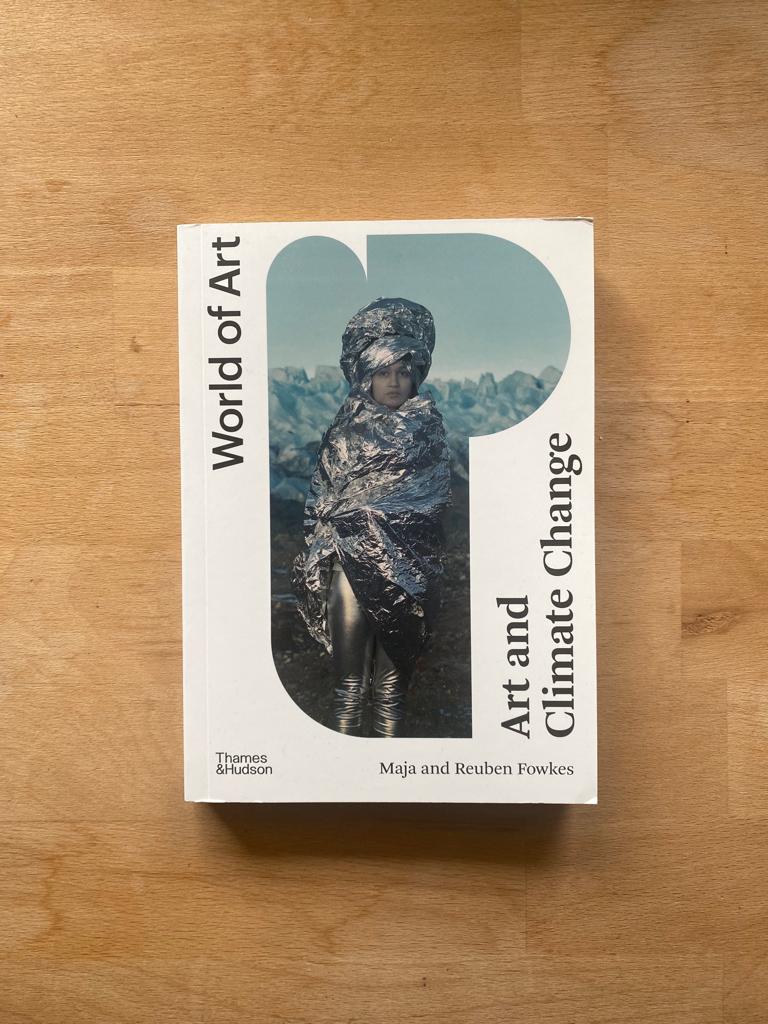
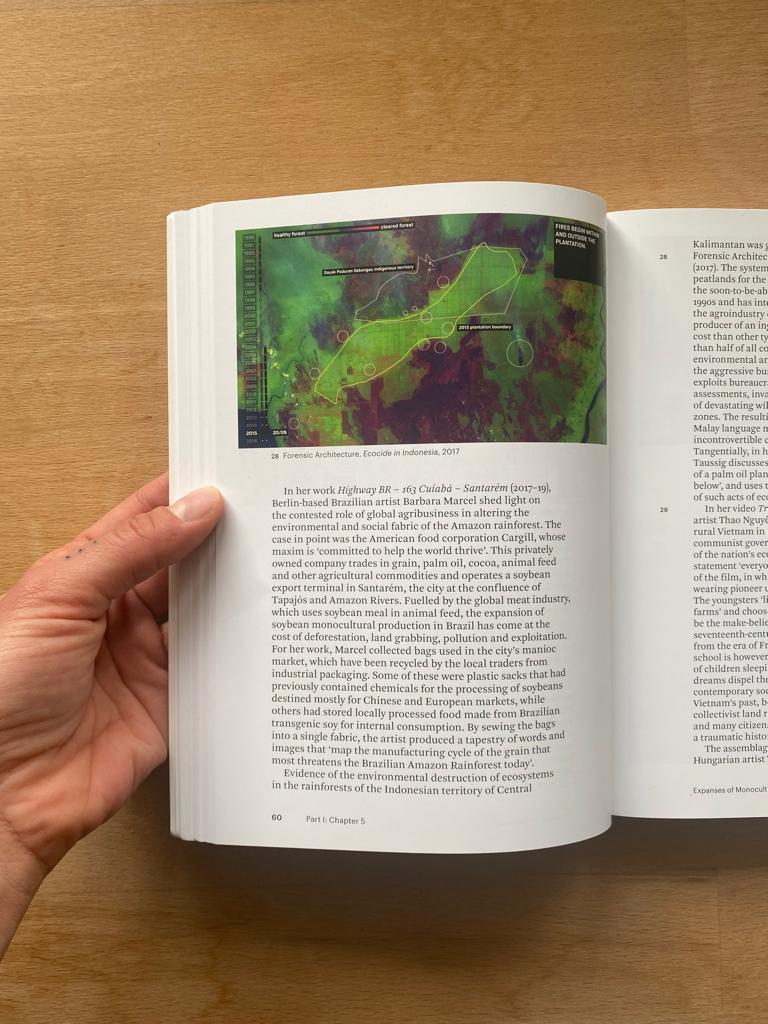
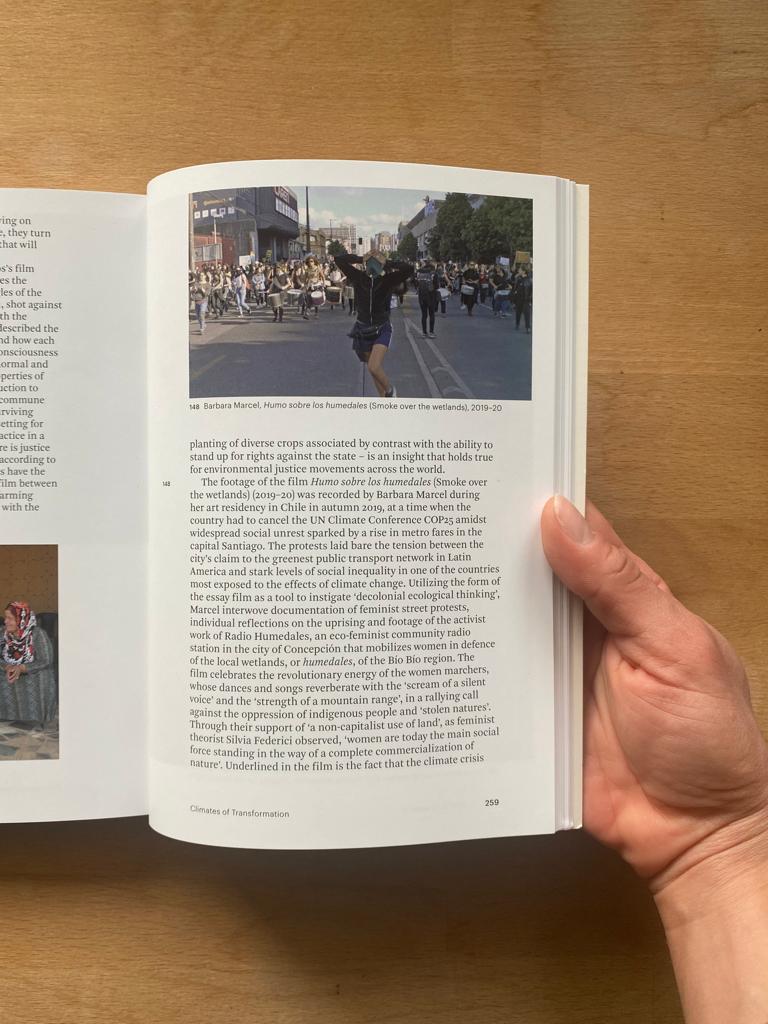
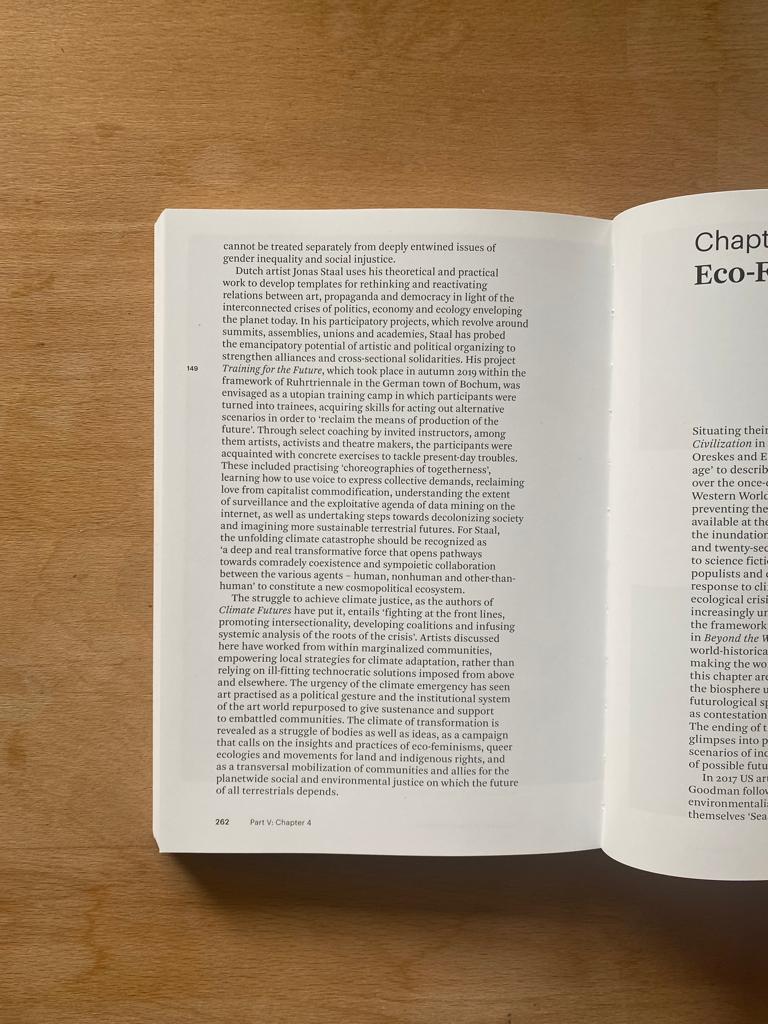

CHILE INTERNATIONAL II
2022. With contributions by: Colectivo Caput, Gonzalo Castro Colimil, Daniela Catrileo, Chawak, Elicura Chihuailaf, Mariairis Flores / Diego Parra, Valeria Fahrenkrog, Constanza Hermosilla, Barbara Marcel, Eva-Christina Meier, Galería Metropolitana, Dani Negri, Claudia Pacheco Araoz, Leonardo Portus, Radio Humedales, Danny Reveco, Alejandra Rojas del Canto, Maristella Svampa. Edited by: Valeria Fahrenkrog, Eva-Christina Meier, Galería Metropolitana. Graphic design: Ernst und Mund, Leipzig. In cooperation with nGbK Verlag.
2022. With contributions by: Colectivo Caput, Gonzalo Castro Colimil, Daniela Catrileo, Chawak, Elicura Chihuailaf, Mariairis Flores / Diego Parra, Valeria Fahrenkrog, Constanza Hermosilla, Barbara Marcel, Eva-Christina Meier, Galería Metropolitana, Dani Negri, Claudia Pacheco Araoz, Leonardo Portus, Radio Humedales, Danny Reveco, Alejandra Rojas del Canto, Maristella Svampa. Edited by: Valeria Fahrenkrog, Eva-Christina Meier, Galería Metropolitana. Graphic design: Ernst und Mund, Leipzig. In cooperation with nGbK Verlag.
Through massive protests, Chilean civil society succeeded in 2019 in initiating a comprehensive transformation process in the country. Since then, protagonists from the arts and culture have taken an active role in the social discourse on social participation, feminism and climate justice. „Chile International II“ presents artistic positions, collective practices, and current debates from different regions of the South American country. The bilingual volume expands on these with positions from Argentina, Bolivia and Brazil.
Link to the book.
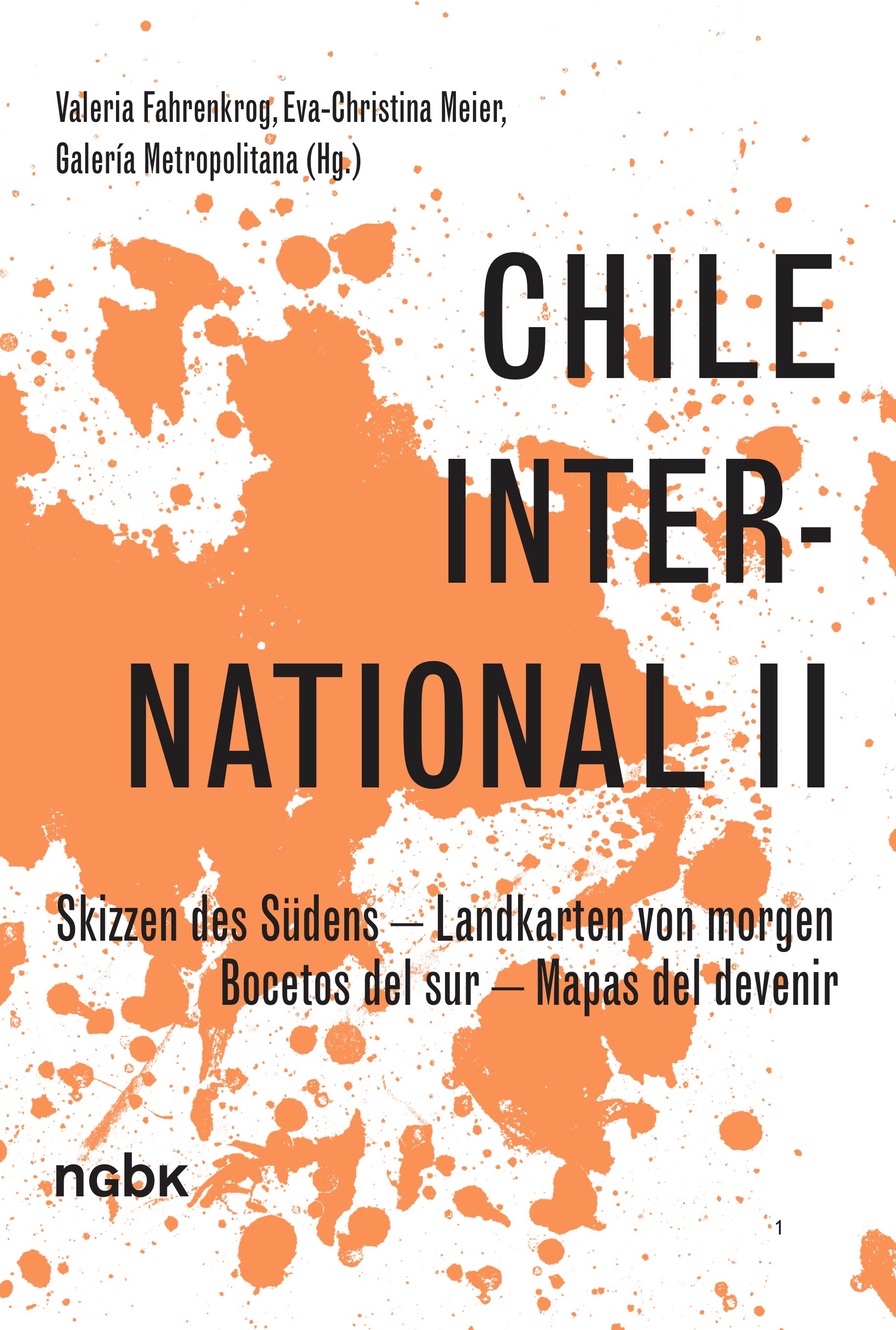
DESILHA 3
2021. Book organized by Michelle Sommer and Lívia Flores with the participation of Aline Besouro, André Leal, Barbara Marcel, Andreas Doepke and Tom Nóbrega, Cecilia Cavalieri, Denilson Baniwa, Diambe da Silva, Flora Dias, Ismar Tirelli Neto, Juliana Fausto, Luiza Baldan, Mabe Bethônico, Mayra Martins Redin, Micaela Cyrino, Raquel Versieux and Sandra Benites
2021. Book organized by Michelle Sommer and Lívia Flores with the participation of Aline Besouro, André Leal, Barbara Marcel, Andreas Doepke and Tom Nóbrega, Cecilia Cavalieri, Denilson Baniwa, Diambe da Silva, Flora Dias, Ismar Tirelli Neto, Juliana Fausto, Luiza Baldan, Mabe Bethônico, Mayra Martins Redin, Micaela Cyrino, Raquel Versieux and Sandra Benites
Rocks are inert elements produced deep in the earth's crust, a product of the deep time of geology. When they emerge, they are transformed by human action and converted into the materials that are the basis of our society. How can we access the stories that are deposited in the mineral layers on which we walk every day? How can we tell the stories inscribed in the stones, in certain places, in the paths we trace? These are some of the themes and questions that guided the presentations by Mabe Bethônico, Claudia M. Plens, Flora Dias, Barbara Marcel and Tom Nóbrega at the 3rd Seminar on art and city research_DESILHA 2021: MINERAL LANDSCAPES, revising and displacing these mineral landscapes in different ways, making visible the subterranean layers that compose the present. Now, the essay “canário azul: 5 fragmentos” (blue canary: 5 fragments), by Barbara Marcel, Andreas Doepke and Tom Nóbrega is part of the publication resulting from the seminar.
Link to the book.

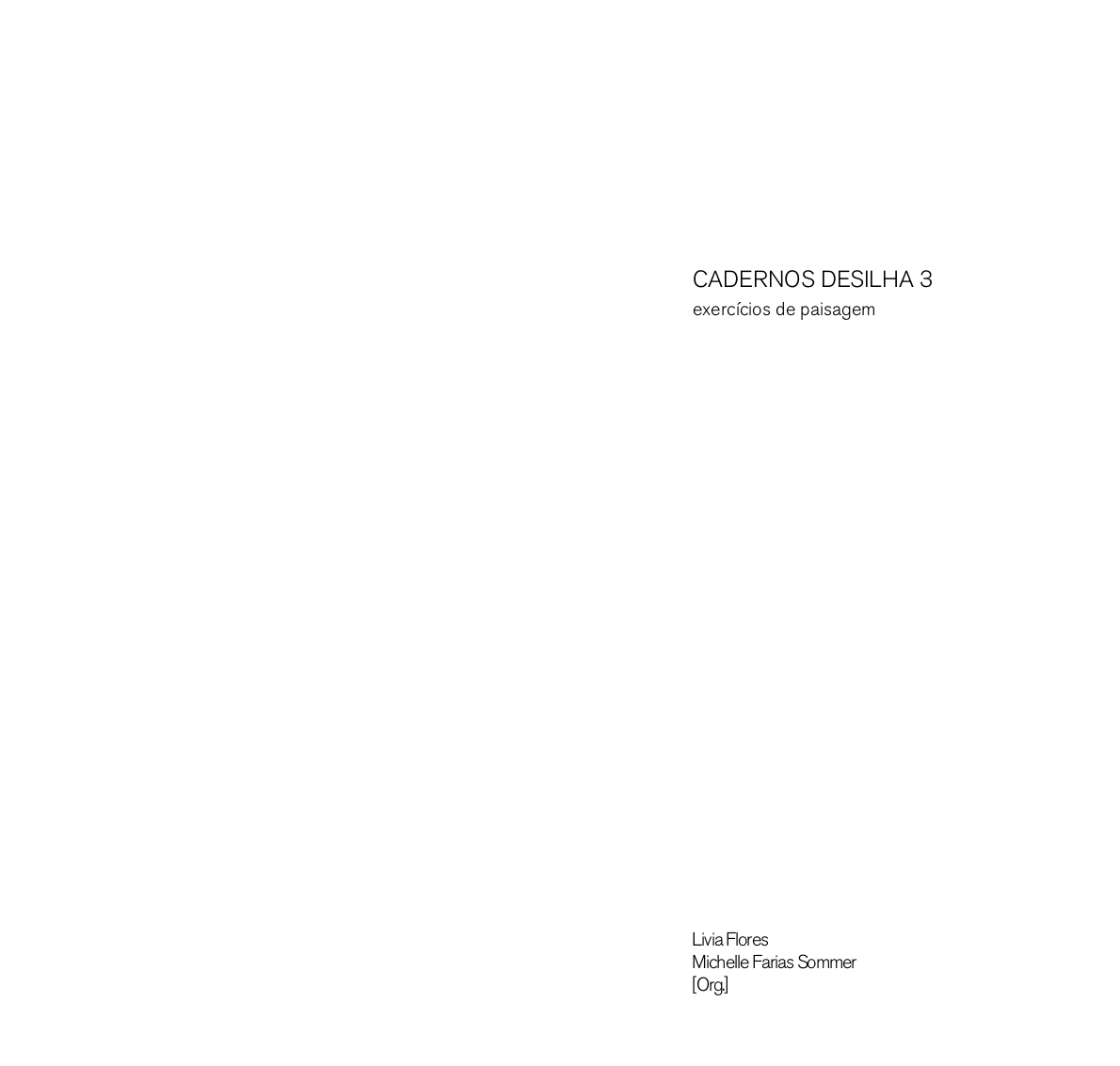
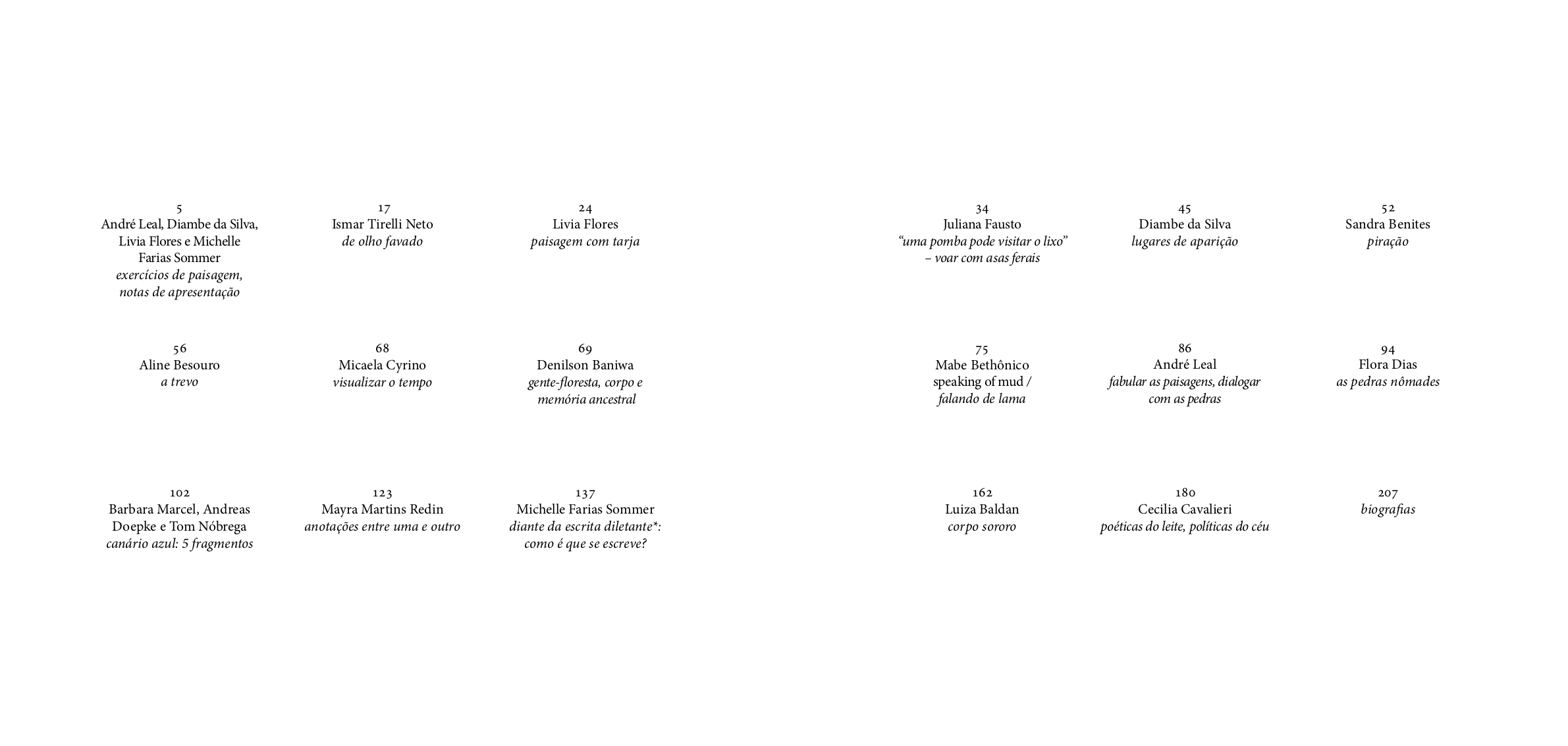
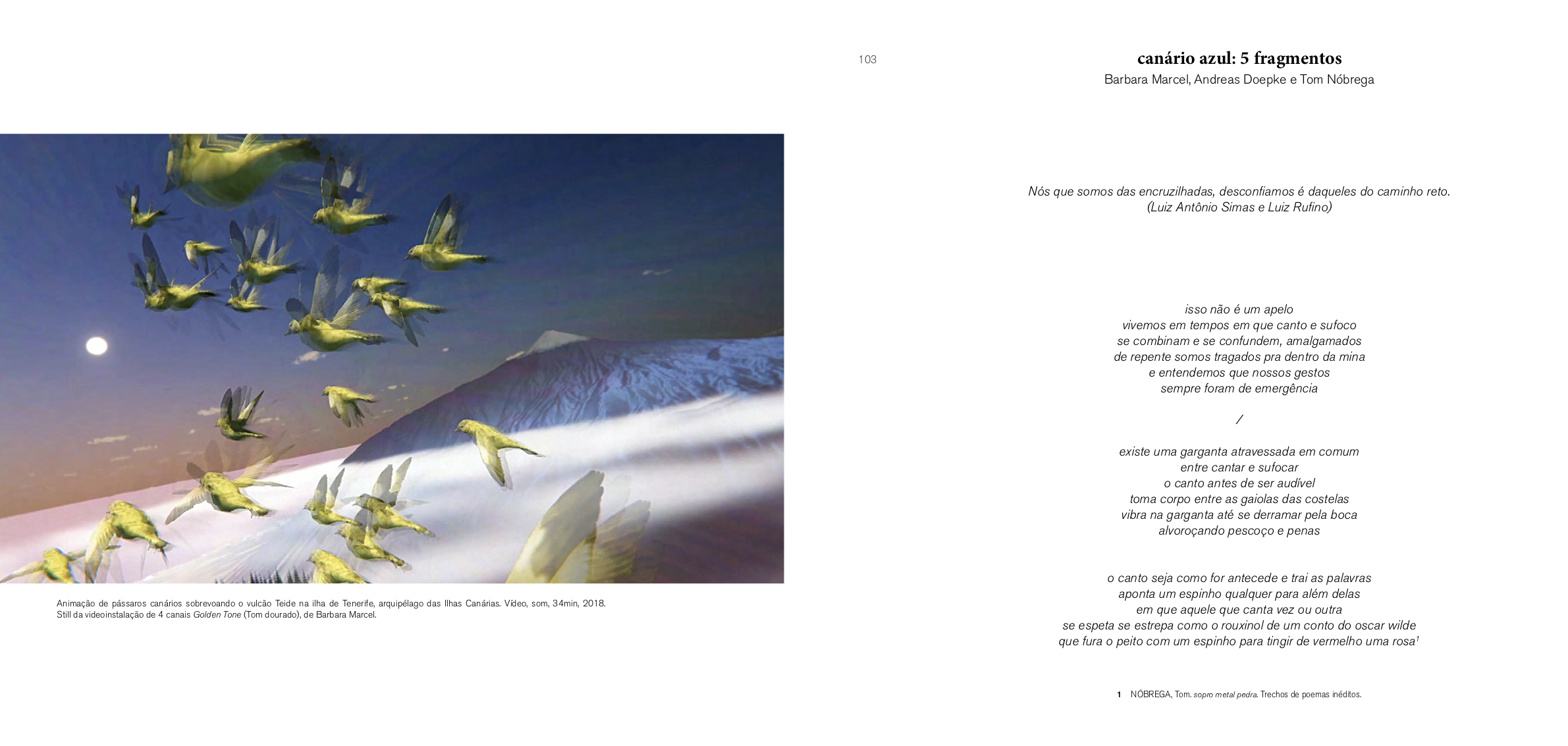

BLUE CANARY
2021, Berlin / Clausthal-Zellerfeld, Harz. Original essayistic text written in collaboration with the geographer Andreas Döpke, published in the book THESE BIRDS OF TEMPTATION, as part of the series intercalations 6, co-published by K. Verlag and the Haus der Kulturen der Welt, Berlin.
2021, Berlin / Clausthal-Zellerfeld, Harz. Original essayistic text written in collaboration with the geographer Andreas Döpke, published in the book THESE BIRDS OF TEMPTATION, as part of the series intercalations 6, co-published by K. Verlag and the Haus der Kulturen der Welt, Berlin.
The project GOLDEN TONE comes from a research on the historical, cultural landscape of the western Harz Mountain region of Germany, where many of the mining technologies of mineral soil extraction were first developed and then exported to the whole world. The essay reflects on the intersections of past, present and future of this anthropogenic landscape, through the particular history of breeding, training and trading of Canary birds in the region.
"...a queer refrain, populated with both acoustical lines of flight and the sorrows of captivity, wherein the reader-as-exhibition-viewer learns that the minor science of ornithology is as preoccupied with the flirtations and allopreening of avifauna as it is with their taxonomical domination."
THESE BIRDS OF TEMPTATION. With contributions by Ari Bayuaji, Bik Van der Pol, David Bonter, Bertolt Brecht, Lêna Bùi, Mark Dion, Andreas Döpke & Barbara Marcel, Anne Geene & Arjan de Nooy, Sophia Gräfe, Mary Ellen Hannibal, Lisa Hirmer, Nina Katchadourian, Anna-Katharina Laboissiere, Anaïs Nin, Megan Shaw Prelinger, Bruno Schulz, Anna-Sophie Springer, Frank Steinheimer, Anna Tsing, Etienne Turpin, and others.
Click here for more info on the book THESE BIRDS OF TEMPTATION

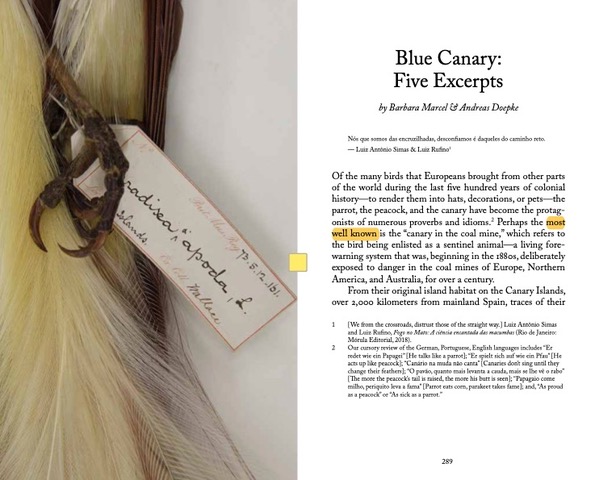
Click here for more information on the project GOLDEN TONE.
The video installation has recently been part of the exhibition Birds & Buoys at Bärenzwinger Berlin, between April and June 2021.
Click here for more information on the exhibition BIRDS & BUOYS.
THE ENDOTIC READER N.1
2019, Reader with contributions by participants hosted at TIER - The Institute for Endotic Research. Contributors: Linda Zhang, Nelly Y. Pinkrah, Vanessa Gravenor, Bonaventure Soh Bejeng Ndikung, Repec Segroeg, Lorenzo Sandoval, Barbara Marcel, Biko Mandela Gray, John Holten, Louis Henderson, Pia Chakraverti-Wuerthwein, Benjamin Busch, Ayami Awazuhara.
2019, Reader with contributions by participants hosted at TIER - The Institute for Endotic Research. Contributors: Linda Zhang, Nelly Y. Pinkrah, Vanessa Gravenor, Bonaventure Soh Bejeng Ndikung, Repec Segroeg, Lorenzo Sandoval, Barbara Marcel, Biko Mandela Gray, John Holten, Louis Henderson, Pia Chakraverti-Wuerthwein, Benjamin Busch, Ayami Awazuhara.
The endotic is a subtle but powerful tool to generate a situated practice of an institution. It is subtle because it looks to the imperceptible of the everyday life, to the visible but hidden details of the space and gestures of bodies around us. It rescues the astonishment from the forgotten obvious, trapped by its naturalization. It is a powerful tool because it leads us to read and listen to our surroundings, always looking from unexplored stances. From this immanent display, the very local traces a priceless threshold from which to approach the complex global. In its well-known methodology, Oulipo—the group to which Georges Perec belonged—was a great pioneer of crossing knowledge fields in order to practice a critical fascination. They developed a system in which constraints were an efficient driving force, merging mathematics, literature and artistic positions. These constraints can be translated from writing to cultural practice to think about spatial design, funding or ways of cooperation, looking for more sustainable practices.
To celebrate TIER’s first year at Donaustrasse 84 in Berlin-Neukölln, we published the first reader on the topic of the endotic, The Endotic Reader N.1. It brings together contributions by some of the participants we hosted over the year, as well as people we look forward to inviting to the space. The contributions explore some of the paths that the Perecquian word offers, as a way of approaching the territory of complexity that we live in and through. The topics explored in the reader range from a meditation on the practice of dis-othering to a reflection on trauma and on to thoughts on the future of reading.
This celebratory reader, available digitally as well as in the physical form of a limited, handmade print edition, is one of the first results of TIER’s collaboration with ON/OFF, whose Risograph machine, part of the Guerrilla Printing Press, we are hosting at the space.
Click here to read more on Barbara Marcel's contribuition: SEVEN CROSSROADS: A Berlin walkshop ramble
—> Download The Endotic Reader N.1


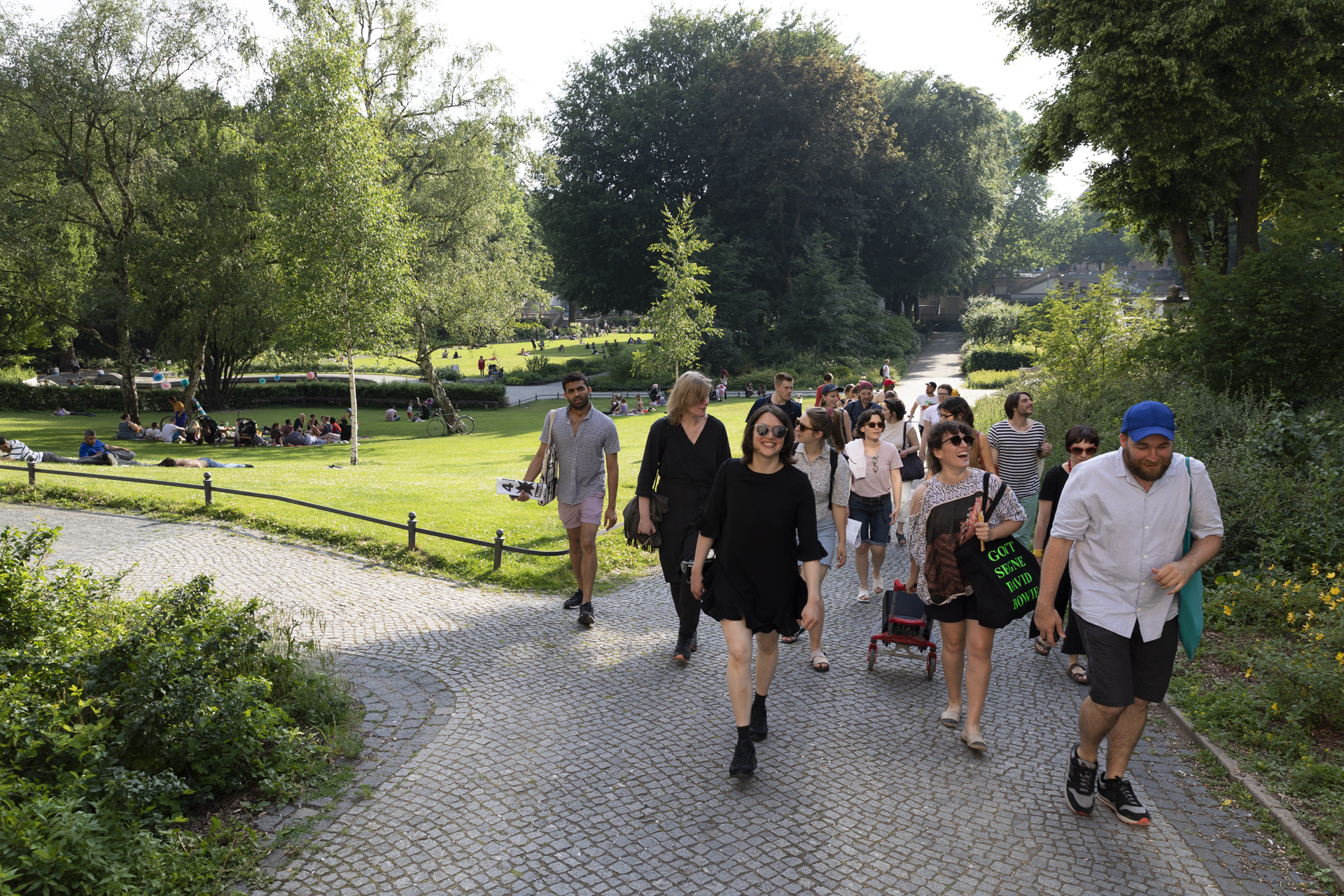
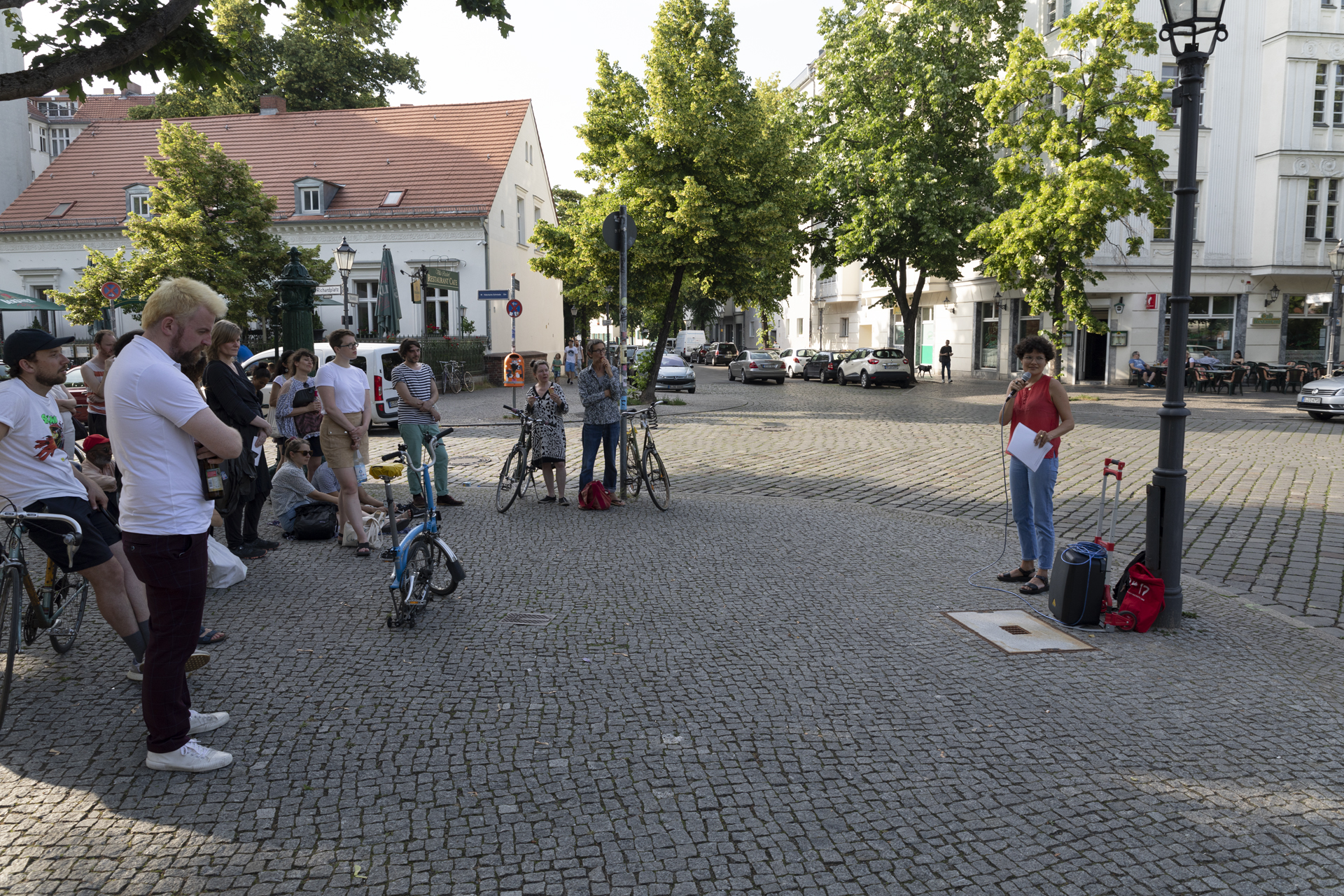
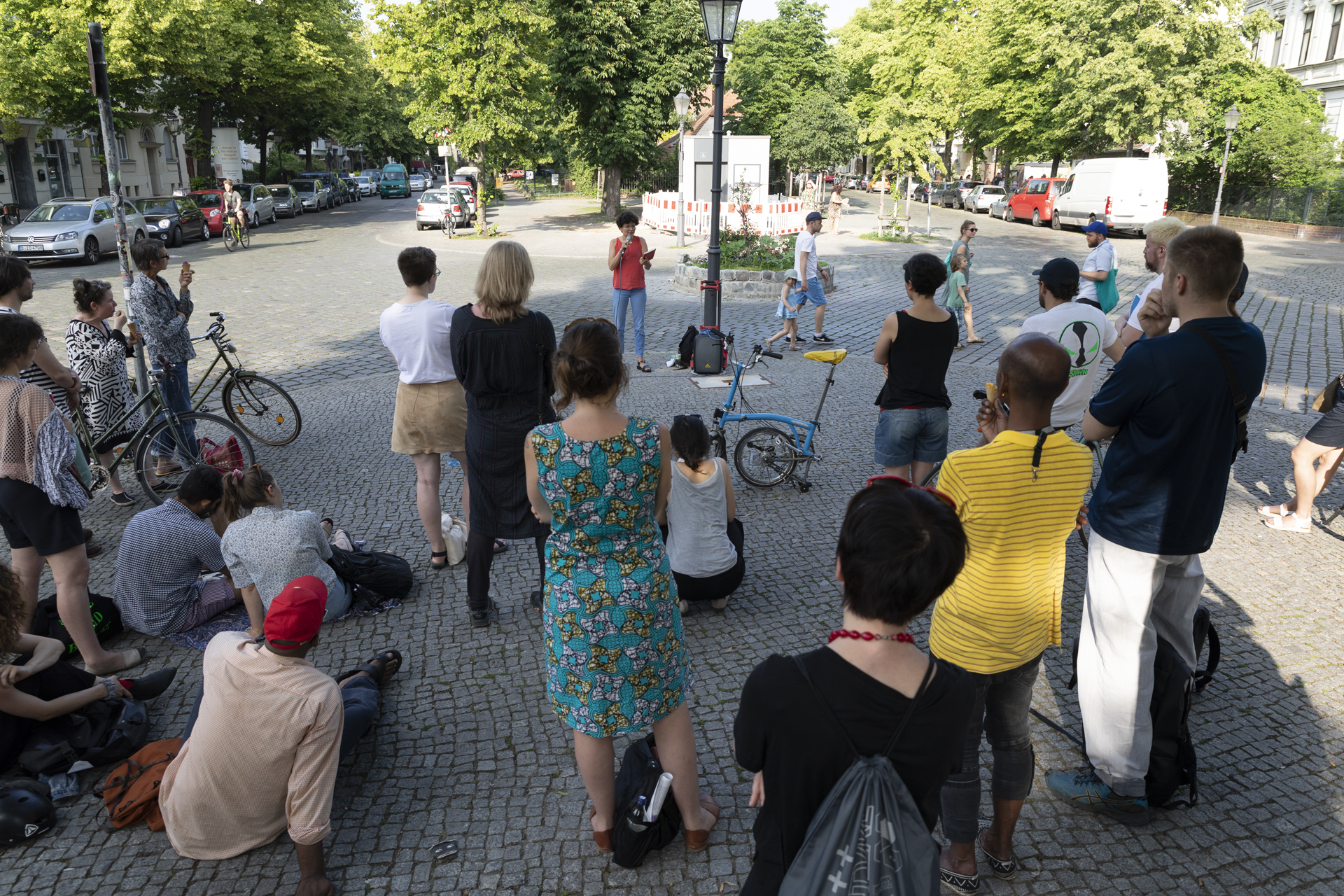

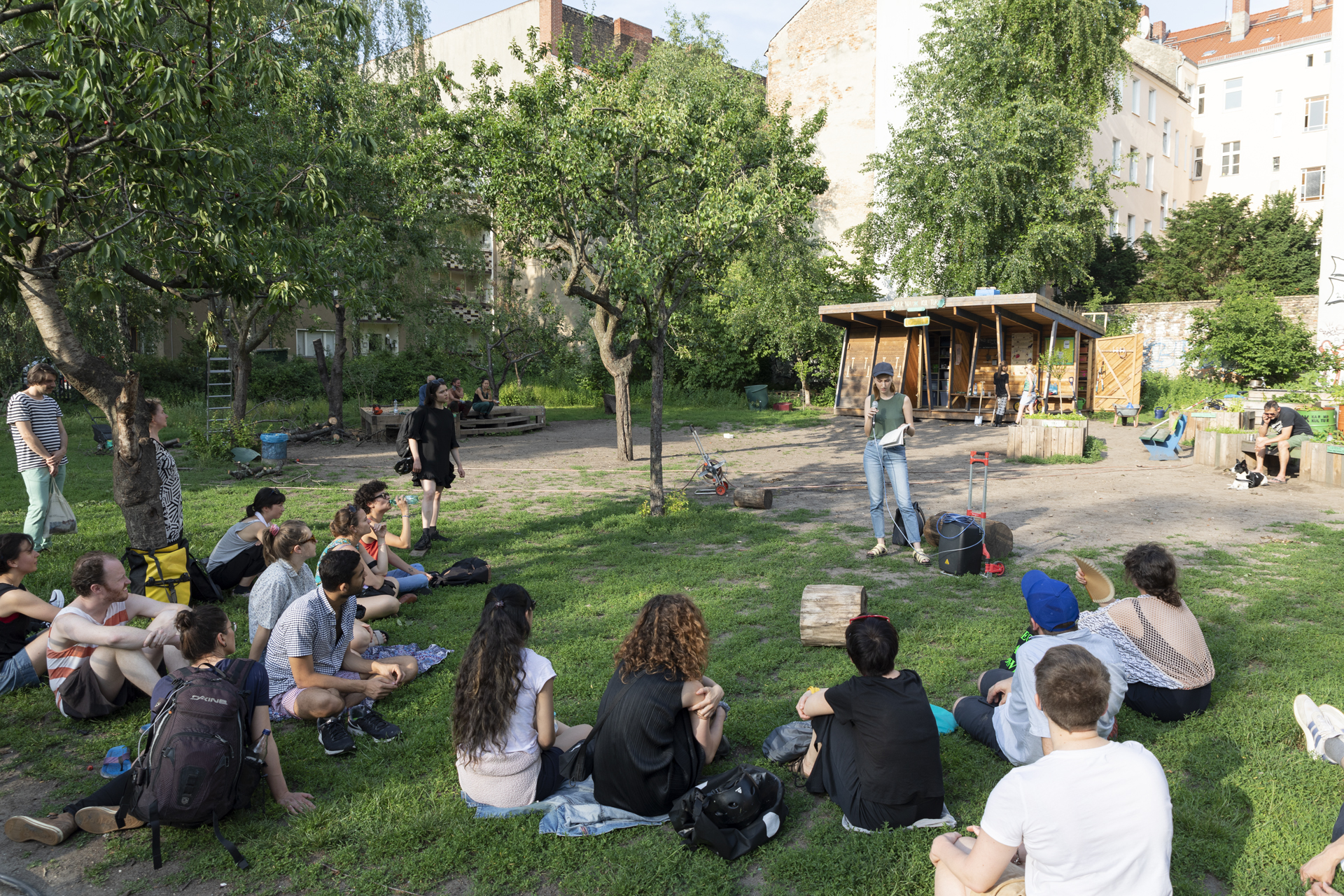

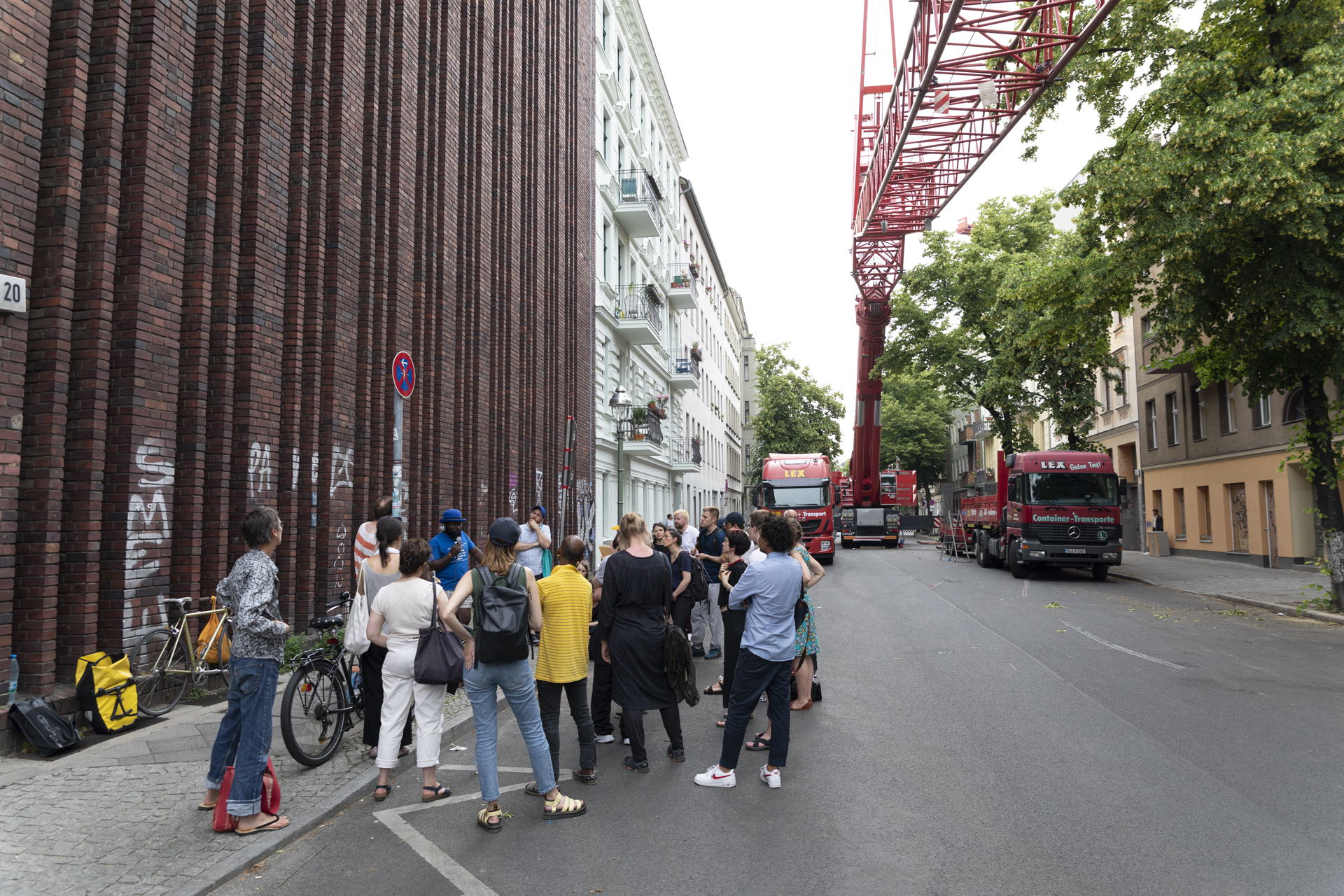

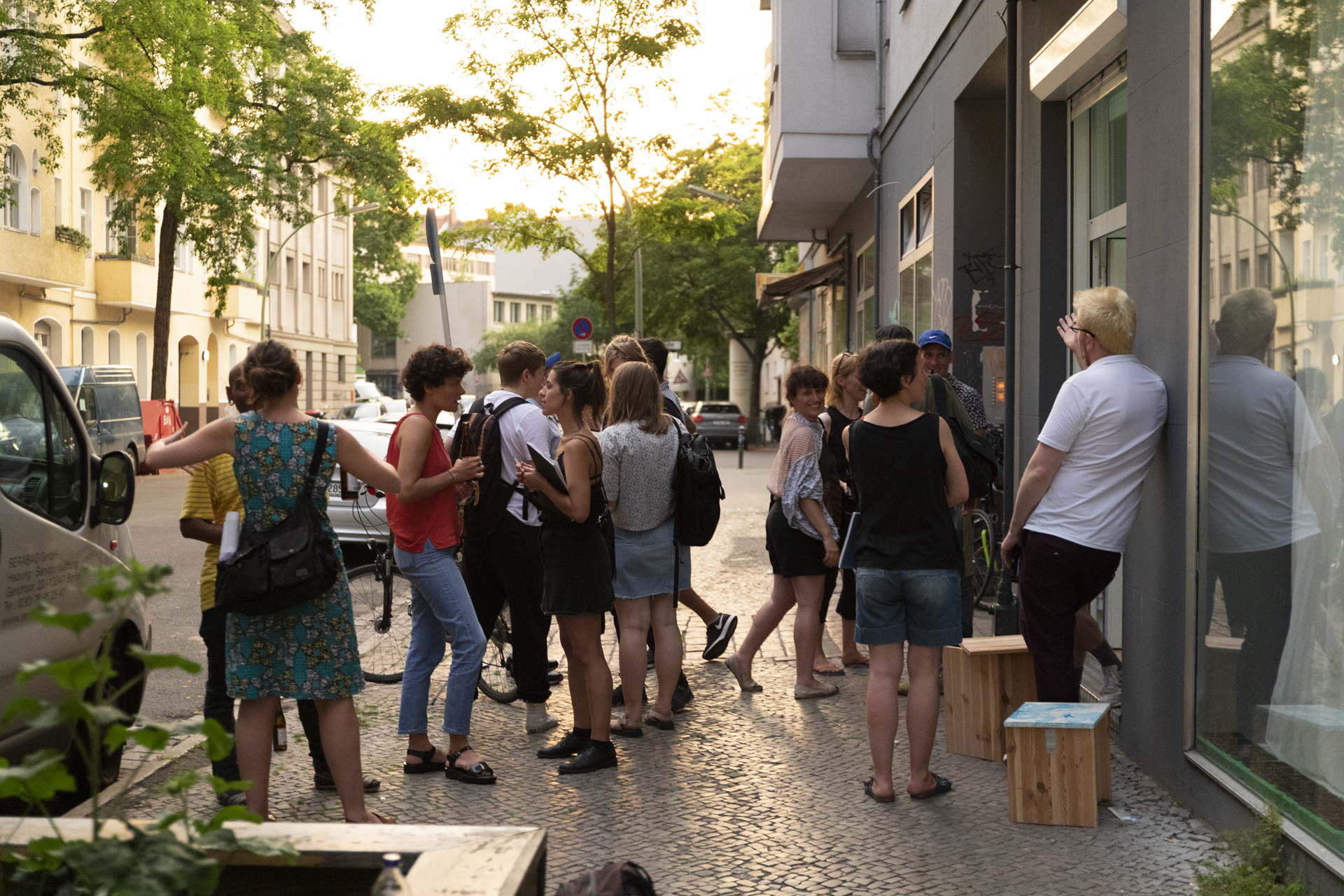
SENEGAMBIA BLEIBT
Video, one channel, Full HD, 2019.
Video, one channel, Full HD, 2019.
SENEGAMBIA BLEIBT is a collaborative video focused on the connections between Brazilian and West African cultures in Europe. Senegambia is a West African restaurant located on Reichenberger Straße (the same street as Gallery Mario Kreuzberg), where a lot of different African communities meet to eat food from their home countries. Pa Modou Jah, the owner of the restaurant, talks about his migration history to Germany which happened over thirty years ago, the gentrification affecting Kreuzberg today, and the role of the manioc in connecting South America, Africa and Europe. Departing from the manioc dishes, the video also connects the gallery space to the local neighbourhood.




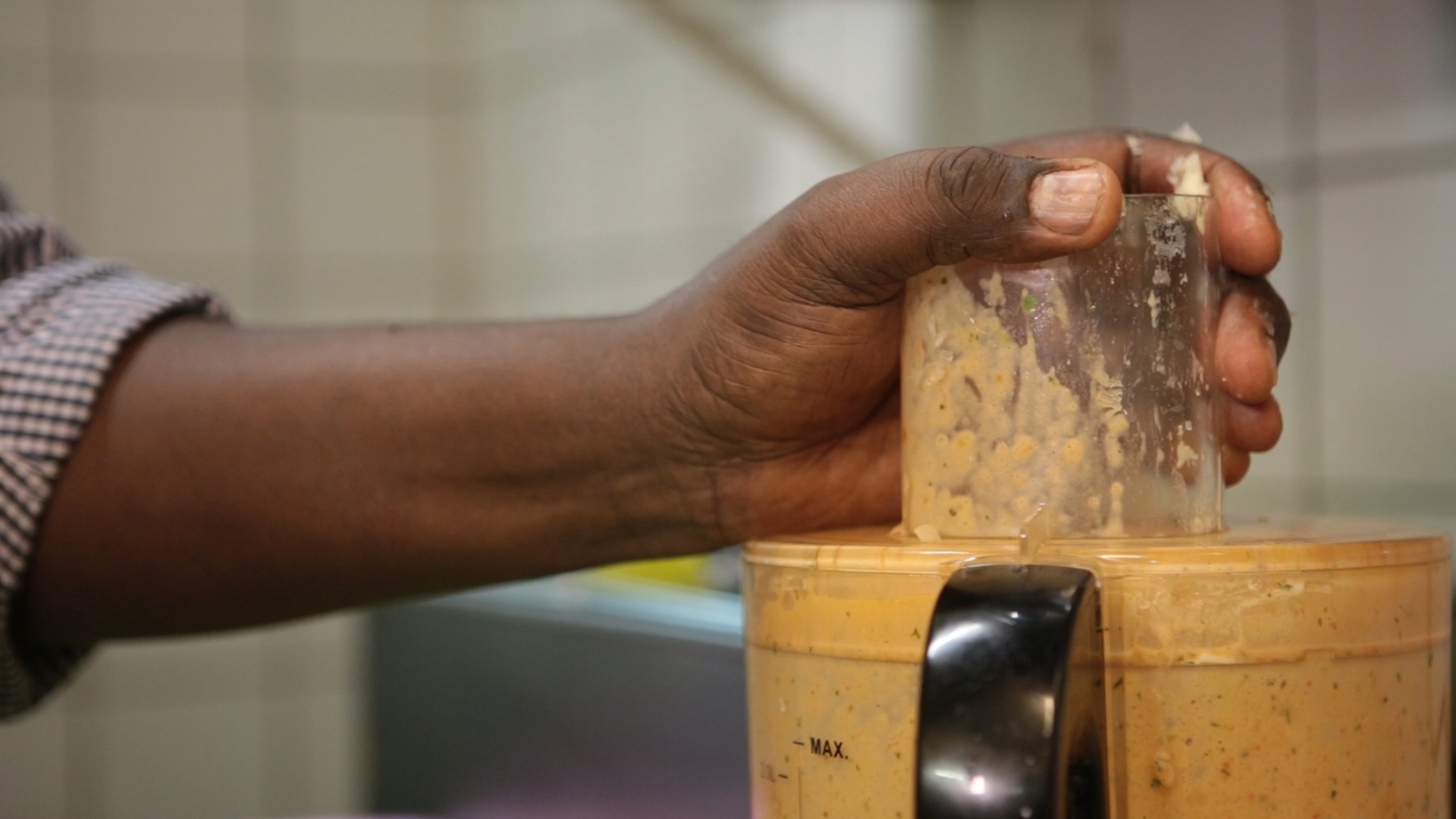
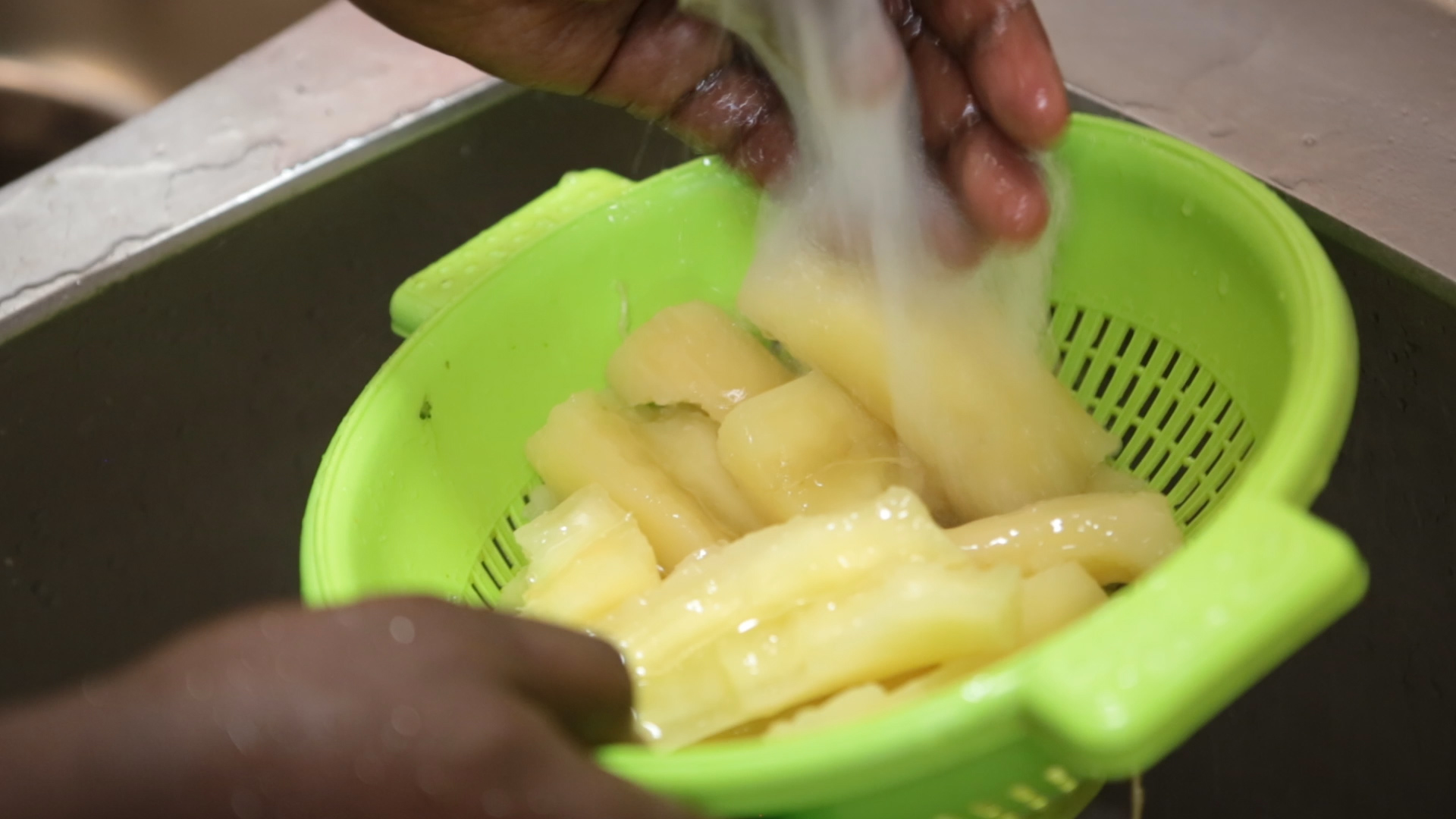
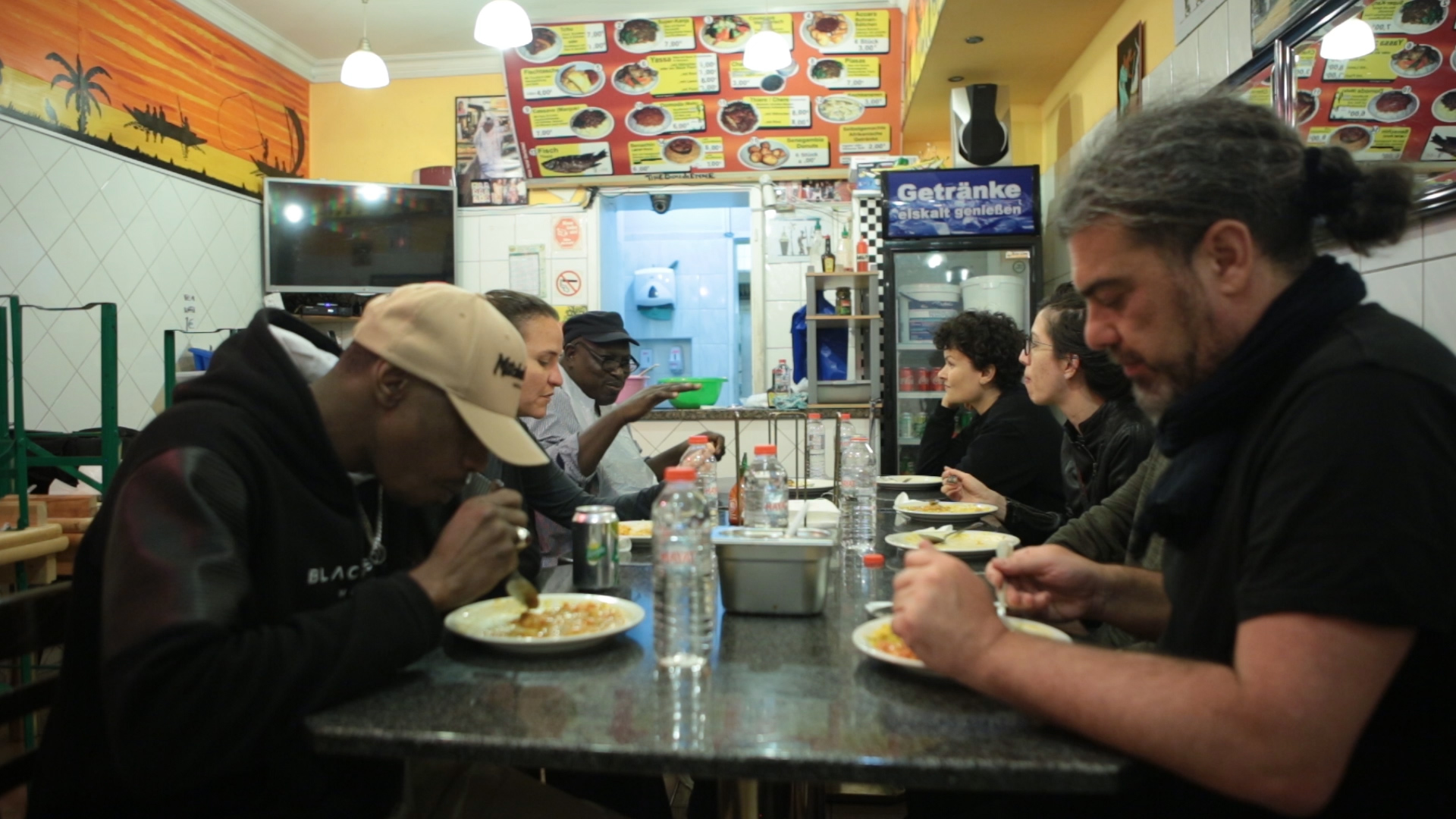
UNKNOWN UNIVERSITY
2017, Hérens Valley and Standard/Deluxe Gallery, Lausanne, Switzerland. Artistic residency and durational collective performance.
2017, Hérens Valley and Standard/Deluxe Gallery, Lausanne, Switzerland. Artistic residency and durational collective performance.
After 10 days of retreat in the Hérens Valley, Switzerland, the founders of the Unknown University occupied Standard/Deluxe the 25th and 26th of August 2017. The space was open from 1 to 10 pm without interruption. The program, unknown until it happened, was based on the following values:
- anonymity is a powerful tool
- the transformation of the individual body affects the social body
- studying is more important than producing
- intellectual property is a fiction
- to create is to study, to study is to play
- there are no divisions between teachers and students, these roles are always interchangeable
- vulnerability is a rewarding place
The Unknown University is a multilingual and interdisciplinary project of study, creation and individual and collective transformation. It takes its name from the idea of the Chilean poet Roberto Bolaño who affirmed that there existed in the formation of each writer an "unknown university guiding his steps and which, obviously, has no fixed place, it is a mobile university that is common to all ". The Universidad is a homeless research center that happens every time members summon it.
Curator: Valentina D'Avenia
Participants: Tom Nóbrega, João Meirelles, Jonas Van, Germano Dushá, Barbara Marcel, Mazyar Zarnadar, Léa Katharina Meier




THE HAIRY GODDESS MISSTORY
2017, Berlin. Collective project and performance by and with Érica Zíngano, Marion Breton, Barbara Marcel and Tom Nóbrega. Co-produced by and performed at Literaturhaus Lettrétage Berlin as a part of CON_TEXT event series, funded by the Senate Department for Culture and Europe.
2017, Berlin. Collective project and performance by and with Érica Zíngano, Marion Breton, Barbara Marcel and Tom Nóbrega. Co-produced by and performed at Literaturhaus Lettrétage Berlin as a part of CON_TEXT event series, funded by the Senate Department for Culture and Europe.
»The day before yesterday. We mourn. The XXI century died, but we keep preparing its funeral. Look at your hands, both hands. On the one hand you have the story of apocalypse. As any story about time, of course it will end in a big climax, bing bang, bow wow wow. Of course the main character of this adventure is God, standing on the shoulders of their army of encrypted angels. On the other hand, there is the flipped version of this story: this one we could call revolution. A revolution reincarnated as a hairy goddess. S/he’s everywhere, everywhere feels as near as nowhere. Immanent in our messy backpacks, roaring in our inner jungles. This version changes the speed of the trains and cars and airplanes through which we perceive the world. Choose a word and hit the road. Mystery. Chaos. Smoke. Animals. Magic. Light another match. This is an ongoing story. It comes in a box delivered by DHL. The sun is the third sign on the road. A long road. On the tip of your fingers.«
The project is a collective study around the revolutionary potential of death experience and the idea of overcoming it. Loosely based on Vladimir Mayakovsky’s ‘Mystery-Bouffe‘ and the futuristic opera ‘Victory over the Sun‘, the performance is a free adaptation of both from the queer and migrant perspectives, with cross-references to the Russian Cosmism, Brazilian tropicalism, radical feminism and queer theory.
Music and sound by Katrina Burch aka Yoneda Lemma.
With support by Sam Langer, Bruno Siegrist and Lotto Thiessen. Technical support: Jure Kapun.
Documentation Photos by Ferid A. Barak/Lettrétage.
Video Documentation:

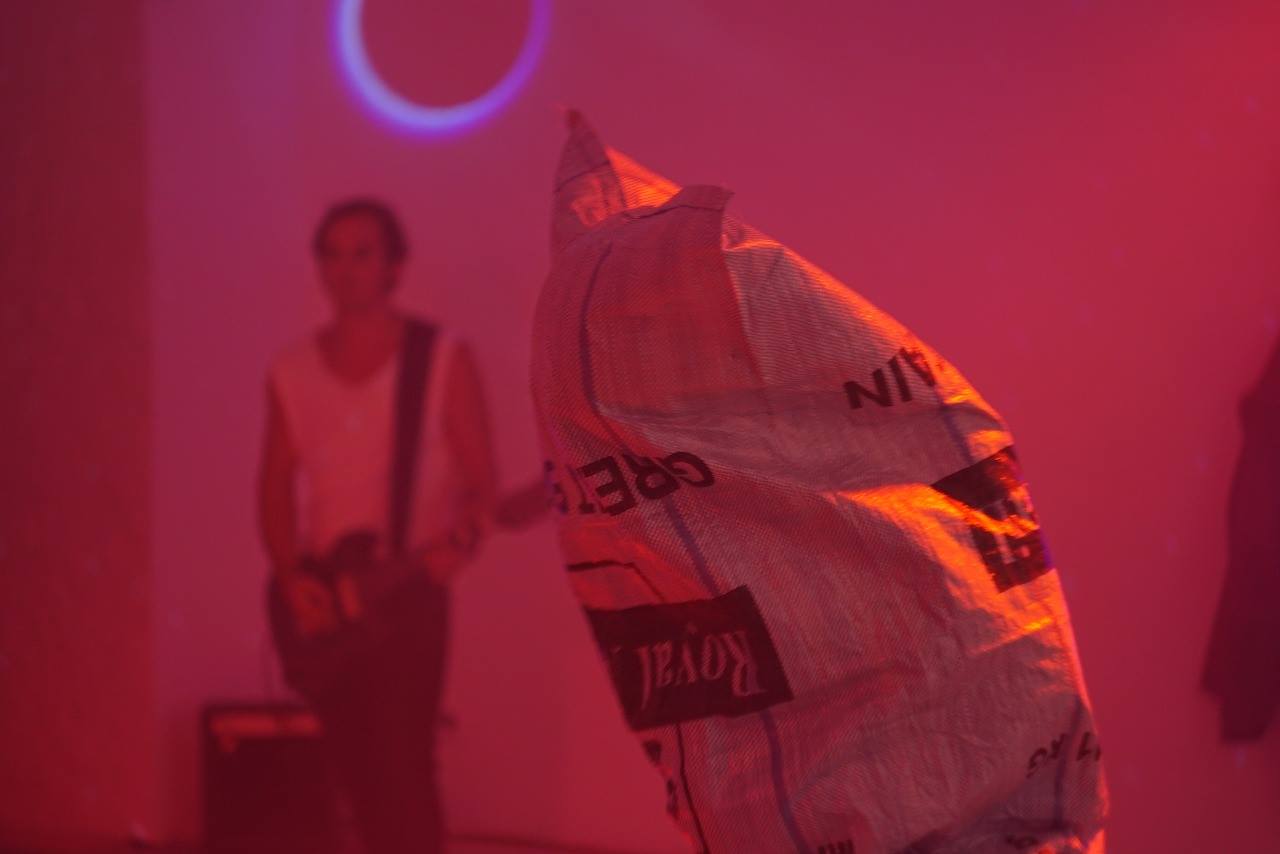

MYSTERY-BOUFFE ADAPTATION
2017, Montpon France. Collective project and performance by and with Érica Zíngano, Marion Breton, Barbara Marcel and Tom Nóbrega as part of the festival TROIS JOURS AU TUQUET during the summer of 2017. Based on Vladimir Maiakovski´s play „Mystery-Bouffe: A Heroic, Epic and Satiric Representation of our Era” (1918-21) and its adaptation from Jerzy Grotowski (1960).
2017, Montpon France. Collective project and performance by and with Érica Zíngano, Marion Breton, Barbara Marcel and Tom Nóbrega as part of the festival TROIS JOURS AU TUQUET during the summer of 2017. Based on Vladimir Maiakovski´s play „Mystery-Bouffe: A Heroic, Epic and Satiric Representation of our Era” (1918-21) and its adaptation from Jerzy Grotowski (1960).
As a socialist dramatic play written by the Russian avant-gardist artist Mayakovsky between 1918 and 1921, Mystery-Bouffe proposes in its prologue that “in the future, all persons performing, presenting, reading or publishing Mystery-Bouffe should change the content, making it contemporary, immediate, up-to-the-minute.” Such suggestion, was taken by the Polish author Grotowski, who directed an adaptation of the play, presenting it for the first time at the Theatre of 13 Rows in Opole on 31 July 1960. From the diverse artistic biographies of the four artists and their different migratory contexts in Europe, the adaptation focused on an interdisciplinary collaboration, based on performative and site-specific actions in dialogue with the bucolic landscape of southern rural France.
Documentation Photos by Marianne Wasowska.
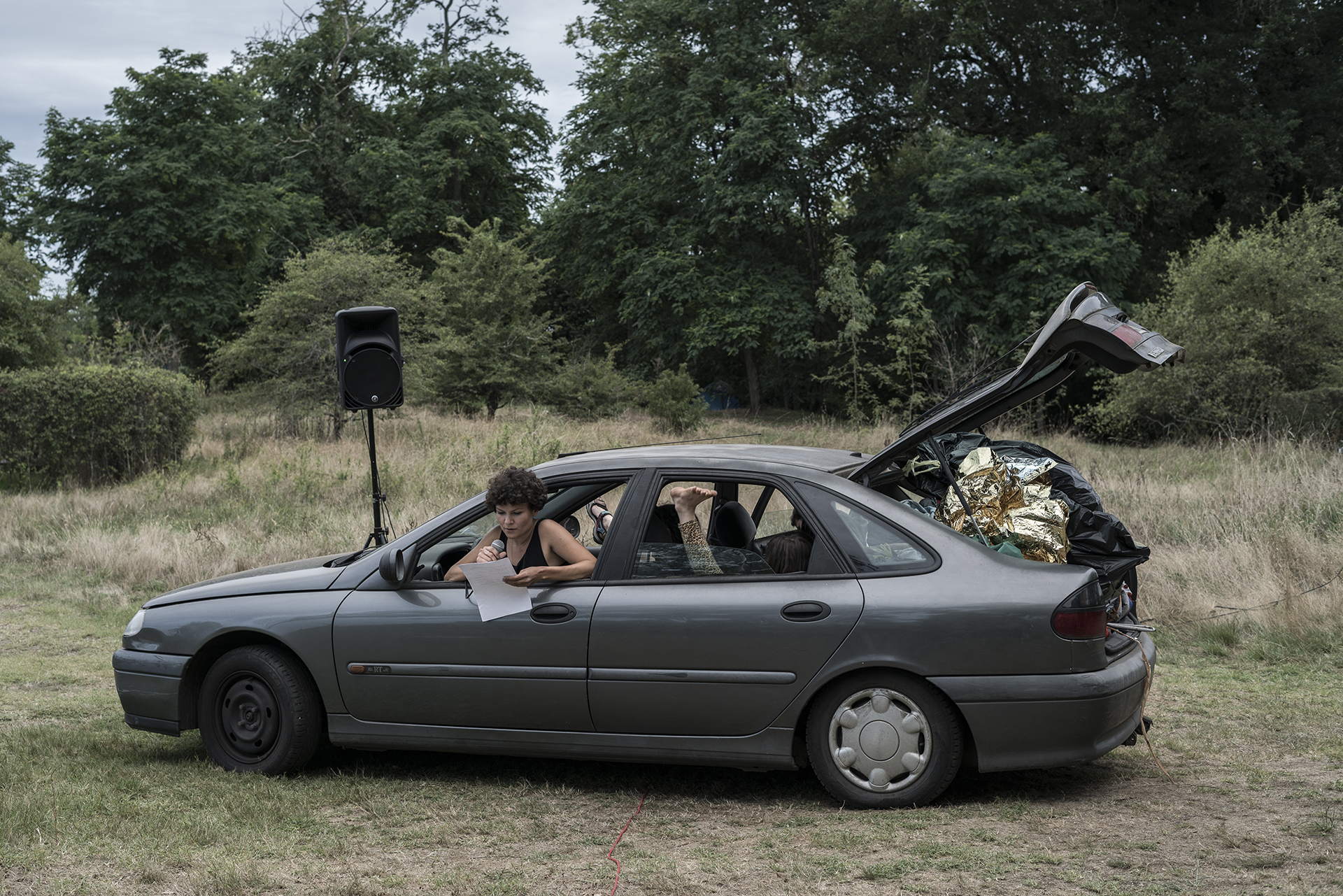
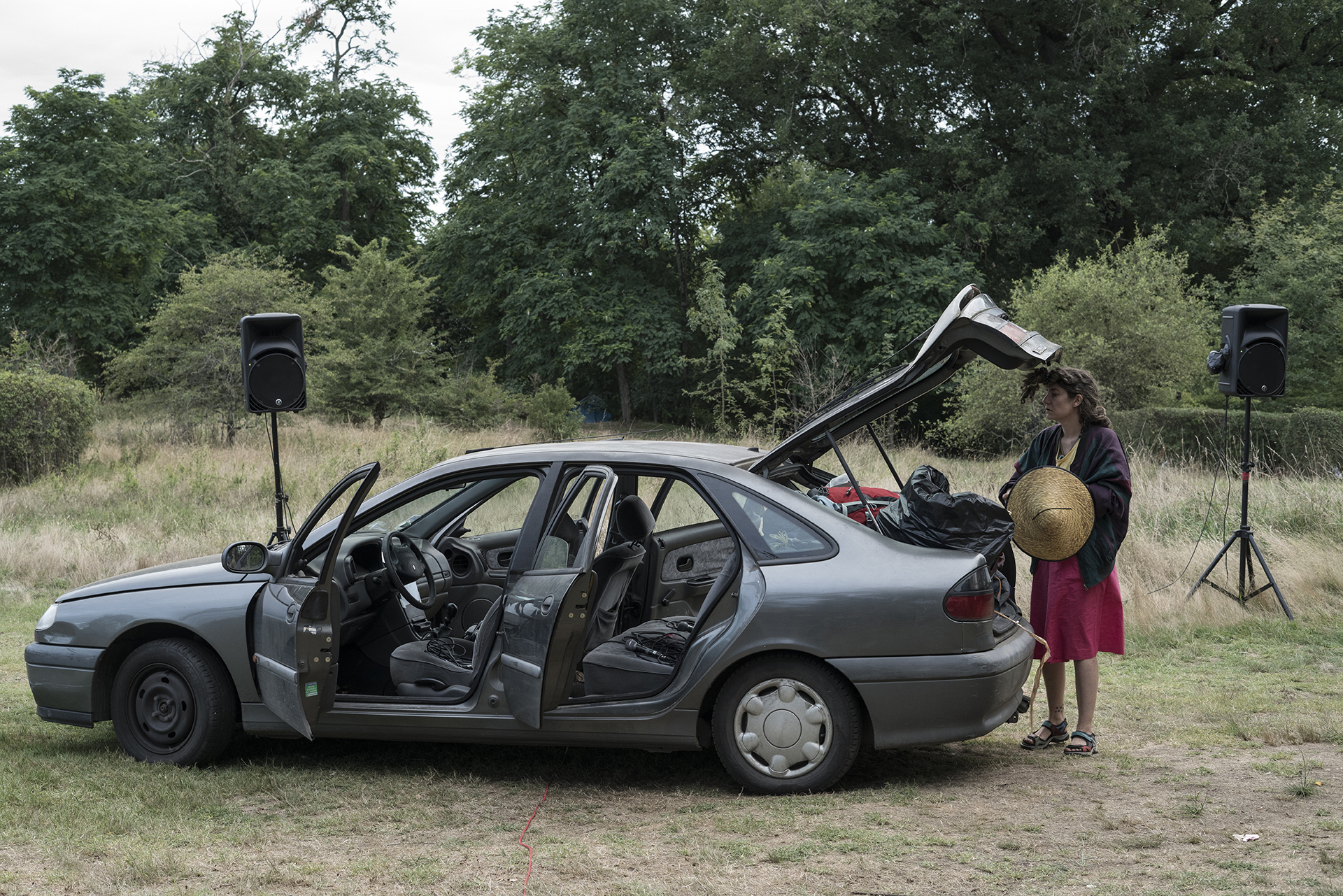
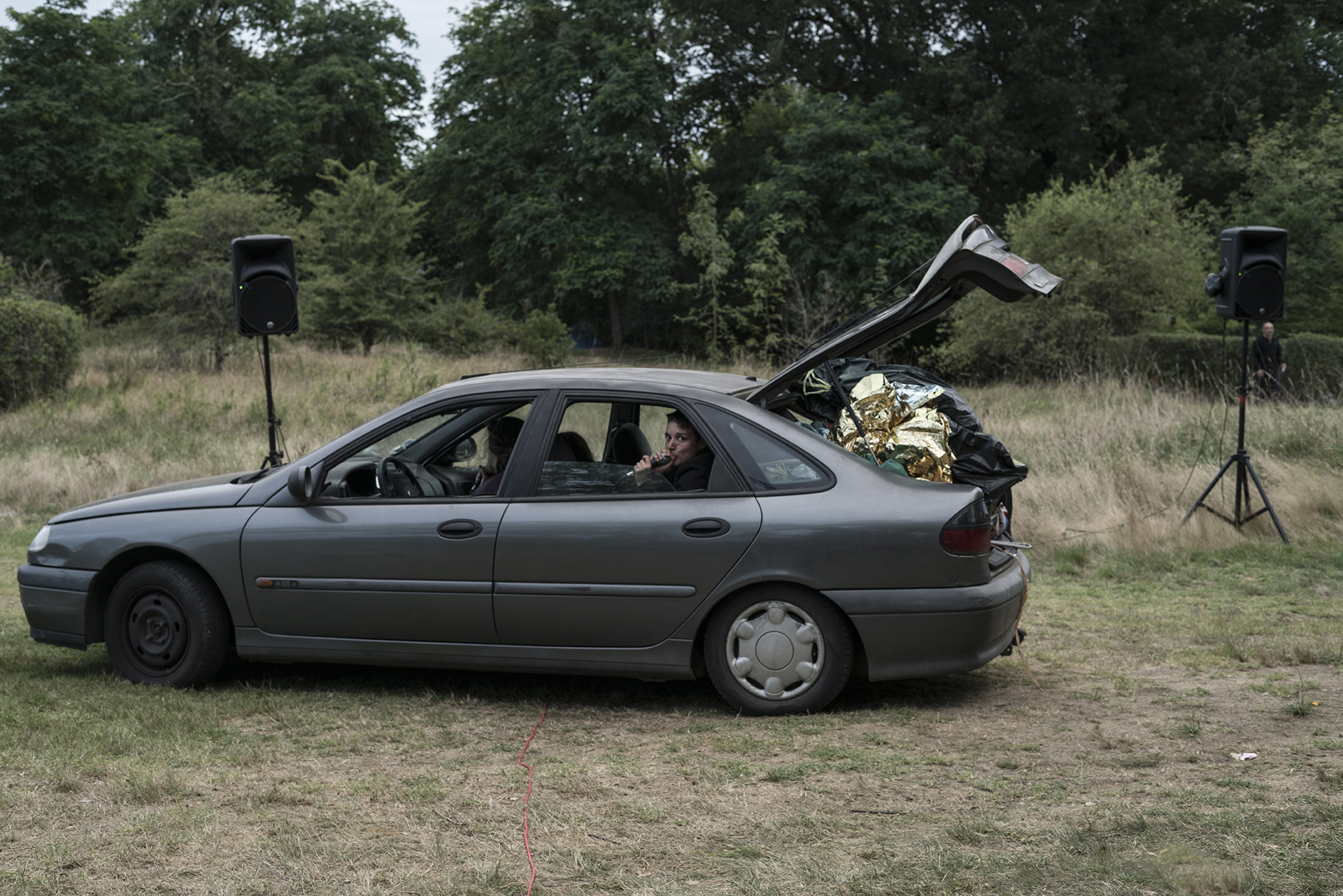



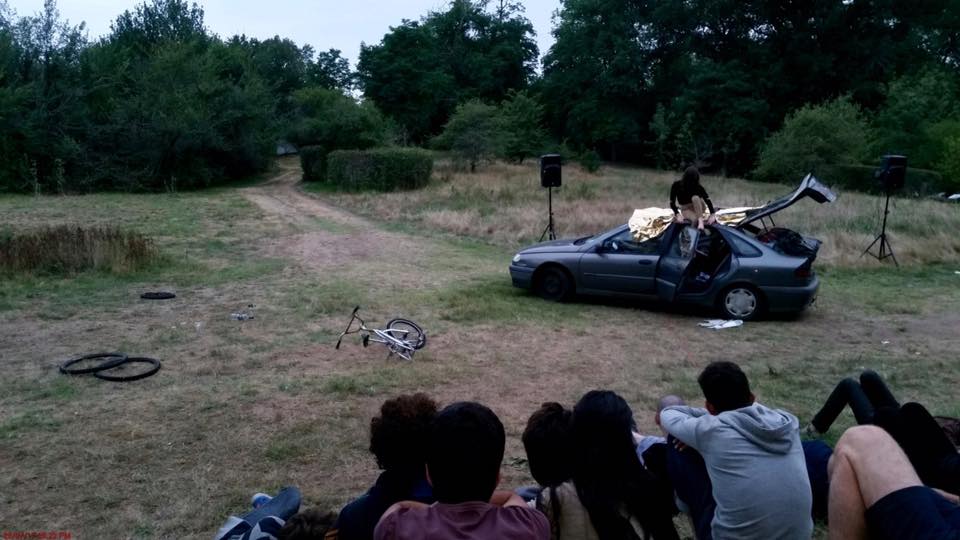
230 000 cm
2013, Neukölln, Berlin. Collaborative project between artists in the neighborhood of Neukölln, for the festival 48 Stunden Neukölln and Nacht und Nebel. B&W photographs in public space, Publication and evening workshop opened with readings. Project funded by Quartier Donaukiez of Neukölln, organized by Marta Leite, Barbara Marcel and Anais Senli in the Karl Marx Studio.
2013, Neukölln, Berlin. Collaborative project between artists in the neighborhood of Neukölln, for the festival 48 Stunden Neukölln and Nacht und Nebel. B&W photographs in public space, Publication and evening workshop opened with readings. Project funded by Quartier Donaukiez of Neukölln, organized by Marta Leite, Barbara Marcel and Anais Senli in the Karl Marx Studio.
230 000 cm corresponds to the diameter of the Quartier Donau, in the district of Neukölln in Berlin. The book resulting from this project brings together a collection of photos and stories that happen between spring and autumn 2013, within this diameter. The guiding thread of the project is the relationship between memory, subjectivity and experience of many residents of the neighborhood and its relationship with the artists who work in it. The process is divided into two stages. During the spring we invited several artists with Ateliers in the neighborhood, to take pictures of certain places that seem peculiar to them, in relation to the convivial in public space. For the "48 Hours Neukölln Festival", we printed the photos in b&w and exhibit near the places where they were originally taken. In our Atelier we distributed a map to the Festival audience, so they could see the photos on a walk around the block. In the second stage of the project, we invite artists to write narratives or free verses, that related to the images produced. The compilation of works was published with the help of Quartiermanagement, and launched into a night of readings in Karl Marx Studio during the Fall Festival, Nacht und Nebel (Night and Fog). The result is a kaleidoscopic image of DonauKiez, narrated by people of different cultures, interests and experiences in the social space of the quartier. The book reflects the diverse and complex surface of one of the most multi-cultural neighborhoods of Berlin.



